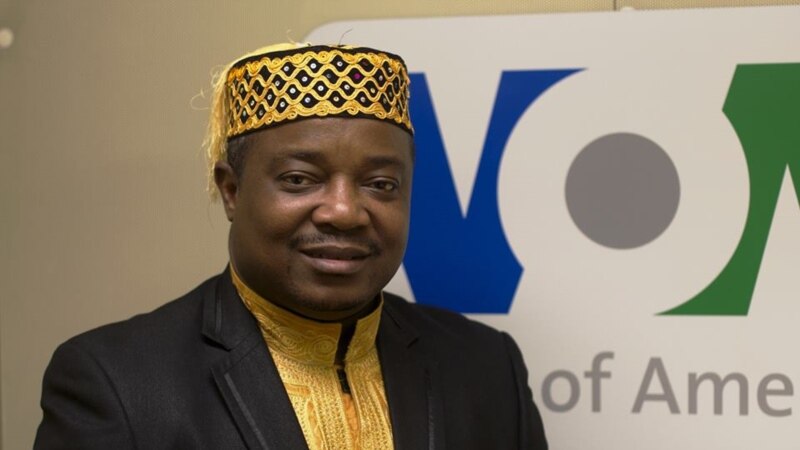US to expel South Africa ambassador as relations deteriorate
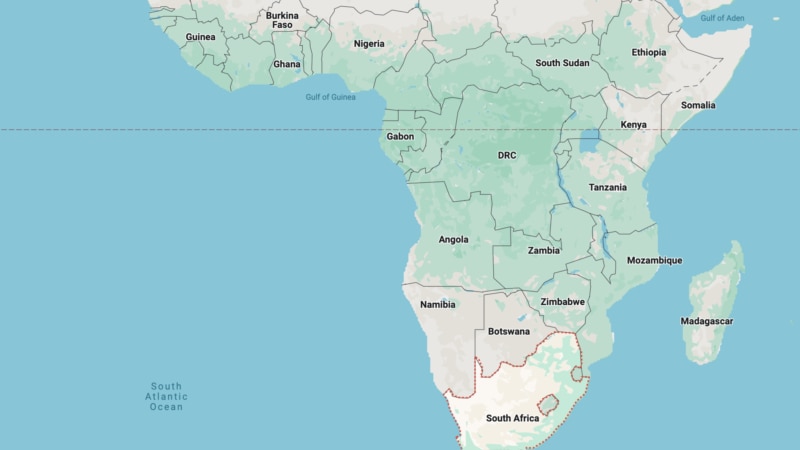
 1d
1dU.S. Secretary of State Marco Rubio announced Friday that South Africa's ambassador to Washington had been declared persona non grata, signaling worsening relations between the two countries. In a post on X, Rubio said South Africa's ambassador to the U.S., Ebrahim Rasool, was "no longer welcome in our great country." "Ebrahim Rasool is a race-baiting politician who hates America and hates @POTUS [President of the United States]." There has been no immediate response from South Africa's embassy in Washington. Rubio's move came amid tense relations between the U.S. and South Africa. President Donald Trump recently signed an executive order suspending aid to South Africa over a controversial land expropriation act that Trump said would lead to the takeover of white-owned farms. Trump also said that South African farmers were welcome to settle in the United States. South Africa's President Cyril Ramaphosa, in a post on X, defended his government's measure. "We are guided by the Constitution, which places a responsibility on the state to take measures to redress the effects of past racial discrimination," he said. "We have expressed concern about the mischaracterisation of the situation in South Africa and certain of our laws and our foreign policy positions," Ramaphosa said after Trump signed the executive order in early February.
Read MoreArchaeologists use song to herald findings in Guinea-Bissau dig
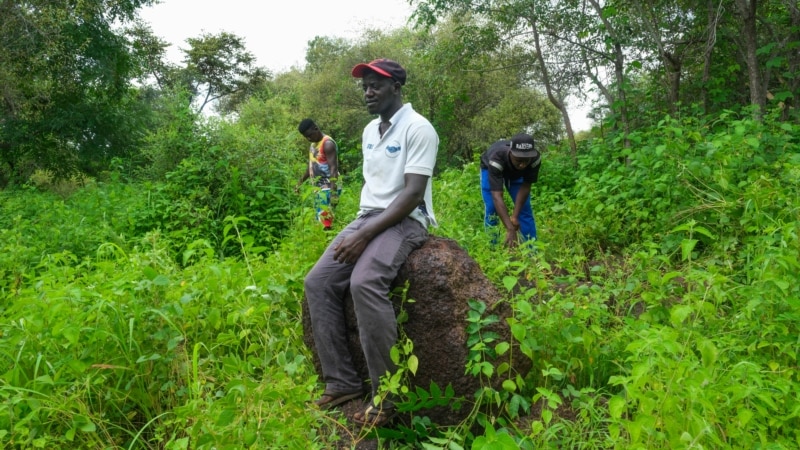
 1d
1dKansala, Guinea-Bissau — For centuries, the history of the West African kingdom of Kaabu has been told mainly by word of mouth. Kaabu existed from the mid-1500s to the 1800s. At its peak, it encompassed Guinea-Bissau and reached into what are now Senegal and Gambia. Sometimes Kaabu's story passed from father to son. Often it was passed by griots — or West African oral historians — who sang about the kingdom’s rulers. “The griots have already sung it, but now we know it’s real," is what Nino Galissa recounts in a recent song commissioned by archaeologists from their recent dig in Kansala — a site that was once the wealthy capital of the West African kingdom. Galissa is a direct descendent of the griots who sang for the last emperor of Kaabu. The song performed by Galissa is being shared along with a report of the archaeological findings, Sirio Canos-Donnay from the Spanish National Research Council, which was a lead institution of the dig, told VOA. “He’s combined all of the ways and methods and phrases that are the trade of the griot with the archaeological information and, hence, using that we’ll be able to transmit what we’ve done to the local population in a much more effective manner.” In Kansala, griots have long been the way history lessons were passed between generations. They often sing the history accompanied by the kora, a string instrument that resembles both a harp and a guitar. 'The puzzle you cannot miss' Antonio Queba Banjai, a descendant of the last emperors of Kaabu, remembers listening as a young boy to the griots sing about his ancestors. “Griots are not just important," he said. "They are the puzzle you cannot miss in African history, because to know what we know now is because of griots. I am from the tree of the last emperor of Kaabu. We were educated by the music of kora. The storytellers tell us where we come from.” Banjai is also president of Guinea-Lanta, an NGO that worked with the archaeologists. When team members began the project, they knew they wanted griots and oral history to play an important role in what is the biggest archaeological dig to ever take place in Guinea-Bissau. Canos-Donnay said she hoped that including oral storytelling in this report would show the academic world that things can be done differently and more inclusively. “We should pay and need to pay respect to local ways of producing and consuming history. And the collaboration and the knowledge that can come from that dialogue from these two disciplines is something that is quite extraordinary.” Canos-Donnay and others worked closely to verify that many events griots had sung about for generations actually occurred. One such event was the explosive ending of the kingdom. “Kansala had a fairly spectacular end in the 1860s, when the town was sieged by an enemy kingdom, and the local king realized he was going to lose the battle," she said. "The legend is he set fire to the gunpowder house and blew the whole site up. So, this particular point of the site is where the elders said it happened. And one of the fun things is we proved that’s where it properly did.” The dig also produced evidence of residents’ extensive trading with Europeans – Venetian beads, Dutch gin and more. Joao Paulo Pinto is the former director of Guinea-Bissau's National Institute of Study and Research. He says West African ways of recording history should be taken as seriously as European techniques. “In our system, when you talk about the ritual of passage - everything has a process, everything has a code of conduct," he said. "All our oral history systems have a commitment to the truth. I have a commitment to the truth as I speak, just the same as a book has a commitment to the truth.” As for Banjai, he hopes the project will allow others to learn about the histories and kingdoms of West Africa that he says are too often neglected in school.
Read MoreAfrica faces diabetes crisis, study finds

 1d
1dJOHANNESBURG, SOUTH AFRICA — Researchers warn that type 2 diabetes could affect millions more people in the coming decades after a study published this month revealed the disease is rising far faster among people in sub-Saharan Africa than previously thought. Take 51-year-old security guard Sibusiso Sithole, for example. Being diagnosed with type 2 diabetes came as a shock, he said, because he walked six miles to and from work every day and never thought his weight was a problem. Then his wife noticed changes in his health. Since his diagnosis 13 years ago, Sithole has been on a rigorous treatment for diabetes and high blood pressure. “I have to take six ... medications every day,” he said. Diabetes is a condition in which the body struggles to turn food into energy due to insufficient insulin. Without insulin, sugar stays in the blood instead of entering cells, leading to high blood-sugar levels. Long-term complications include heart disease, kidney failure, blindness and amputations. The International Diabetes Federation estimated in 2021 that 24 million adults in sub-Saharan Africa were living with the condition. Researchers had projected that by 2045, about 6% of sub-Saharan Africans — over 50 million — would have diabetes. The new study, published this month in the medical journal The Lancet, suggested the actual percentage could be nearly double that. By tracking more than 10,000 participants in South Africa, Kenya, Ghana and Burkina Faso over seven years, researchers found that poor eating habits, lack of health care access, obesity and physical inactivity are key drivers of diabetes in Africa. Dr. Raylton Chikwati, a study co-author from the University of Witwatersrand in South Africa, said another risk factor is living in or moving to the outskirts of cities, or “peri-urban areas.” “Access to health care, you know, in the rural areas is a bit less than in the urban areas,” Chikwati said, adding that increased use of processed foods in the peri-urban areas was a problem. Palwende Boua, a research associate at the Clinical Research Unit of Nanoro in Burkina Faso, said long-term studies are rare in Africa but essential to understanding diseases. “Being able to have a repeated measure and following up [with] the same people ... is providing much more information and much valuable information,” Boua said, “rather than having to see people once and trying to understand a phenomenon.” Boua is preparing a policy brief for Burkina Faso’s government to assist in the fight against diabetes. For Sithole, managing his diabetes has been a long journey. But with treatment and lifestyle changes, he has regained control over his health. “What I can tell people is that they must go and check — check the way they eat — because that time I was having too much weight in my body,” he said. “I was wearing size 40 that time. Now I'm wearing size 34.” Experts stressed that Africans should get their blood-sugar level tested and seek treatment when diabetes is diagnosed.
Read MoreBotswana hunting revenues almost double amid UK opposition
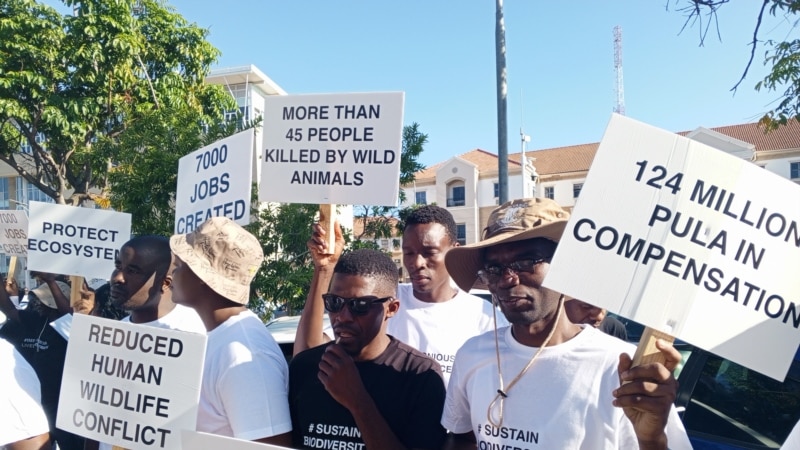
 1d
1dGaborone, Botswana — Botswana has made $4 million from the sale of licenses to hunt wild animals, the highest figure since lifting a hunting ban in 2019. The hunting season, which ended in November, was held amid growing opposition from some European countries that want a ban on the importation of African wildlife trophies. Botswana issues around 400 elephant licenses annually, with most purchased by overseas hunters. Wynter Mmolotsi, minister of environment and tourism, told Parliament Thursday that millions of dollars were generated through the sale of mostly elephant licenses in villages in wildlife areas. "In order to manage the wildlife population, the country is implementing a combination of both consumptive and nonconsumptive utilization of our wildlife resources to derive optimum economic benefit, particularly for our communities," he said. "For the 2024 hunting season, the community quotas generated the sum of 42,863,423 pulas. Further, a total of 15,633,950 pulas was realized from the sale of special elephant quotas to support elephant conservation and community-led projects within the elephant range." In 2023, Botswana earned $2.7 million from hunting licenses. Mmolotsi, however, says the hunts face increasing Western opposition. Canada and Belgium are among countries that have recently banned importation of wildlife trophies. "The country is facing opposition from animal rights organizations to our policy of sustainable wildlife utilization of using hunting as a tool and empowerment to our local communities. The ministry, working with the hunting industry and affected community trusts stepped up efforts to counter this growing opposition to sustainable hunting through engagements carried out in the U.K. and Germany," he said. Siyoka Simasiku, director at the conservation coalition, Ngamiland Council of Non-Governmental Organisations says communities will be the hardest hit if the U.K. imposes restrictions. He has been to Europe to campaign against trophy import bans. "The U.K. ban is going to be bad on community benefits as the U.K. is an economic superpower and might influence other countries to actually follow suit and then communities might lose the market that already exists as more hunters will not be coming to Botswana to hunt in community concessions due to the trophy bans," he said. Oaitse Nawa of the Elephant Protection Society is among those who want the hunts to be stopped. He also argues, revenue accrued from hunting does not significantly benefit Botswanans. "They are giving us figures of the money that they made from hunting, but also let us look at the compensation that they give the people. And also the result of hunting, what does hunting bring to the local people because the animals that experience hunting, they tend to change their behavior and they kill people. That is why we are saying there should be proper research in that regard,” said Nawa. Botswana, with the world’s largest elephant herd at more than 130,000 elephants has recorded an increase in human fatalities, while crops are damaged.
Read MoreChildren being brutalized in Sudan's civil war, say UNICEF and MSF
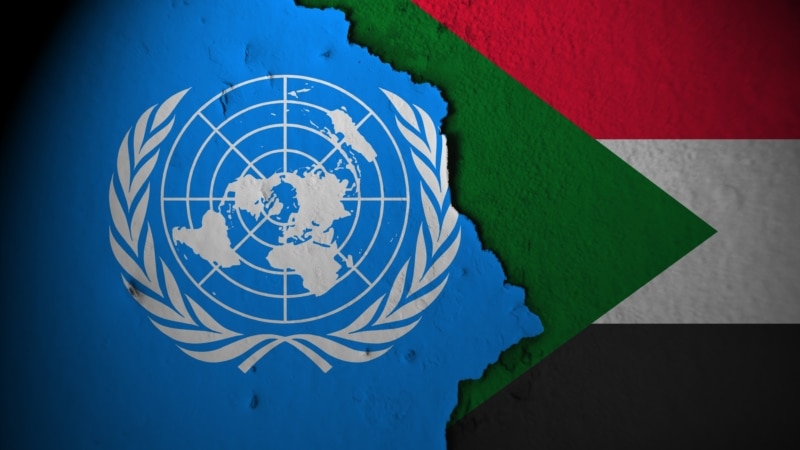
 1d
1dUNITED NATIONS — The head of the U.N. children’s program, UNICEF, said Thursday that 16 million children in Sudan are suffering horribly from the country’s civil war, with many facing daily threats of violence, starvation, disease and sexual assault. "The fighting is happening right at their doorsteps, around their homes, their schools and hospitals, and across many of Sudan’s cities, towns, and villages,” Catherine Russell, UNICEF’s executive director, told a meeting of the U.N. Security Council. She said children under the age of five are particularly at risk, with more than 1.3 million living in five famine hotspots in the country, and another 3 million at risk of diseases including cholera, malaria and dengue due to the failing health system. At least 16.5 million young people are out of school. Russell said there were 221 cases of rape against children reported in nine of Sudan’s 18 states last year. She said two-thirds were girls. "In 16 of the recorded cases, the children were under the age of five. Four were babies under the age of one,” she said. While she demanded an end to the hostilities, she said it would not erase the pain those children have endured. "The trauma these children experience and the deep scars it leaves behind do not end with the signing of a ceasefire or a peace agreement,” she said. “They will need ongoing care and support to heal and rebuild their lives.” The head of Doctors Without Borders (MSF) told the council that his teams in Sudan have also seen evidence of sexual violence, having treated 385 survivors last year. “The vast majority — including some younger than five — had been raped, often by armed men,” said Secretary General Christopher Lockyear. “Nearly half were assaulted while working in the fields. Women and girls are not merely unprotected, they are being brutally targeted.” The children are caught up in a power struggle between two rival generals that began in the capital, Khartoum, in April 2023, but has since spread to large parts of the country, including the Darfur region. The paramilitary Rapid Support Forces has been fighting the Sudanese Armed Forces, and the United Nations says both sides have committed grave human rights abuses. The head of MSF told the council that he was in Sudan six weeks ago and witnessed a scene of “utter carnage” at one of their partner hospitals in Omdurman, near the capital. “I witnessed the lives of men, women, and children being torn apart in front of me,” Lockyear said. He told the 15-nation Security Council that their repeated calls on the parties to end the war have gone unanswered. “While statements are made in this chamber, civilians remain unseen, unprotected, bombed, besieged, raped, displaced, deprived of food, of medical care, of dignity,” Lockyear said. He later told reporters that the situation in Sudan “is so catastrophic for millions of people, it should be something that is on all of our consciences on a daily basis.” The UNICEF director said the agency needs a billion dollars this year to provide critical support to 8.7 million children in Sudan, including nutrition, water and sanitation, protection, health, and education. She and Lockyear both urged the council to press the warring parties to remove obstacles to the delivery of aid.
Read MoreCyclone Jude batters Malawi, Mozambique; no deaths reported

 1d
1dBLANTYRE, MALAWI — Tropical Cyclone Jude slammed into parts of southern Africa this week, causing no deaths but leaving widespread damage, especially in Malawi and Mozambique. Officials in the two countries said thousands of people were homeless and some areas were without power. Aid agencies distributed relief where they could, but washed-away roads made the task difficult. The storm made landfall in northern Mozambique early Sunday and moved over southern Malawi, resulting in heavy rains affecting 13 districts from Monday to Wednesday. A preliminary assessment from Malawi’s Department of Disaster Management Affairs released Thursday showed that the cyclone had so far affected more than 11,000 people. This means their crops were washed away or their houses and property were either destroyed or submerged by floods. The assessment said the cyclone displaced more than 3,000 people, who are now sheltered in six evacuation camps. No deaths were recorded, but the disaster management department said collapsing buildings injured 15 people, including 5- and 8-year-old boys. “The 5-year-old is receiving medical attention at Queen Elizabeth Central, and the 8-year-old is admitted as well and is at Mwanza District Hospital following the collapsing of a wall of a house,” said disaster management department spokesperson Chipiliro Khamula. He said rescuers were still looking for three people who went missing Tuesday in Nsanje and Phalombe districts after their boat capsized on a flooded river. The U.N. Office for the Coordination of Humanitarian Affairs said that in Mozambique, relief operations were severely hampered by lack of access to thousands of people in Nampula province, where main roads, bridges and culverts were washed away. The United Nations agency said moving relief items and personnel from Cabo Delgado province to Nampula was also difficult because the storm cut off the N1 national highway. In Malawi, international aid agencies and the government were able to start relief operations in accessible areas. For example, the World Food Program on Thursday distributed some relief items to affected people in Mulanje district. Simon Denhere, WFP’s acting country director in Malawi, said, “With support from the UK government, WFP and the Department of Management Affairs have prepositioned food supplies, emergency kits and operational equipment, including search and rescue boats, to enable rapid response.” Lucy Mtilatila, director of Malawi’s Department of Climate Change and Meteorological Services, told VOA that Cyclone Jude had moved from Malawi to Mozambique, where it was expected to dissipate. “Right now, the threat of the cyclone is almost over.” she said, adding that floods were still a concern, although "the impact that could come with rains that we are getting now will be very minimal.” Jude is the third cyclone to affect Mozambique in the past three months, following Cyclones Chido in December and Dikeledi in January. Malawi avoided a hit from Dikeledi but was struck by Chido in December.
Read MoreUN judge from Uganda convicted in UK of forcing woman into slavery
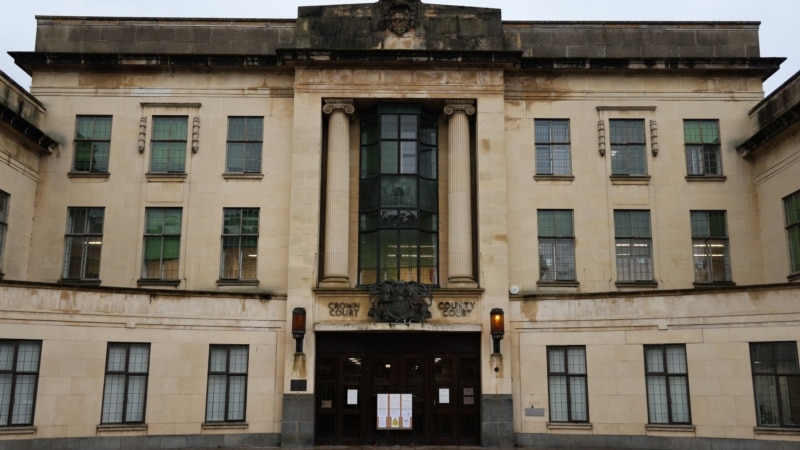
 1d
1dLONDON — A British jury on Thursday convicted a United Nations judge of forcing a young woman to work as a slave after tricking her into coming to the U.K. Prosecutors said Lydia Mugambe made the Ugandan woman work as her maid and provide childcare for free. Mugambe, who is also a high court judge in Uganda, was studying for a doctorate in law at the University of Oxford when the offenses occurred. Prosecution lawyer Caroline Haughey told jurors during the trial that Mugambe "exploited and abused" the victim, deceiving her into coming to the U.K. and taking advantage of her lack of understanding of her rights. Mugambe, 49, denied the charges. Jurors at Oxford Crown Court convicted her on all four charges she faced, including an immigration offense, forcing someone to work and conspiracy to intimidate a witness. There were gasps from the public gallery as the verdicts were read out, and the court was cleared after Mugambe appeared unwell. She is due to be sentenced on May 2. According to her United Nations profile page, Mugambe was appointed to one of the global body's international courts in May 2023.
Read MoreZimbabwe journalist still in custody after case adjourned
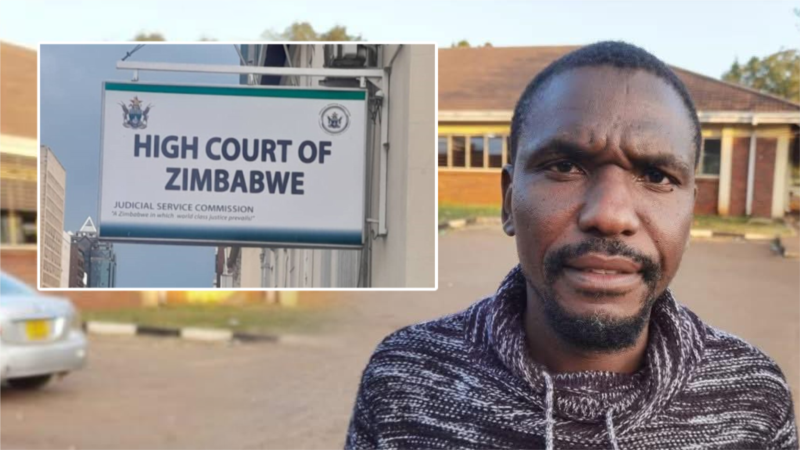
 1d
1dA High Court judge in Zimbabwe on Wednesday adjourned the case of a journalist arrested over his interviews with a war veteran-turned-politician who criticized the country's president. Blessed Mhlanga, a journalist with NewsDay and Heart and Soul Television, has been in custody since Feb. 24 over accusations of incitement. Lawyers for the journalist had requested that he be bailed out, but at a hearing in Zimbabwe's capital, Harare, Justice Gibson Mandaza requested more time to examine the case. Chris Mhike, who represents Mhlanga, told VOA he was waiting for the High Court to announce when the case would resume. Mhike said it would be "improper" to go into the arguments because the case was active but said the judge "indicated that it was necessary for him to consider the issues that are at stake." Speaking ahead of Wednesday's hearing, Mhike said the arrest of Mhlanga sent a chilling message. The arrest is related to his interviews with war veteran and politician Blessed Geza in November and January, in which Geza said that he would mobilize public protests to push President Emmerson Mnangagwa out of office, citing economic issues and what he called the president's failure to govern. On Friday, Geza was expelled from the Zanu PF party for what the party described as violating regulations in public comments about the president. Mhike said he believed his client's arrest served as a warning to others to refrain from discussing political topics, such as whether Mnangagwa should seek a third term. Zimbabwean presidents serve five-year terms, which are renewable once. Mhlanga's arrest "has had a chilling effect on the practice of journalism, as is always the case when journalists are either harassed, or put through the legal process, really for activities that are directly linked to their work," Mhike told VOA. It is "worrisome to many in the journalistic fraternity," he added. "This has been the impact, and this has been my client's position: that he is being tormented purely on grounds of him carrying out his work as a journalist." Mhlanga, who faces two charges relating to "transmitting of data messages inciting violence or damage to property," denies the charges against him. Mhike said his client's arrest also could be unconstitutional. Zimbabwe's Constitution guarantees the right to freedom of expression, which includes freedom to seek, receive and communicate ideas and other information, and entitles citizens to freedom of the press. Farai Marapira, the Zanu PF information director, said he expected courts to preside fairly over the case. "I believe people should allow the court process to pursue this matter as it is designed to find out what are the material facts of the matter, and I'm sure the courts will deal fairly with this issue," Marapira said. Marapira also said Mhlanga's arrest was not a reflection of the state of press freedom in the country. "People write about Zanu PF every day — people write positively, people write negatively, some even write and insult Zanu PF," he said. Marapira then rhetorically asked aloud: "Who is dead? No one is dead. So, what are they fearing for their lives from? Where is the example? Where are the examples of killed journalists? So, like I said, this is all overexcitement." The media watchdog Reporters Without Borders said that conditions for journalists have improved since the end of longtime leader Robert Mugabe's rule. But, it noted in its press freedom index, media have faced greater persecution since the 2023 election. In the past two years, journalists have been blocked or harassed while covering events and briefly detained and assaulted, media groups said. Mhlanga himself has had a previous brush with the law. In 2022, he and his colleague Chengeto Chidi were arrested for taking photos of the police during the arrest of an opposition lawmaker. In his latest case, international and local media rights organizations have condemned Mhlanga's arrest and urged the Zimbabwean government to drop all charges against him. Tobias Mudzingwa contributed to this report.
Read MoreIS in Sahel expands terror threat beyond strongholds
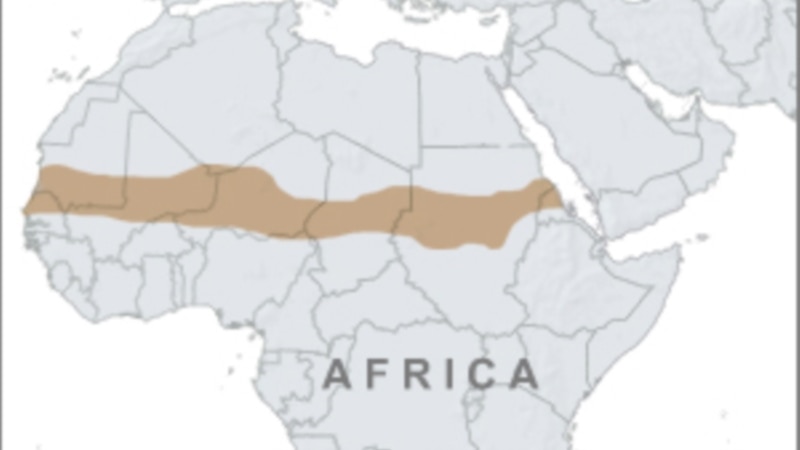
 1d
1dOn Feb. 24, the Moroccan counterterror agency broke up a terrorist cell calling itself "the Lions of the Caliphate in the Maghreb Al Aqsa." Authorities said the group was making remote-controlled bombs to carry out attacks in the North African country. In November, a similar terrorist cell was dismantled in the Spanish cities of Seville and Ceuta. The connection? Both Moroccan and Spanish authorities said the groups were aligned with Islamic State in The Sahel. The group is best known for wreaking a devastating wave of violence across Burkina Faso, Niger and Mali, plunging these countries into chaos and fueling a spiraling humanitarian crisis. But analysts say the foiled terror cells farther afield are a worrying sign. "Because the counterinsurgency infrastructure in Mali, Burkina Faso and Niger has been compromised, then it allows them to make inroads into other countries that they perceive to be vulnerable," said Beverly Ochieng, a senior analyst at geopolitical risk consultancy Control Risks. Ochieng said IS Sahel’s strategy appears increasingly focused on exploiting security gaps beyond their core Sahelian strongholds. "IS Sahel has seen that its expansion could be directed much further West and much further North, and Morocco would be one place which would be of strategic interest to it," she said. Andrew Lebovich of the Dutch international affairs think tank Clingendael said these disrupted plots are indicative of IS Sahel's broader ambitions. "It does suggest an ongoing effort to increase operations in different ways in other countries,” he said, adding that Algeria is facing an increasing threat. And it’s not just North Africa that's at risk. Ochieng warns that countries traditionally seen as stable, such as Guinea or even Senegal, could become future targets for IS Sahel militants too. In March, the Global Terrorism Index named the Sahel the epicenter of global terrorism for the second year running.
Read MoreECOWAS regional bloc activates counterterror force
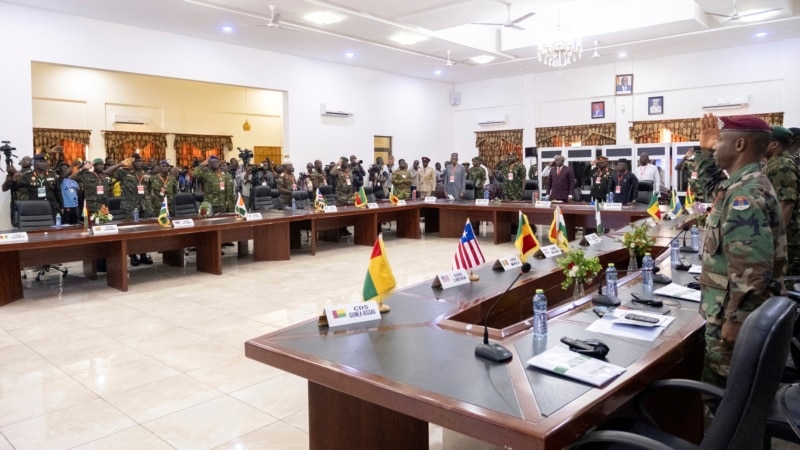
 1d
1dABUJA, NIGERIA — Security analysts are praising ECOWAS, the Economic Community of West African States, for activating its regional standby force but remain doubtful about its effectiveness following the recent withdrawal of three member states. Nigerian Defense Minister Mohammed Badaru Abubakar announced the activation of a standby military force Tuesday on the sidelines of the 43rd security meeting of the Economic Community of West African States, or ECOWAS. The force, expected to comprise 5,000 troops, is part of a broader regional security strategy to curb terrorism and cross-border crimes. Abubakar said the initiative aims to mobilize personnel and resources to combat terrorism spreading across the subregion and urged security counterparts to seize the opportunity and coordinate efforts against threats. "I am pleased to highlight the activation of the ECOWAS standby force to combat terrorism in the subregion," said Mohammed Badaru Abubakar, Nigeria's defense minister. "The activation of this force underscores our collective determination to confront the stretch of terrorism with regards to insecurity and ensure the safety and security of our citizens." ECOWAS security chiefs also discussed peace support operations and maritime security in the Gulf of Guinea. The force's activation follows a report by the Global Terrorism Index, which identified Africa's Sahel region as the global epicenter of extremism — accounting for half of all terror-related fatalities in 2024. This marks an almost tenfold increase compared to 2019. Security analyst Kabiru Adamu welcomed the move but expressed concerns about its effectiveness. "The last detail that we know, even though that could change, is that it will have two operational bases within the subregion," said Adamu. "We know that the ability to even acquire the 5,000-man troops has been a bit challenged. The countries that initially agreed to contribute, three of them are no longer with ECOWAS. So now ECOWAS will have to look back within its members to see who among them will augment the gap." In late January, Burkina Faso, Mali and Niger withdrew from ECOWAS and created a confederation known as the Alliance of Sahel States, after a yearlong dispute with the bloc. The three military-led nations accused the regional body of failing to protect its members while allegedly serving foreign interests. Despite their exit, ECOWAS has stated it will maintain trade and security relations with the trio. Adamu said these ongoing relationships could be beneficial. "Given the conditions of the military contingents in almost all the countries, it will be very difficult for these things to be met in a manner that would allow speedy deployment," said Adamu. "The good thing is that the defense and security cooperation between the AES and ECOWAS still stands both multilateral and bilateral. We're hoping that in spite of the exit, all sides will see the necessity to continue to engage in the security defense." Jihadist groups, including Boko Haram and Islamic State's Sahel affiliate, have taken advantage of political instability and public resentment to recruit and expand their influence. With almost all the ECOWAS countries facing internal security challenges, observers are watching to see whether the regional force can shift the status quo amid strained cooperation.
Read MoreDRC, M23 rebels to begin direct peace talks, Angola says

 1d
1dLUANDA, ANGOLA — Direct peace talks between the Democratic Republic of Congo and M23 rebels will begin in the Angolan capital on March 18, Angola's presidency said in a statement on Wednesday. The Southern African country has been trying to mediate a lasting ceasefire and de-escalate tensions between the DRC and neighboring Rwanda, which has been accused of backing the Tutsi-led rebel group. Rwanda denies those allegations. Angola announced on Tuesday that it would attempt to broker the direct talks. Congo's government has repeatedly refused to hold talks with M23 and on Tuesday said only that it had taken note of the Angolan initiative. There was no immediate comment from Kinshasa on Wednesday.
Read MoreSomali forces kill 50 militants in airstrikes after ending hotel siege

 1d
1dWASHINGTON — Security forces in Somalia say they killed all six attackers who laid siege to a hotel in the central town of Beledweyne and later killed at least 50 al-Shabab militants in airstrikes. Speaking to reporters, Beledweyne District Commissioner Omar Osman Alasow confirmed that the hotel siege ended early Wednesday. “Our security forces successfully got rid of six militants who attacked a hotel where traditional elders and security officials were meeting,” he said. Al-Shabab, a U.S.-designated terrorist group, claimed responsibility for the hotel attack on Tuesday. Alasow said the government soldiers backed by African Union troops worked through the night to rescue elders, military officers and civilians trapped inside the hotel. “During 18 hours of siege, our brave soldiers shot dead two militants, and four of them desperately blew themselves up when they realized that they could not escape,” he said. “Seven other people, including government security officials and two prominent traditional elders, were killed.” Since August 2022, when Somalian President Hassan Sheikh Mohamud called for a “total war” against al-Shabab, Beledweyne, a town near Somalia’s border with Ethiopia in Hirshabelle state, about 300 kilometers north of Mogadishu, has been the center of a local community mobilization against al-Shabab. The city has suffered more terrorist attacks than any other in Somalia except Mogadishu. Since 2009, hundreds of people have been killed in suicide attacks and car bombs on hotels, restaurants and government bases. The single biggest attack, in 2009, killed at least 25 people and injured 60 others. Airstrikes kill 50 militants Hours after ending this week’s hotel siege, Somalia’s National Intelligence and Security Agency, or NISA, said the country’s security forces killed dozens of al-Shabab members elsewhere in Hirshabelle. “Coordinated airstrikes by the Somali army and international partners in the Middle Shabelle region have killed at least 50 al-Shabab militants, including senior leader in charge of the coordination of the group’s combat vehicles,” the NISA statement said. NISA said the airstrikes targeted the Damasha and Shabeelow areas and killed Mansoor Tima-Weeyne, a senior al-Shabab leader who masterminded the preparation and use of combat vehicles for terrorist attacks. In a separate statement, the Somali Military Command said, “The operation was a significant blow to the group's combat capabilities and part of ongoing efforts to weaken terrorism in the region.” Media outlets closed On another counterterrorism front, NISA said Wednesday that it closed 12 media outlets and websites linked to the Khawarij, a derogatory term referring to al-Shabab that loosely translates as “those who deviate from the Islamic faith.” This latest announcement followed another crackdown on over 30 al-Shabab-related websites. “The operation targeted platforms spreading extremist ideologies, inciting violence, and disseminating false information. During the operation the government seized critical data and identified individuals involved,” said a statement posted by the government’s National News Agency. This story originated in VOA's Somali Service.
Read MoreIndia, Mauritius upgrade strategic ties with eye on China
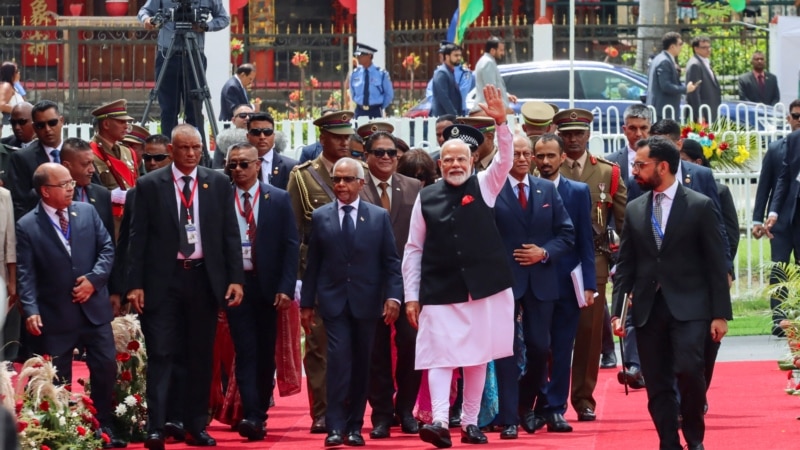
 1d
1dNEW DELHI — India and Mauritius have upgraded their ties, say leaders of both countries — a move analysts say is aimed at increasing New Delhi’s influence in the Indian Ocean as it seeks to counter China’s expanding footprint in the region. The announcement of upgraded ties came during a two-day visit by Indian Prime Minister Narendra Modi to Mauritius, an island nation that sits along vital seaways in the western Indian Ocean. Modi, who was chief guest at Mauritius’s National Day celebrations on Wednesday, said that the countries had elevated ties to the status of “enhanced strategic partnership.” Following talks with Mauritius Prime Minister Navinchandra Ramgoolam, both leaders also reaffirmed their commitment to a "free, safe, secure and open Indian Ocean.” Mauritius conferred the country’s highest civilian honor on Modi, and the prime ministers signed eight pacts to boost cooperation in several sectors including maritime security. Modi announced that New Delhi would invest about $11 million in several community development projects and that India will cooperate in building a new parliament for Mauritius, calling it a gift “from the mother of democracy.” China trade with Mauritius on rise While India has long enjoyed good relations with Mauritius, where 70% of the population is of Indian origin, analysts said Modi’s visit came amid a recognition that India needs to step up its engagement with a country that is called the gateway to the Western Indian Ocean and Africa, and where Beijing’s presence has grown. “China’s rise in the island has been quite phenomenal and it is now one of the most important economic players in Mauritius,” according to Harsh Pant, the vice president of studies at the Observer Research Foundation in New Delhi. “So, to offset that, it is necessary for India to have constant engagement with Mauritius and help them build capacities in areas such as health, education, and maritime capabilities to demonstrate that it can assist in meeting such challenges." In 2019, China signed a free trade agreement with Mauritius that went into effect in 2021. A page for Mauritius on China’s Foreign Ministry website that outlines relations states that the two have a strategic partnership. Bilateral trade between the two countries hit $1.1 billion, a 10.1% increase from the previous year, according to the website. As the region becomes a hotspot for geopolitical competition, India and China have stepped up efforts to build ties with Indian Ocean countries. Underlining India’s naval cooperation with Mauritius, an Indian navy contingent participated in the National Day parade and an Indian warship — the INS Imphal, a stealth guided-missile destroyer — paid a visit to the capital, Port Louis. Last year, India helped Mauritius build an airstrip and a jetty in Agalega — two tiny islands covering 25 square kilometers that are located north of the main island. Although Mauritius has said that the facilities are not for military use, they give India a foothold to monitor traffic in the western Indian Ocean, say analysts. “India’s construction of logistics infrastructure on Agalega Island underlines both Mauritius’s enduring geopolitical significance in the Indian Ocean and Delhi’s growing maritime stakes in regional security,” political analyst C. Raja Mohan wrote in the Indian Express newspaper. India backs Chagos handover Indian officials have also said that New Delhi would support a planned deal between Britain and Mauritius to hand over control of the Chagos Islands to Mauritius that is being finalized. One of the islands on the archipelago, Diego Garcia, has been home to a joint U.K.-U.S. military base since the 1970s. British media have reported that Britain will cede sovereignty of the Chagos Islands and lease back Diego Garcia from Mauritius to allow the military base to remain. “We support Mauritius in its stance on its sovereignty over Chagos, and this is obviously in keeping with our long-standing position with regard to decolonization and support for sovereignty and territorial integrity of other countries,” Indian foreign secretary Vikram Misri said Saturday while announcing plans that Modi will soon also visit the Maldives. Although officials have made no comment, analysts point out that India backs the continuation of the military base in Diego Garcia. Last month, U.S. President Donald Trump said he was “inclined” to go along with the deal between Mauritius and Britain over the future of the base. “From New Delhi’s standpoint, it helps if there is some American presence there because it balances out the strategic realities of the region,” said Pant.
Read MoreMalawi lions get birth control in effort to save their prey

 1d
1dIn Malawi's Majete Wildlife Reserve, conservation experts are testing birth control methods on lions. The goal of the wildlife management effort is to control the lion population to ensure antelopes and other prey species continue thriving. Lameck Masina reports from the reserve in the Chikwawa district.
Read MoreGunmen attack hotel in Somalia, killing at least 5
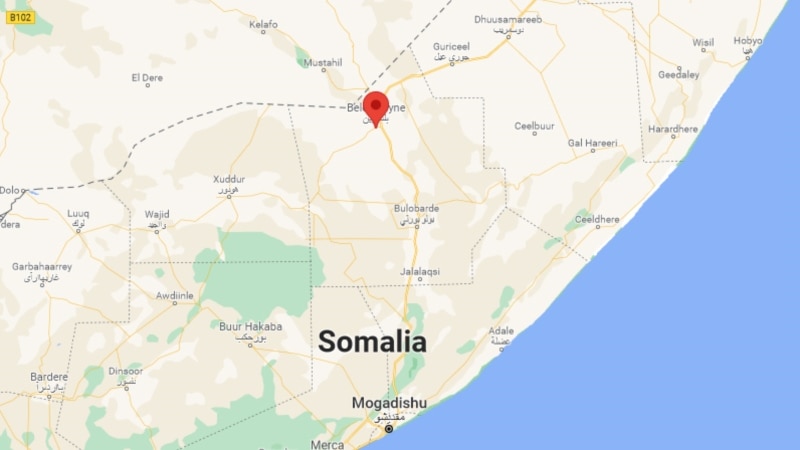
 1d
1dWASHINGTON — Gunmen stormed a hotel in the Somali city of Beledweyne on Tuesday, leaving at least five people dead and triggering an ongoing siege, according to witnesses and a Somali lawmaker. In an interview with VOA Somali, federal lawmaker Dahir Amin Jesow said local elders and government officials were meeting at the Qahira Hotel in central Somalia. “They attacked the hotel at dawn this morning, with an explosion and then gunmen stormed it. At least five people including two well-respected elders were killed, and five others were injured,” Jesow said. A VOA reporter in the town said at least six people have been confirmed dead, while the siege continues. The reporter said Somali security forces backed by Djiboutian soldiers, who are part of the African Union Support and Stabilization Mission in Somaila, AUSSOM, and units of Ethiopian soldiers could be seen surrounding the hotel. Local media reports say the death toll may be higher — up to 10 fatalities, including five al-Shabab militants, who were involved in the assault, and government soldiers. Plumes of smoke from the explosions could be seen throughout the town, and an eyewitness said there has been ongoing gunfire. “We can still hear sporadic gunfire from the hotel as some militants are still resisting and fighting with the security forces,” said Mohamed Qoone, a resident who witnessed the attack. Video circulating on social media shows parts of the Qahira Hotel reduced to rubble. The Islamist militant group al-Shabab immediately claimed responsibility for the attack. In a statement, the group said it had killed more than 10 people. The group frequently conducts bombings and gun assaults in Somalia, aiming to topple the government and impose its strict interpretation of Islamic Sharia law. This attack follows an operation conducted by Somalia’s National Intelligence and Security Agency (NISA) just hours earlier, which resulted in the deaths of 16 al-Shabab militants, including key leaders and fighters. According to NISA, “The operation dealt a significant blow to al-Shabab, eliminating key members of the group. In addition to the fatalities, the operation also led to the destruction of combat vehicles used by the militants.” Somali government soldiers, supported by local clan militias and the U.S. military, are conducting operations against al-Shabab in central Somalia, focusing on the Middle Shabelle and Hiran regions. VOA’s Sahra Abdi Ahmed contributed to this report.
Read MoreUganda says special forces deploy in South Sudan capital amid tensions
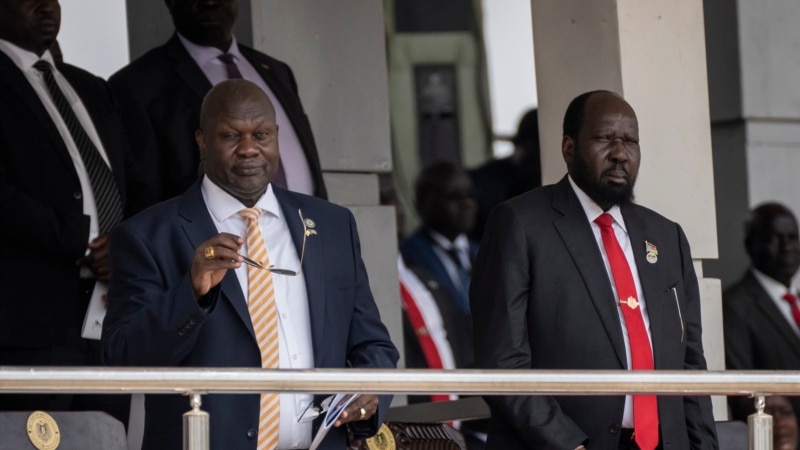
 1d
1dNAIROBI, KENYA — Uganda's military chief said Tuesday his country had deployed special forces in South Sudan's capital Juba to "secure it" as tensions between President Salva Kiir and his First Vice President Riek Machar stoke fears of a return to civil war. Tensions have been growing in recent days in South Sudan, an oil producer, after Kiir's government detained two ministers and several senior military officials allied with Machar. One minister has since been released. The arrests in Juba and deadly clashes around the northern town of Nasir are seen as jeopardizing 2018 peace deal that ended a five-year civil war between forces loyal to Kiir and Machar that cost nearly 400,000 lives. "As of two days ago, our Special Forces units entered Juba to secure it," Uganda's military chief, Muhoozi Kainerugaba, said in a series of posts on the X platform overnight into Tuesday. "We the UPDF (Ugandan military), only recognize one President of South Sudan, H.E. Salva Kiir ... any move against him is a declaration of war against Uganda," he said in another post. South Sudan government information minister and the military spokesperson did not pick up phone calls seeking comment. After the civil war erupted in South Sudan in 2013, Uganda deployed its troops in Juba to bolster Kiir's forces against Machar. They were eventually withdrawn in 2015. Ugandan troops were again deployed in Juba in 2016 after fighting reignited between the two sides but they also were eventually withdrawn. Uganda fears a full-blown conflagration in its northern neighbor could send waves of refugees across the border and potentially create instability. Kainerugaba did not say whether the latest deployment was in response to a request from Kiir's government or how long the troops would remain in South Sudan.
Read MoreOnly seven countries met WHO air quality standards in 2024, data shows
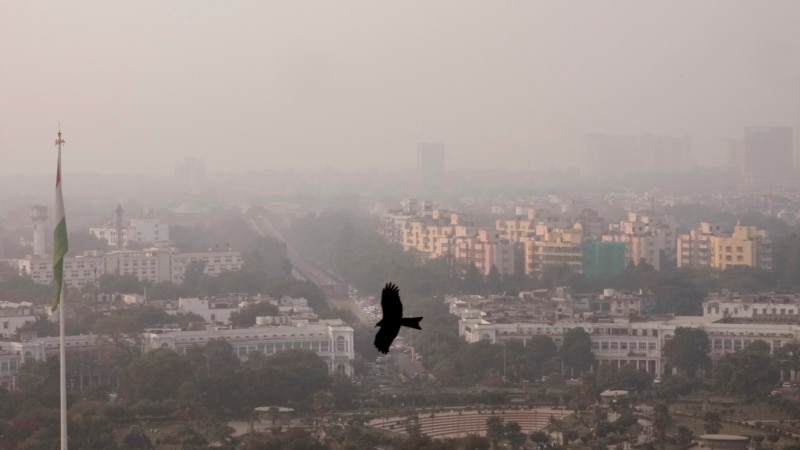
 1d
1dSINGAPORE — Only seven countries met World Health Organization air quality standards last year, data showed on Tuesday, as researchers warned that the war on smog would only get harder after the United States shut down its global monitoring efforts. Chad and Bangladesh were the world's most polluted countries in 2024, with average smog levels more than 15 times higher than WHO guidelines, according to figures compiled by Swiss air quality monitoring firm IQAir. Only Australia, New Zealand, the Bahamas, Barbados, Grenada, Estonia and Iceland made the grade, IQAir said. Significant data gaps, especially in Asia and Africa, cloud the worldwide picture, and many developing countries have relied on air quality sensors mounted on U.S. embassy and consulate buildings to track their smog levels. However, the State Department has recently ended the scheme, citing budget constraints, with more than 17 years of data removed last week from the U.S. government's official air quality monitoring site, airnow.gov, including readings collected in Chad. "Most countries have a few other data sources, but it's going to impact Africa significantly, because often times these are the only sources of publicly available real-time air quality monitoring data," said Christi Chester-Schroeder, IQAir's air quality science manager. Data concerns meant Chad was excluded from IQAir's 2023 list, but it was also ranked the most polluted country in 2022, plagued by Sahara dust as well as uncontrolled crop burning. Average concentrations of small, hazardous airborne particles known as PM2.5 hit 91.8 micrograms per cubic meter (mg/cu m) last year in the country, slightly higher than 2022. The WHO recommends levels of no more than 5 mg/cu m, a standard met by only 17% of cities last year. India, fifth in the smog rankings behind Chad, Bangladesh, Pakistan and the Democratic Republic of Congo, saw average PM2.5 fall 7% on the year to 50.6 mg/cu m. But it accounted for 12 of the top 20 most polluted cities, with Byrnihat, in a heavily industrialized part of the country's northeast, in first place, registering an average PM2.5 level of 128 mg/cu m. Climate change is playing an increasing role in driving up pollution, Chester-Schroeder warned, with higher temperatures causing fiercer and lengthier forest fires that swept through parts of Southeast Asia and South America. Christa Hasenkopf, director of the Clean Air Program at the University of Chicago's Energy Policy Institute (EPIC), said at least 34 countries will lose access to reliable pollution data after the U.S. program was closed. The State Department scheme improved air quality in the cities where the monitors were placed, boosting life expectancy and even reducing hazard allowances for U.S. diplomats, meaning that it paid for itself, Hasenkopf said. "(It) is a giant blow to air quality efforts worldwide," she said.
Read MoreVOA Mandarin: DRC wants mineral deal with US, potential check on China's dominance
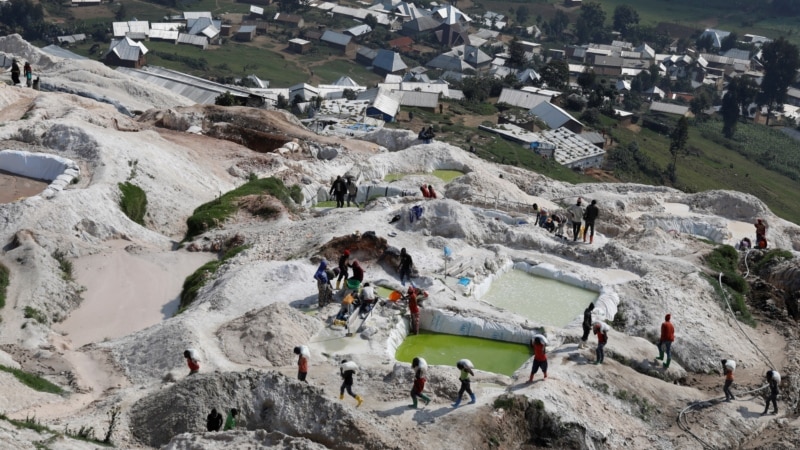
 1d
1dU.S. President Donald Trump, in a speech last week, vowed to take “historic action” to “dramatically expand production of critical minerals and rare earths.” The latest announcement came as the Democratic Republic of Congo approached the United States to strike a Ukraine-like minerals deal. Experts say the U.S .could offer a viable alternative to the DRC and check China’s influence while ensuring access to critical minerals for Washington. But they caution that a mineral agreement is also fraught with challenges. Click here for the full story in Mandarin.
Read MoreUK charity calls to close gender employment gap for disabled

 1d
1dNAIROBI — A British charity for the disabled, citing World Bank data, says the world could gain trillions annually in Gross Domestic Product if women were employed at the same rate as men. Failure to close gender employment gaps reduces a country’s economic growth by 20% on average, according to the data. In many countries, women face multiple challenges when seeking employment or starting a business. Gender discrimination alone can drive women into poverty, but the risk increases if paired with disabilities. In recognition of International Women’s Day, Sightsavers International, a British nongovernmental agency that aims to prevent avoidable blindness and ensure equality for the visually impaired, cited the World Bank’s figures showing that global GDP would increase from $106 trillion to $127 trillion if women were employed at the same rate as men. Michelle Madau, a 41-year-old beautician from Zimbabwe, is living with osteogenesis imperfecta, a brittle-bone disease. Despite her disorder, she helps people like her learn how to run a business. "I am mentoring the upcoming beauticians who are disabled and I am availing myself, making sure I am there when needed, speaking to them, helping them build up their own businesses," Madau said. "Of course, not all of them are in the beauty industry; whichever line of business I am familiar with, I am always there to assist them because I also want to see them win, just like I am winning right now." Lydia Rosasi, 29, works at the office of the Kenyan government spokesperson, where she assists people living with blindness, deafness and other disabilities in accessing government communications. She says she bettered herself to stand out in the job market. "For me, one of the greatest pillars in terms of navigating this double bias has been education and skills development. This has been the crucial thing that has kept me afloat as I go through these challenges," Rosasi said. "For example, in 2021, I joined the IT Bridger Academy and at that time the digital skills were gaining a lot of prominence in the job market. So it gave me confidence and the capabilities that opened my doors. And then I have found supportive mentors and leaders who have been very important." Many African women struggle to get jobs, either because they were married off or became mothers at a young age, leaving them unable to finish their studies. Others encounter discrimination or sexual violence in their workplaces. Experts say empowering girls with education and allowing them to finish school is one way to reduce the gender employment gap. Lianna Jones works on economic empowerment at Sightsavers. She says closing the gender gap requires policy reforms and cultural change. "In terms of closing the gender gap in employment and entrepreneurship, this requires coordinated interventions at multiple levels," Jones said. "At the policy level, we need to eliminate discriminatory laws and regulations that restrict women's economic participation. Women with disabilities need specialized approaches that address both gender- and disability-related barriers simultaneously, and lastly, we need to challenge social norms to engage with community leaders, men, and boys." According to Equal Measures 2030, a coalition of national, regional and global leaders from feminist networks, civil society and international development, women in at least 77 countries are prohibited from working in the same jobs or sectors as men. In Africa, only five countries have a full set of laws mandating workplace equality for women.
Read MoreClashes continue in eastern DRC days after attack on civilians left many dead
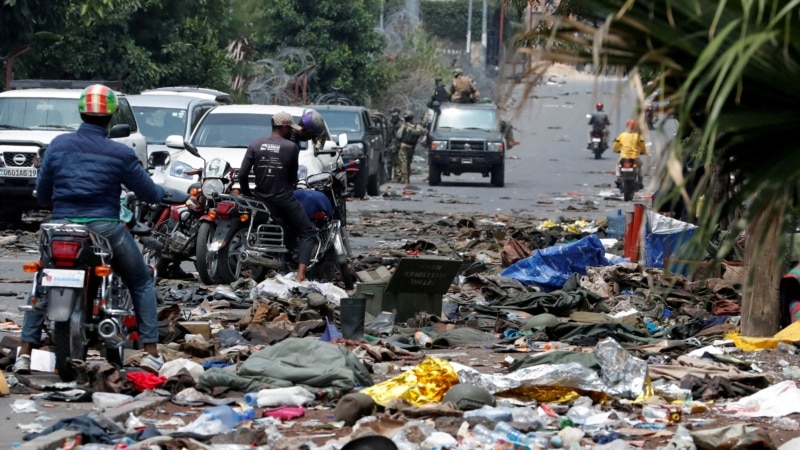
 1d
1dFighting between M23 rebels and pro-Congo militias was underway Sunday in Nyabiondo, about 100 km north of Goma in eastern Congo, residents said, days after a nearby attack left a heavy civilian death toll, according to the United Nations and an NGO. The M23 rebel group has seized swathes of mineral-rich eastern Congo since the start of the year. "M23 has taken Nyabiondo since 11 a.m. [local time] (0900 GMT), following clashes," Kipanda Biiri, an official from the local administrative authority who was fleeing the area, told Reuters. "The enemy opened a large-scale assault on Nyabiondo this morning," said Telesphore Mitondeke, a civil society rapporteur in Masisi, the area where Nyabiondo is located, referring to the M23 rebels. "For the moment there is shooting from every direction in the center of Nyabiondo, where the clashes are taking place." The fighting follows clashes last week between M23 and a pro-Congolese government militia in the village of Tambi, about 18 km northeast of the town of Masisi, which culminated in an attack overnight on March 5 leaving many civilian casualties, according to the head of a local NGO. An internal United Nations memo seen by Reuters said Sunday that between 13 and 40 civilians were believed to have been killed in that attack. Separately, a spokesperson for the rebel alliance that includes M23 said Sunday on X that one of the pro-government militias that operates in eastern Congo had switched sides and joined its alliance. The spokesperson for the group that militia had been a part of said in a statement that the rest of the group remained loyal to the Congolese government and its army. M23 rebels say that they intend to seize power in Congo's capital Kinshasa. They also accuse Congo's government of not living up to previous peace deals and fully integrating Congolese Tutsis into the army and administration. The group's spread into new mineral-rich territories this year also gives it scope to acquire more mining revenue, analysts say. The Democratic Republic of Congo government has repeatedly accused Rwanda of supporting the M23 rebel group, a claim that Rwanda denies. Kigali, in turn, alleges that Kinshasa collaborates with the Democratic Forces for the Liberation of Rwanda, or the FDLR, a Hutu armed group with ties to the perpetrators of the 1994 Rwandan genocide, an allegation the DRC rejects. The DRC has officially designated the M23 rebel group as a terrorist organization, while the United Nations and the United States classify it as an armed rebel group.
Read MoreUN: Iran using drones to enforce hijab law
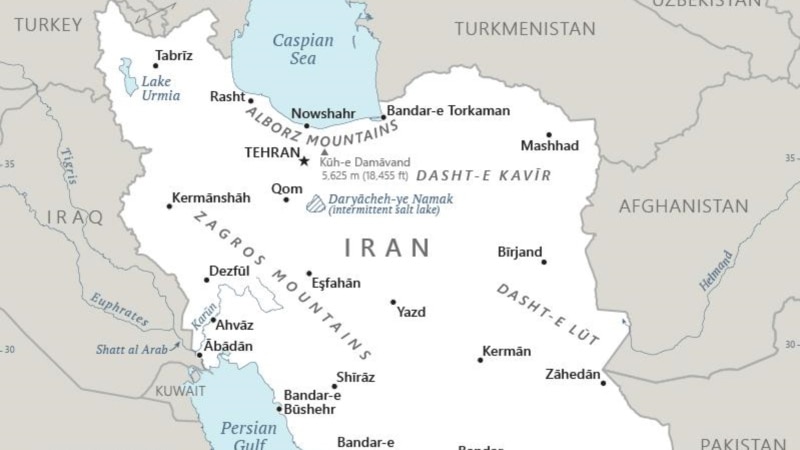
 1d
1dA Friday report by the United Nations says Iran is using advanced technology, including drones, facial recognition and a citizen-reporting app to crack down on violations of its mandatory hijab laws. A key element of the effort is the government-backed Nazer app, which enables the police and "vetted" members of the public to report alleged violations by women in vehicles, including those in ambulances, mass transit and taxis. The report describes the app as allowing users to upload the vehicle license plate, location and time of an alleged violation. It then, according to the report, alerts police. Then, according to the report, the app "triggers a text message (in real-time) to the registered owner of the vehicle, warning them that they had been found in violation of the mandatory hijab laws, and that their vehicles would be impounded for ignoring these warnings." According to the report, authorities are using drones in Tehran and the southern part of the country to monitor hijab compliance in public areas, as well as new facial recognition software said to have been installed last year at the entrance of Tehran’s Amirkabir University. The report is to go to the U.N. Human Rights Council on Tuesday.
Read MoreBelgium makes arrests in corruption probe linked to EU

 1d
1dBRUSSELS — Belgian federal prosecutors announced Thursday the arrests of several people as part of a corruption probe linked to the European Parliament amid reports in local media that Chinese company Huawei bribed EU lawmakers. The arrests came as an investigation by Le Soir newspaper and other media said lobbyists working for the Chinese telecoms giant are suspected of bribing current or former European Parliament members to promote the company’s commercial policy in Europe. About 100 federal police officers carried out 21 searches in Brussels, the Flanders and Wallonia regions, and Portugal, the federal prosecutor’s office said. The suspects would be questioned over “alleged involvement in active corruption within the European Parliament, as well as for forgery and use of forgeries,” prosecutors said. “The offenses were allegedly committed by a criminal organization.” Huawei public relations representatives in London did not respond to an emailed request for comment and could not be reached by phone. The European Parliament said only that the assembly “takes note of the information" and "always cooperates fully with the judicial authorities.” Huawei, which makes cellphones and is the biggest maker of networking gear for phone and internet carriers, has been caught in tensions between the United States and China over technology and trade. Some European nations have followed Washington’s lead and banned Huawei’s equipment from next-generation mobile networks over allegations that it poses a security risk that could help facilitate Chinese spying. The company has repeatedly denied this. European Commission spokesperson Thomas Regnier said the EU’s executive branch had no comment regarding the investigation, but underlined security concerns the commission has about Huawei and Europe’s fifth-generation mobile phone networks. “The security of our 5G networks is obviously crucial for our economy,” Regnier told reporters. “Huawei represents materially higher risks than other 5G suppliers.” EU member states should swiftly "adopt decisions to restrict or to exclude Huawei from their 5G networks,” Regnier said. “A lack of swift action would expose the EU as a whole to a clear risk.” The federal prosecutor's office, which did not name Huawei, said it believes there was corruption “from 2021 to the present day" in various forms, "such as remuneration for taking political positions or excessive gifts such as food and travel expenses or regular invitations to football matches." Prosecutors say payments might have been disguised as business expenses and in some cases may have been directed to third parties. They would also look to "detect any evidence of money laundering.” Police seized several documents and objects during the searches. Staff at Huawei’s offices in Brussels declined to comment and turned the lights off inside to avoid photographs taken through the window. According to Follow The Money, an investigative journalism platform, one of the main suspects in the probe is 41-year-old Valerio Ottati, a Belgian Italian lobbyist who joined Huawei in 2019. Before becoming Huawei’s EU public affairs director, Ottati was an assistant to two Italian MEPs who were both members of a European Parliament group dealing with China policy, Follow the Money reported. This is the second corruption case targeting the EU Parliament in less than three years. In December 2022, the legislature was shaken by a corruption scandal in which Qatari officials were accused of bribing EU officials to play down labor rights concerns ahead of the soccer World Cup.
Read MoreMeta tests 'Community Notes' to replace fact-checkers

 1d
1dSAN FRANCISCO — Social media giant Meta on Thursday announced it would begin testing its new "Community Notes" feature across its platforms on March 18, as it shifts away from third-party fact-checking toward a crowd-sourced approach to content moderation. Meta's chief executive Mark Zuckerberg announced the new system in January as he appeared to align himself with the incoming Trump administration, including naming a Republican as the company's head of public policy. The change of system came after years of criticism from supporters of U.S. President Donald Trump, among others, that conservative voices were being censored or stifled under the guise of fighting misinformation, a claim professional fact-checkers vehemently reject. Meta has also scaled back its diversity initiatives and relaxed content moderation rules on Facebook and Instagram, particularly regarding certain forms of hostile speech. The initiative, similar to the system already implemented by X (formerly Twitter), will allow users of Facebook, Instagram and Threads to write and rate contextual notes on various content. Meta said approximately 200,000 potential contributors in the United States have already signed up across the three platforms. The new approach requires contributors to be over 18 with accounts more than six months old that are in good standing. During the testing period, notes will not immediately appear on content and the company will gradually admit people from the waitlist and thoroughly test the system before public implementation. Meta emphasized that the notes will only be published when contributors with differing viewpoints agree on their helpfulness. "This isn't majority rules," the company said. Moreover, unlike fact-checked posts that often had reduced distribution, flagged content with Community Notes will not face distribution penalties. Notes will be limited to 500 characters, must include supporting links and will initially support six languages commonly used in the United States: English, Spanish, Chinese, Vietnamese, French and Portuguese. "Our intention is ultimately to roll out this new approach to our users all over the world, but we won't be doing that immediately," the company said. "Until Community Notes are launched in other countries, the third party fact checking program will remain in place for them," it added. Meta said that it would not be "reinventing the wheel" and will use X's open-source algorithm as the basis of its system. U.N. Secretary-General Antonio Guterres last month warned that the rollbacks to fact-checking and moderation safeguards were "reopening the floodgates" of hate and violence online.
Read MoreLaunch pad problem delays SpaceX flight to replace NASA's stuck astronauts

 1d
1dCAPE CANAVERAL, Florida — A launch pad problem prompted SpaceX to delay a flight to the International Space Station on Wednesday to replace NASA's two stuck astronauts. The new crew needs to get to the station so that Butch Wilmore and Suni Williams can head home after nine months in orbit. Concerns about a critical hydraulic system arose less than four hours before the Falcon rocket's planned evening liftoff from NASA's Kennedy Space Center. As the countdown clocks ticked down, engineers evaluated the hydraulics used to release one of the two arms clamping the rocket to its support structure. This structure needs to tilt back just before liftoff. Already strapped into their capsule, the four astronauts awaited a final decision, which came down with less than an hour remaining in the countdown. SpaceX canceled for the day. The company did not immediately announce a new launch date but noted the next try could come as early as Thursday night. Once at the space station, the U.S., Japanese and Russian crew will replace Wilmore and Williams. The two test pilots had to move into the space station for an extended stay after Boeing's new Starliner capsule encountered major breakdowns in transit. Starliner's debut crew flight was supposed to last just a week, but NASA ordered the capsule to return empty and transferred Wilmore and Williams to SpaceX for the return leg.
Read MoreDirt-powered sensors help farmers optimize their fields

 1d
1dAn innovative solution to remotely power devices using natural biological processes could help farmers get the most from their fields. VOA’s Kane Farabaugh has more.
Read MoreChina boosting development of AI for use in trade war with US
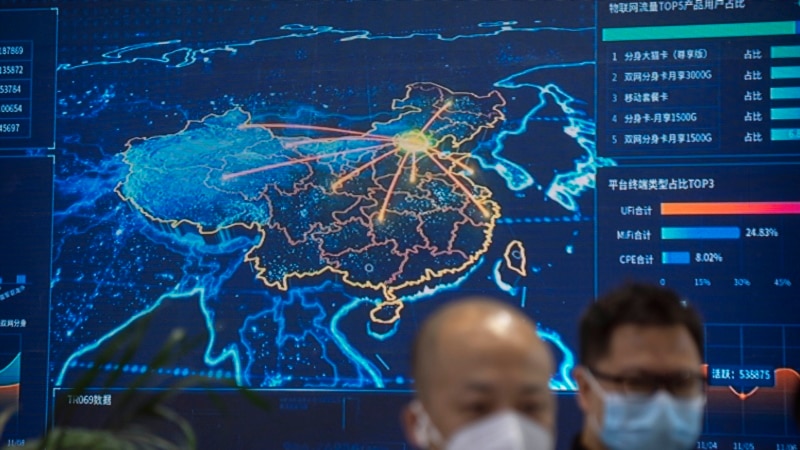
 1d
1dNEW DELHI — Encouraged by the enthusiastic reception to its DeepSeek artificial intelligence platform in January, China's leaders are going all out to encourage AI companies to harness the power of this technology to compete with the United States and other countries in business and military spheres. China considers AI an important tool to handle U.S. restrictions on Chinese business, particularly after DeepSeek shook up Wall Street, resulting in a loss of $589 billion for Nvidia stockholders in late January. "The government in China works directly with the private sector and universities in the advancement and deployment of AI technology and are reducing their dependence on imports of high-technology products," said Lourdes Casanova, director of Cornell University's Emerging Markets Institute. The past few weeks have seen China rolling out several new AI models, including Manus, which experts say can rival the latest model of ChatGPT. Industry experts were more than surprised to find that DeepSeek was equally efficient as ChatGPT, though it used older generation Nvidia chips. The U.S. has banned the supply of advanced chips. "China and the U.S. have pulled way out front in the AI race. China used to be one to two years behind the U.S. Now, it is likely two to three months," Jeffrey Towson, owner of Beijing-based TechMoat Consulting, told VOA. "Alibaba's Qwen is now a clear leader internationally in LLMs [large language models]. Chinese Kling AI and Minimax are arguably the global leaders in video generation," Towson said. Government involvement In 2017, China released an AI development program to make the country a world leader by 2030. The government's Next Generation Artificial Intelligence Development Plan said that AI would be adopted across different sectors and drive economic transformation. "China has the most elaborate AI strategy compared to any other country," Rogier Creemers, assistant professor in Modern Chinese Studies at Leiden University in the Netherlands, told VOA. China has established a National Computing Power Grid — somewhat like electricity grids — making it possible for Chinese AI companies to invest less in their own computing power. In the U.S., each company must fend for itself, Creemers said. Competition ChatGPT's updated GPT4 large language model has gotten the attention of several top-ranking CEOs of Chinese tech companies. Baidu chief Robin Li recently said his firm was under "huge pressure and a sense of crisis" after seeing the updated ChatGPT. Baidu, which has launched Ernie Bot, said "the gap [between China] and leading international levels [in the field] has widened." "AI plus robotics is likely where China will take a commanding lead over the U.S., just like in EVs,” Towson said. “Chinese companies like Unitree are already pulling ahead. Watch for China to surprise everyone in personalized robots, industrial robots and speciality robots,” he said. Communist Party control Chinese President Xi Jinping recently convened a meeting with heads of private companies, including tech firms, calling on them to "show your talent" in overcoming challenges such as an economic slowdown and U.S. restrictions on Chinese business. "There are discussions that the growth of large language models — the technology behind chatbots like DeepSeek and ChatGPT — may be hindered by media censorship, because the models will have less diverse data to work with," said Creemers. On the other hand, the government's control ensures industrial policy coordination, which is helpful in the growth of AI in China. China is focusing more on specialized software for health and other industries, which can largely tolerate political censorship. Chinese AI models are improving diagnostic accuracy in diverse areas from detecting rib fractures to cancer. US ban on advanced chips "It will take some time, but it would not be a surprise if China is also soon capable of building advanced chips for AI," Cornell’s Casanova said. Companies such as Huawei have shown that they can design and manufacture advanced chips successfully, thereby overcoming restrictions imposed by the U.S., she said. Towson said China is 100% dedicated to building an independent semiconductor supply chain. "It is advancing faster than anyone thought possible. But the frontier is always advancing, and it's unclear how this will play out over time," he said. "But you can do a lot with software,” Creemers said. “China can work with more chips with less computing power or with fewer sophisticated chips." The risk for China is not limited to chips, because the Trump administration could impose restrictions on the Chinese AI model. It could also react to China’s restriction on the use of ChatGPT, because it can violate its censorship rules. AI and the military China's air force is using AI-powered biometric tests to screen potential pilots as part of a rigorous hiring process, according to state broadcaster CCTV. "AI now plays a crucial role in interpreting candidates' biological signals, revealing underlying health risks that might not be immediately apparent to human evaluators," CCTV said. "This data-driven approach allows the air force to predict long-term risks, ultimately ensuring that only the most suitable candidates are chosen." Chinese researchers have also revealed that the Chinese army has been using Meta's publicly available Llama model to develop an AI tool for potential military applications.
Read MoreUS drops antitrust case against Google over AI, not Chrome

 1d
1dThe U.S. Department of Justice dropped a proposal Friday to force Alphabet's Google to sell its investments in artificial intelligence companies, including OpenAI competitor Anthropic, to boost competition in online search. The DOJ and a coalition of 38 state attorneys general still seek a court order requiring Google to sell its Chrome browser and take other measures aimed at addressing what a judge said was Google's illegal search monopoly, according to court papers filed in Washington. "The American dream is about higher values than just cheap goods and 'free' online services. These values include freedom of speech, freedom of association, freedom to innovate, and freedom to compete in a market undistorted by the controlling hand of a monopolist," prosecutors wrote. A spokesperson for Google said the "sweeping proposals continue to go miles beyond the court's decision, and would harm America's consumers, economy and national security." A spokesperson for Anthropic did not immediately respond to a request for comment. U.S. President Donald Trump has said he would continue a crackdown on Big Tech, which began during his first term and continued into former U.S. President Joe Biden's administration. Trump has tapped veteran antitrust attorney Gail Slater to lead the DOJ's efforts. Google holds a minority stake worth billions of dollars in Anthropic. Losing the investment would give a competitive advantage to OpenAI and its partner Microsoft, Anthropic wrote to the court in February. Evidence prosecutors obtained since making their draft recommendation in November showed a risk that banning Google from AI investments "could cause unintended consequences in the evolving AI space," they said in the final proposal Friday. They asked that Google be required to give prior notice to the government about future investments in generative AI. Google, which has said it will appeal, has made its own proposal that would loosen agreements with Apple and others to set Google as the default search engine on new devices. U.S. District Judge Amit Mehta has scheduled a trial on the proposals for April. The blockbuster case is one of several U.S. antitrust cases against Big Tech companies. Apple, Meta Platforms and Amazon.com also face allegations of maintaining illegal monopolies in their respective markets. Since Trump's reelection, Google has sought to make the case that the DOJ's approach in the case would hobble the company's ability to compete in AI and "jeopardize America's global economic and technological leadership." Many of the measures prosecutors proposed in November remain intact with a few tweaks. For example, a requirement that Google share search query data with competitors now says that Google can charge a marginal fee for access and that the competitors must not pose a national security risk. The proposal drew statements of support from Democratic and Republican attorneys general as well as the Alphabet Workers Union-CWA.
Read MoreGreenland and Afghanistan: Frontiers in race for critical minerals

 1d
1dJust as discoveries of fossil fuel reserves helped to shape the 20th century, the race for critical minerals is shaping the 21st. These minerals are seen as strategically crucial for modern economies, including those used in construction, energy and manufacturing — particularly for semiconductors and other technology applications. Where mineral resources are located and extracted has often played a major role in geopolitical and economic relations. Today, the world’s attention is turning to two places believed to be rich in untapped reserves — but accessing each of them comes with unique challenges. Afghanistan Sitting at the intersection of multiple tectonic plates, Afghanistan’s geology has resulted in extensive and diverse mineral deposits. Historically, its territory was a primary source of copper and gold as well as gems and semiprecious stones, particularly lapis lazuli, a stone prized for its intense blue color. Today, Afghanistan is estimated to hold nearly $1 trillion worth of mineral reserves. This includes 60 million tons of copper, 183 million tons of aluminum and 2.2 billion tons of iron ore. Gold is mined on an artisanal scale in the northern and eastern provinces, while the mountainous north contains valuable marble and limestone deposits used in construction. The China National Petroleum Corporation also pumps oil in the north, though Afghanistan has no domestic refining capability and is reliant on neighbors such as Turkmenistan, Iran and Kyrgyzstan for fuel. Most of the international focus, however, is on Afghanistan’s other metal deposits, many of which are crucial to emerging technologies. These include cobalt, lithium and niobium, used in batteries and other electronics. The country's unexplored lithium reserves may even exceed those of Bolivia, currently the world’s largest. Afghanistan also holds major deposits of rare earth metals like lanthanum, cerium and neodymium, which are used for magnets and semiconductors as well as other specialized manufacturing applications. One obstacle to extracting Afghanistan’s minerals is its terrain, considered the eighth most mountainous in the world. But security has been a much bigger impediment. Amid the political instability that followed the first fall of the Taliban in 2001, many gemstone and copper mines operated illegally under the command of local militants. With workers paid very little and the product smuggled out to be sold in neighboring Pakistan, the Afghan people saw little benefit from these extraction operations. Since retaking power in 2021, the Taliban, who have been eager to make use of the country’s mineral wealth and increase exports, are hampered by a lack of diplomatic recognition and their designation as a terrorist group by multiple nations. This is, however, beginning to change, as some countries establish de facto diplomatic ties. In 2024, the Taliban government’s resource ministry announced that it had secured investments from China, Qatar, Turkey, Iran and the United Kingdom. China, which was the first nation to accredit a Taliban-appointed ambassador, is expected to be a major player in Afghanistan’s extractive industries as part of its Belt and Road Initiative. However, as newly discovered deposits require an average of 16 years to develop into operational mines, harnessing Afghanistan’s mineral potential will take a great deal of investment and time — if the political and security issues can somehow be worked out. Greenland For millions of years, Greenland has been mostly covered by an ice sheet, habitable only along coastal areas. Despite some offshore petroleum and gas exploration, fishing and whaling have remained the primary nongovernment industries. Now, as ice recedes amid climate change, the large island’s frozen interior offers new opportunities in untapped mineral resources. These include more common metals such as copper and gold, as well as titanium and graphite. But as elsewhere, there is even greater interest in Greenland’s deposits of technology-critical minerals. The autonomous Danish territory is estimated to contain deposits of 43 of the 50 minerals designated by the United States as crucial to national security. Among these are the sought-after rare earth metals, in addition to other metals with technological applications such as vanadium and chromium. Currently, a majority of the world’s rare earth metals are mined in China, making Greenland’s deposits vital for countries seeking to reduce their dependence on Chinese imports. This strategic importance is one of the factors that led U.S. President Donald Trump to propose buying Greenland from Denmark. Greenland’s government has issued nearly 100 mining licenses to companies like KoBold Metals and Rio Tinto. But these have mostly involved exploration, with only two mines currently operating in the country. Getting a mine to production can take as long as a decade, because it involves several unique challenges. One such hurdle is Greenland’s strong environmentalist movement, which has successfully shut down mining projects for safety concerns. Rare earths pose a particular issue, because they must be extracted from other ores — a process that can cause waste and pollution. At the Kvanefjeld site in the south, metals were to be extracted from uranium ore until the fear of radioactive pollution led to a ban. The receding ice and warming climate have made extraction easier not only by revealing more territory but also by extending possible working hours and easing ship navigation. However, the environment remains harsh and inhospitable, and the island suffers from a lack of infrastructure, with few roads or energy facilities outside major settlements. Nevertheless, Greenland’s government considers the mining industry to be an important means of developing the economy. Conclusion Shaped by both politics and geography, Greenland and Afghanistan have become two major frontiers in the global scramble for critical minerals. Which parties will have the opportunity to benefit from their resources will depend on the interplay of military power, economics and diplomacy.
Read MoreTrump to host White House crypto summit

 1d
1dWASHINGTON — U.S. President Donald Trump on Friday hosts top cryptocurrency players at the White House, a political boost for an industry that has struggled to gain legitimacy -- and where the Republican president faces conflict of interest concerns. The president's "crypto czar," Silicon Valley investor David Sacks, has invited prominent founders, CEOs and investors along with members of a Trump working group, to craft policies aimed at accelerating crypto growth, and providing legitimacy that the industry has long sought. On Thursday night, Trump signed an executive order establishing a "Strategic Bitcoin Reserve," a move that Sacks said made good on a campaign promise to an increasingly important component of his coalition. Summit guests include twins Cameron and Tyler Winklevoss, founders of crypto platform Gemini, as well as Brian Armstrong of Coinbase and Michael Saylor, the boss of major bitcoin investor MicroStrategy. In a post on X, Sacks said the event would take place as a roundtable, and despite industry interest, the White House would have to "keep it small." For believers, cryptocurrencies represent a financial revolution that reduces dependence on centralized authorities while offering individuals an alternative to traditional banking systems. Bitcoin, the world's most traded cryptocurrency, is heralded by advocates as a substitute for gold or a hedge against currency devaluation and political instability. Memecoins Critics, meanwhile, maintain that these assets function primarily as speculative investments with questionable real-world utility that could leave taxpayers on the hook for cleaning up if the market crashes. The proliferation of "memecoins" -- cryptocurrencies based on celebrities, internet memes, or pop culture items rather than technical utility -- presents another challenge. Much of the crypto industry frowns upon these tokens, fearing they tarnish the sector's credibility, amid reports of quick pump-and-dump schemes that leave unwitting buyers paying for assets that end up worthless. Trump also faces conflict of interest concerns. U.S. crypto investors were major supporters of Trump's presidential campaign, contributing millions of dollars toward his victory in hopes of ending the Biden administration's deep skepticism toward digital currencies. Trump also has significant financial ties to the sector, partnering with exchange platform World Liberty Financial and launching the "Trump" memecoin in January, as did his wife, Melania. Once hostile to the crypto industry, Trump has already taken significant steps to clear regulatory hurdles. Under Thursday's executive order, the bitcoin stockpile will be composed of digital currency seized in U.S. criminal proceedings. The use of these assets "means it will not cost taxpayers a dime," Sacks said in a post Thursday night on X. Sacks has said that if previous administrations had held onto their digital holdings over the past decade, they would be worth $17 billion today. Trump also appointed crypto advocate Paul Atkins to head the Securities and Exchange Commission (SEC). Under Atkins, the SEC has dropped legal proceedings against major platforms like Coinbase and Kraken that were initiated during Biden's term. The previous administration had implemented restrictions on banks holding cryptocurrencies -- which have since been lifted -- and allowed former SEC chairman Gary Gensler to pursue aggressive enforcement. However, meaningful change will likely require congressional action, where crypto legislation has remained stalled despite intense lobbying efforts led by investors, including Trump ally Marc Andreessen, an influential venture capitalist.
Read MoreTrump calls to end US government's semiconductor subsidy program
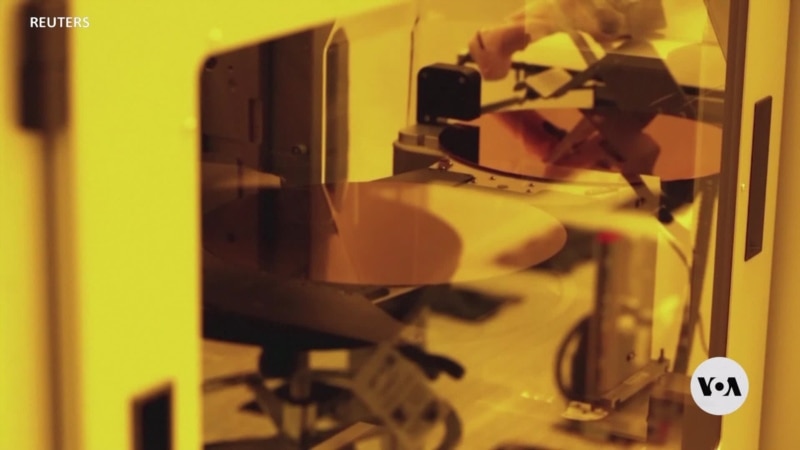
 1d
1dPresident Donald Trump is signaling a major change in how the U.S. will support growth in key domestic industries such as semiconductors. Michelle Quinn reports.
Read MoreMusk fails in bid to block OpenAI becoming for-profit business

 1d
1dSAN FRANCISCO, CALIFORNIA — A U.S. judge on Tuesday denied Elon Musk's request to prevent OpenAI from becoming a for-profit business in a loss for the Tesla tycoon amid his feud with Sam Altman. U.S. District Court Judge Yvonne Gonzalez Rogers ruled that Musk and his xAI startup failed to prove an injunction against OpenAI was necessary as the case heads to trial. Musk sued in California federal court to stop OpenAI from transitioning from a nonprofit to a for-profit business, arguing the startup violated antitrust law and betrayed his trust in their mission as a co-founder of OpenAI. The judge wrote that, while Musk did not prove the need for an injunction, she is prepared to expedite a trial on that claim later this year. The ruling leaves OpenAI free to continue its transition from nonprofit to for-profit enterprise. Musk's injunction bid argued that OpenAI's co-founders, including chief executive Altman, "took advantage of Musk's altruism in order to lure him into funding the venture," according to court documents. Musk contended in filings that it was clear his backing of OpenAI was contingent on it remaining a nonprofit, offering a few email exchanges to support the claim. "Whether Musk's emails and social media posts constitute a writing sufficient to constitute an actual contract or charitable trust between the parties is debatable," the judge said in her ruling. OpenAI's board chairman in February rejected a Musk-led offer to buy the valuable artificial intelligence company for $97.4 billion. "OpenAI is not for sale, and the board has unanimously rejected Mr. Musk's latest attempt to disrupt his competition," OpenAI Board Chair Bret Taylor said in a statement posted by the company on Musk-owned X, formerly Twitter. OpenAI currently operates in a hybrid structure, as a nonprofit with a money-making subsidiary. The change to a for-profit model, one that Altman says is crucial for the company's development, has exacerbated ongoing tensions with Musk. Musk and Altman were among the 11-person team that founded OpenAI in 2015, with the former providing initial funding of $45 million. Three years later, Musk left the company, with OpenAI citing "a potential future conflict for Elon ... as Tesla continues to become more focused on AI." Musk established his own artificial intelligence company, dubbed xAI, in early 2023 after OpenAI ignited global fervor over the technology. The massive cost of designing, training, and deploying AI models has compelled OpenAI to seek a new corporate structure that would give investors equity and provide more stable governance.
Read MoreVOA Mandarin: Who has better humanoid robots, US or China?

 1d
1dChinese tech firms and state media have spotlighted humanoid robots, which have grown in popularity since the Unitree G1 appeared to run, jump, dance and perform martial arts-like movements in a recent demonstration. Both the United States and China are leaders in humanoid robot technology. But industry analysts believe that the United States is superior in AI technology, which is responsible for the robot's "brain," while Chinese technology companies have flourished in the hardware manufacturing capabilities of the robot's "body." Click here for the full story in Mandarin.
Read MoreChina uses DeepSeek, other AI models, for surveillance and information attacks on US
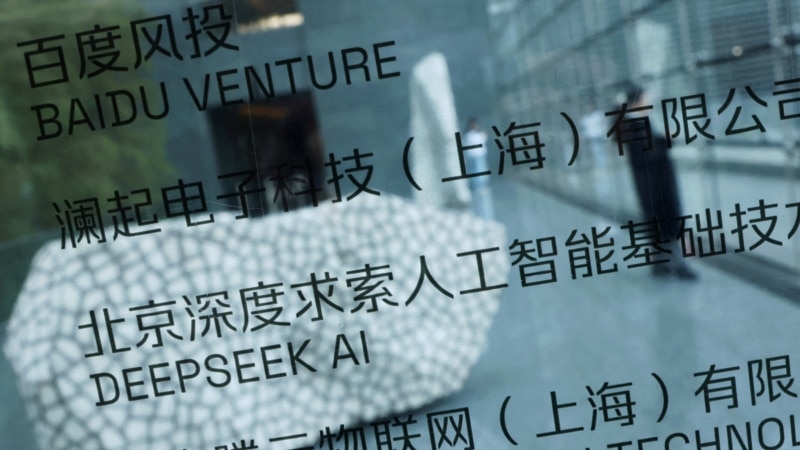
 1d
1dThe United States may become the second country after Australia to ban China’s DeepSeek artificial intelligence on government devices. U.S. Representatives Josh Gottheimer and Darin LaHood introduced a bipartisan bill proposing the ban. In their letter to 47 U.S. governors and the mayor of Washington, the congressmen warned that DeepSeek could pose security risks to sensitive government data and cybersecurity and Americans’ privacy, NBC News reported on March 3. China denies the allegations. However, concerns highlighted by the U.S. lawmakers and state officials are not without merit, experts say. The Chinese government has reportedly also used AI models for mass surveillance, including the collection of biometric data and social media listening operations that report to China's security services and the military, as well as for information attacks on U.S. and Chinese dissidents abroad. At least three leading Chinese surveillance and security companies — TopSec, QAX and NetEase — announced the integration of DeepSeek to enhance their services. TopSec and QAX provide services directly to the Chinese government, and NetEase made it clear that DeepSeek will improve their cyber censorship and surveillance capabilities. Over the past decade, the Chinese government has been investing heavily in AI-driven biometric data capturing, face recognition and surveillance technologies such as "smart cities," the Skynet project, and the Sharpe Eyes program, which can monitor all aspects of an individual's public life, Wenhao Ma of VOA’s China Division reported. In January, Canadian cybersecurity firm Feroot Security uncovered a code imbedded in DeepSeek’s login processes that shares user information with Chinese state-owned communication company China Mobile, AP reported. The Associated Press described the code as a “heavily obfuscated computer script that when deciphered shows connections to computer infrastructure owned by China Mobile.” The U.S. banned China Mobile in 2019 following intelligence reports that it serves as the Chinese military’s spy arm. China-based actors have been using ChatGPT along with DeepSeek models to generate phishing email and disinformation attacks on the U.S. “on behalf of unspecified clients in China,” OpenAI said in its February report. OpenAI identified and blocked a cluster of China-originated accounts involved in malicious activities, such as Qianyue Overseas Public Opinion AI Assistant, reportedly designed to ingest and analyze posts and comments related to Chinese politics and human rights from platforms such as X, Facebook, YouTube, Instagram, Telegram and Reddit. The purpose of the operation was reportedly "to feed the resulting insights to the Chinese authorities" such as "Chinese embassies abroad, and to intelligence agents monitoring protests in countries including the United States, Germany and the United Kingdom,” OpenAI said. A set of ChatGPT accounts that OpenAI banned in February had been involved in Chinese influence operations focused on generating short comments in English and long-form Spanish-language articles critical of the United States published in local and national media outlets across Latin America and Spain. One of the Chinese companies planting the articles in the Spanish-language outlets was Jilin Yousen Culture Communication Co., a subsidiary of the government-tied Beijing United Publishing House. VOA reviewed nine of the Chinese AI-generated articles published in Spanish-language media between October and November 2024 as identified by OpenAI. Two — in Mexico’s El Universal and Peru’s El Popular — criticized the United States' use of sanctions targeting foreign governments and individuals. The El Universal op-ed described the U.S. sanctions on Iran’s oil industry for Tehran’s backing of terrorist groups Hamas and Hezbollah as exposing the U.S.' “impotence” in dealing with global politics and the “rapid decline” of its “moral standing.” Similarly, El Popular painted U.S. sanctions on a Hamas affiliate as “insane” and an “attack on the rights of Palestinian people.” An article in Peru’s La Republica presented the U.S. as the biggest beneficiary of the Russian war in Ukraine, replicating the Kremlin’s key narrative. It criticized the U.S. for providing military aid to Kyiv, framing the American support as an escalation of the war. China, however, has been a key provider of military technologies and weapons to Russia, which Moscow uses in daily attacks on Ukrainian civilians. Another China-planted piece in La Republica described U.S. President Donald Trump’s tariff policy as “undermining U.S. global leadership position.” Three pieces in Peru’s Wapa, El Popular and El Plural exploited the issues of homelessness, child nutrition and crime in the U.S. — all presented as extremely acute and dangerous. For example, the child nutrition piece claimed that most children in the U.S. “go hungry on weekends and holidays” due to the government’s neglect of children’s food security. While the topics of these articles vary from human rights and social issues in the U.S. to foreign and domestic politics, they all paint a picture of a dysfunctional state with failing moral values and declining international influence, matching Beijing’s standard narrative.
Read MoreTrump, Taiwanese chipmaker announce new $100 billion plan to build five new US factories

 1d
1dWASHINGTON — Chip giant Taiwan Semiconductor Manufacturing Co. announced on Monday plans to make an additional $100 billion investment in the United States and build five additional chips factories in the coming years. TSMC CEO C.C. Wei announced the plan in a meeting at the White House with President Donald Trump. "We must be able to build the chips and semiconductors that we need right here," Trump said. "It's a matter of national security for us." TSMC, the world's largest contract chipmaker, is a leading supplier to major U.S. hardware manufacturers. The $100 billion outlay, which would boost domestic production and make the United States less reliant on semiconductors made in Asia, is in addition to a major prior investment announcement. TSMC agreed in April to expand its planned U.S. investment by $25 billion to $65 billion and to add a third Arizona factory by 2030. With his Nov. 5 election victory largely driven by voters' economic concerns, Trump has stepped up efforts to bolster investments in domestic industries to create jobs. The TSMC announcement is the latest in a string of such developments. In February, Apple said it would invest $500 billion in the next four years. Emirati billionaire Hussain Sajwani and SoftBank also have promised multibillion-dollar investments in the U.S. TSMC said on Monday it looks "forward to discussing our shared vision for innovation and growth in the semiconductor industry, as well as exploring ways to bolster the technology sector along with our customers." The U.S. Commerce Department under then President Joe Biden finalized a $6.6 billion government subsidy in November for TSMC's U.S. unit for semiconductor production in Phoenix, Arizona. Biden signed the CHIPS and Science Act legislation in 2022 to provide $52.7 billion in subsidies for American semiconductor production and research. Taiwan's dominant position as a maker of chips used in technology from cellphones and cars to fighter jets has sparked concerns of over-reliance on the island, especially as China ramps up pressure to assert its sovereignty claims. China claims Taiwan as its territory, but the democratically elected government in Taipei rejects Beijing's sovereignty claims. Under Biden, the Commerce Department convinced all five leading-edge semiconductor firms to locate factories in the U.S. as part of the program to address national security risks from imported chips. Trump's Commerce Secretary Howard Lutnick told lawmakers last month that the program was "an excellent down payment" to rebuild the sector, but he has declined to commit grants that have already been approved by the department, saying he wanted to "read them and analyze them and understand them." A TSMC spokesperson said last month the company had received $1.5 billion in CHIPS Act money before the new administration came in as per the milestone terms of its agreement. TSMC last year agreed to produce the world's most advanced 2-nanometer technology at its second Arizona factory expected to begin production in 2028. TSMC also agreed to use its most advanced chip manufacturing technology called "A16" in Arizona. TSMC has already begun producing advanced 4-nanometer chips for U.S. customers in Arizona. The TSMC award included up to $5 billion in low-cost government loans.
Read More2 lunar landings in a week for NASA's private moon fleet

 1d
1dWASHINGTON — More than 50 years passed between the last Apollo mission and the United States' return to the lunar surface, when the first private lander touched down last February 2024. Now, starting Sunday, two more missions are set to follow within a single week, marking a bold push by NASA and its industry partners to make moon landings a routine part of space exploration. First up is Firefly Aerospace's Blue Ghost Mission 1, nicknamed "Ghost Riders in the Sky." After launching in January on a 45-day journey, it is targeting touchdown near Mons Latreille, a volcanic feature in Mare Crisium on the moon's northeastern near side, at 3:34 a.m. U.S. Eastern time. Along the way, it captured stunning footage of the moon, coming as close as 100 kilometers above the surface. The golden lander, about the size of a hippopotamus, carries 10 instruments, including one to analyze lunar soil, another to test radiation-tolerant computing and a GPS-based navigation system. Designed to operate for a full lunar day (14 Earth days), Blue Ghost is expected to capture high-definition imagery of a total eclipse on March 14, when Earth blocks the Sun from the Moon's horizon. On March 16, it will record a lunar sunset, offering insights into how dust levitates above the surface under solar influence — creating the mysterious lunar horizon glow first documented by Apollo astronaut Eugene Cernan. Hopping drone Blue Ghost's arrival will be followed on March 6 by Intuitive Machines' IM-2 mission, featuring its lander, Athena. Last year, Intuitive Machines made history as the first private company to achieve a soft landing on the moon, although the moment was tempered by a mishap. Coming down too fast, one of the lander's feet caught on the lunar surface, tipping it over and causing it to rest sideways — limiting its ability to generate solar power and cutting the mission short. This time, the company says it has made key improvements to the hexagonal-shaped lander, which has a taller, slimmer profile than Blue Ghost and is around the height of an adult giraffe. Athena launched Wednesday aboard a SpaceX rocket, taking a more direct route toward Mons Mouton — the southernmost lunar landing site ever attempted. It carries an ambitious set of payloads, including a unique hopping drone designed to explore the moon's underground passages carved by ancient lava flows, a drill capable of digging 3 feet beneath the surface in search of ice and three rovers. The largest, about the size of a beagle, will connect to the lander and hopper using a Nokia cellular network in a first-of-its-kind demonstration. But "Grace," the hopping drone — named after computing pioneer Grace Hopper — could well steal the show if it succeeds in showing it can navigate the moon's treacherous terrain in ways no rover can. NASA's private moon fleet Landing on the moon presents unique challenges due to the absence of an atmosphere, making parachutes ineffective. Instead, spacecraft must rely on precisely controlled thruster burns to slow their descent while navigating hazardous terrain. Until Intuitive Machines' first successful mission, only five national space agencies had accomplished this feat: the Soviet Union, the United States, China, India and Japan, in that order. Now, the United States is working to make private lunar missions routine through NASA's $2.6 billion Commercial Lunar Payload Services program, a public-private initiative designed to deliver hardware to the surface at a fraction of traditional mission costs. These missions come at a pivotal moment for NASA amid speculation that it may scale back or even cancel its Artemis lunar program in favor of prioritizing Mars exploration — a key goal of President Donald Trump and his close advisor, SpaceX founder Elon Musk.
Read MoreWith $500B US investment, Apple pulling away from China, analysts say
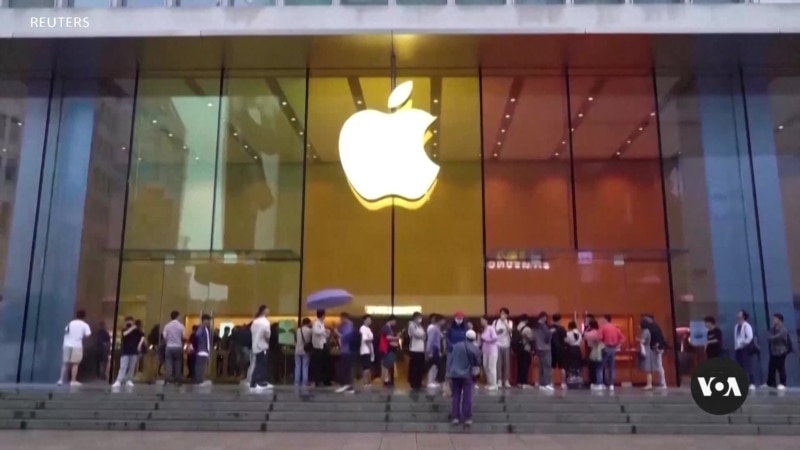
 1d
1dApple announced this week it would spend $500 billion in the U.S. over the next four years and create 20,000 jobs, signaling its pro-U.S. jobs and investment policy. U.S. President Donald Trump also announced he would double tariffs on China, where most Apple products are made. Michelle Quinn reports.
Read MorePrivate company's craft rockets toward moon in latest rush of lunar landing attempts

 1d
1dCAPE CANAVERAL, Florida — A private company launched another lunar lander Wednesday, aiming to get closer to the moon's south pole this time with a drone that will hop into a black crater where the sun never shines. Intuitive Machines' lander, named Athena, caught a lift with SpaceX from NASA's Kennedy Space Center. It's taking a fast track to the moon, with a landing on March 6. The company hopes to avoid the fate of Athena's predecessor, which tipped over at touchdown. Never before have so many spacecraft angled for the moon's surface all at once. Last month, U.S. and Japanese companies shared a rocket and separately launched landers toward the moon. The lander from the U.S. company, Firefly Aerospace of Texas, should get there first this weekend. The two U.S. landers are carrying tens of millions of dollars' worth of experiments for NASA as it prepares to return astronauts to the moon. "It's an amazing time. There's so much energy," NASA science mission chief Nicky Fox told The Associated Press a few hours ahead of the launch. Last year, Texas-based Intuitive Machines made the first U.S. touchdown on the moon in more than 50 years. But an instrument that gauges distance did not work, and the lander came down too hard and broke a leg, tipping onto its side. Intuitive Machines said it has fixed that issue and dozens of others. A sideways landing like last time would prevent a drone and a pair of rovers from moving out. A NASA drill that's aboard also needs an upright landing to be able to pierce the lunar surface and gather soil samples for analysis. "Certainly, we will be better this time than we were last time. But you never know what could happen," said Trent Martin, senior vice president of space systems. It's an extraordinarily elite club. Only five countries have pulled off a lunar landing over the decades: Russia, the U.S., China, India and Japan. The moon is littered with wreckage from many past failures. The 4.7-meter (15-foot) Athena will target a landing 160 kilometers (100 miles) from the lunar south pole. Just 400 meters (a quarter mile) away is a permanently shadowed crater — the ultimate destination for the drone named Grace. Named after the late computer programming pioneer Grace Hopper, the 1-meter (3-foot) drone will make three increasingly higher and longer test hops across the lunar surface using hydrazine-fueled thrusters for flight and cameras and lasers for navigation. If those excursions go well, it will hop into the nearby pitch-black crater, an estimated 20 meters (65 feet) deep. Science instruments from Hungary and Germany will take measurements at the bottom while hunting for frozen water. It will be the first up-close peek inside one of the many shadowed craters dotting both the north and south poles. Scientists suspect these craters are packed with tons of ice. If so, this ice could be transformed by future explorers into water to drink, air to breathe and even rocket fuel. NASA is paying $62 million to Intuitive Machines to get its drill and other experiments to the moon. The company, in turn, sold space on the lander to others. It also opened up the Falcon rocket to ride-sharing. Tagalongs included NASA's Lunar Trailblazer satellite, which will fly separately to the moon over the next several months before entering lunar orbit to map the distribution of water below. Also catching a ride was a private spacecraft that will chase after an asteroid for a flyby, a precursor to asteroid mining.
Read MoreMusicians release silent album to protest UK's AI copyright changes

 1d
1dLONDON — More than 1,000 musicians including Kate Bush and Cat Stevens on Tuesday released a silent album to protest proposed changes to Britain's copyright laws which could allow tech firms to train artificial intelligence models using their work. Creative industries globally are grappling with the legal and ethical implications of AI models that can produce their own output after being trained on popular works without necessarily paying the creators of the original content. Britain, which Prime Minister Keir Starmer wants to become an AI superpower, has proposed relaxing laws that currently give creators of literary, dramatic, musical and artistic works the right to control the ways their material may be used. The proposed changes would allow AI developers to train their models on any material to which they have lawful access, and would require creators to proactively opt out to stop their work being used. The changes have been heavily criticized by many artists, who say it would reverse the principle of copyright law, which grants exclusive control to creators for their work. "In the music of the future, will our voices go unheard?" said Bush, whose 1985 hit "Running Up That Hill" enjoyed a resurgence in 2022 thanks to Netflix show "Stranger Things." The co-written album titled "Is This What We Want?" features recordings of empty studios and performance spaces to represent what organizers say is the potential impact on artists' livelihoods should the changes go ahead. A public consultation on the legal changes closes later on Tuesday. Responding to the album, a government spokesperson said the current copyright and AI regime was holding back the creative industries, media and AI sector from "realizing their full potential." "We have engaged extensively with these sectors throughout and will continue to do so. No decisions have been taken," the spokesperson said, adding that the government's proposals will be set out in due course. Annie Lennox, Billy Ocean, Hans Zimmer, Tori Amos and The Clash are among the musicians urging the government to review its plans. "The government's proposal would hand the life's work of the country's musicians to AI companies, for free, letting those companies exploit musicians’ work to outcompete them," said organizer Ed Newton-Rex, the founder of Fairly Trained, a non-profit that certifies generative AI companies for fairer training data practices. "The UK can be leaders in AI without throwing our world-leading creative industries under the bus."
Read MoreApple to build 23,200-square meter facility in Texas
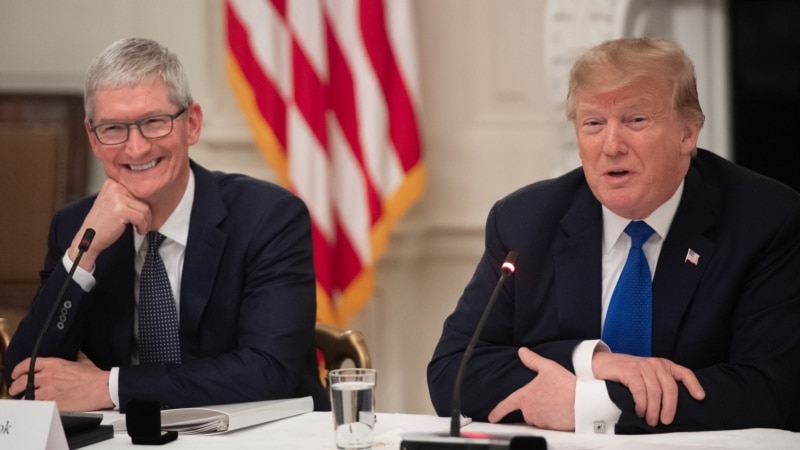
 1d
1dU.S. tech giant Apple has announced plans to create some 20,000 jobs and invest $500 billion over the next four years in the United States. Apple says it will expand teams and facilities in nine states across the country and that it aims to open a 23,200-square-meter server manufacturing facility in Texas in 2026. The announcement comes just days after Apple CEO Tim Cook met with U.S. President Donald Trump. “We are bullish on the future of American innovation, and we’re proud to build on our long-standing U.S. investments with this $500 billion commitment to our country’s future,” Cook said on the investment. “From doubling our Advanced Manufacturing Fund, to building advanced technology in Texas, we’re thrilled to expand our support for American manufacturing. And we’ll keep working with people and companies across this country to help write an extraordinary new chapter in the history of American innovation,” he added in a company statement. Trump thanked Cook and Apple for the investment on Monday morning on the social media platform Truth Social. “Apple has just announced a record $500 billion investment in the United States of America. The reason, faith in what we are doing, without which, they wouldn’t be investing 10 cents,” Trump said. Most of Apple’s consumer goods are currently assembled and produced overseas. Many of them, assembled in China, are liable to 10% tariffs imposed by Trump earlier in February. To reduce its reliance on international supply chains, Apple announced in January that it had begun mass producing its own chips at an Arizona factory owned by TSMC, Taiwan Semiconductor Manufacturing Company. The TSMC Arizona factory, along with legislation aimed at increasing U.S. semiconductor production, were two of Trump’s largest industrial policy moves during his first term. In a release on its website, Apple said the $500 billion commitment includes the company’s work with thousands of suppliers across all 50 states, direct employment, Apple Intelligence infrastructure and data centers, corporate facilities, and Apple TV+ production in 20 states. Apple said it is also set to open a manufacturing academy in Michigan, offering training led by engineers and local university staff to support mid-sized manufacturing firms in areas like project management and manufacturing processes.
Read MoreAustralia fines Telegram for delay in answering child abuse, terror questions

 1d
1dSydney — Australia's online safety regulator fined messaging platform Telegram about $640,000 on Monday for its delay in answering questions about measures the app took to prevent the spread of child abuse and violent extremist material. The eSafety Commission in March 2024 sought responses from social media platforms YouTube, X and Facebook to Telegram and Reddit, and blamed them for not doing enough to stop extremists from using live-streaming features, algorithms and recommendation systems to recruit users. Telegram and Reddit were asked about the steps they were taking to combat child sexual abuse material on their services. They had to respond by May, but Telegram submitted its response in October. "Timely transparency is not a voluntary requirement in Australia and this action reinforces the importance of all companies complying with Australian law," eSafety Commissioner Julie Inman Grant said in a statement. Telegram's delay in providing information obstructed eSafety from implementing its online safety measures, Grant said. Telegram said it had fully responded to all eSafety's questions last year, with no outstanding issues. "The unfair and disproportionate penalty concerns only the response time frame, and we intend to appeal," the company said in an email. Australia's spy agency in December said one in five priority counterterrorism cases investigated involved youths. The messaging platform has been under growing scrutiny around the world since its founder Pavel Durov was placed under formal investigation in France in August in connection with alleged use of the app for illegal activities. Durov, who is out on bail, has denied the allegations. Grant said Big Tech must be transparent and put in place measures to prevent their services from being misused as the threat posed by online extremist materials poses a growing risk. "If we want accountability from the tech industry we need much greater transparency. These powers give us a look under the hood at just how these platforms are dealing, or not dealing, with a range of serious and egregious online harms which affect Australians," Grant said. If Telegram chooses to ignore the penalty notice, eSafety would seek a civil penalty in court, Grant said.
Read MoreNASA, SpaceX launch crew to space station to retrieve stuck astronauts

 1d
1dThe replacement crew for the International Space Station was launched late Friday, paving the way for the return home of Butch Wilmore and Suni Williams, two NASA astronauts stuck on the space station for nine months. The SpaceX Falcon 9 rocket lifted off at 7:03 p.m. from NASA’s Kennedy Space Center in Florida carrying Crew-10 members: NASA’s Anne McClain and Nichole Ayers, Japan’s Takuya Onishi and Russia’s Kirill Peskov. The crew is part of a routine six-month rotation. Crew-10 and the Dragon spacecraft are expected to reach the space station around 11:30 p.m. Saturday. Returning to Earth alongside Wilmore and Williams will be NASA astronaut Nick Hague and Russian cosmonaut Aleksandr Gorbunov. Their return is scheduled for Wednesday, to allow for an overlap of the two crews to brief the new team. Wilmore and Williams arrived aboard the International Space Station in June 2024 and expected to stay in space for about 10 days. But their return was delayed after mechanical issues with their spacecraft, which, after weeks of troubleshooting was subsequently sent back to Earth without them. Their return was continually pushed back due to other technical delays.
Read MoreStarbucks hit with $50 million fine for spilled drink injury

 1d
1dA California jury Friday imposed a $50 million fine on Starbucks in the case of a delivery driver burned by a scalding cup of hot tea at a company location in Los Angeles. Michael Garcia was picking up three drinks in 2020 but one, he claimed, was "negligently" unsecured and spilled in his lap. He claimed that he consequently "suffered severe burns, disfigurement, and debilitating nerve damage to his genitals" and he was taken to an emergency room by paramedics. "Michael Garcia’s life has been forever changed," his attorney, Nick Rowley, said. "No amount of money can undo the permanent catastrophic harm he has suffered, but this jury verdict is a critical step in holding Starbucks accountable for flagrant disregard for customer safety and failure to accept responsibility," he added. Starbucks said it planned to appeal the verdict. "We sympathize with Mr. Garcia, but we disagree with the jury’s decision that we were at fault for this incident and believe the damages awarded to be excessive," company spokesperson Jaci Anderson said in a statement. "We have always been committed to the highest safety standards in our stores, including the handling of hot drinks," she added.
Read MoreUS Appeals court allows DEI crackdown

 1d
1dA U.S. federal appeals court Friday lifted a block on the Trump administration’s crackdown on diversity, equity and inclusion programs in the federal government, pausing a lower court ruling blocking enforcement of a series of presidential executive orders halting support of DEI initiatives. The three-judge panel on the Fourth Circuit of Appeals, in Richmond, Virginia, found that the directives by President Donald Trump were likely constitutional, disagreeing with a ruling in February by a federal judge in Maryland. The judges are allowing the Trump administration to implement the policy while they consider a final decision on the constitutionality of the orders. U.S. District Judge Adam Abelson in Baltimore had blocked implementation of Trump’s executive order nationwide pending the outcome of a lawsuit brought by the city of Baltimore and groups that claimed, among other things, the executive orders -- one abolishing DEI programs in the federal government and another requiring recipients of federal grants to not operate DEI programs -- improperly targeted constitutionally protected free speech. The Trump administration maintains the orders do not ban or discourage any speech but target instead unlawful discrimination. In addition to directing federal agencies to end diversity programs, the executive orders also precluded federal contractors from having them. Trump also ordered the Justice Department and other agencies to identify businesses, schools and nonprofit organizations that were deemed unlawfully discriminating through DEI policies.
Read MoreForecasters warn of tornadoes in US in coming days
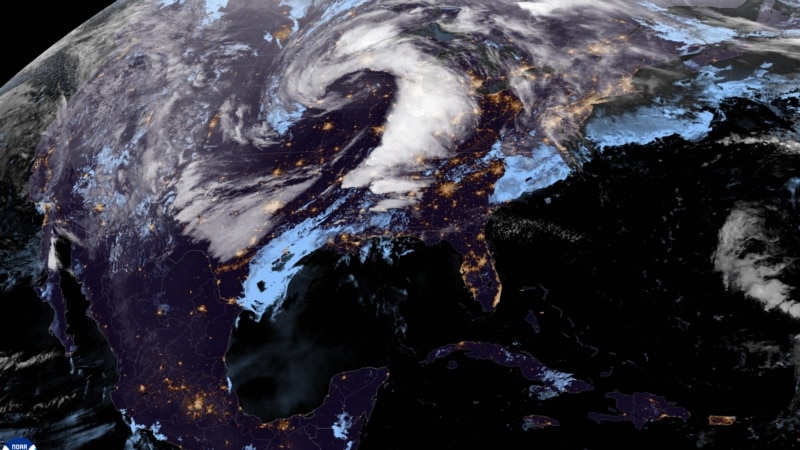
 1d
1dU.S. weather forecasters warned of the threat of tornados in multiple states this weekend following at least five twisters in the state of Missouri on Friday. Friday's storms left some 100,000 buildings without power as severe weather continued into the night. The tornado risk was expected to continue into the weekend in a slew of states including Mississippi, Louisiana and Alabama. Accuweather predicted the storm risk to peak from Saturday afternoon to Saturday night. The National Weather Service warned of heavy thunderstorms from the Midwest to the Mississippi Valley, bringing with them the chance of flash flooding, power outages, downed trees and travel disruptions. In Alabama, Governor Kay Ivey issued a state of emergency on Friday, extending into Sunday. In her proclamation, she said "this severe weather could cause significant damage to public and private property and poses a danger to the health and safety of the people of Alabama, including potential disruption of essential utility systems, personal injury and loss of life." The proclamation means the state National Guard will be on alert and could be activated. Missouri also declared a state of emergency. Forecasters expect the thunderstorms to swamp the South and move toward the East Coast on Saturday night into Sunday. Although the tornado threat is expected to decrease, the East Coast will likely face hail and potentially damaging wind gusts. The storm system is expected to move off into the Atlantic Ocean sometime Sunday night into Monday.
Read MoreTrump vows accountability for those who pursued him in court cases
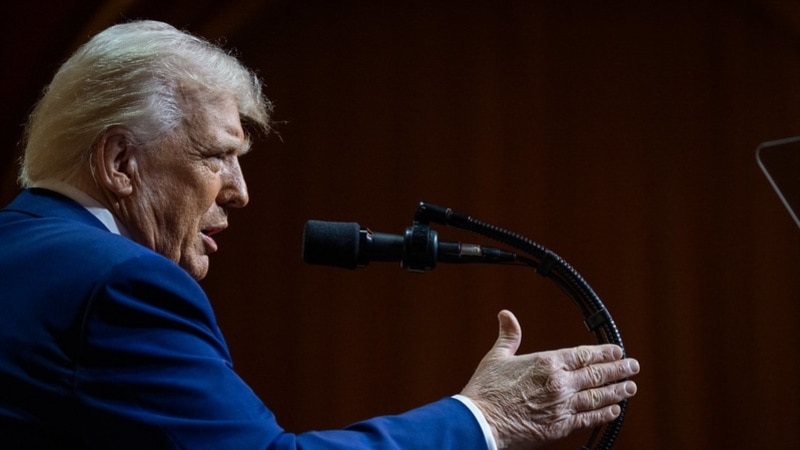
 1d
1dU.S. President Donald Trump promised to seek accountability for those who pursued legal cases against him when he was out of office, speaking Friday at the Justice Department. "Our predecessors turned this Department of Justice into the Department of Injustice. But I stand before you today to declare that those days are over, and they are never going to come back. They're never coming back," Trump said. During his years out of office, the department twice indicted Trump on charges that he illegally stored classified documents at his Florida estate and that he worked to overturn the results of the 2020 presidential election. Both cases were dismissed after Trump won election in November, with the department citing a long-standing policy of not prosecuting a sitting president. "Now, as the chief law enforcement officer in our country, I will insist upon and demand full and complete accountability for the wrongs and abuses that have occurred. The American people have given us a mandate, a mandate like few people thought possible," Trump said. Trump has fired prosecutors who investigated him during the Biden administration and scrutinized thousands of FBI agents who investigated some supporters of the president who stormed the U.S. Capitol on Jan. 6, 2021. Representative Jamie Raskin, the senior Democrat on the House Judiciary Committee, called Trump’s speech a "staggering violation of [the] traditional boundary between independent criminal law enforcement and presidential political power." Speaking outside Justice shortly after Trump spoke, Raskin said, "No other president in American history has stood at the Department of Justice to proclaim an agenda of criminal prosecution and retaliation against his political foes." Trump has long been critical of both the department and the FBI. He has installed political allies into top leadership positions at both of those agencies. FBI Director Kash Patel and Attorney General Pam Bondi attended Friday’s talk. In introducing Trump, Bondi said, "We all work for the greatest president in the history of our country. ... He will never stop fighting for us, and we will never stop fighting for him and for our country." During his speech, Trump promised "historic reforms" at the agencies and said, "Under the Trump administration, the DOJ and the FBI will once again become the premier crime fighting agencies on the face of the Earth." His speech had echos of his campaign rallies, with music blaring from speakers before Trump entered the department’s Great Hall and his address hitting on some of the main themes from his campaign, including border security and fighting violent crime. On crime, Trump said that homicides, property crime and robberies rose during the Biden administration. "I have no higher mission as president of the United States than to end this killing and stop this law breaking and to making America safe again. And that's what you're all about in this room. We want to protect Americans, and we protect everybody that's in our country," he said.
Read More2 judges rule mass firings of agency employees to be illegal

 1d
1dFederal judges in two separate cases ruled this week that recent mass firings of employees as part of President Donald Trump’s push to cut the size of the federal workforce were illegal and ordered thousands of probationary employees to be reinstated — at least for now. The Trump administration pushed back, filing appeals in both cases. "This injunction is entirely unconstitutional," White House press secretary Karoline Leavitt said Friday. "You cannot have a low-level district court judge filing an injunction to usurp the executive authority of the president of the United States," she added. In the suit filed by federal employee unions, U.S. District Judge William Alsup of the Northern District of California said that the process had been a “sham,” as some employees were told they were being fired for poor performance. Just before issuing his ruling Thursday, Alsup said, "It is sad, a sad day. Our government would fire some good employee and say it was based on performance when they know good and well that's a lie." The departments of Agriculture, Defense, Energy, Interior, Treasury and Veterans Affairs were ordered to “immediately” rehire the employees. Alsup, however, noted that federal agencies may still proceed with reductions in force, following proper procedure. Later Thursday, U.S. District Judge James Bredar also ruled that probationary employees must be reinstated after finding that 18 agencies had acted illegally in firing them. Democratic attorneys general representing the District of Columbia, Maryland and 18 other states argued that agencies failed to follow proper procedures for mass layoffs, including providing states with 60 days' notice. "Lacking the notice to which they were entitled, the states weren't ready for the impact of so many unemployed people. They are still scrambling to catch up," Bredar wrote in his memorandum explaining his decision.
Read MorePi Day counts on never-ending numerical sequence for March 14 celebrations

 1d
1dMarch 14 is Pi Day, an annual celebration of the mathematical constant of pi, representing the ratio of a circle's circumference to its diameter. The holiday is observed on March 14 or 3/14 because 3.14 are the first three digits of the infinite number pi — 3.14159 ... and on and on. The celebration of Pi Day was the brainchild of physicist Larry Shaw and was first observed in 1988 at San Francisco’s Exploratorium, a science museum, and has since grown into an international event. At that first simple salute to pi in 1988, Shaw and his wife, Catherine, took — guess what? — pies — and tea to the museum for the celebration of the infinite number. Shaw became known as the Prince of Pi and reigned over the museum’s annual honoring of the never-ending number for years, until his death in 2017. Pi Day festivities grew to include the honoring of mathematical genius Albert Einstein because he was born on March 14. The U.S. House of Representatives officially designated March 14 as National Pi Day in 2009. The Exploratorium posted on its website that this year’s observance of pi would include the annual Pi Procession, which the museum described as being executed by “a high spirited crowd” through the museum and would circle the museum’s Pi Shrine 3.14 times, while “waving the digits of pi and dancing along” to a brass band. And, of course, all participants in the revelry would be rewarded with a free slice of pie. Pi Day is now celebrated around the world by pi lovers and is viewed as a way to arouse interest in the sciences among young people. Pi lovers had a special treat in 2015, History.com reports. That year Pi Day was celebrated on 3/14/15 at 9:26:53 a.m. The combined numbers of the date and time represent the first 10 digits of pi — 3.141592653.
Read MoreSenate averts government shutdown, overcomes Democratic opposition
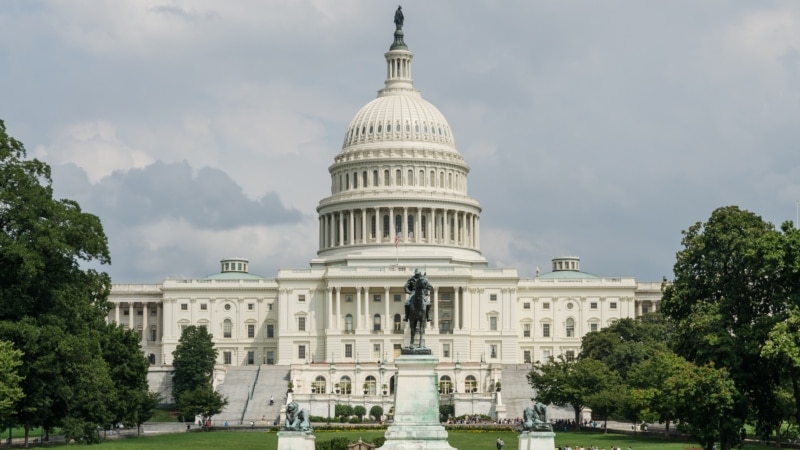
 1d
1dThe U.S. Senate passed a stopgap spending bill Friday evening, averting a partial government shutdown and overcoming Democratic opposition to the measure. The bill passed 54-46 after clearing a more difficult procedural hurdle to stop debate on the measure, which required at least 60 votes. The Republican-controlled House of Representatives passed the bill earlier this week to meet a March 14 deadline to keep the government running. Senate Democrats had fractured over whether to support the short-term continuing resolution (CR) that would fund the government for the next six months, reduce total government spending by about $7 billion from last year's levels and shift money to the military and away from non-defense spending. Many Democrats expressed anger after the top-ranking Democrat in the chamber, Minority Leader Chuck Schumer, announced Thursday night that while he disliked the bill, a shutdown was a “far worse option.” Speaking on the Senate floor Friday morning, Schumer said not passing the Republican funding bill would give more power to the Department of Government Efficiency (DOGE) effort led by Elon Musk, including which agencies would be shut down. "A shutdown would allow DOGE to shift into overdrive," he said. Dozens of House Democrats, who opposed the funding measure in the lower chamber, sent a letter to Schumer on Friday, expressing their "strong opposition" to his plan to vote for the bill. Former Democratic House Speaker Nancy Pelosi urged Senate Democrats to go against their leader. In a Friday statement, she wrote, "America has experienced a Trump shutdown before — but this damaging legislation only makes matters worse." When questioned by reporters Friday, House Minority Leader Hakeem Jeffries refused to say whether he backed Schumer’s leadership. Trump had called on Congress to pass the funding bill and on Friday praised Schumer for supporting it. "Congratulations to Chuck Schumer for doing the right thing — Took 'guts' and courage!" he wrote on his Truth Social platform. "I have great respect, by the way, for what Schumer did today. He went out and he said that they have to vote with the Republicans because it's the right thing to do," Trump said during a speech at the Department of Justice. Appropriations bills require a 60-vote threshold for passage in the Senate, which means Republicans needed to secure at least eight Democratic votes. The bill cleared the procedural hurdle 62-38. Several amendments to the bill failed, but one that proposed eliminating funding for DOGE drew the support of one Republican. Senator Lisa Murkowski of Alaska has been outspoken in her criticism of the initiative by Musk. Schumer previously called for the Senate to pass an earlier version of the CR that Democrats were involved in negotiating. "Funding the government should be a bipartisan effort. But Republicans chose a partisan path, drafting their continuing resolution without any input, any input, from congressional Democrats," Schumer said on the Senate floor late Wednesday. The House passed the short-term spending measure 217-213 on Tuesday. One Democrat voted for the bill and one Republican against it. The chamber went out of session for the rest of the week starting Tuesday afternoon, putting pressure on senators to pass its version of the CR. House Speaker Mike Johnson quelled dissent from within his Republican Party to pass the spending measure. He told reporters Tuesday the seven-month continuing resolution was an important step toward implementing Trump's agenda of rooting out government waste and abuse through DOGE. "It allows us to move forward with changing the size and scope of the federal government. There is a seismic shift going on in Washington right now. This is a different moment than we have ever been in. The DOGE work is finding massive amounts of fraud, waste and abuse," Johnson said. "We have a White House that is actually dedicated to getting us back onto a fiscally responsible track." Independent watchdogs and analysts, however, say DOGE is using overly broad claims of fraud to generate support for large-scale cuts to federal programs and offices. Representative Thomas Massie was the lone Republican holdout, despite Trump's post Monday night on Truth Social calling for Massie to lose his seat if he voted against the spending measure. The continuing resolution buys lawmakers time to reach a compromise on Senate and House versions of government spending for the next fiscal year, which begins in October, a key tool for implementing Trump's domestic policy agenda. At question is how and when to enact a proposed extension of the 2017 tax cuts and how to pay down the U.S. deficit without cutting key safety net programs that help American voters.
Read MoreUS envoy says Hamas misrepresented release of hostage
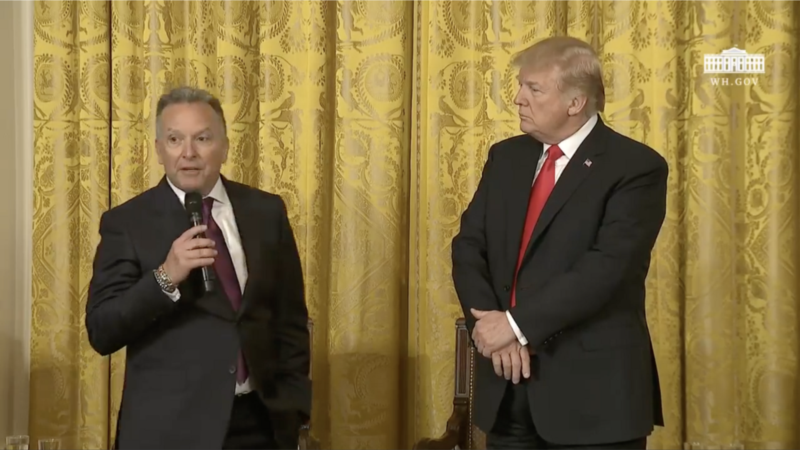
 1d
1dU.S. special envoy to the Middle East Steve Witkoff said a Hamas statement issued Friday announcing it had agreed to release an American-Israeli soldier was, in reality, a condition of a "bridge" ceasefire proposal offered by U.S. officials earlier this week. Early Friday, the U.S.-designated terrorist group Hamas issued a statement saying it had agreed to release Edan Alexander, believed to be the last living American hostage held in Gaza, as well as the bodies of four other hostages after receiving a proposal from mediators to resume negotiations on the second phase of a Gaza ceasefire deal. The statement said the proposal had been offered by unnamed mediators as part of the work in Qatar to restart ceasefire negotiations. The United States, Egypt and host Qatar have been mediating the ceasefire talks. Hamas expressed its "complete readiness to begin negotiations and reach a comprehensive agreement on the issues of the second phase." Later Friday, in a joint statement issued along with the National Security Council, Witkoff's office explained he and National Security Council Senior Middle East Director Eric Trager had presented the bridge proposal to extend the current ceasefire beyond Ramadan and Passover and allow time to negotiate a framework for a permanent ceasefire. In the statement, Witkoff said that under the proposal, Hamas would release additional living hostages in exchange for prisoners, and that the extension of the phase-one ceasefire would allow more time for humanitarian aid to resume into Gaza. He said the U.S. had its Qatari and Egyptian mediating partners convey to Hamas "in no uncertain terms" that the new proposal would have to be implemented soon and Edan Alexander would have to be released immediately. "Unfortunately, Hamas has chosen to respond by publicly claiming flexibility," Witkoff said in the statement, "while privately making demands that are entirely impractical without a permanent ceasefire." In a statement released on the X social media platform, Israeli Prime Minister Benjamin Netanyahu's office said that while Israel had accepted "the Witkoff framework," Hamas "continues to wage psychological warfare against hostage families." The statement went on to say that the prime minister would convene his ministerial team Saturday evening for a detailed briefing from the negotiating team and "decide on steps to free the hostages and achieve all our war objectives." Hamas is believed to be holding 24 living hostages taken in the Oct. 7, 2023, attack that triggered its war with Israel. The group also is holding the bodies of 34 others who were either killed in the initial attack or in captivity, as well as the remains of a soldier killed in 2014. In comments to FOX Business news Friday, White House Press Secretary Karoline Leavitt said she was wary of taking Hamas statements at face value but emphasized that U.S. President Donald Trump was working "diligently" to bring hostages home. Witkoff told reporters at the White House early in March that gaining the release of Alexander was a "top priority." A ceasefire has been in place since January. During the first phase of the three-phase ceasefire, Hamas exchanged 33 Israeli hostages and five Thais for some 2,000 Palestinian prisoners and detainees. Israel has been pressing Hamas to accept an extension of the first phase, which ended March 2. Hamas had said it wanted to move to the second phase of the agreement, which would involve the release of more hostages and Israel's withdrawal from Gaza.
Read MoreTrump intent on imposing global tariffs

 1d
1dThe on-again, off-again tariffs between the United States and other countries are again under scrutiny, with the U.S. president not budging. VOA White House Correspondent Carolyn Presutti reports.
Read MoreKremlin: Reasons to be optimistic about ceasefire deal
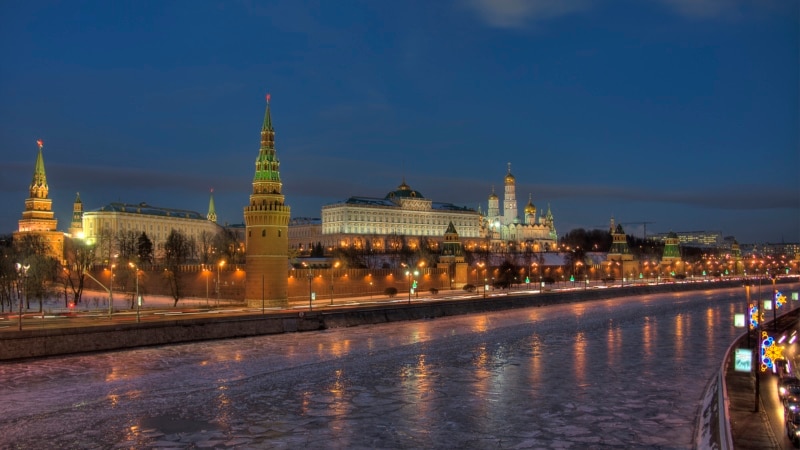
 1d
1dKremlin spokesman Dmitry Peskov said Friday that there were reasons for "cautious optimism" regarding a proposed ceasefire deal between Ukraine and Russia, following talks between a U.S. envoy and Russian President Vladimir Putin in Moscow. Speaking to reporters in a telephone news briefing, Peskov referenced comments from Putin on Thursday in which he expressed qualified support for a U.S. ceasefire proposal to halt Russia's war with Ukraine for 30 days but said some questions needed to be answered. Peskov said that while much remains to be done, Putin "expressed solidarity with [U.S. President Donald] Trump's position." He said Putin held late-night talks Thursday with U.S. special envoy Steve Witkoff, during which Putin "conveyed information and additional signals to President Trump." The Kremlin spokesman said both sides agreed Putin and Trump should speak, adding that the timing of the conversation would be agreed upon once Witkoff had conveyed the new information to Trump. Trump said in a post on his Truth Social website Friday morning that "there is a very good chance that this horrible, bloody war can finally come to an end." He also said he had "strongly requested" that Putin spare the lives of "thousands" of Ukrainian troops in Russia's Kursk border region who were "completely surrounded" by the Russian military. "This would be a horrible massacre, one not seen since World War II," Trump wrote on social media. Later Friday, Putin told the National Security Council in Moscow that if the Ukrainian troops laid down their arms and surrendered, they would not be killed. Ukraine's military, however, denied that its forces in Kursk were surrounded by Moscow's troops and said reports to that effect were Russian manipulation. In his nightly address to his nation Thursday, Ukrainian President Volodymyr Zelenskyy said that Putin's comments to Witkoff were "very manipulative," and that he thought Putin's qualified support for the U.S. plan was an effort to lay the groundwork for rejecting it. "He is in fact preparing a rejection at present, because Putin is, of course, scared to tell President Trump that he wants to continue this war, that he wants to kill Ukrainians," Zelenskyy said. He noted Ukraine had accepted the U.S. proposal and was ready to organize monitoring and verification. "We are not setting conditions that complicate the process; Russia is," Zelenskyy said. White House press secretary Karoline Leavitt said Friday that no discussions between Trump and Putin had been scheduled, but she said that could change. She called the talks in Moscow on Thursday "a productive day for the United States of America and for the world in terms of peace." On Thursday at the White House, ahead of talks with NATO Secretary-General Mark Rutte, Trump said it would be "very disappointing" if Russia ended up rejecting U.S. efforts to end the fighting. Meanwhile, Britain's Defense Ministry said Friday that Russia's prioritization of funding its war with Ukraine had likely resulted in insufficient funding for average Russians' health care, leading to shortages of medical staff and equipment. In its Defense Intelligence report, the ministry said Russia reportedly closed at least 160 hospitals in 2024, including 18 maternity facilities and at least 10 children's clinics. The report said Russia's small towns and villages had been particularly affected. The Defense Ministry said the 500,000 casualties Russia has sustained in the war in Ukraine most certainly continue to put a strain on all levels of care in the Russian military medical system.
Read MoreReport: US bird population is declining

 1d
1dThe U.S. bird population is declining at an alarming rate, according to a report published Thursday by an alliance of science and conservation groups. Habitat loss and climate change are among the key contributing factors to the bird population losses, according to the 2025 U.S. State of the Birds report. More than 100 of the species studied, have reached a "tipping point," losing more than half their populations in the last 50 years. The report revealed that the avian population in all habitats is declining, including the duck population, previously considered a triumph of conservation. "The only bright spot is water birds such as herons and egrets that show some increases," Michael Parr, president of the American Bird Conservancy, told Reuters. The decline in the duck population fell by approximately 30% from 2017, but duck population numbers still remain higher, however, than their 1970 numbers, according to an Associated Press account on the report. "Roughly one in three bird species (229 species) in the U.S. requires urgent conservation attention, and these species represent the major habitats and systems in the U.S. and include species that we've long considered to be common and abundant," Amanda Rodewald, faculty director of the Cornell Lab of Ornithology's Center for Avian Population Studies told Reuters. Included among the birds with highest losses, Reuters reported, are the mottled duck, Allen's hummingbird, yellow-billed loon, red-faced cormorant, greater sage-grouse, Florida scrub jay, Baird's sparrow, saltmarsh sparrow, mountain plover, Hawaiian petrel, Bicknell's thrush, Cassia crossbill, pink-footed shearwater, tricolored blackbird and golden-cheeked warbler. Some of the birds in this "red alert" group are already protected under the U.S. Endangered Species Act, the news agency said. "For each species that we're in danger of losing, it's like pulling an individual thread out of the complex tapestry of life," Georgetown University biologist Peter Marra. who was not involved in the new report, told AP. While the outlook may seem dire, it is not without hope, said Marra, who noted the resurgence of the majestic bald eagle.
Read MoreShortage of Marines’ amphibious warships worries top US military officers

 1d
1dOfficials tell VOA the shortage of amphibious warfare ships has reached a breaking point. While the ships make up just 10% of the fleet, they are the go-to alternative to aircraft carriers when commanders need something more precise or expedient. VOA Pentagon Correspondent Carla Babb reports.
Read MoreHomeland Security, rights group to meet in court over migrants at Guantanamo Bay
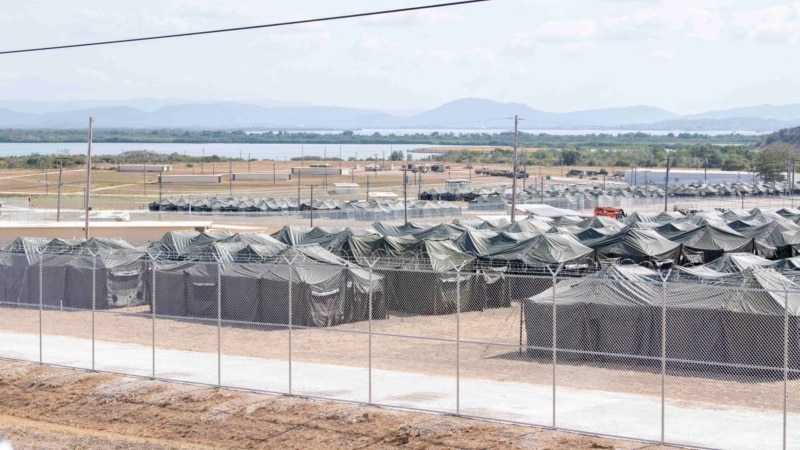
 1d
1dPENTAGON — U.S. government lawyers are expected to face off with attorneys for civil and immigration rights groups over the use of a U.S. naval base in Cuba to hold migrants slated for deportation. Arguments in the two lawsuits over operations at Naval Station Guantanamo Bay, filed against the Department of Homeland Security and Secretary Kristi Noem, are set for a U.S. District Court in Washington on Friday. The suits allege that the U.S. government has overstepped its bounds by denying migrants sent to Guantanamo Bay access to legal representation and also by attempting to send migrants to the base's facilities without the proper legal authority in violation of the U.S. Constitution. DHS officials did not immediately respond to a request for comment on the upcoming hearing, but they have repeatedly denied the allegations while criticizing the groups bringing the lawsuits. "The American Civil Liberties Union appears far more interested in promoting open borders and disrupting public safety missions than in protecting the civil liberties of Americans," a DHS spokesperson told VOA in a statement earlier this month, declining to be named. "They should consider changing their name," the spokesperson added, further describing the legal challenges as "baseless." President Donald Trump first raised the idea of using the U.S. naval base in Cuba as part of his administration's plans for mass deportations shortly after taking office in January. Homeland Security's Noem said the base, which features a secure prison to hold captured terrorists, would be used to house "the worst of the worst." Trump and other U.S. officials also suggested the base could be used to hold up to 30,000 migrants while they awaited deportation. Those plans, however, never fully materialized. The U.S. began sending what officials described as "high threat illegal aliens" to Guantanamo Bay's detention center in early February, followed by other nonviolent migrants, who stayed at other facilities. At times, the facilities held close to 200 detainees, many of whom were deported to Honduras, Venezuela or other countries. But despite efforts to prepare the facilities for more migrants, capacity has been limited. According to a U.S. defense official, who spoke to VOA on the condition of anonymity, the prison as currently configured can hold only 130 detainees, while the base's Migrant Operations Center and a temporary tent city can hold, at most, 550 people. As VOA first reported, DHS officials decided to remove all 40 remaining migrants from the prison and other facilities at Guantanamo Bay this past Tuesday, flying them instead to the U.S. southern state of Louisiana. Neither DHS nor its subagency, Immigration and Customs Enforcement, have responded to requests for comment on the decision to evacuate migrants from the naval base or on their status or whereabouts since being returned to the U.S. mainland. The move — and lack of communication — has drawn criticism from immigrants' rights groups, including some of those involved in the current litigation. "The arbitrary and secret shuttling of people between Guantanamo and the U.S. demonstrates a complete disregard for human dignity, an affront to the rule of law, and a waste of public resources," said the International Refugee Assistance Project's Pedro Sepulveda. "No one should be detained at Guantanamo," Sepulveda added. "The Trump administration must stop these ill-conceived and cruel transfers and stop detaining immigrants at Guantanamo once and for all."
Read MoreUkraine peace, global security top G7 agenda as diplomats convene in Canada
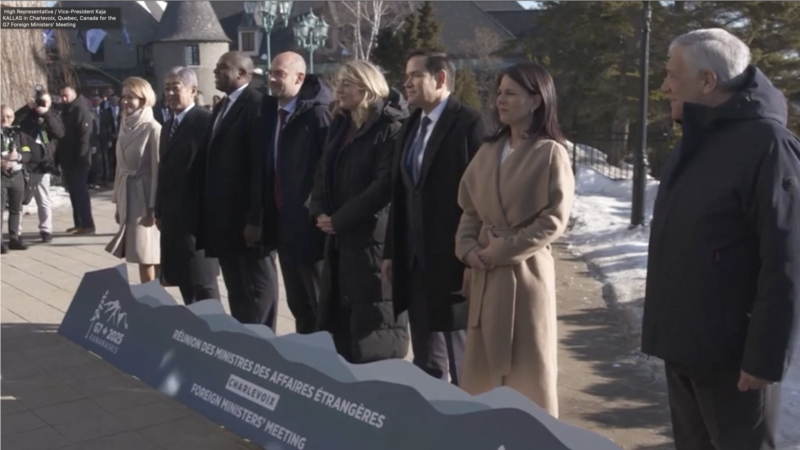
 1d
1dCHARLEVOIX, QUEBEC — Top diplomats from the Group of Seven leading industrial nations gathered Thursday in Charlevoix, Quebec, as host country Canada outlined its top agenda, focusing on achieving a “just and lasting peace in Ukraine” and strengthening security and defense partnerships as the G7 marks 50 years. During the opening remarks, Canadian Foreign Minister Melanie Joly said, “Peace and stability is on the top of our agenda, and I look forward to discussing how we can continue to support Ukraine in the face of Russia's illegal aggression.” Joly also emphasized the importance of addressing maritime security challenges, citing threats such as “growing the use of growing shadow fleets, dark vessels” and “sabotage of critical undersea infrastructure.” U.S. Secretary of State Marco Rubio has said he hopes a ceasefire between Russia and Ukraine could take place within days if the Kremlin agrees. He also plans to urge G7 foreign ministers to focus on ending the Russia-Ukraine war. The G7 talks in Quebec follow U.S.-Ukraine talks in Jeddah, Saudi Arabia, where Ukraine said it is ready to accept a U.S. proposal for "an immediate, interim 30-day ceasefire." "Ukraine is committed to moving quickly toward peace, and we are prepared to do our part in creating all of the conditions for a reliable, durable, and decent peace," Ukrainian President Volodymyr Zelenskyy wrote Wednesday in a post on social media platform X. He added that "Ukraine was ready for an air and sea ceasefire," and "welcomed" the U.S. proposal to extend it to land. Russian President Vladimir Putin said Thursday that Russia supports the U.S. ceasefire proposal in principle, but key details still need to be worked out. “Ceasefire, they can't be coming with conditions, because all these conditions just blur the picture. Either you want to end this war, or you don't want to end this war, so we need to be very firm,” said European Union foreign policy chief Kaja Kallas during an interview with CNN International. “What we need to keep in mind is that Russia has invested, like over 9% of its GDP on the military, so they would want to use it,” Kallas said, adding the European nations “are massively increasing” their “defense investments.” The G7 talks bring together ministers from Britain, Canada, France, Germany, Italy, Japan and the United States. Rubio has underscored the need for monitors if a ceasefire is implemented. He told reporters on Wednesday that “one of the things we'll have to determine is who do both sides trust to be on the ground to sort of monitor some of the small arms fire and exchanges that could happen.” Beyond Ukraine, G7 foreign ministers also discussed China’s role in global security, Indo-Pacific stability, and maritime security behind closed doors. Rubio is expected to have a pull-aside meeting with Japanese Foreign Minister Takeshi Iwaya on Thursday.
Read MoreWall Street tumbles 10% below its record after Trump escalates trade war

 1d
1dNEW YORK — Wall Street's sell-off hit a new low Thursday after U.S. President Donald Trump's escalating trade war dragged the S&P 500 more than 10% below its record, which was set just last month. A 10% drop is deemed a correction by professional investors, and the S&P 500's 1.4% slide on Thursday sent the index to its first since 2023. The losses came after Trump upped the stakes in his trade war by threatening huge taxes on European wines and alcohol. Not even a double-shot of good news on the U.S. economy could stop the bleeding. The Dow Jones Industrial Average dropped 537 points, or 1.3% Thursday, and the Nasdaq composite fell 2%. The dizzying, battering swings for stocks have been coming not just day to day but also hour to hour, and the Dow hurtled between a slight gain and a drop of 689 points through Thursday's trading. The turbulence is a result of uncertainty about how much pain Trump will let the economy endure through tariffs and other policies to reshape the country and world as he wants. The president has said he wants manufacturing jobs back in the United States, along with a smaller U.S. government workforce and other fundamental changes. Trump's latest escalation came Thursday when he threatened 200% tariffs on Champagne and other European wines, unless the European Union rolls back a tariff it announced on U.S. whiskey. The European Union unveiled that move on Wednesday, in response to U.S. tariffs on European steel and aluminum. U.S. households and businesses have reported drops in confidence because of all the uncertainty about which tariffs will stick from Trump's barrage of on-again, off-again announcements. That's raised fears about a pullback in spending that could sap energy from the economy. Some U.S. businesses say they've begun to see a change in their customers' behavior because of the uncertainty. A particularly feared scenario for the economy is one where its growth stagnates but inflation stays high because of tariffs. Few tools are available in Washington to fix what's called stagflation. There was good news Thursday, and it came on both those economic fronts. One report showed inflation at the wholesale level last month was milder than economists expected. It followed a similarly encouraging report from the prior day on inflation that U.S. consumers are feeling. A separate report, meanwhile, said fewer U.S. workers applied for unemployment benefits last week than economists expected. It's the latest signal that the job market remains relatively solid overall. If that can continue, it could allow U.S. consumers to keep spending, and that's the main engine of the economy.
Read MoreTrump asks Supreme Court to intervene in bid to curb birthright citizenship
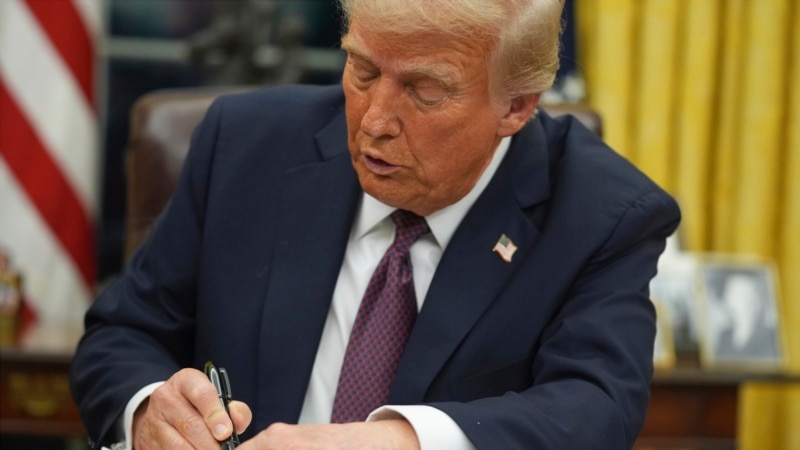
 1d
1dWASHINGTON — Donald Trump took the fight over his attempt to restrict automatic U.S. birthright citizenship to the Supreme Court on Thursday as the Republican president's administration asked the justices to narrow a judicial block imposed on this key element of his hardline approach toward immigration. The Justice Department made the request challenging the scope of three nationwide injunctions issued against Trump's order by federal courts in Washington state, Massachusetts and Maryland. The administration said the injunctions should be scaled back from applying universally and limited to just the plaintiffs that brought the cases and are "actually within the courts' power." "Universal injunctions have reached epidemic proportions since the start of the current administration," the Justice Department said in the filing. "This court should declare that enough is enough before district courts' burgeoning reliance on universal injunctions becomes further entrenched." Trump's order, signed on his first day back in office on Jan. 20, directed federal agencies to refuse to recognize the citizenship of U.S.-born children who do not have at least one parent who is an American citizen or lawful permanent resident. The order was intended to apply starting Feb. 19 but has been blocked nationwide by multiple federal judges. Trump's action has drawn a series of lawsuits from plaintiffs, including 22 Democratic state attorneys general, immigrant rights advocates and expectant mothers. They argue among other things that Trump's order violates a right enshrined in the U.S. Constitution's 14th Amendment that provides that anyone born in the United States is a citizen. The 14th Amendment's citizenship clause states that all "persons born or naturalized in the United States, and subject to the jurisdiction thereof, are citizens of the United States and of the state wherein they reside." The administration contends that the 14th Amendment, long understood to confer citizenship to virtually anyone born in the United States, does not extend to immigrants who are in the country illegally or even to immigrants whose presence is lawful but temporary, such as university students or those on work visas. Its request to the justices marks its latest trip to the top U.S. judicial body to defend Trump's actions. The Supreme Court's 6-3 conservative majority includes three justices appointed by Trump during his first term as president. Trump's push to restrict birthright citizenship is part of a broader immigration and border crackdown that includes tasking the U.S. military with aiding border security and issuing a broad ban on asylum. The judges who ruled against Trump's order faulted it as conflicting with the Constitution. An 1898 U.S. Supreme Court ruling in a case called United States v. Wong Kim Ark long has been interpreted as guaranteeing that children born in the United States to noncitizen parents are entitled to American citizenship. Trump's Justice Department has argued that the court's ruling in that case was narrower, applying to children whose parents had a "permanent domicile and residence in the United States."
Read MoreUS lawmakers running out of time to fund government
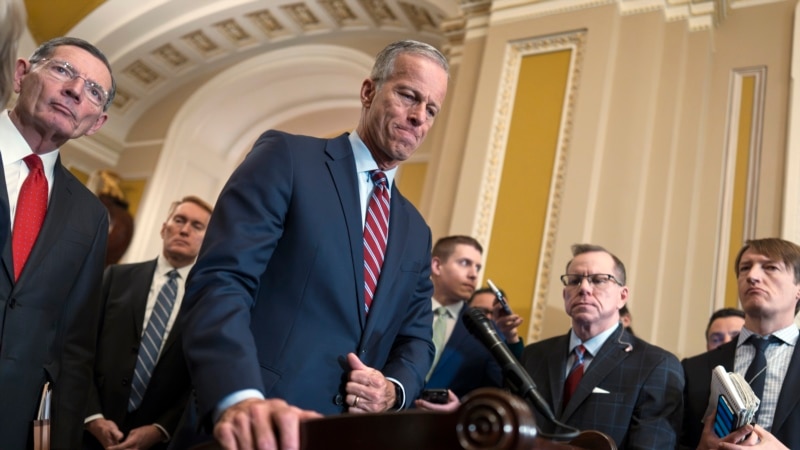
 1d
1dU.S. lawmakers are running out of time to pass a short-term continuing resolution, or CR, that will fund the government past a March 14 deadline. "Democrats need to decide if they're going to support funding legislation that came over from the House, or if they're going to shut down the government. So far, it's looking like they plan to shut it down," Senate Majority Leader John Thune said on the Senate floor Thursday. Appropriations bills require a 60-vote threshold for passage in the Senate, which means Republicans need to secure at least eight Democratic votes. Senate Minority Leader Chuck Schumer has called for the Senate to pass an earlier version of the CR that Democrats were involved in negotiating. "Funding the government should be a bipartisan effort. But Republicans chose a partisan path, drafting their continuing resolution without any input, any input, from congressional Democrats," Schumer said on the Senate floor late Wednesday. Democratic senators say they are concerned about easing the way for the Trump administration to continue large-scale changes to the federal government and social safety net programs. "I don't want a government shutdown," Democratic Senator Chris Van Hollen said in a statement Thursday. "And that's why I'd like to vote on a bill to keep the government open for 30 days while we have a bipartisan negotiation. But I will not support this Republican House bill that simply gives Elon Musk more fuel and more tools to dismantle big parts of the federal government in order to rig it for people like himself and the very rich." "Voting against the CR will hurt the American people and kill the incredible momentum that President [Donald] Trump has built over the past 51 days," White House press secretary Karoline Leavitt told reporters earlier this week. The Republican-majority House of Representatives passed a short-term spending measure Tuesday by a vote of 217-213. The House went out of session for the rest of the week starting Tuesday afternoon, putting pressure on senators to pass its version of the CR. Speaker of the House Mike Johnson quelled dissent from within his Republican party to pass the spending measure. He told reporters Tuesday the seven-month continuing resolution was an important step toward implementing Trump's agenda of rooting out government waste and abuse through the Department of Government Efficiency, known as DOGE. "It allows us to move forward with changing the size and scope of the federal government. There is a seismic shift going on in Washington right now. This is a different moment than we have ever been in. The DOGE work is finding massive amounts of fraud, waste and abuse," Johnson said. "We have a White House that is actually dedicated to getting us back onto a fiscally responsible track." Independent watchdogs and analysts, however, say DOGE is using overly broad claims of fraud to generate support for large-scale cuts to federal programs and offices. Representative Thomas Massie was the lone Republican holdout, despite Trump's post Monday night on Truth Social calling for Massie to lose his seat if he voted against the spending measure. The continuing resolution buys lawmakers time to reach a compromise on Senate and House versions of government spending, a key tool for implementing Trump's domestic policy agenda. At question is how and when to enact a proposed extension of the 2017 tax cuts and how to pay down the U.S. deficit without cutting key safety net programs that help American voters. Senate leadership has proposed passing the tax cuts in a separate bill later this year.
Read MoreCan the US pry Russia away from China?
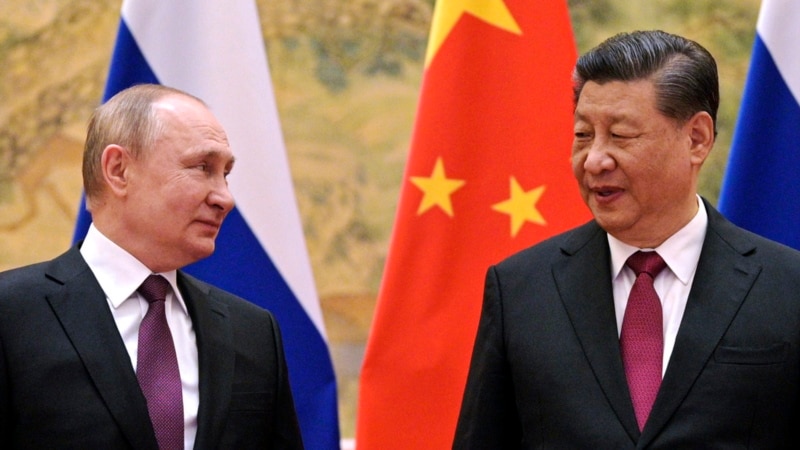
 1d
1dWestern politicians have repeatedly called on China to limit or cease tacit support for Russia’s bloody war against Ukraine. In response, China’s leadership insists it is committed to peace and respect for the territorial integrity of other nations. But unlike most United Nations member states, China has never condemned Russia's full-scale invasion of Ukraine, and their military-diplomatic partnership — from joint bomber flights near the U.S. state of Alaska to votes in the U.N. Security Council — has only helped the Kremlin overcome its international isolation. While President Donald Trump has said he has good personal relations with both Russian President Vladimir Putin and Chinese President Xi Jinping, there is a consensus among experts in Washington that the China-Russia partnership poses a threat to U.S. interests, and that while Trump’s predecessor, Joe Biden, tried to establish a strategic dialogue with China, the Trump team appears to be prioritizing normalized ties with Russia while punishing China over trade. As the White House talks about the possibility of restoring economic cooperation with Russia, some of its officials are hinting at lifting or reducing the sanctions Washington has imposed on Moscow in recent years. Charles Hecker, an expert on Western-Russian economic ties and risks, and author of the book Zero Sum: The Arc of International Business in Russia, says some Western companies will quickly return to Russia if sanctions are lifted, particularly those involved in energy, metals and minerals. “There’s only so much oil in Norway, and there’s only so much oil in Canada; the rest of it is in some countries that have a very high-risk environment,” Hecker told VOA’s Russian Service. “And so, these kinds of companies are accustomed to business in these sorts of places, and they have the internal structures to help protect them. You know, there are energy companies doing business in Iraq right now. And I don’t want to compare Russia and Iraq, but they are high-risk environments.” Still, Hecker cautions, their return to doing business in Russia wouldn’t signal an overall U.S.-Russian rapprochement — let alone a fracturing of Sino-Russian relations. “I think it will be very difficult for the West to pull Russia away from China,” he said. “Allowing Western companies back into Russia doesn’t necessarily change President Putin’s hostility towards the West. President Putin remains antagonistic towards a Western-dominated political and economic system, and he has said over and over again that he wants to create an alternative political and economic environment – an alternative to the West. “Part of that alternative includes China,” he added. “You have never heard President Putin say anything ideologically against China. And the two are now important energy partners.” Limited popular domestic appeal U.S.-based FilterLabs analyzes public sentiment in regions where polling is problematic. According to a recently published assessment of popular attitudes expressed on Russian and Chinese social media networks, Sino-Russian relations are “full of underlying tensions, mistrust, and diverging interests.” One of the report’s authors, Vasily Gatov, told VOA its research found that “the Chinese and Russian populations are far from happy with this alliance of their authorities.” "China does not perceive Russia as a reliable, safe and equal partner,” he said. “Russia annexed the Amur Region from China; Russia adopted a completely colonial policy towards China during the 19th and early 20th centuries. Therefore, in my opinion, it is entirely possible to consider historical frictions as a vulnerability.” A media analyst at the University of Southern California’s Annenberg School for Communication and Journalism, Gatov also noted that, despite the Kremlin’s expectations, China’s economic presence inside Russia today remains “several times smaller” than that of either Europe or the U.S. before Russia invaded Ukraine. Thus, while Russian and China have overlapping interests, they are not “marching in lockstep.” "They are very different, they have very different geopolitical focuses, very different political philosophies,” he said. Other experts, however, question the Filterlabs findings, warning that random Russian and Chinese opinions online are of limited value, especially as those casting the insights aren’t likely to influence policy. "People who have the time and desire to comment on things on social media do not have much influence on how state policy is conducted,” Alexander Gabuev, director of the Berlin-based Carnegie Russia Eurasia Center, told VOA. “And these people certainly do not have much influence on whether China transfers components for Russia's weapons or takes certain military technologies from it, since the people who comment on this simply do not have real knowledge of what is actually happening.” Gabuev added that “the Chinese leadership has reasons to think that they have something to take from Russia in terms of military technology,” suggesting that China is extremely interested in gaining Russian experience in countering Western weapons during Russia's war in Ukraine. Does Trump see China as a threat? One critical question about whether Washington’s improved ties with Russia will loosen the Sino-Russian pact, say some analysts, is how Trump perceives China. Ali Wyne, senior research and advocacy advisor on the U.S. and China at the International Crisis Group, describes Trump as an anomaly for U.S. policy. “Widespread bipartisan agreement in Congress and from one administration to the next [is] that China is American’s foremost strategic competitor,” he said. But “President Trump, in many ways, is the most prominent dissenter from this alleged China consensus.” “He doesn’t view President Xi [Jinping] in adversarial terms,” Wyne said. “He actually calls President Xi a ‘dear friend’ of his. And he believes that his personal rapport with President Xi will be the decisive dynamic in setting — or resetting — the U.S.-China relationship over the next four years.”
Read MoreJudge orders Trump administration to reinstate thousands of fired government workers
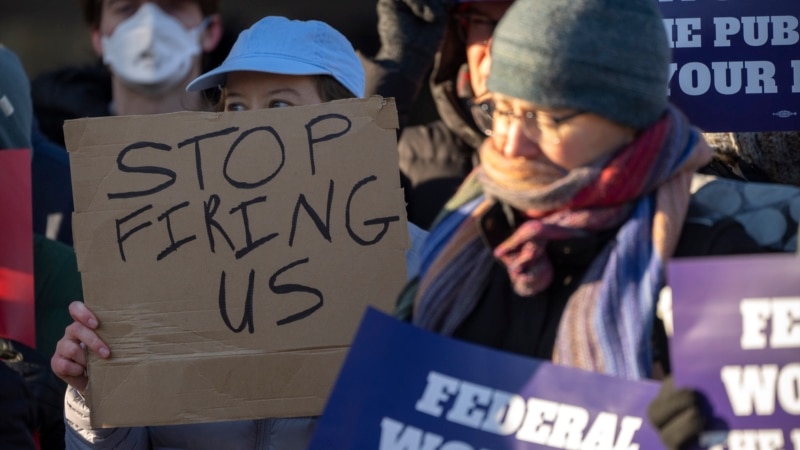
 1d
1dA California federal judge on Thursday ordered six U.S. agencies to reinstate thousands of recently hired employees who were fired as part of President Donald Trump's purge of the federal workforce. The ruling made by U.S. District Judge William Alsup during a hearing in San Francisco applies to the U.S. Department of Defense, Department of Veterans Affairs, Department of Agriculture, Department of Energy, Department of Interior and the Treasury Department. Alsup last month temporarily blocked the U.S. Office of Personnel Management, the human resources department for federal agencies, from ordering agencies to fire probationary employees, but he declined at the time to require that fired workers get their jobs back. Probationary workers typically have less than one year of service in their current roles, although some are longtime federal employees. They have fewer job protections than other government workers but, in general, can be fired only for performance issues. Alsup said on Thursday that OPM has no power to order firings, and there was evidence that it had improperly directed the termination of workers at the six agencies. He did not order the 16 other agencies named in the lawsuit by unions and nonprofit groups to reinstate workers. “It is a sad day when our government would fire some good employee and say it was based on performance when they know good and well that’s a lie,” Alsup said. The potential scale of Trump's efforts to shrink the U.S. federal government could become clearer on Thursday, the deadline for government agencies to submit plans for a second wave of mass layoffs and to slash their budgets.
Read MoreArchaeologists use song to herald findings in Guinea-Bissau dig

 1d
1dKansala, Guinea-Bissau — For centuries, the history of the West African kingdom of Kaabu has been told mainly by word of mouth. Kaabu existed from the mid-1500s to the 1800s. At its peak, it encompassed Guinea-Bissau and reached into what are now Senegal and Gambia. Sometimes Kaabu's story passed from father to son. Often it was passed by griots — or West African oral historians — who sang about the kingdom’s rulers. “The griots have already sung it, but now we know it’s real," is what Nino Galissa recounts in a recent song commissioned by archaeologists from their recent dig in Kansala — a site that was once the wealthy capital of the West African kingdom. Galissa is a direct descendent of the griots who sang for the last emperor of Kaabu. The song performed by Galissa is being shared along with a report of the archaeological findings, Sirio Canos-Donnay from the Spanish National Research Council, which was a lead institution of the dig, told VOA. “He’s combined all of the ways and methods and phrases that are the trade of the griot with the archaeological information and, hence, using that we’ll be able to transmit what we’ve done to the local population in a much more effective manner.” In Kansala, griots have long been the way history lessons were passed between generations. They often sing the history accompanied by the kora, a string instrument that resembles both a harp and a guitar. 'The puzzle you cannot miss' Antonio Queba Banjai, a descendant of the last emperors of Kaabu, remembers listening as a young boy to the griots sing about his ancestors. “Griots are not just important," he said. "They are the puzzle you cannot miss in African history, because to know what we know now is because of griots. I am from the tree of the last emperor of Kaabu. We were educated by the music of kora. The storytellers tell us where we come from.” Banjai is also president of Guinea-Lanta, an NGO that worked with the archaeologists. When team members began the project, they knew they wanted griots and oral history to play an important role in what is the biggest archaeological dig to ever take place in Guinea-Bissau. Canos-Donnay said she hoped that including oral storytelling in this report would show the academic world that things can be done differently and more inclusively. “We should pay and need to pay respect to local ways of producing and consuming history. And the collaboration and the knowledge that can come from that dialogue from these two disciplines is something that is quite extraordinary.” Canos-Donnay and others worked closely to verify that many events griots had sung about for generations actually occurred. One such event was the explosive ending of the kingdom. “Kansala had a fairly spectacular end in the 1860s, when the town was sieged by an enemy kingdom, and the local king realized he was going to lose the battle," she said. "The legend is he set fire to the gunpowder house and blew the whole site up. So, this particular point of the site is where the elders said it happened. And one of the fun things is we proved that’s where it properly did.” The dig also produced evidence of residents’ extensive trading with Europeans – Venetian beads, Dutch gin and more. Joao Paulo Pinto is the former director of Guinea-Bissau's National Institute of Study and Research. He says West African ways of recording history should be taken as seriously as European techniques. “In our system, when you talk about the ritual of passage - everything has a process, everything has a code of conduct," he said. "All our oral history systems have a commitment to the truth. I have a commitment to the truth as I speak, just the same as a book has a commitment to the truth.” As for Banjai, he hopes the project will allow others to learn about the histories and kingdoms of West Africa that he says are too often neglected in school.
Read MoreThe story of Chinese Americans who call Texas home

 1d
1dThe state of Texas has the third-largest Asian American population in the United States, according to the U.S. census, and Chinese people, some whose families arrived more than 150 years ago, make up the largest group. Chinese Americans trace back for generations in the Lone Star State. Their story may not be as well known as that of their counterparts in California or New York City, but it is just as intertwined with America's history. At Rice University, the Houston Asian American Archive, or HAAA, is keeping their stories alive and sharing them with new generations. Launched in 2009, the archive now contains the oral histories of some 500 people in its database, providing a crucial window to the past. "Oral history gives you a sense of immediacy and maybe more informality. And it's also unfiltered," said Anne Chao, HAAA co-founder and program manager. The archive also preserves memorabilia and artifacts from Asian Americans in Houston — a city known for its oil and gas industry. It is also known for space exploration and is home to NASA's Johnson Space Center. Albert Gee One Chinese American who found success in 1960s and '70s Houston was Albert Gee, who at the time was considered the unofficial mayor of the Chinese community. Gee appeared with Hollywood celebrities in the society pages of local newspapers and was once invited to the White House of President Richard Nixon. Born in Detroit, Michigan, in 1920, Gee and his family moved to New Orleans, where they operated a laundry business. When his father died in 1927, Gee's mother, who did not speak English, decided to take her children back to their home in China, hoping that her three sons would return one by one to the U.S., which they did. "Albert found himself only around 11 years old, coming back to the United States," said his daughter Linda Wu. "He was just working — working and trying to send money back to his mother." Gee returned to the U.S. with his godfather, whom he lived with for a few years in San Francisco, California. Eventually, with the help of friends and relatives, Gee ended up in Houston. He eventually opened grocery stores and restaurants, which became a draw for Hollywood celebrities, who would stay at a nearby hotel when in town. Wu has photos of celebrities such as singer Elvis Presley and comedian Bob Hope posing at the restaurants, some next to her father. Helping newcomers Wu said her parents saw themselves as Americans but never forget their roots. Her mother, Jane Eng, the child of Chinese immigrants, was born and raised in Texas. "I always remember different people coming to live with us at the grocery store, family members who would start their roots here," she said. By assisting newcomers, the established Chinese Americans helped fuel the growth of the Gee family surname in Houston. Not all the Gees in Houston were related, however. Stories about some of the city's Gees can be found in the HAAA database and in the 1998 anthology "The Gees in Houston, Texas." "For the Gee family, it's been discerned that we've come from about three to four villages in China," said Rogene Gee Calvert, who contributed stories about her father, David Gee — no relation to Albert Gee — to the anthology. David Gee David Gee migrated from China to the U.S. in the late 1920s, during the Chinese Exclusion Act, which allowed Chinese merchants, diplomats and students into the country but banned laborers. Gee was 17 when he arrived, but his passport indicated he was four years younger. He was a so-called paper son. "'Paper sons' and 'paper daughters' are the names given to people who buy false papers," said Casey Dexter-Lee, an educator at Angel Island State Park in San Francisco Bay. Part of the island served as a major immigration station from 1910 to 1940. "It's about $100 for each year of life that the person claims," she said. "So a 10-year-old would cost about $1,000 to buy false papers." After arriving in the U.S., David Gee was detained at the Angel Island Immigration Station for almost a year. Eventually, he received permission to stay. David Gee worked in San Francisco with a relative. In 1938, he moved to Houston to join a family friend. He returned to San Francisco to get married, then brought his wife to Houston, where he worked in the grocery business. "There was discrimination and, of course, there were natural barriers of language and just knowing how to navigate … how to get around and what to do," Calvert said. "So, there were some elders who were well-spoken that were respected in the mainstream community that really helped our family." Houston and Jim Crow Chao said the first large group of Chinese immigrants arrived in Houston in the 1940s and '50s. At that time, racial segregation was legal in Texas and Southern states through a series of codes known as Jim Crow laws. "Even though Houston also was subject to Jim Crow law, the law wasn't applied the same way as [in] the other Southern states. And so, there's a sense of more equitable equity in Houston." Chao said, adding that people, including Chinese Americans, settled in Houston because there was a "sense of business opportunity." Being neither Black nor white, the Chinese Texans occupied a gray area under Jim Crow law. "They were just in between and just dependent upon how well the neighborhood or people accepted them," said Ted Gong, senior adviser to the Chinese American Museum in Washington. Albert Gee, as president of the Houston Restaurant Association, took part in the desegregation of the city's restaurants in the early 1960s. Decades later, his work in the community was immortalized in a web comic for Texas students in 2023. The comic is part of a free website called Adventures of Asia, developed by Asia Society Texas, which also collaborated with HAAA to create lesson guides for teachers called Asia in the Classroom. "Our Asian American students in particular said they want to see themselves represented in the curriculum," said Jennifer Kapral, director of education and outreach at Asia Society Texas Center. The Asian population in the U.S. nearly doubled from 2000 to 2019 and is expected to continue to grow, according to the Pew Research Center. But the history of the Asians who settled in the U.S. is missing from many textbooks, Kapral said. "There was a study that looked at 30 U.S. history textbooks from across the U.S., and they found that Asian American history was only mentioned in half of them. And of that half, it was an average of about one to two pages in the entire textbook. So, it's been a big gap." Asian American Houstonians are filling this void by sharing their stories, preserving artifacts from their past, and educating the next generation about how their forebears carved a place for themselves in Texas' largest city.
Read MoreHospitalized pope marks 12 years in job with future uncertain

 1d
1dVATICAN CITY — Pope Francis marks 12 years as head of the Catholic Church on Thursday, seemingly out of danger after a month in hospital but with his health casting a shadow over his future. The 88-year-old was, for a time, critically ill as he battled pneumonia in both lungs at Rome's Gemelli hospital, where he was admitted on Feb. 14. The Argentine's situation has markedly improved since then, with the Vatican confirming his condition as stable on Wednesday evening, and talk is now turning to when he might go home. But his hospitalization, the longest and most fraught of his papacy, has raised serious doubts about his ability to lead the world's nearly 1.4 billion Catholics. Slowing down Francis had before now refused to make any concessions to his age or increasingly fragile health, which saw him begin using a wheelchair three years ago. He maintained a packed daily schedule interspersed with frequent overseas trips, notably a 12-day tour of the Asia-Pacific region in September, when he presided over huge open-air masses. But experts say his recovery could take weeks given his age and recurring health issues, not helped by having part of one lung removed as a young man. "The rest of his pontificate remains a question mark for the moment, including for Francis himself," said Father Michel Kubler, a Vatican expert and former editor in chief of the French religious newspaper La Croix. "He doesn't know what his life will be like once he returns to the Vatican and so, no doubt, reserves the option of resigning if he can no longer cope," he told AFP. Francis has always left the door open to resigning were his health to deteriorate, following the example of Benedict XVI, who in 2013 became the first pope since the Middle Ages to voluntarily step down. But the Jesuit has distanced himself from the idea more recently, insisting the job is for life. While in hospital, Francis has delegated masses to senior cardinals but has kept working on and off, including signing decrees and receiving close colleagues. But he has missed a month of events for the 2025 Jubilee, a holy year organized by the pope that is predicted to draw an additional 30 million pilgrims to Rome and the Vatican. And it is hard to imagine he will be well enough to lead a full program of events for Easter, the holiest period in the Christian calendar that is less than six weeks away. Many believe that Francis, who has not been seen in public since he was hospitalized, has to change course. "This is the end of the pontificate as we have known it, until now," Kubler said. Unfinished reforms Francis struck a sharp contrast to his cerebral predecessor when he took office, eschewing the trappings of office and reaching out to the most disadvantaged in society with a message that the Church was for everyone. A former archbishop of Buenos Aires more at home with his flock than the cardinals of the Roman Curia, Francis introduced sweeping reforms across the Vatican and beyond. Some of the changes, from reorganizing the Vatican's finances to increasing the role of women and opening the Church to divorced and LGBTQ members, have been laid down in official texts. But a wide-ranging discussion on the future of the Church, known as a Synod, is not yet finished. And there are many who would happily see his work undone. Traditionalists have strongly resisted his approach, and an outcry in Africa caused the Vatican to clarify its authorization of non-liturgical blessings for same-sex couples in 2023. "Whether we like him or not, he has shifted the dial, but many things are still pending," a Vatican source said.
Read MoreChest X-ray confirms improvements in pope's condition, Vatican says
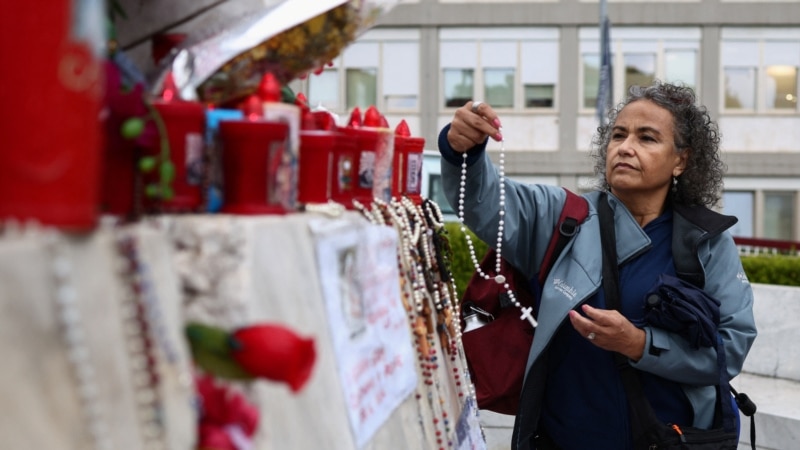
 1d
1dROME — Pope Francis' recovery from double pneumonia continued Wednesday as a chest X-ray confirmed improvement, two days after doctors declared he is no longer in imminent danger of death. The latest medical bulletin said the pope's condition remained stable but indicated a complex picture considering his overall fragility. The Vatican said Francis, 88, again followed its spiritual retreat remotely and resumed physical and respiratory therapy after a quiet night. He continues to receive high flows of oxygen through nasal tubes during the day and a noninvasive mechanical mask to aid his rest at night. His weekly Wednesday general audience was canceled since the Vatican hierarchy is on retreat this week as part of the Lenten spiritual exercises that have been a mainstay of the Jesuit pope's pontificate. Francis faces important milestones this week. On Thursday, he marks the 12th anniversary of his election as the 266th pope. The Holy See has not said how the anniversary, a public holiday in the Vatican, might be commemorated. No medical bulletin will be issued. The former Cardinal Jorge Mario Bergoglio was elected on the fifth ballot of the 2013 conclave that was called after Pope Benedict XVI resigned. While Francis has praised Benedict's humility in stepping down and said he might follow in his footsteps, more recently he has said the papacy is a job for life. Another milestone comes Friday, when Francis marks four weeks of hospitalization. St. John Paul II holds the record for a hospital stay, at 55 days, when in 1981 he underwent a minor surgical operation and then was treated for a cytomegalovirus infection. Francis is on track to equal the second-longest stay, 28 days, which John Paul recorded in 1994, when he had surgery to repair his right hip joint after he fractured his right femur in a fall, according to Gemelli hospital. The Vatican has released no photos or video of Francis since he was admitted. The pope recorded an audio message last week to thank people for their prayers, though the weakness and breathlessness of his voice made clear how frail he was.
Read MoreNew vision of architecture popping up across US deep South

 1d
1dThe American South has long been associated with white-columned mansions, rustic farmhouses, and aging structures steeped in history. But an exhibition at the National Building Museum in Washington is showcasing the vibrant, modern and forward-thinking architecture emerging from the region today. Maxim Adams has the story. Video editor: Sergii Dogotar, Anna Rice
Read MoreThe Roosevelt Hotel: A window into New York City's history

 1d
1dThe Roosevelt Hotel, a New York City landmark for over a century, once again faces an uncertain future. Last month, city officials announced plans to stop using it as a migrant shelter and processing center beginning this summer. Opened in 1924 to cater to passengers using the nearby Grand Central Terminal, the iconic hotel has weathered Prohibition, the Great Depression, a World War and 9/11. The COVID-19 pandemic in 2020, however, forced the hotel to close its doors to guests due to financial losses before its short-lived reincarnation in 2023 as a hub for undocumented migrants flooding the city. Through it all, the Roosevelt, affectionately known as the “Grand Dame of Madison Avenue,” became a favorite movie backdrop featured in countless Hollywood classics and TV shows. While its fate remains in question, the Roosevelt's past, captured in photographs and movies, serves as a microcosm of New York City and American history. 1924: Named after President Theodore Roosevelt, the hotel opened just four years after the start of Prohibition, the 13-year national ban on alcohol in the United States. While Prohibition forced some city hotels to close, the area around Grand Central flourished in the postwar years, attracting commercial developers, including those behind the Roosevelt. While not among New York's most opulent hotels, the four-star property stood as a towering presence in Midtown Manhattan, rising 19 stories into the skyline. Because of Prohibition, the Roosevelt broke with tradition and featured storefronts instead of lounges and bars on its street level. It was also among the first hotels in the world to offer pet service, child care and an in-house doctor. 1929: With alcohol off the menu, the Roosevelt became a magnet for tourists and music lovers. At the height of Prohibition, famed bandleader Guy Lombardo and His Royal Canadians performed their first live show at the hotel’s Roosevelt Grill, continuing to entertain fans for the next three decades. Their rendition of “Auld Lang Syne,” a Scottish song about old friendships and loves, became a New Year’s Eve tradition. Variety magazine later hailed Lombardo as the “only Canadian ever to create an American tradition,” cementing his legacy at the Roosevelt. 1943: Hotel magnate Conrad Hilton bought the Roosevelt, along with The Plaza hotel, calling the Roosevelt “a fine hotel with grand spaces,” and took up residence in its Presidential Suite. The acquisition established Hilton as the first coast-to-coast American hotel chain. Four years later, the Roosevelt made history again when it became the first to offer a television set in every room. But Hilton's ownership ended in 1956 when his company was forced to sell the property as part of an antitrust lawsuit brought by the government. 1948: The Roosevelt became a political hub in the mid-20th century, serving as the campaign headquarters for Republican presidential nominee Thomas Dewey in 1944 and 1948. Dewey lost both elections and conceded them from the hotel. In the years that followed, the hotel hosted other high-profile political events. 1970s-2010s: Starting in the 1970s, the Roosevelt, with its neoclassical facade and old- world interior, became a favorite filming location for Hollywood studios. Among the more than a dozen movies filmed there: “The French Connection” (1971), “Wall Street” (1987), “Presumed Innocent” (1990) and “Maid in Manhattan” (2002). Several TV shows have also been filmed there, among them: “Mad Men” and “Law & Order.” 1979: The hotel changed owners multiple times before Pakistan International Airlines, with backing from Saudi Prince Khalid bin Faisal Al Saud, took over its management from a New York real estate family. The agreement came with the option to buy the hotel for $36.5 million after 20 years — a deal the airline finalized in 2000. Considered a national asset by the Pakistan government, the Roosevelt became the preferred lodging place for visiting Pakistani prime ministers and other dignitaries to New York. In the late 1990s, the hotel hosted a live performance in the Grand Ballroom by Junoon, Pakistan’s biggest rock band. 2020-2023: In recent decades, the Roosevelt has struggled financially. In 2020, it closed its doors to guests, citing the “unprecedented environment" stemming from the pandemic. It received a fresh start when New York City signed a three-year, $220 million lease in 2023 to use it as a migrant shelter and processing center. But the lease proved a mere Band-Aid for the struggling hotel. In February 2024, Mayor Eric Adams announced the city was canceling the lease, marking the end of an era in New York history.
Read MoreMusic flows in Roberta Flack's 'Celebration of Life' memorial with Stevie Wonder and Al Sharpton

 1d
1dNEW YORK — A public memorial service bursting with choral music and the Berklee College of Music's Nebulous String Quartet, with Stevie Wonder and the Rev. Al Sharpton also on the bill, celebrated the life and legacy of Grammy-winning singer and pianist Roberta Flack. Flack's songs “The First Time Ever I Saw Your Face" and “Killing Me Softly with His Song" made her a global star in the 1970s and beyond. She died last month at age 88. Wonder was among the artists scheduled to perform during the service at a historic Harlem church, while Sharpton was to deliver the eulogy, according to the memorial program. Flack was an influential performer with an intimate vocal and musical style that ranged easily between soul, jazz and gospel. Her “Celebration of Life” memorial was livestreamed at www.RobertaFlack.com and on YouTube. Here are some highlights: For the memory of a singing legend, an historic location Flack's memorial was open to the public at The Abyssinian Baptist Church. Founded in 1808, it is one of the oldest Black Baptist churches in the U.S. The church was decorated for the ceremony with stunning white and yellow bouquets and filled quickly beforehand. At the center, a screen showed a young Flack at the piano and played highlights of her career. It was a fitting location: Flack grew up with church gospel and her mother played organ at the Lomax African Methodist Episcopal Church in Arlington, Virginia. As a teen, she began accompanying the church choir on piano. The program featured a powerful quote from Flack. “Remember: Always walk in the light,” it read. “If you feel like you’re not walking in it, go find it. Love the Light.” A celebration of a life in music ... with music “Many of us are here today because she has touched not just our hearts, but she also touched our souls,” said the Rev. Dr. Kevin R. Johnson, the senior church pastor who led the service. Choir performances including a rousing rendition of “Amazing Grace” came in between a video recollection of Flack's life and scripture readings. “That’s what we call church, y’all,” Johnson said at the close of one choral performance. Organ and piano riffs played off and on in the background. "She just sang the song. She let you hear the lyrics. She let you understand the beauty. But I also want you to understand that this woman was also a pure genius," Santita Jackson, daughter of the Rev. Jesse Jackson and a friend of Flack, told the near-capacity crowd. Actor Phylicia Rashad remembered first seeing Flack perform when she was a student at Howard University — to an audience that grew rapt by her quiet, steady voice. Flack lived comfortably with her genius and without having to proclaim it to people, Rashad said. “She wore that like a loose fitting garment and lived her life attending to that which she cared for most: music, love and humanity,” Rashad said. What are some of Flack's best-known songs? Flack leaves behind a rich repertoire of music that avoids categorization. Her debut, “First Take,” wove soul, jazz, flamenco, gospel and folk into one revelatory package, prescient in its form and measured in its approach. She will likely be remembered for her classics. Those include “The First Time Ever I Saw Your Face," her dreamy cover of “The First Time Ever I Saw Your Face,” written by English folk artist Ewan MacColl for his wife Peggy Seeger. It marked the beginning of Flack's mainstream success when it was used in a love scene between Clint Eastwood and Donna Mills in his 1971 film “Play Misty for Me.” But most will think of “Killing Me Softly with His Song" when Flack's name comes up in conversation. She first heard Lori Lieberman’s “Killing Me Softly with His Song” while on a plane and immediately fell in love with it. While on tour with Quincy Jones, she covered the song, and the audience fell in love with it, too, as they’d continue to for decades.
Read MoreFormer US first lady Michelle Obama and her brother to launch podcast
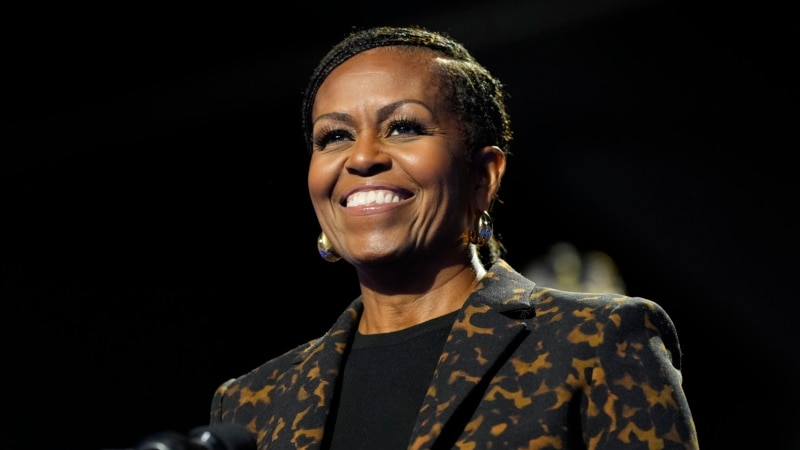
 1d
1dNEW YORK — Michelle Obama and her brother, Craig Robinson, will host a new weekly podcast series starting this month featuring a special guest pulled from the world of entertainment, sports, health or business. “IMO with Michelle Obama & Craig Robinson” will address “everyday questions shaping our lives, relationships and the world around us,” according to a press release. IMO is slang for “in my opinion.” Some of the guests slated to speak to the former first lady and Robinson, the executive director of the National Association of Basketball Coaches, include actors Issa Rae and Keke Palmer and psychologist Dr. Orna Guralnik. Other guests include filmmakers Seth and Lauren Rogan; soccer star Abby Wambach; authors Jay Shetty, Glennon Doyle and Logan Ury; editor Elaine Welteroth; radio personality Angie Martinez; media mogul Tyler Perry; actor Tracee Ellis Ross; husband-and-wife athlete and actor Dwyane Wade and Gabrielle Union; and Airbnb CEO Brian Chesky. The first two episodes — the first is an introductory one and the second features Rae — will premiere on March 12. New episodes will be released weekly and will be available on all audio platforms and YouTube. “With everything going on in the world, we’re all looking for answers and people to turn to,” Obama said in a statement. “There is no single way to deal with the challenges we may be facing — whether it’s family, faith, or our personal relationships — but taking the time to open up and talk about these issues can provide hope.” Obama has had two other podcasts — “The Michelle Obama Podcast” in 2020 and another in 2023, “The Light We Carry." Her husband, Barack Obama, offered a series of conversations about American life between him and Bruce Springsteen. The new podcast is a production of Higher Ground, the media company founded in 2018 by the former president and first lady.
Read MoreGreek lawmaker attacks paintings he said were offensive to Christians
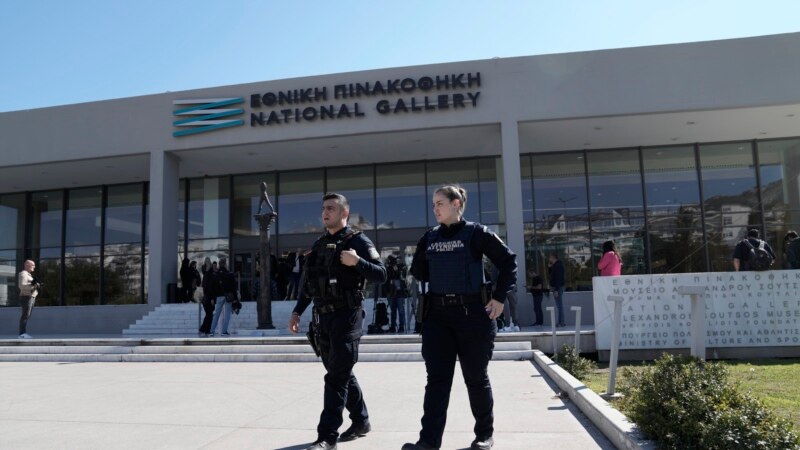
 1d
1dATHENS — A far-right Greek lawmaker attacked four paintings in an exhibition at the country's National Gallery on Monday, the gallery said, after he had described one as offensive because of its distorted depictions of Christ and the Virgin Mary. The lawmaker, named by the gallery as Nikolaos Papadopoulos, from the ultra-religious Niki party, was temporarily detained, and the gallery said it had had to close for the day due to the incident. The gallery said that with assistance from another person he had violently taken down four paintings included in the exhibition inspired by Spanish master Francisco de Goya. "The above violently detached them from the wall and threw them on the floor, which resulted in their damage," the gallery said in a statement. Papadopoulos' lawyer Constantinos Vathiotis told Reuters that he was illegally detained for five hours. Lawmakers are protected from arrest under the constitution and only parliament can lift their immunity. The exhibition, "The allure of the bizarre," is by a group of Greek artists, with works corresponding with 80 etchings from Goya's late 18th century Los Caprichos series. It has been on display in Athens since January at the country's main gallery, which is a major draw for Greeks and tourists alike. In a question to the culture ministry submitted to parliament in January, the lawmaker said that one painting, among the group of four he is accused of damaging, was "clearly offending the Orthodox Christian faith, directly insulting the holy faces of Virgin Mary and Christ, which are depicted distorted." The culture ministry responded at the time that it "never engages in censorship." The Hellenic League for Human Rights condemned the lawmaker's action, saying "freedom of art and freedom of expression are protected by the constitution and are not subject to the personal taste and religious and ideological beliefs of self-appointed judges and ultimately punishers."
Read MoreWriters, artists adapt AI technology to gain creative control

 1d
1dArtificial intelligence companies train their AI models using the works of writers, artists and creatives who typically aren’t credited or compensated. Instead of fighting AI, some tech companies are encouraging creators to take advantage of it. Tina Trinh reports.
Read More'Porcelain War' documentary spotlights Ukrainian artists’ fight for country

 1d
1dThe documentary film Porcelain War highlights the struggle of Ukrainian artists and ordinary citizens fighting to save their country and culture in the face of Russian aggression. The movie won the 2024 Sundance Festival Grand Jury Prize for documentaries and was nominated for an Oscar this year. Elena Wolf has the story, narrated by Anna Rice. VOA footage by Elena Matusovsky.
Read MoreKorean moon jars shine in Colorado show

 1d
1dTraditional Korean moon jars and modern takes on the elegant white vases are the focus of a new art exhibit in the Rocky Mountain state of Colorado. VOA Correspondent Scott Stearns has the story from Denver.
Read MoreIn tense relations with India, Pakistani TV dramas build bridges

 1d
1dKARACHI, PAKISTAN — Two Pakistani women sit together on a couch, rehearsing their lines while a director scrutinizes them. Waiting off camera for his scene is the male lead, an actor blessed with Bachelor hair and fine bone structure. Also out of sight: the Islamabad homeowners, who are holed up in a separate room and whose furniture and knickknacks will be seen by millions of viewers — many from the society that has been their country's neighbor and uneasy sparring partner for much of the past century. This is the set of the Pakistani drama Adhi Bewafai, or Half Infidelity — one of what some in other nations would call "soap operas." But these dramas, it turns out, are not just for Pakistanis. Realistic settings, natural dialogue and almost workaday plots about families and marriages make Pakistani dramas a hit with viewers at home and abroad — especially in the neighboring country that split with Pakistan in 1947 and is its nuclear archrival today: India. Television, it seems, is succeeding where diplomacy sometimes can't. A glimpse into life across the border Several thousand people work in Pakistan's drama industry; the country produces between 80 to 120 shows a year, each one a source of escapism and intrigue. They offer Indians a tantalizing glimpse into life across the border — and manage to break through decades of enmity between the two governments. Maheen Shafeeq, a research associate at the Institute of Strategic Studies in Islamabad, says there is effectively no relationship between the two governments. Each government is fixed on a single issue it cannot move past — for India, it's terrorism; for Pakistan, the disputed territory of Jammu and Kashmir. "The governments are very much opposed to each other," she says. "They don't agree what they should talk about." Although it's difficult for Indians to visit Pakistan, where these shows are filmed, they faithfully follow the plot twists and turns through platforms like YouTube, ZEE5, and MX Player. For those of a certain generation, however, it wasn't always so easy to keep up. Kaveri Sharma, a writer in the Indian city of Patna, recalls her mother-in-law and aunt jiggling antennas in the 1980s and 1990s in hopes of catching a signal from Pakistan's state broadcaster, PTV. It's how Sharma first realized that the country next door was a drama powerhouse. It inspired her to discover the shows for herself years later, even going on to watch them with her own daughter. "They feel familiar, but they are also a break from our own lives," Sharma says. "I don't see any differences between the two countries. Everything is relatable. I see Karachi and think that it could be Lucknow or Patna. What happens on the shows could happen to me or my friends." She had heard only negative things about Pakistan since childhood — that it was the enemy that would take everything from India. The TV dramas have added subtlety and detail to this image for her. She would love to visit, but is unlikely to get the opportunity. So she explores Pakistan through the locations, malls, offices, streets and restaurants depicted on the small screen. The names of popular Karachi neighborhoods roll off her tongue. Sharma, like Bibi Hafeez in the southern Indian city of Hyderabad and Punita Kumar in the central Indian city of Raipur, raves about the dramas' universality of themes, the strong characterization and the emotional range. "Pakistani characters are not only heroes or villains. They have shades to them, and that is very human," says Kumar, who chanced upon a Pakistani drama through a chunky videocassette when she was a teenager living in the northern Indian city of Aligarh. It was love at first watch. "They captivated me. We got a cable connection that offered PTV. Then YouTube came and I realized I could search for whatever drama I wanted. I haven't taken a stop," she said. "We get exposure to Pakistani life in the scenes, but the struggles the characters have with their relatives are ones I would have with my own." Pakistani TV veteran Khaled Anam is delighted by Indians' enthusiasm for the country's serials and the barriers they help erode. "What Bollywood is to India, dramas are to Pakistan," says Anam, who is based in Karachi and has worked as an actor since the 1980s. He has appeared in many dramas, including the ratings smash Humsafar (Life Partner). India's productions go big, while Pakistan's are more low key India dominates the movie market in South Asia and beyond, with big stars and bigger budgets. Pakistanis have been exposed to Bollywood films for decades, although the prevailing hostile political climate means they can't watch them in movie theaters. The bans are mutual, though. India, like Pakistan, restricts content from across the border in movie theaters and TV channels. And while India is no slouch when it comes to TV production, it doesn't offer viewers what Pakistan does, according to Anam: simplicity, depth of writing and a limited number of episodes. "There are 15-minute flashbacks in Indian serials. (The characters) are decked out and dolled up. It's a fantasy world. The shows go on forever. Everything is 'DUN dun dun!'" says Anam, mimicking a dramatic musical riff and shaking his hands. The actors on the couch in Islamabad are rehearsing lines about a woman who is disrespectful and so, according to one of them, is an unsuitable marriage prospect. The delivery and grammar could be heard in virtually any South Asian household. "Pakistanis are generally emotional people, and that is in their dramas also," says Islamabad-based director Saife Hassan. "It would take me less than two minutes to explain the plot of the super-duper hit Kabhi Main, Kabhi Tum (Sometimes Me, Sometimes You). It's about the emotions between a husband and wife." Hassan, who began his TV career in the 1990s, says Indians frequently comment on his social media pages and send him direct messages about his work. He even recalls Indian viewers praying for the recovery of a character who was in a coma. Hassan would love to see more homegrown dramas make it onto platforms like Netflix, as some Indian shows have with great success. But he wonders whether international audiences would understand and connect with Pakistani stories or lives: "The way we think is different from the West. Our shows are not driven by events. They are driven by emotions." There is also a lack of raunch in Pakistani dramas, which are family-friendly with little to no vulgarity, violence, or even action. Indians, therefore, are a natural audience for Pakistani dramas, Hassan says. "They are our people. They are like us. They eat like us," he says. "I love India, and I love Indians. They have grown out of this animosity."
Read MoreSci-fi film 'Mickey 17' tops box office, but profitability long way off

 1d
1d“Parasite” filmmaker Bong Joon Ho’s original science fiction film “Mickey 17” opened in first place on the North American box office charts. According to studio estimates Sunday, the Robert Pattinson-led film earned $19.1 million in its first weekend in theaters, which was enough to dethrone “Captain America: Brave New World” after a three-week reign. Overseas, “Mickey 17” has already made $34.2 million, bringing its worldwide total to $53.3 million. But profitability for the film is a long way off: It cost a reported $118 million to produce, which does not account for millions spent on marketing and promotion. A week following the Oscars, where “Anora” filmmaker Sean Baker made an impassioned speech about the importance of the theatrical experience – for filmmakers to keep making movies for the big screens, for distributors to focus on theatrical releases and for audiences to keep going — “Mickey 17” is perhaps the perfect representation of this moment in the business, or at least an interesting case study. It’s an original film from an Oscar-winning director led by a big star that was afforded a blockbuster budget and given a robust theatrical release by Warner Bros., one of the few major studios remaining. But despite all of that, and reviews that were mostly positive (79% on RottenTomatoes), audiences did not treat it as an event movie, and it may ultimately struggle to break even. Originally set for release in March 2024, Bong Joon Ho’s follow-up to the Oscar-winning “Parasite” faced several delays, which he has attributed to extenuating circumstances around the Hollywood strikes. Based on the novel “Mickey7” by Edward Ashton, Pattinson plays an expendable employee who dies on missions and is re-printed time and time again. Steven Yeun, Naomi Ackie, Toni Collette and Mark Ruffalo also star. It opened in 3,807 locations domestically where it performed best in New York and Los Angeles. Premium large format showings, including IMAX screens, also accounted for nearly half of its opening weekend. Internationally, it did especially well in Korea, where it made an estimated $14.6 million. Second place went to “Captain America: Brave New World,” which added $8.5 million from 3,480 locations in North America and $9.2 million internationally. Its global total currently rests at $370.8 million. Walt Disney Studios is on track to become the first studio to cross $1 billion in 2025 sometime this week. Holdovers “Last Breath,” “The Monkey” and “Paddington in Peru” rounded out the top five. The weekend also had several other newcomers in “In the Lost Lands,” a fantasy film from Paul W.S. Anderson starring Milla Jovovich and Dave Bautista, and Angel Studios' “Rule Breakers,” about Afghani girls on a robotics team. Neon upped the theater count for “Anora” to nearly 2,000 screens after it won five Oscars on Sunday, including best picture, best director and best actress. It earned an estimated $1.9 million (up 595% from last weekend), bringing its total grosses to $18.4 million. According to data from Comscore, the 2025 box office is up 1% from where it was last year as of this weekend and down 34.2% from the last pre-pandemic box office year of 2019. “That is the rollercoaster that is the box office,” said Paul Dergarabedian, the senior media analyst for Comscore. “You have two or three down weeks; it can profoundly impact the bottom line and the percentage advantage. But it will come back again.” Estimated ticket sales for Friday through Sunday at U.S. and Canadian theaters, according to Comscore. Final domestic figures will be released Monday. 1. “Mickey 17,” $19.1 million. 2. “Captain America: Brave New World,” $8.5 million. 3. “Last Breath,” $4.2 million. 4. “The Monkey,” $3.9 million. 5. “Paddington in Peru,” $3.9 million. 6. “Dog Man,” $3.5 million. 7. “Anora,” $1.9 million. 8. “Mufasa: The Lion King,” $1.7 million. 9. “Rule Breakers,” $1.6 million. 10. “In the Lost Land,” $1 million.
Read MorePope rests as Vatican marks another Holy Year event without him
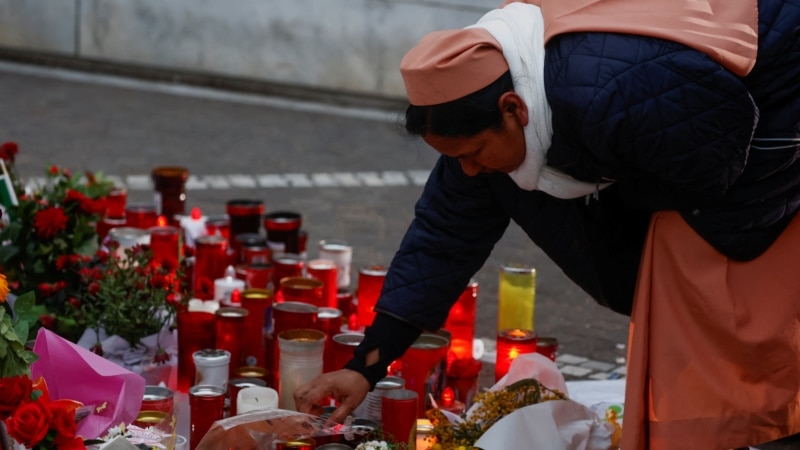
 1d
1dROME — Pope Francis continued his recovery from double pneumonia Sunday after doctors reported some positive news: After more than three weeks in the hospital, the 88-year-old pope is responding well to treatment and has shown a "gradual, slight improvement" in recent days. In the early Sunday update, the Vatican said Francis was resting after a quiet night. For the fourth Sunday in a row, the pope will not appear for his weekly noon blessing, though the Vatican planned to distribute the text he would have delivered if he were well enough. The Argentine pope, who has chronic lung disease and had part of one lung removed as a young man, has remained stable, with no fever and good oxygen levels in his blood for several days, doctors reported in a Vatican statement Saturday. The doctors said that such stability "as a consequence testifies to a good response to therapy." It was the first time the doctors had reported that Francis was responding positively to the treatment for the complex lung infection that was diagnosed after he was hospitalized on Feb. 14. But they kept his prognosis as "guarded," meaning he's not out of danger. In his absence, the Vatican’s day-to-day operations continued alongside celebrations of its Holy Year, the once-every-quarter-century Jubilee that brings millions of pilgrims to Rome. On Sunday, Canadian Cardinal Michael Czerny, who is close to Francis, celebrates the Holy Year Mass for volunteers that Francis was supposed to have celebrated. Francis has been using high flows of supplemental oxygen to help him breathe during the day and a noninvasive mechanical ventilation mask at night. Francis was hospitalized Feb. 14 for what was then just a bad case of bronchitis. The infection progressed into a complex respiratory tract infection and double pneumonia that has sidelined Francis for the longest period of his 12-year papacy and raised questions about the future.
Read MoreWild ancient version of football is still being played today

 1d
1dASHBOURNE, ENGLAND — This ancient form of football has a rule forbidding players from murdering each other. Every year, thousands of people descend on a small town in the English countryside to watch a two-day game of mass street football that, to the casual observer, could easily be mistaken for a riot. This is Royal Shrovetide — a centuries-old ball game played in Ashbourne, Derbyshire, that, frankly, looks nothing like the world's most popular sport. Or any other game for that matter. "It's like tug of war without the rope," says Natalie Wakefield, 43, who lives locally and has marshaled the event in the past. "It's mad in the best possible way." Hundreds of players Played between two teams of hundreds of players, the aim is to "goal" at either end of a 5-kilometer sector that could take the match through rivers, hedgerows, high streets and just about anything or anywhere except for churchyards, cemeteries and places of worship. The ball is thrown into a crowd that moves like a giant herd, as each team tries to carry it toward their desired goal. Rules are limited but "no murder" was an early stipulation for the game that dates back to at least the 1600s. Good players need to be "hard, aggressive and authoritative," says Mark Harrison, who "goaled" in 1986 and is one of multiple generations of scorers in his family. "You can't practice," the 62-year-old Harrison adds. He stopped competing seven years ago and now serves up burgers to throngs of spectators from a street food truck. "You've just got to get in there and be rough. I am a rugby player ... I'm also an ex-boxer so that helps." Royal approval Harrison had the honor of carrying the then-Prince Charles on his shoulder when in 2003 the now-King of England opened that year's game. "He loved it!" Harrison says. Played over Shrove Tuesday and Ash Wednesday each year, the event is a source of immense pride for the people of Ashbourne in Derbyshire's Peak District. Yet, such a unifying tradition is actually based upon splitting the town into two halves between the "Up'ards" and the "Down'ards," determined by whether players are born on the north or south of the River Henmore. Don't park there On any other days, Ashbourne, around a three-hour drive from London, is quiet and picturesque with a high street lined by antique shops, cafes and traditional pubs. Visitors include hikers, cyclists and campers. For two days that all changes. Large timber boardings are nailed up to protect shop fronts. Doorways are barricaded. "Play Zone" signs are strapped to lampposts, warning motorists not to park there for fear of damage to vehicles, which can be shoved out of the way by the force of the hoards of players trying to move the ball. In contrast, colorful bunting is strewn high above from building to building and revelers congregate, eating and drinking as if it is a street party. Parents with babies in strollers watch on from a safe distance. School holidays in the area have long since been moved to coincide with the festival. "There are people who come and they have a drink and they're just like, 'This is a bit of a crazy thing and it's a spectacle, and now I've seen it, box ticked off,'" says Wakefield, who also used to report on Royal Shrovetide for the local newspaper. "And there are people who are absolutely enthralled by it all, and they get the beauty and complexity of the game and those people follow it year on year." Where's the ball? Play begins with an opening ceremony in a car park, no less, in the center of town. The national anthem and Auld Lang Syne are sung. Competitors are reminded, "You play the game at your own risk." A leather ball, the size of a large pumpkin, filled with cork and ornately painted, is thrown into what is called a "hug" of players. And they're off. As a spectator sport, it can be confusing. There can be little to see for long periods during the eight hours of play each day from 2 p.m. local time. Players wear their own clothes — such as random football or rugby jerseys — rather than matching uniforms. On Tuesday, it took more than 45 minutes to move the ball out of the car park. Onlookers stand on bins, walls and park benches, craning their necks to look down alleyways to try to get a better view. "Can you see the ball?" someone will ask. The answer is often "No." One person thinks it might be in line with a tree over to the right of the car park, but can't be sure. Later that day there had been no sight of the ball for almost two hours until rumors started to circulate that the Down'ards scored what turned out to be the only goal over the two days of play for a 1-0 victory. Deception and cunning With so many players, the hug can be difficult to maneuver but gathers pace quickly, prompting crowds of spectators who'd previously been trying to get a closer look to suddenly run away from the action. The ball can be handled and kicked. Play can be frantic, with players racing after a loose ball wherever it may take them, diving into the river and up and out the other side. While strength is needed in the hug, speed is required from runners if the ball breaks free. Royal Shrovetide, however, can be as much about deception and cunning as speed and strength, it seems. "There's a bit of strategy involved in that somebody's pretending they've still got the ball in the middle of the hug," Wakefield says. "And they're quietly passing it back out to the edge to get it to a runner who has to sneak away in a kind of, I imagine, very nonchalant manner and then leg it down an alleyway." A famous goal in 2019 came as a result of the hug not realizing it didn't have the ball until it was too late. Hidden by two schoolboys standing meters away, the ball was passed to a player who ran, largely unimpeded, for 2 1/2 kilometers before scoring. A ball is goaled when it is hit three times against one of the millstones at either end of the town in Clifton or Sturston. The beautiful game Scorers have likened the achievement to winning Olympic gold. They are carried on shoulders, paraded through the town and celebrated like heroes. "If you can imagine playing for Manchester United in their heyday and they're at Wembley in a cup final. You score the winner. You're there," Harrison says. Scorers also get to keep the balls, which are repainted and become treasured family possessions. It is the game, however, that is treasured most of all. "I just live and breathe it," says Janet Richardson, 75, from Ashbourne, who has been going to Royal Shrovetide since she was a 1-year-old. "I can't sleep because I'm excited. It's so lovely to think that all these people still want to come here and watch this beautiful game that we've got in our town."
Read MoreTrump appoints 2 from Fox News to Kennedy Center board

 1d
1dWASHINGTON — U.S. President Donald Trump said on Friday he was appointing Fox News host Laura Ingraham and Fox Business anchor Maria Bartiromo to the board of the John F. Kennedy Center for the Performing Arts. In February, weeks after taking office, Trump fired the center's president, replaced the board of trustees and named himself chairman of the organization. The moves represented a takeover by Trump of a cultural institution that is known for its signature Kennedy Center Honors performances and is home to the National Symphony Orchestra and the Washington National Opera. "This completes our selection," Trump said on social media after announcing the appointments of Ingraham and Bartiromo. Trump said last month special U.S. envoy Richard Grenell will serve as the interim executive director of the center. Since taking office on Jan. 20, Trump, a Republican, has embarked on a massive government makeover, firing and sidelining hundreds of civil servants and top officials at agencies in his first steps toward downsizing the bureaucracy and installing more loyalists. During his first term in office, Trump declined to attend the annual Kennedy Center Honors, considered the top award for achievement in the arts. In December, at the last show attended by former President Joe Biden, the center's leaders made clear Trump was welcome to come in the future. Earlier this week, the hit musical Hamilton canceled its run at the center after Trump's takeover.
Read MoreSocial media storm throws cat owners in Kashmir into tizzy

 1d
1dSRINAGAR, INDIA — Viral social media posts threw cat lovers in Indian-controlled Kashmir into a tizzy. Panic spread and local veterinarians saw a surge in pet owners coming in with their cats — all because of posts that went viral on social media. It began with a warning in January from veterinarians in the disputed Himalayan region, where the cat population has soared over the past years, partly because of stray cats roaming free and pet stores bringing in ever more costly breeds to keep up with local demand. The vets said there's been an uptick in infections among the feline population due to lack of vaccination and mishandling of strays. What was meant to be a cautionary note was misinterpreted. Video clips and news reports started claiming that cats transmit potentially deadly infections to humans, and that cat-borne diseases can cause miscarriages among women. Days later, the region's animal husbandry department issued a statement saying there's no harm in keeping cats as pets as long as proper hygiene is maintained. But the statement did little to calm pet owners in Kashmir, where cats have been long revered in Islamic folklore for their cleanliness and considered noble and intelligent creatures. Mir Mubashir, a local businessman who lives on the outskirts of Srinagar, the region's main city, said the posts and reports made him worried. His heart heavy, he took Liger, his Persian kitty, to her vet to make sure she was fine. "I felt really scared," he said. Only after the vet's assurances that all was well did he calm down. Reflecting the level of concern, Altaf Gilani, the head of the main Srinagar animal hospital, said they had examined 2,594 cats in the first seven weeks of this year, compared to a total of 1,010 cats in January and February last year. If regular deworming, vaccinations and hygiene protocols are followed, pet owners are not at risk, he said. Keeping cats, much like raising pigeons in Kashmir, is seen as a stress buster and mood elevator in a region long plagued by conflicts. Split between Pakistan and India but claimed by both in its entirety, Kashmir has recently seen two harsh lockdowns, first in 2019, when Indian Prime Minister Narendra Modi's government stripped the region's semi-autonomy, and again in 2020, during the coronavirus pandemic. More and more people began adopting stray cats during the lockdowns. Children were encouraged to play with them — experts called it pet therapy. "Cats entice you to love them and you get attached once you spend time with them," said Mujtaba Hussain, another cat owner.
Read MoreAutopsies show Gene Hackman died of heart disease; wife died of hantavirus

 1d
1dSANTA FE, NEW MEXICO — Oscar-winning actor Gene Hackman was in an advanced state of Alzheimer's and died of heart disease and other factors likely days after his wife, Betsy Arakawa, died of a rare virus spread by mice, according to autopsy results released Friday in New Mexico. Hackman, 95, Arakawa, 64, and one of their dogs were found dead Feb. 26 in separate rooms of the couple's Santa Fe home. Hackman's heart disease and the hantavirus pulmonary syndrome that caused Arakawa's death were announced at a press conference at the Santa Fe sheriff's office. Hackman's wife died a week before he did, results showed. A reporter asked Sheriff Adan Mendoza if Hackman's advanced Alzheimer's had hindered him from perceiving her death. "I would assume that is the case," Mendoza told reporters. "He was in an advanced state of Alzheimer's, and it is quite possible he was not aware she was deceased," Heather Jarrell, chief medical investigator at the New Mexico Office of the Medical Investigator, told reporters. Arakawa is believed to have died around Feb. 11, authorities said Friday, citing the date of her last email. Jarrell determined Hackman died on Feb. 18, based on his pacemaker activity. Hantavirus is a rare disease in the U.S., with most cases concentrated in the western states of New Mexico, Arizona, Colorado and Utah. In northern New Mexico, the virus is predominantly spread through the droppings and urine of deer mice. The virus is often transmitted through the air when people sweep out sheds or clean closets where mice have been living. It begins with flu-like symptoms and can lead to heart and lung failure, with around 38% to 50% of cases resulting in death. New Mexico has experienced between one and seven cases annually in recent years, according to health data. State health inspectors found no particular sign of rodents inside Hackman's home but did detect rodent activity in structures outside the house, State Veterinarian Erin Phipps told reporters. Hackman and Arakawa, a pianist, had called Santa Fe home since the 1980s and were active in the city's art community and culinary scene. In recent years, the couple were seen less often in town as Hackman's health deteriorated. They lived a very private life before their deaths, Mendoza said. A caretaker at their gated community discovered the couple dead. Sheriff's deputies found Hackman in the kitchen. Arakawa and a dog were found in a bathroom. Both Hackman and Arakawa appeared to have suddenly fallen to the floor, and neither showed signs of blunt force trauma. Arakawa had picked up one of her dogs in a crate on Feb. 9 from a Santa Fe veterinarian, which may explain why the animal was found dead in the crate in the couple's home on Feb. 26, Mendoza said. Phipps said the dog may have died of starvation. Hackman, a former Marine known for his raspy voice, appeared in more than 80 films, as well as on television and the stage during a lengthy career that started in the early 1960s. He earned his first Oscar nomination for his breakout role as the brother of bank robber Clyde Barrow in 1967's "Bonnie and Clyde." He won an Oscar for best actor in 1972 for his portrayal of detective Popeye Doyle in "The French Connection," and in 1993 won an Oscar for best supporting actor for "Unforgiven."
Read MorePlay about Winnie Mandela explores Black women's apartheid struggles

 1d
1dJOHANNESBURG — A new play about anti-apartheid icon Winnie Madikizela-Mandela seeks to highlight the struggles of Black women in South Africa who had to wait years for their husbands' return from exile, prison or faraway work during decades of white minority rule. The play about the late former wife of Nelson Mandela, South Africa's first Black president, is adapted from the novel The Cry of Winnie Mandela by Njabulo Ndebele. It explores themes of loneliness, infidelity and betrayal. At the height of apartheid, Madikizela-Mandela was one of the most recognizable faces of South Africa's liberation struggle while her husband and other freedom fighters spent decades in prison. That meant constant harassment by police. At one point, she was banished from her home in Soweto on the outskirts of Johannesburg and forcefully relocated to Brandfort, a small rural town she had never visited nearly 350 kilometers away. Even after she walked hand-in-hand with her newly freed husband in 1990 and raised her clenched fist, post-apartheid South Africa was tumultuous for her. Madikizela-Mandela, who died in 2018 aged 81, was accused of kidnapping and murdering people she allegedly suspected of being police informants under apartheid. She also faced allegations of being unfaithful to Mandela during his 27 years in prison. Those controversies ultimately led to her divorce from Mandela, while their African National Congress political party distanced itself from her. The isolation and humiliation inspired Ndebele to write about Madikizela-Mandela for South Africa's post-apartheid generations. "How can they implicate Winnie in such horrendous events? She is the face of our struggle," Ndebele's character, played by South African actor Les Nkosi, wonders as he describes his thoughts upon hearing the news of the ANC distancing itself. "The announcement invokes in me a moral anguish from which I'm unable to escape. Is she a savior or a betrayer to us?" A key scene addresses Madikizela-Mandela's appearance before the Truth and Reconciliation Commission, a body formed to investigate human rights abuses during apartheid. She denied murder and kidnapping allegations and declined a request to apologize to families of alleged victims. "I will not be the instrument that validates the politics of reconciliation, because the politics of reconciliation demands my annihilation. All of you have to reconcile not with me, but the meaning of me. The meaning of me is the constant search for the right thing to do," she says in a fictional monologue in the novel. The play also reflects how the Mandelas' divorce proceedings played out in public, with intimidate details of their marriage and rumors of her extramarital affair. For the play's director, Momo Matsunyane, it was important to reflect the role of Black women in the struggle against apartheid who also had to run their households and raise children, often in their husbands' long absence. "It's also where we are seeing Black women be open, vulnerable, sexual and proud of it, not shying away. I think apartheid managed to dismantle the Black family home in a very terrible way. How can you raise other Black men and women when our household is not complete?" Matsunyane said. In the play, one Black woman tells a group of friends how her husband ended their marriage when he returned home after 14 years abroad studying to be a doctor and found she had given birth to a child who was now 4 years old. Another woman tells the same group — who call themselves "Ibandla Labafazi Abalindileyo" (Organization of Women in Waiting in the isiXhosa language) — that her husband returned from many years in prison but left her to start a new family with a white woman. Madikizela-Mandela, played by Thembisa Mdoda, gets to answer questions about her life and the decisions she made during an encounter with the women. The play, which also draws on the protest music of that period, opened at The Market Theatre in Johannesburg and will run until March 15.
Read MoreNew real estate platform lets homebuyers know about future neighbor’s politics

 1d
1dMost homebuyers get to know the people who live next door after they move in. But a new real estate platform allows future homebuyers to learn a potential neighbor’s political leanings before they make what, for many people, is the biggest purchase of their life. “The purpose of Oyssey [the app] is to democratize data for buyers in their home search experience … to get you, as a prospective buyer, a feel for the area and community,” says Darian Kelly, co-founder of Oyssey. “It's to get you to the understanding of, when I move here, these are the type of people that I might be inviting over for dinner. The type of people that I will be raising my child alongside.” The Oyssey data is pulled from sources like election results, campaign contributions and information from marketing research firms. The real estate platform has only launched in Florida and New York so far, but its founders say they expect to take it nationwide later this year. Realtors subscribe to Oyssey and then give their homebuyer clients access to the service. For the initial launch, the platform breaks down political affiliation block by block, but Kelly says potential homebuyers will eventually be able to look up whether their prospective new neighbor is a registered Democrat or Republican. Ben McCartney, an assistant professor of commerce at the University of Virginia, co-authored a study published in 2024 that found that 1 of every 100 moves is politically motivated, and that the people most likely to relocate for this reason tend to be less involved in politics. “They don't want politics to be part of their everyday life, but then they get a new neighbor, and that new neighbor is not only very politically vocal, but also affiliated with the opposite party, and there's where we see the strongest tensions arise,” McCartney says. The study found that current residents are slightly more likely to move away if they get new neighbors with different political views than if the new neighbor is affiliated with the same political party. “So, political polarization isn't just a social media phenomenon but is affecting real economic decisions, as well,” McCartney says. The study found the numbers of Democrats and Republicans who wanted to move away from neighbors with different political views to be roughly even. That’s why a platform like Oyssey makes sense to McCartney. “People do seem to care about the political identities of their new neighbors, so I'm not surprised that some company is now selling that information, or providing that information, to would-be buyers,” he says. “And I tend to be supportive of policies that make it easier for people to make informed decisions.” The Oyssey platform also provides other data relating to quality of life for the individual homebuyer, such as where to find the most dog parks. “Where is the area with the most registered dogs throughout their state or county?” Kelly says. “And we can try to get an idea and figure out where do the dogs live, because as a pet owner, that’s where I want to be.” He dismisses any suggestion that Oyssey could contribute to deepening America’s political divide. “I actually get upset by the question. … I think the question makes the assumption that you shouldn't be the driver, you shouldn't be the writer of your own story,” Kelly says. “We believe that we're giving people the data and the information to control their own destiny and do what they will with that information. The data already exists.” Oyssey’s stated goal is to make that public information easier to find.
Read MoreWhat happens on moving day at White House?
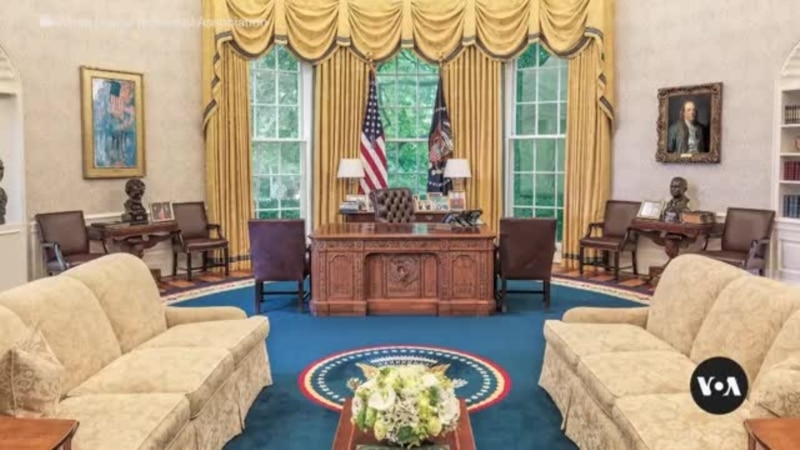
 1d
1dAfter Donald Trump is sworn in as president, there will be a swirl of activity at the White House. Over about six hours, the belongings of outgoing President Joe Biden and family will be removed and the residence will be made into a home for the new chief executive. VOA's Dora Mekouar reports.
Read MorePast US presidents had hard time downsizing government
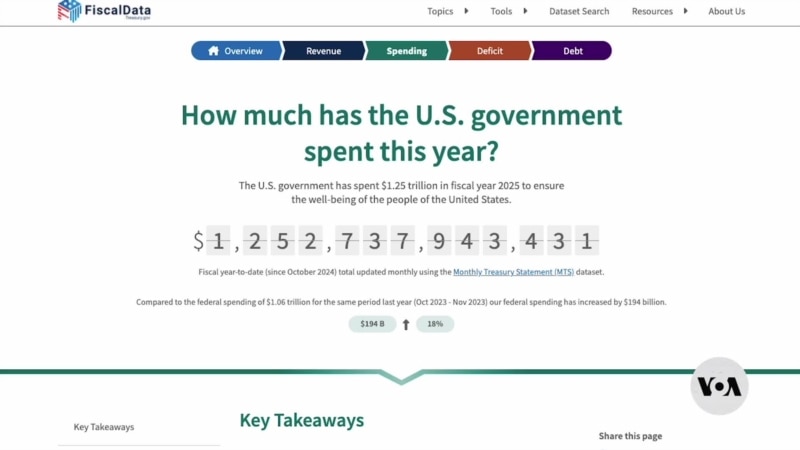
 1d
1dPresident-elect Donald Trump wants to slash government spending. A proposed advisory commission called the Department of Government Efficiency will lead the effort. It’s not a new concept. As VOA’s Dora Mekouar reports, American leaders have tried to reduce the role of government almost since the beginning.
Read MoreWhy New York’s biggest retailers stick to century-old holiday marketing gimmick

 1d
1dIt’s a marketing tradition that dates back more than a century. Each year, New York City’s most famous retailers unveil their opulent holiday window displays. VOA’s Dora Mekouar explores why the old-fashioned marketing device is still relevant in the modern world. Camera: Adam Greenbaum, Ihar Tsikhanenka
Read MoreIncoming FCC chair is big tech critic who worries about China
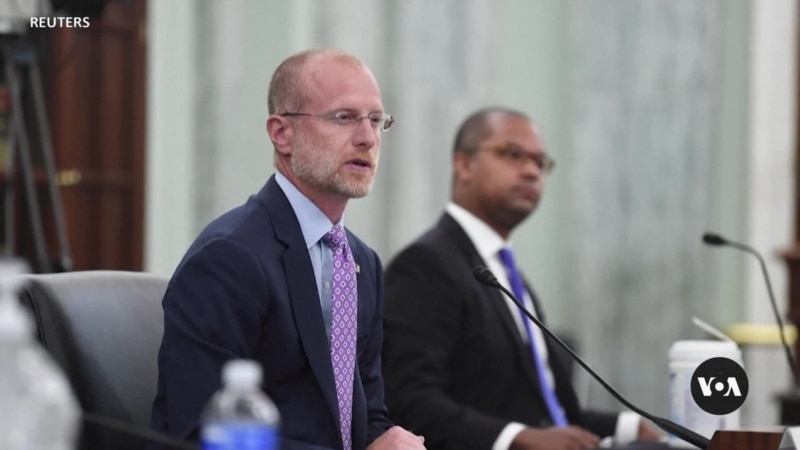
 1d
1dPresident-elect Donald Trump has nominated Brendan Carr to lead the Federal Communications Commission, which regulates communications in the United States. Carr, an FCC commissioner since 2017, has taken aim at big tech and China’s influence on U.S. communications. VOA’s Dora Mekouar reports.
Read MoreAt America’s oldest pet cemetery, humans spend eternity with faithful companions

 1d
1dHARTSDALE, NEW YORK — On most days, Mark Lindenberg either drives by or walks over to visit with Boots, his beloved pet cat who died in August 2020 at the age of 17. The New York man had his black-and-white tuxedo cat buried at the Hartsdale Pet Cemetery, a picturesque spot with rolling, grassy hills near the main road. The epitaph on Boots’ tombstone reads, “You taught me how to love and be loved.” Other tombstones are engraved with phrases such as “A truer friend we never had” and “Our beloved queen.” “Human cemeteries are sad,” Lindenberg says. “This is one of the most cheerful places. When you look at the love that goes behind every plot here — the sayings, the toys, the pinwheels — it's just, I can't think of a better place.” Hartsdale is America’s oldest working pet cemetery and was added to the National Register of Historic Places in 2012. Lindenberg says he paid about $7,000 to bury Boots at Hartsdale. Those costs include the plot, casket, tombstone, burial and site maintenance in perpetuity. “What have I worked for if I'm not going to do the things that matter most, and this mattered most,” Lindenberg says. “I got instant closure the day I decided I was going to bury her here.” Pet burials started in Hartsdale in 1896 when veterinarian Samuel Johnson allowed a client to bury her dog in his apple orchard, a hillside spot located about 30 kilometers north of New York City. Since then, about 70,000 animals have been laid to rest in the 2-hectare cemetery. Most of the pets buried at Hartsdale are cats and dogs, but there are a few more exotic animals. “There's reptiles that are buried here. Mice,” says Edward Martin III, vice president of the Hartsdale Pet Cemetery. “There's a lion cub that was buried here in 1912 by a Russian princess. There's the ashes of Ming, who's a Bengal tiger that was buried here a few years ago. There are some monkeys.” There’s also Hudson the horse, some birds and singer Mariah Carey’s cat, Clarence. The oldest headstone, dating to 1898, commemorates the life of a dog named Blague. Martin runs the place alongside his father, Edward Martin Jr., who purchased the cemetery in 1974. The younger Martin is a lawyer and certified public accountant, who eventually opted to help oversee the cemetery, where he once worked as a teenager. “I've seen what people go through, and they lose their pets, and I feel like I'm in a good position where I can help them,” he says. “And I have helped them, and it makes me want to continue helping them.” Between 250 and 300 burials are conducted at Hartsdale each year. The cemetery never runs out of space because not all of the graves are permanent. People can pay a one-time forever maintenance fee of $3,500 or an annual fee of $105. If the annual fee stops being paid, that gravesite is eventually offered for sale. “The pet in the grave will be removed from that plot so someone else who wants it can pay the maintenance. And the pets are taken out, and they're cremated, and they don't leave the cemetery,” says Martin Jr., Hartsdale’s president. “Their remains are scattered over the cemetery grass.” A centerpiece at the cemetery is the war dog memorial at the top of a hill. Unveiled in 1923, the monument was originally dedicated to World War I service dogs. But these days, the memorial honors service dogs of all kinds. Although Hartsdale is primarily a resting place for animals, the cremated remains of about 800 humans are buried here with their pets. There’s even a Martin family plot, where the elder Martin plans to eventually be laid to rest with other relatives. “I have to be buried somewhere. And why would I go to any place other than this?” he says. “My mother and father, and my mother-in-law or father-in-law are buried here, and so, that's a good reason by itself to do it.” Lindenberg also likes the idea. He has already arranged to be cremated and buried alongside Boots when the time comes. “I'm single. I don't know if I'll ever get married, and I can't think of a better place,” he says. “I lived with my cat every day for almost 17 years. Why stop now?” In the meantime, Lindenberg, who lives a 10-minute walk away, will continue to visit his old friend almost daily.
Read MoreBehind the scenes at the Macy’s Thanksgiving Day parade

 1d
1dFor nearly 100 years, Americans have enjoyed watching the Macy’s Thanksgiving Day Parade. The spectacle is an annual tradition that aims to make millions of consumers feel connected to the department store. VOA’s Dora Mekouar looks at the parade preparation.
Read MoreMost Americans can vote before Election Day

 1d
1dMore than 300,000 people in the state of Georgia cast their ballots for U.S. president on the first day of voting in the battleground state. These people were among the millions of Americans who are eligible to vote before Election Day, November 5.
Read MoreIs America about to make history with its first 'first gentleman'?

 1d
1dIf Democratic presidential nominee Kamala Harris makes history in November by being elected America’s first female president, her husband Doug Emhoff would also break barriers as the country’s first 'first gentleman.' It would be the second time the former entertainment lawyer has made history, after spending almost four years as the nation’s first 'second gentleman.' VOA’s Dora Mekouar reports.
Read MoreDemographic changes shake up Arizona presidential politics

 1d
1dPeople in all 50 states will vote in this year’s U.S. presidential election. But it is outcomes from seven so-called swing states that will likely determine the winner. The Southwestern state of Arizona traditionally favored Republican candidates, but Democrat Joe Biden won the state in 2020, and its electoral votes are up for grabs again in 2024. From Arizona, VOA’s Dora Mekouar has our story. Videographer: Miguel Amaya
Read MoreHow Republican-leaning Nevada became a swing state

 1d
1dIn the U.S., all eyes are on the seven so-called battleground states that are expected to determine the outcome of the 2024 presidential election. While some of them have shifted politically over the years, the Western swing state of Nevada does not lean strongly toward one major party or the other. VOA’s Dora Mekouar reports from Las Vegas. Camera: Miguel Amaya
Read MoreAfter 20 years, killer, invasive snakehead fish haven't devoured the competition

 1d
1dFredericksburg, Virginia — Most mornings, when the weather cooperates, angler Mike Sielicki can be found out on the water in Fredericksburg, Virginia — about an hour’s drive from Washington — trying to hook a species of fish that was once considered a dangerous threat to the surrounding aquatic wildlife. “To me, it's the best fish that ever hit the United States,” Sielicki says. “I hope it winds up going in every body of water so everybody can enjoy it.” Sielicki has fished for northern snakeheads for 20 years, since they first showed up in Potomac Creek, a shallow inlet that feeds into the Potomac River, a major Washington-area waterway. Through his company, Apex Predators Potomac Creek, he takes paying customers out on his boat to fish for the invasive predator, which originally came from Asia. “I have a fair amount of people that come from out of the state, out of the United States, that come fish with me,” he says on a quiet August morning when the snakeheads are proving elusive so far. “The water here is very shallow, gets very grassy, and that's their perfect habitat.” Snakeheads first appeared in the Washington area in 2002. Almost immediately, local wildlife officials sounded the alarm. Scientists worried that snakeheads would decimate this area’s native predator fish populations, including the prized largemouth bass. “The Potomac River is a renowned destination throughout the country for bass tournaments and sport bass fishing. It's huge,” says John Odenkirk, a fisheries biologist with the Virginia Department of Wildlife Resources. “And so, that was the concern, that this fish [snakehead] was going to destroy that, because they were kind of the same level at the top of the food chain.” Snakeheads, which can grow to more than 83 centimeters long, have pointy teeth and can breathe air, which means they can survive out of the water for several days — as long as their skin remains moist. Snakeheads also spawn twice a year, while similar level fish only spawn once a year. Officials worried these unique qualities would give snakeheads the edge over native top-level predators. “So, on paper, it's like, ‘Wow, they got some competitive advantage here.’ … What was driving the fear was that the abundance of snakeheads would get so high they would just overwhelm the system. That never happened,” Odenkirk says. “They never got to the point where they could threaten the stature of the bass, because there weren't enough of them.” Odenkirk says snakeheads aren’t dominating their environment in part because predators, including birds and other large fish, found them. And he says the snakehead's natural prey, including smaller fish, instinctively adjusted to its presence. The fish populations that snakeheads prey on have not declined, which suggests the snakeheads aren’t having a negative impact on the environment, Odenkirk adds. The fish is also popular with anglers, which has also kept the snakehead population in check. Their firm, mild-tasting white meat makes them a sought-after delicacy. “Like swimming chicken,” Sielicki says. “It's the most hardiest piece of meat that you'll ever get.” Despite this suppression, in the United States the snakehead population has become most abundant in the Washington-area’s Potomac River and its tributaries, and in the southern state of Arkansas, where the fish used to be bred for food until 2002, when federal officials banned the practice. Even though snakeheads haven’t had a noticeably negative impact on the ecosystem, wildlife officials aren’t prepared to give the invasive species the all-clear. “If they get in somewhere different, maybe where we have a threatening or endangered fish, where there's not as much diversity in the fish community, there could be some unwanted impacts in a situation like that,” Odenkirk says. “So, there's still that hesitancy to sort of embrace the fish all across the board.” Years ago, worried wildlife officials advised people to kill snakeheads if they caught them. But a recent state survey showed that about 40% of people who catch this prized fish in Virginia now choose to release it back in the wild. But not Sielicki, who relishes harvesting his catch, which he does on this morning after an hourslong lull, when the determined fisherman finally hooks a 63-cm snakehead. “Back up! We’re getting ready to put him in the boat,” he calls out. “Let’s see if we can get another one.”
Read MoreHanging out in urban green spaces helps prevent heart disease, study finds
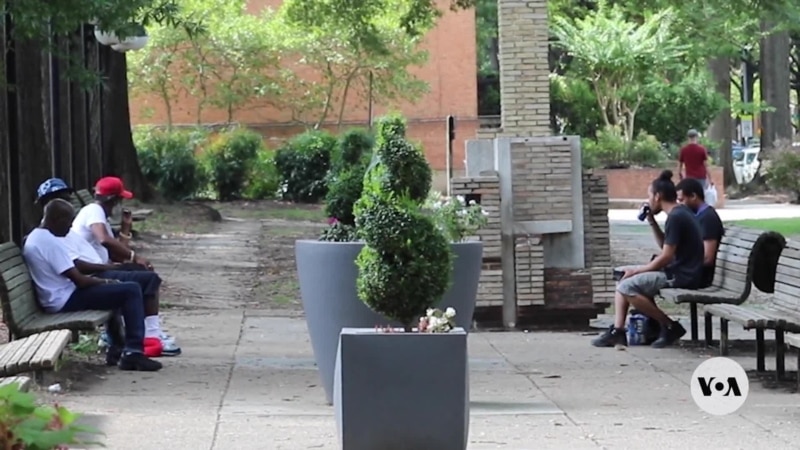
 1d
1dAccess to nature isn’t just good for your mental health. A long-term study suggests that spending time in green spaces, or by water, can help prevent heart disease. VOA’s Dora Mekouar has more. Camera: Saqib Ul Islam.
Read MoreHow US Supreme Court's immunity decision could impact presidential race

 1d
1dU.S. President Joe Biden speaks out against Monday’s Supreme Court decision giving former presidents immunity from prosecution for actions falling within their official job duties. The ruling doesn’t dismiss former President Donald Trump’s 2020 election interference case, but does delay it. Dora Mekouar reports.
Read MoreNikki Haley voters could swing US presidential election
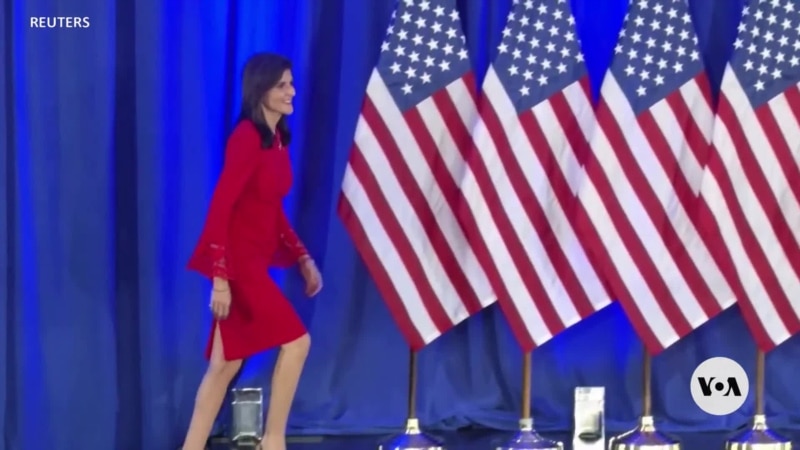
 1d
1dFormer South Carolina Governor and U.N. Ambassador Nikki Haley continued to draw support from Republican voters long after she dropped out of this year’s U.S. presidential race. VOA’s Dora Mekouar looks at how Haley supporters may help determine the winner of the election between President Joe Biden and former President Donald Trump.
Read MoreHistoric Washington garden gets eco-friendly makeover

 1d
1dIn Washington, the garden of former President Woodrow Wilson’s historic home is being reimagined to accommodate a changing climate. VOA’s Dora Mekouar reports. Camera: Adam Greenbaum.
Read MoreNumber of foreign-born people hits record in US, despite slow population growth

 1d
1dImmigrants make up almost 14% of US population
Read MoreTrillions of cicadas descend on parts of US

 1d
1dTrillions of cicadas that have burrowed underground for 13 and 17 years are now emerging in parts of the midwestern and southern United States. “The southern states and the central U.S. are going to be the hardest hit,” says Paula Shrewsbury, an entomologist at the University of Maryland. “They will have trillions of cicadas.” The 13-year cicadas, Brood XIX, are found in Georgia, Tennessee, the Carolinas and elsewhere in the Southeast. Brood XIII, the 17-year cicadas, emerged primarily in Illinois. Periodical cicadas, which stay underground for years and then emerge together, are only found in the United States. “That's one of the big mysteries as to why these cicadas evolved really long life cycles, among the longest among all insects,” says Floyd Shockley, an entomologist at the Smithsonian’s National Museum of Natural History, adding that it could be a reaction to radical temperature changes long ago. “The last few ice ages, which would have happened after Magicicada evolved, may have forced them to have longer life cycles in order to survive periods of time when their host trees would have been impacted by glaciers,” he says. Watch: The cicadas spend their years underground as nymphs feeding on the sap from trees until it's time to rise, which occurs when the ground temperature reaches about 17 degrees Celsius [64 degrees Fahrenheit]. “That first night, their only goal is to molt into the adult,” Shockley says. “It takes them several hours to complete this process. They usually start at dusk and do most of this at night to avoid predators. It's not a very effective strategy, but when you're coming out in the millions or hundreds of millions, you don't really have to worry too much about surviving … there's still plenty [of cicadas] for the reproductive phase.” After a few days, the mating dance begins. The male cicadas gather in trees and start singing to attract the females, who will signal if they are interested. “She will flick her wings, and he will mate her. And once she's mated, he inserts what’s called a copulatory plug, which plugs the female so that other males can't mate her,” Shrewsbury says. “But then he gets to go on and find other females to mate with.” Mating can last from a few hours to up to a day. Once mated, the females start creating slits in tree branch stems where they will lay 400 to 600 eggs before they die. All of the cicadas will live above ground for only four to six weeks, just long enough to mate and lay their eggs before a massive adult die-off. The eggs left behind hatch about six to eight weeks later. The hatched nymphs drop to the ground and burrow beneath the dirt to begin the cycle all over again. While cicadas might be a nuisance to some, the scientists say they have ecological benefits and don’t harm people or animals. For example, the millions of skins that are shed break down, and this organic matter is recycled back into the ground. “And when they come up out of the ground, they burrow these holes, and those holes will add aeration holes for the roots of the plants. And water infiltration will be better, so it will help the plants to grow better,” Shrewsbury says. The insects are also a nutritious food source for animals. “We see a lot of feeding by, especially birds, but also mammals and reptiles that take advantage of the abundant food source,” Shockley says. “Everywhere the cicadas emerge, there's a flush of population growth in those predators. And so, they'll have a very good season. And then, of course, their populations will reduce back down naturally when that abundant food source disappears.” Cicadas can also be a food source for humans. There are recipes for everything from stir-fried cicadas to cicada tacos and cicadas dipped in chocolate. Both Shrewsbury and Shockley have sampled them. “Cicadas kind of have this kind of nutty taste to it, but they’re very nutritious,” she says. “Insects in general are very nutritious.” “Most people prefer to go ahead and take the wings off and the legs off,” Shockley says. “Just because, I don't know why, they think maybe that's a little less creepy. But they're delicious.”
Read MoreRemote workers quietly take 'workations’ without telling the boss

 1d
1dStudy finds 1 in 3 secretly travel while working remotely
Read MoreTake a stroll through the US president's backyard

 1d
1dGeneral public gets to visit White House grounds in spring and fall
Read MoreThe Inside Story | Episode 187

 1d
1dThis week on The Inside Story: The latest on the war in Ukraine, tariffs, and market turmoil. Plus, new technology that's powered by plants. Join us on The Inside Story.
Read MoreThe Inside Story | Episode 186

 1d
1dThis week on The Inside Story: President Donald Trump addresses a joint session of Congress. Join us for comprehensive coverage of the speech and the impact of the second Trump administration at home and abroad.
Read MoreThe Inside Story | Episode 186 TRANSCRIPT
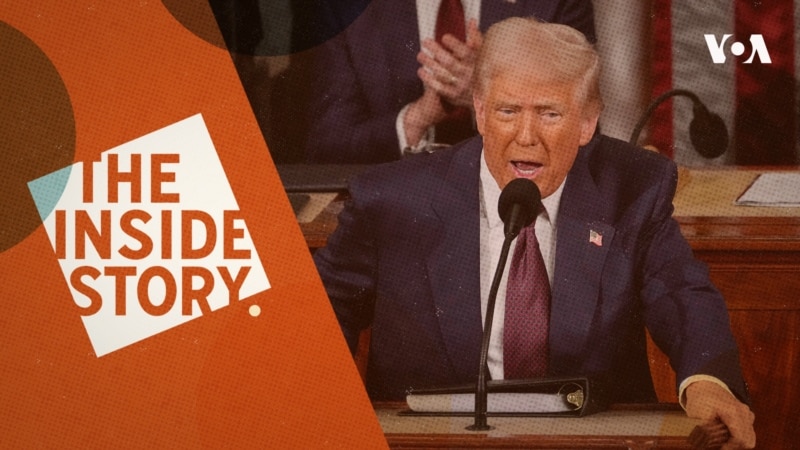
 1d
1dTranscript: The Inside Story Episode 186 – March 6, 2025 Show Open: Unidentified Narrator: This week on The Inside Story… U.S. President Donald Trump addresses Congress and the nation – and lays out his ambitious plans for a second term... We’ll lay out the main points, get reaction to his speech, and learn what it could mean at home and abroad All that... now.... on The Inside Story. The Inside Story: CARLA BABB, VOA Correspondent: Hello and welcome to The Inside Story, I’m Carla Babb. We begin tonight with President Trump’s speech to a joint session of Congress. It was a chance for Donald Trump to clearly spell out his administration’s priorities in a second term. The event itself was pure Washington, full of circumstance, pomp... And politics. Patsy Widakuswara has more on this annual piece of American history. Unidentified on camera announcer: The president of the United States. PATSY WIDAKUSWARA, VOA White House Bureau Chief: President Donald Trump’s Tuesday evening speech marks his first address to a joint session of Congress since he began his second term on January 20. President Donald Trump: America’s momentum is back. Our spirit is back. Our pride is back. Our confidence is back. And the American Dream is surging—bigger and better than ever before. PATSY WIDAKUSWARA: But barely five minutes in, Democratic Representative Al Green of Texas begin shouting that Trump had quote, “no mandate to cut Medicaid,” the government aid program for medical coverage for low-income people. Unidentified: Mr. Green, take your seat! PATSY WIDAKUSWARA: Green was escorted out. Trump highlighted the steep tariffs he enacted Tuesday on China, and U.S. neighbors Mexico and Canada. These top three U.S. trading partners have threatened retaliation, sending financial markets tumbling amid fears of a new trade war. President Donald Trump: There'll be a little disturbance, but we're OK with that. It won't be much. PATSY WIDAKUSWARA: Earlier this week, Trump paused military aid to Ukraine, following last week's combative Oval Office meeting with President Volodymyr Zelenskyy over a deal that would give the U.S. rights to Ukrainian rare earth minerals. It’s part of his efforts to press Kyiv to take a deal to end the fight against Russia's invasion of the country. President Donald Trump: Simultaneously, we've had serious discussions with Russia and have received strong signals that they are ready for peace. PATSY WIDAKUSWARA: In delivering the Democrats’ response, Senator Elissa Slotkin of Michigan highlighted Trump’s fiery exchange with Zelenskyy. Elissa Slotkin, Democratic Senator: That scene in the Oval Office wasn't just a bad episode of reality TV. It summed up Trump's whole approach to the world. He believes in cozying up to dictators like Vladimir Putin and kicking our friends like the Canadians in the teeth. He sees American leadership as merely a series of real estate transactions. PATSY WIDAKUSWARA: Other Democrats signaled their protest while Trump spoke, wearing pink to call attention to Trump’s policies they say negatively impact women and families and holding signs including “Musk steals”, referring to efforts by tech billionaire Elon Musk to slash the federal bureaucracy by canceling government contracts and firing tens of thousands of federal employees. President Donald Trump: Any federal bureaucrat who resists this change will be removed from office immediately, because we are draining the swamp. PATSY WIDAKUSWARA: Again, the Democrats’ response from Slotkin. Elissa Slotkin, Democratic Senator: You want to cut waste, I'll help you do it. But change doesn't need to be chaotic or make us less safe. The mindless firing of people who work to protect our nuclear weapons, keep our planes from crashing and conduct the research that finds the cure for cancer, only to rehire them two days later, no CEO in America could do that without being summarily fired. PATSY WIDAKUSWARA: Trump credited himself for the drop in the number of migrants illegally crossing the U.S. southern border. President Donald Trump: The media and our friends in the Democrat Party kept saying we needed new legislation to secure the border—but it turned out that all we really needed was a new president. PATSY WIDAKUSWARA: Sitting with first lady Melania Trump were guests whose life experiences amplify her husband’s agenda, including an activist against transgender athletes in women’s sports, and the family of a woman killed by an undocumented immigrant. Trump repeated his calls to take back the Panama Canal and take over Greenland but not his demands to expel Palestinians from Gaza. He spoke for an hour and forty minutes, the longest presidential speech to Congress. Patsy Widakuswara, VOA News. CARLA BABB: For reaction on the president’s speech, we go back to Capitol Hill to hear from lawmakers... Rep. Ryan Zinke, R-Montana: I think the biggest takeaway from the night was peace in Ukraine, peace in Russia, peace in the region, is now seemingly achievable, because both sides seem to move towards negotiation. So, you know, the rest of the speech he, you know, obviously covered a lot of ground, a lot to digest, but I think that the key point about it is peace with Ukraine and Russia, which the whole world wants – it’s a little closer. Rep. Monica de la Cruz, R- Texas: It was an exciting moment, not only for us here in the house, but for all of America. President Trump laid out his plan for the next four years. He's going to keep securing the border. He's going to make America prosperous again, secure again, and give us back the American Dream. Sen. Chuck Schumer, D-New York, Senate Minority Leader: The one thing Donald Trump did not mention last night was a real, serious plan to bring down costs, the number one thing Americans wanted to hear most. Instead, Donald Trump doubled down on his plans to send costs skyrocketing by starting a trade war with Canada and Mexico. Hakeem Jeffries, House Democratic Leader: Republicans aren't trying to bring the country together. They are tearing us apart. Republicans aren't trying to move America forward. They want to turn back the clock.” Rep. Doug LaMalfa, R – CA: Man, the gloves are off, but it really is all about being the gloves off for America, because the optimism he brings and the policy lays out, they just make sense. Rep. Adam Gray, D – CA: I think we need to support Ukraine; they are a critical ally. We made commitments to Ukraine that we need to keep, and I believe in honoring America's word." Rep. Mike Collins, R – GA: He gave a great speech in there tonight. It was a man that showed confidence he knew exactly what his mission was going to be, and he knows how to communicate with the American people. CARLA BABB: For analysis of the president’s speech, we're now joined by Bradley Bowman, the Senior Director of the Center of military and political power at the foundation for defense of democracies. Bradley, thank you so much for joining us. Let's dive right into the surprise of the night. We found out that there was a top terrorist, the one, the ISIS terrorist, who was responsible for the atrocity in 2021 during America's withdrawal from Afghanistan, that massive bombing at the Kabul airport, at the excuse me at the Kabul airport that killed 13 American service members, countless other Afghans. President Trump announced that he has been apprehended. Can you tell us more about how this happened? Bradley Bowman, Foundation For Defense Of Democracies: Yeah, absolutely. The individual in question is Mohammed Sharafulla, known as Jafar, and he was evidently in Afghan government custody until, according to the FBI affidavit, until about a few weeks before the horrible attack at A gate was released, and as many of these in these terrorists do, once released, they go back. Big surprise to terrorism and was asked, was approached by ISIS K ISIS Corazon, the Afghanistan affiliate of ISIS, to go ahead and basically serve as a scout for ISIS and conduct surveillance or reconnaissance of the route by which the suicide bomber would later traverse and see if, if they thought that the bomber could get to the gate and then, and then, and then murder the people there. He relayed that information, and then the attack occurred. And then, as you said, we had 13 US service members murdered. And approximately 160 civilians killed, and so he was in Pakistani detention, evidently, and US government reached out to them, and he is now in the United States and is facing charges. And I think for me, the main takeaway here is a positive one. I think it sends the message that if you harm us, service members the US government, regardless of administration, will do what's necessary to find you and bring you to justice. And I think that's a positive message. CARLA BABB: Yeah, even several years later, amazing news, President Trump also announced a new office of ship building in the White House, which he said would help build national security this is a problem that VOA is exploring in some reports that are coming out in recent days and soon to come. You and I have discussed this a lot vis a vis China. China has a big advantage on the US right now. Talk a little bit about this change and why you think it's going up to the White House. Bradley Bowman, Foundation for Defense of Democracies: You know, it's, I think this is a welcome announcement by the Trump administration. You know, an office and some tax incentives, while laudable, won't solve the problem, but they do suggest this administration understands the problem and wants to focus on it, and this is a problem. In fact, problems probably not strong enough wording. I'd say we have a crisis. We have a ship building crisis in this country. We have insufficient ship building capacity, and the ships, and by ships, I mean ships and submarines that we're producing are often late and over budget. We got a real problem. And the People's Liberation Army Navy a weird name, but the name for their navy is is larger than ours. They have three, depending how you do the accounting, they have 370 battle force ships. That's going to grow to 395, this year, and as many as 435 by 2030, 2030, so, you know, the obvious question was, how does that compare the US has 296, 296, versus 370, and what's going to happen in our future numbers, unless we have a dramatic intervention, the size is going to actually shrink. It's projected to shrink to 294, so And by the way, our Navy is trying to cover and protect our interests around the world, while the Chinese navy, while increasingly venturing farther afield, is focusing a lot of their naval power on East Asia. And so that creates a real mismatch. And yes, many of our ships are higher quality. I get it, but as some people say, quantity has a quality of its own, and ships and submarines can only be in one place at a time. CARLA BABB: Bradley, what about the border? The President mentioned the US southern border several times. Officials went to the border this week for another look on what the US military is doing to try to help law enforcement efforts there, to do what Secretary of Defense Hegseth said would be gaining 100% operational control, tell us a little bit about the additions and how they are affecting interventions. Bradley Bowman, Foundation for Defense of Democracies: You know President when he was president Trump was a candidate, he really emphasized the border, and President Trump believes he has a mandate to secure the border. And in his first term, you know, in his National Security Strategy, he emphasized the importance of protecting our homeland. And so now that he's elected, I'd say President Trump has put his money where his mouth is in terms of focusing on the border, and the US military is involved. Roughly, we're talking about 9000 US service members on the border fulfilling a variety of different functions. It's administrative support, aviation support, transportation support, warehousing, logistics, vehicle maintenance, engineering, these sorts of things to help support the civilian agencies that are in the lead there on the border. And as a result, there has been a significant decline in illegal entries into the United States. CARLA BABB: Bradley Bowman with FDD thank you so much for speaking with us. In his address, the President said he had received a letter from Ukrainian President Volodymyr Zelenskyy. President Donald Trump: The letter reads, Ukraine is ready to come to the negotiating table as soon as possible to bring lasting peace closer. Nobody wants peace more than the Ukrainians, he said. We do really value how much America has done to help Ukraine maintain its sovereignty and independence. Regarding the agreement on minerals and security. Ukraine is ready to sign it at any time that is convenient for you. I appreciate that he sent this letter. CARLA BABB: Joining us now is Ostap, Yarysh from the US Ukrainian service. Ostp, we know this mineral deal would bring the United States $500 billion in potential revenue from minerals, oil and gas. What would Ukraine get from this deal? Ostap Yarysh, VOA Ukrainian Service Reporter: Carla, thank you for having me. Well, we don't know for sure if the US would get 500 billion from this deal. We also don't know how long it would take to get any development of minerals and get them from Ukraine to the United States. It may probably take longer than one could expect, when asked last week about how much the US is expecting to get from the deal. President Trump replied that it was difficult to say because that would require some detailed on site research and more work on the ground there in Ukraine. But of course, according to President Trump, it will definitely bring some revenue back to the United States. The draft of the agreement that we've seen says that the deal will create, or would create, some sort of an investment fund to which Ukraine will direct 50% of all the revenue from oil and gas and other developments in Ukraine, and that fund would also create the future investment or monetization for Ukrainian development projects or reconstruction projects, reconstruction projects that would be made on the territory of Ukraine. This deal, however, does not include, or doesn't specify any security guarantees from the United States to Ukraine. The US says that that would be Europe's part, that Europe should invest more in its own defense and should take more responsibility when it comes to security guarantees for Ukraine. Of course, Ukraine says that they need strong reassurances from the US, from the partners, and they hope that they can work those out future down the road, and that this deal will be the first step, and would create some sort of framework for the future cooperation. CARLA BABB: So potentially, there is a lot of money on the line here for both sides. Ostap Yarysh, VOA Ukrainian Service Reporter: That's true, yeah. But you know, coming back to the security guarantees, from the White House standpoint, it's also important they say that they think this deal itself would be the best security guarantee for Ukraine. They say that economic presence of America in Ukraine, co investment with the United States would prevent anyone from attacking Ukraine in the future, and that would be the best guarantee Ukraine can hope for. That was national security advisers Mike Walz’ words CARLA BABB: Going back to that Oval Office meeting last week, tensions grew when President Zelensky raised concerns about diplomacy with Russia, because Moscow did sign a cease fire agreement with Kyiv in 2019 only for Moscow to invade Ukraine again in 2022 so if President Trump can get these two, Zelensky and Putin, if he can actually get them to the negotiating table. What are you hearing that Ukrainians want done? Ostap Yarysh, VOA Ukrainian Service Reporter: Carla, We speak to Ukrainians a lot, and what we are hearing from them that they want peace more than anyone. And of course, that's true, because they have suffered enough for 11 years of this war, it began back in 2014 when Russia, Russia attacked for the first time, of course, then it launches full scale invasion 2022 but since 2014 lots of Ukrainians have died. They have lost their homes. And of course, they want to have peace as soon as possible. But at the same time Carla, they want to have a lasting peace that they want to have, not a temporary agreement that Russia would potentially break in a couple of months, or in two years, or after President Trump leaves the office. Of course, also Ukrainians what they want and what we hear from them. They want this peace to be a just peace. We know that there are a lot of prisoners of war that Russia still keeps in their prisons. Ukrainians want them back. Many of those prisoners of war, by the way, they're not only military, they're civilians. Some of them are journalists. We know that my former colleague back in cave when I used to work there, Victoria Russian last year, we learned that she was killed in the captivity. So there are lots of stories like that. On top of that, Russia still keeps more than 19,000 of Ukrainian children that they kidnapped from Ukraine. Ukraine's, of course, want them back to their families. Lots of they those children still have families or relatives back in Ukraine. So that's what we hear from, from people on the ground in Ukraine. And of course, those people that we speak to, they want to see that after peace, there is some accountability for the war crimes that Russia committed in Ukraine. So They want to see that Russia doesn't get away with what they committed back in Ukraine and it's not rewarded by getting back to business as usual. CARLA BABB: A just and lasting peace. Ostap. Thank you so much for your insight, Ostap Yarysh from VOA’s Ukrainian service. Ostap Yarysh, VOA Ukrainian Service Reporter: Thank you very much. CARLA BABB: On Monday, President Donald Trump ordered a "pause” to military aid shipments to Ukraine with immediate effect, which his administration said was aimed at forcing all sides to peace talks. As Henry Ridgwell reports from London, European leaders have said it is vital to continue weapons shipments to Kyiv — but there are doubts over how long Ukraine can keep on fighting. HENRY RIDGWELL, VOA Correspondent: As news broke overnight Monday of the U.S. decision to halt military aid to Kyiv, Russian drones continued to rain down on Ukrainian cities. Ukrainian lawmakers say the consequences of Washington’s decision will be stark. Oleksiy Goncharenko, Ukrainian Member of Parliament: This means that thousands of people will die. HENRY RIDGWELL: West of Donetsk, Ukraine, near the town of Pokrovsk, the war grinds on. Call Sign: 'Berf', Ukrainian 14th Brigade Unit Commander: We fire an Italian howitzer. But we get a lot of ammunition, including 105-millimeter caliber, from the U.S. It is NATO standard, which is used in both Europe and the U.S. But whether Europe will be able to supply us? I hope it will. HENRY RIDGWELL: Can Europe make up for the shortfall of military aid from the U.S.? Mark Galeotti, Mayak Intelligence: There are certain systems, ranging from Patriot missiles all the way through to spare parts for the Abrams tanks and Bradley personnel carriers, that the Ukrainians are using, that the only way the Europeans can get is by buying them on the open market. And that is going to take time. HENRY RIDGWELL: But Ukraine is increasingly producing its own weapons. Malcolm Chalmers, Royal United Services Institute: Probably about half the weapons which Ukraine is now using are provided by its own defense industry. And of the remainder, it's about half and half between the United States and the others, including the Europeans. HENRY RIDGWELL: The U.S. provides other crucial assistance — including shipping Western weapons into Ukraine. Malcolm Chalmers, Royal United Services Institute: And finally, the U.S. plays a very important role in providing information, intelligence to the Ukrainian forces. HENRY RIDGWELL: The Trump administration says the halt in military aid is, quote, “to ensure that it is contributing to a solution. JD Vance, US Vice President: Neither Europe nor the United States nor the Ukrainians can continue this war indefinitely. So it's important that everybody come to the table. HENRY RIDGWELL: Britain’s Prime Minister said Sunday that a “coalition of the willing” would continue to support Ukraine. Mark Galeotti, Mayak Intelligence: Vice President Vance's claim — that a lot of the European leaders, who on social media and in public are four-square behind Kyiv but in private they're actually much more skeptical — is not entirely incorrect. Do you essentially continue to hollow out your own armed forces and also alienate your most powerful security ally and guarantor in the name of defending Ukraine? HENRY RIDGWELL: Ukrainian President Volodymyr Zelenskyy appealed to the Trump administration Tuesday, writing on X that Ukraine was committed to peace. For Ukrainians suffering under Russian bombardment, the cut in U.S. aid is a bitter outcome. Viktoria, Kyiv Resident: I hope that he [Trump] will change his mind. The victim of aggression cannot be guilty of everything and be punished in addition to that. Illia, Kyiv Resident: Maybe Europe can help somehow. The hope is only on Europe now, no one else. HENRY RIDGWELL Russia, meanwhile, welcomed Washington’s decision to halt military aid to Ukraine, saying it may help, quote, “to settle the situation by peaceful means.” Henry Ridgwell, VOA News. CARLA BABB: Tariffs are a cornerstone of President Trump’s foreign, domestic, and economic policies. To better understand how tariffs impact some small, American businesses, VOA’s Senior Washington Correspondent Carolyn Presutti visited a family whiskey business in the hills of Virginia. CAROLYN PRESUTTI, VOA Senior Washington Correspondent: It’s mashing day at Catoctin Creek Distilling Company. The bubbling rye lends an aroma of baked bread. Becky Harris, Catoctin Creek President/Master Distiller: Rye was the original. It was really where it started. CAROLYN PRESUTTI: Becky and Scott Harris distill rye whiskey. Rye spirits were aged in Virginia more than a hundred years before the country’s first tariffs – foreign tariffs sealed into law by the nation’s first president, George Washington. Now, tariffs under the country’s current president … President Donald Trump: 25% on Canada and 25% on Mexico. CAROLYN PRESUTTI: … are upsetting this company’s attempts to sell its rye whiskey abroad. Becky Harris, Catoctin Creek President/Master Distiller: This makes exports a much harder lift, right? Because anybody buying my products then has to pay that tariff, and that’s something they won’t do. CAROLYN PRESUTTI: Not only is distribution in Mexico and Canada impacted, but also raw materials – like these glass bottles – even though they are made in America. Scott Harris, Catoctin Creek Master Distillery Founder: We found the one American maker of glass … CAROLYN PRESUTTI: Big producers typically buy Mexican and Chinese glass, but after the U.S. presidential election, they switched to the American company. Becky Harris, Catoctin Creek President/Master Distiller: We may actually run out of American glass in the next two months and have to order some imported glass at a higher price in order to keep product flowing. CAROLYN PRESUTTI: The Harris’ planned expansion to Mexico and Canada is crushed, with Canadian shop owners now removing their rye whiskey and other American-made liquor from store shelves. Scott Harris, Catoctin Creek Distillery Founder: We were in the process of getting an order from France, and the French distributor told us that, ‘No, it’s just not a good time now for American products to go over there. CAROLYN PRESUTTI: President Donald Trump says imposing tariffs will motivate world leaders to stop the flow of illegal immigrants and drugs. President Donald Trump: But we need Mexico and Canada to do much more than they’ve done, and they have to stop the fentanyl and drugs pouring into the U.S.A. They’re going to stop it. CAROLYN PRESUTTI: The president’s supporters understand tariffs. Michael Bernacki, Trump Voter: The tariffs, I think, are necessary for leverage, OK? And to make things fair when it comes to us purchasing things from other countries, other countries purchasing things from us. CAROLYN PRESUTTI: The stock market disagreed ... tumbling two straight days on Wall Street. Desmond Lachman, American Enterprise Institute: The hope has to be the stock market's decline will cause the administration to dive back on this trade policy because a trade war is really a lose-lose proposition. CAROLYN PRESUTTI: But until then, Lachman says the cycle of tariffs and retaliatory tariffs will continue – over and over again. Carolyn Presutti, VOA News, Purcellville, Virginia. CARLA BABB: Presidents traditionally invite guests of honor to witness their historic words from the House Chamber. One incredibly touching moment was when President Trump introduced DJ Daniel, There he is. Who he said had always wanted to be a police officer. The 13-year-old cancer survivor received a standing ovation as he was officially sworn into the secret service during the speech. That’s all for this edition of The Inside Story. Thanks for watching I’m Carla Babb. And stay tuned to voanews.com for all the latest news affecting the world, and your world. See you next week for another version of... The Inside Story. ###
Read MoreThe Inside Story: The Trump Transition | 183

 1d
1dJoin us as we report on the Trump Administration's new agenda and policies, covering everything from immigration to foreign aid, trade, and more executive orders. This week on The Inside Story: The Trump Transition.
Read MoreThe Inside Story: The Trump Transition | 183 TRANSCRIPT
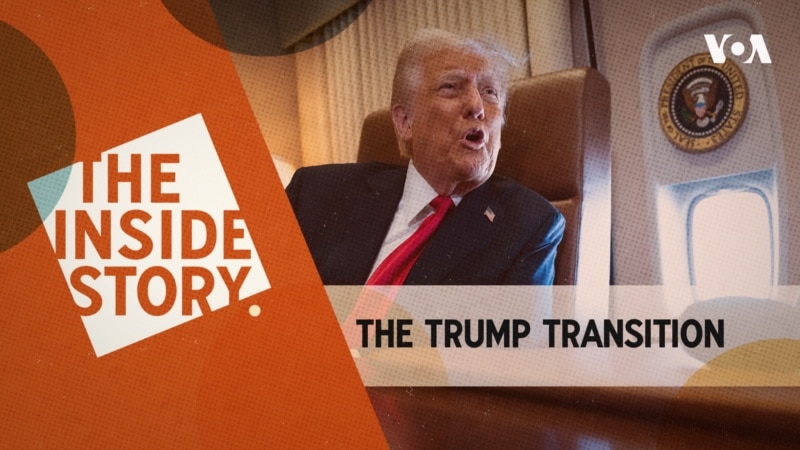
 1d
1dTranscript: The Inside Story: Trump Transition Episode 183 – February 13, 2025 Show Open: Unidentified Narrator: This week, on The Inside Story… the shakeup continues in Washington… from immigration to foreign aid, tariffs, and the world’s richest person… Now on The Inside Story: The Trump Transition. The Inside Story: ELIZABETH LEE, VOA Correspondent: Hello and welcome to The Inside Story, I’m Elizabeth Lee in Washington. We begin today in the Senate where Donald Trump’s picks to fill out his cabinet continue this week. Votes are being held on three of President Trump’s most controversial picks... Kash Patel as head of the FBI, Robert F Kennedy Junior to be the head of the Department of Health and Human Services... And Tulsi Gabbard to be the next Director of National Intelligence... Also, this week, after three years of confinement in Russia, US School teacher Marc Fogel was released as part of a deal between Washington and the Kremlin, the details of which remain undisclosed. Once back home Fogel appeared at the White House alongside President Trump. The Middle School teacher was arrested in 2021, after Russian authorities discovered he was carrying marijuana, which he has always maintained was to treat chronic back pain. Mark Fogel, Released Prisoner: I should also mention President Putin’s generous and statesmen in granting me a pardon. ELIZABETH LEE: Jordan’s King Abdullah was at the White House as President Donald Trump threatened to cut aid to Jordan and Egypt if they refused his demand to permanently take in most Palestinians from Gaza. White House Bureau Chief Patsy Widakuswara reports. PATSY WIDAKUSWARA, VOA White House Bureau Chief: Palestinians in the Gaza Strip fear the return of war after Hamas’ threat to delay the next planned release of Israeli hostages and U.S. President Donald Trump's call to cancel the ceasefire. Samia Jamal, Gaza Resident: We have had enough of wars. We have begun to wish for death. PATSY WIDAKUSWARA: As he hosted Jordan's King Abdullah II at the White House Tuesday, Trump doubled down on his plan to take over Gaza. President Donald Trump: I think it's going to be something that's going to be magnificent for the Palestinians. They're going to be in love with it. I did very well with real estate. I can tell you about real estate. They're going to be in love with it. PATSY WIDAKUSWARA: The Palestinians, along with Jordan, Egypt and various other countries, have rejected Trump’s plan to forcibly relocate an estimated 1.9 million Gaza residents into neighboring countries. But other than saying he would immediately receive 2,000 children in Gaza sick with cancer and other illnesses, King Abdullah declined Trump’s invitation to share his counteroffer. Abdullah II, King of Jordan: I think we have to keep in mind that there is a plan from Egypt and the Arab countries. We're being invited by Mohammed bin Salman to have discussions in Riyadh. I think the point is how do we make this work in a way that is good for everybody. PATSY WIDAKUSWARA: It’s a high stakes meeting for Abdullah, who must maintain ties with a key ally whom Jordan depends on for foreign assistance. Trump hinted Monday he would withhold aid but backtracked on Tuesday. Many Jordanians are descendants of displaced Palestinians. If Abdullah supports Trump’s plan, it will create major political and economic problems and allow Hamas to enter, says Ghaith al-Omari of the Washington Institute for Near East Policy. Ghaith al-Omari, Washington Institute for Near East Policy: Hamas could create not only domestic problems in terms of terror, but also there's a fear that Jordan might then become a staging ground for attacks on Israel. All of these things will create very, very severe threats to Jordan's stability and maybe even survival. PATSY WIDAKUSWARA Al-Omari said Trump’s takeover plan removes the incentive for Hamas to continue the ceasefire. On Monday, the U.S.-designated terror group threatened to delay the next planned release of hostages, alleging Israeli truce violations. Israel will hand over Gaza to the U.S. after the war, Trump has said. President Donald Trump: We're not going to buy anything. We're going to have it, and we're going to keep it, and we're going to make sure that there's going to be peace and there's not going to be any problem, and nobody's going to question it. PATSY WIDAKUSWARA: These Gazans would disagree. Patsy Widakuswara, VOA News, Washington. ELIZABETH LEE: Democratic lawmakers are criticizing what they call the Trump administration’s “extreme” efforts to reshape the U.S. government, vowing to oppose those changes despite being in the minority in both chambers of the U.S. Congress. VOA Congressional Correspondent Katherine Gypson reports from Washington. KATHERINE GYPSON, VOA Congressional Correspondent: A second week of protests from Democratic lawmakers concerned about President Donald Trump’s attempts to reshape the U.S, government… Despite limited political capital in both chambers of the U.S. Congress, Democrats vowing to fight what they call the Trump administration’s “extreme” efforts to close down government agencies and immediately lay off federal workers. Chuck Schumer, Senate Minority Leader: If you want to make cuts, then you do it through a debate in Congress, not lawlessly, by just implementing them. We want to make sure waste isn't done, but they're cutting out the meat that's going to hurt millions of American families. KATHERINE GYPSON: Republicans have defended the work of the Department of Government Efficiency — or DOGE — led by billionaire Elon Musk, saying attempts to stop fraud and waste are long overdue. Rep. Tom Emmer, Republican: The Democrat Party's tantrums are exactly why they hold no majority in Congress, and their candidate is not in the White House. DOGE is rightly pulling back the curtains that have been closed for years, and the outrage we are seeing across the aisle is baffling but not surprising, given their record of mismanagement of taxpayer dollars. KATHERINE GYPSON: Democrats are vowing to fight for protections for government agencies or withhold their votes in upcoming government funding talks. Rep. Pete Aguilar, Democrat: There's very little appetite to help Republicans when we don't trust that [President] Donald Trump is going to spend the resources that we've allocated for education, for health care, for our defense, with Elon Musk and his unelected friends running through and combing through the federal system. KATHERINE GYPSON: Democrats have had some success temporarily stopping Trump’s executive orders in the U.S. court system, but one analyst told VOA other changes will take time. Casey Burgat, The George Washington University: We haven't seen the grassroots mobilization yet, but that's the one most indirect to levers of power within Washington, D.C. It takes time for those messages to resonate with the American people, for them to coordinate with each other to gain enough volume to reach members of Congress, or enough members of Congress. KATHERINE GYPSON: But Speaker of the House Mike Johnson said Tuesday the Democratic Party has very little power. Mike Johnson, Speaker of the House: There's no identified leader of the party. They don't have a clear vision. They seem rudderless. In hopes of finding themselves, they've latched on to this new, shiny object called the rule of law. Well, we'd like to welcome them to the concept. It would be admirable if they hadn't spent the last four years with their heads buried in the sand while Biden literally trampled over the rule of law with no objection. KATHERINE GYPSON: The short-term agreement funding the U.S. government is set to expire March 14th. Katherine Gypson, VOA News, Washington ELIZABETH LEE: The 14th Amendment to the United States Constitution, passed after the Civil War, has been consistently interpreted by the courts to mean that most children born on U.S. soil are U.S. citizens, regardless of their parents’ immigration status. This has contributed to the phenomenon known as “birth tourism,” where some people travel to the U.S. specifically to give birth, securing citizenship for their children. A unique example of this is occurring in the Northern Mariana Islands, where some pregnant Chinese women have been traveling to give birth, ensuring their children are American citizens. This story comes from our VOA Mandarin service, and it’s narrated by me. Tourists may come to Saipan, the capital of the Northern Mariana Islands, for its Pacific Island beauty, but not this mother. She’s here so her daughter can acquire a piece of paper that says she’s a U.S. citizen. The mother has overstayed the 14 days she’s allowed to be in this U.S. territory. She only uses her surname, Ye, to protect her identity. Ye, Chinese Citizen: Whether it’s the education system or the everyday environment within China, there’s too much pressure. Even I want to escape. I don’t want to be there. ELIZABETH LEE: Ye arrived in Saipan in September, entering under a 14-day visa waiver program for Chinese citizens implemented in 2019 Arnold Palacios is the governor of the Commonwealth of the Northern Mariana Islands: Arnold Palacios, Governor of the Northern Mariana Islands: It peaked in 2017 and 18. ELIZABETH LEE: With more than 500 babies born to Chinese mothers in each of those years, Palacios says those births surpassed the number born to Saipan women. The number of Chinese births on the island dropped during the pandemic. Palacios says that in 2024, 55 babies were born to Chinese mothers. Taking care of mothers who fly in just to give birth has been a challenge for the hospital staff and a risk for the women themselves, he says. Arnold Palacios, Governor of the Northern Mariana Islands: When these women come in, they don’t have any prenatal records, so they have no idea whether it’s a high-risk birth or what. ELIZABETH LEE: Since 2009, government records show, about 3,300 babies have been born here to Chinese mothers. Ye says she found Saipan on social media while researching places to give birth. Ye, Chinese Citizen: I didn’t have time to apply for a visa because it involves a wait time. // The pregnancy was a surprise. I picked this place because it was the place I could get to quickly to achieve what I wanted. ELIZABETH LEE: Ye is applying for her 1-month-old daughter’s U.S. passport. She’s also paying more to have it ready within three weeks. Ye, Chinese Citizen: I’m afraid the policy will be impacted now that [Donald] Trump is president, so I paid extra to get the passport quicker. ELIZABETH LEE: Conservatives in the U.S. have argued that birthright citizenship encourages illegal immigration and is being exploited. On his first day in office, President Donald Trump signed an executive order to end it. President Donald Trump: We’re the only country in the world that does this with birthright, as you know, and it’s just absolutely ridiculous. ELIZABETH LEE: While this order is being challenged in court, Ye hopes there will be a good outcome for her daughter and maybe even herself. Ye, Chinese Citizen: I feel once I get here, it’s a more humane place here. For sure there will be a way to solve the challenges I’m facing. ELIZABETH LEE: Since the end of last year, travelers from China have to apply online for a waiver and be vetted through an electronic pre-screening process before they are allowed to enter. The Trump administration also signaled plans to upend longstanding trade policies with both allies and adversaries, alike. The president says he plans to impose a 25-percent tariff on all steel and aluminum imports, potentially hurting America’s two biggest trading partners: Canada and Mexico. Such tariffs would raise the price of those goods on the importing country: the United States. From the White House, VOA’s Anita Powell has this story. ANITA POWELL, VOA White House Correspondent: Another shot in President Donald Trump’s trade war. On Monday, he announced 25 percent tariffs on steel and aluminum. President Donald Trump: It’s a big deal. This is a big deal. This is the beginning of making America rich again. Howard Lutnick, Secretary of Commerce Nominee: You are the president who is standing up for the American steelworker. And I am just tremendously impressed and delighted to stand next to you. ANITA POWELL: Trump's trade adviser says this move will help domestic producers and support the nation's economic and national security. The biggest foreign steel suppliers — Canada, Brazil, Mexico and South Korea — are likely to be hit hardest. Earlier Monday, Beijing's additional 10 to 15 percent tariffs on U.S. goods took effect as a countermeasure to Trump’s 10 percent hike on Chinese goods earlier this month Guo Jiakun, Chinese Foreign Ministry Spokesperson: There are no winners in trade wars and tariff wars. What is needed now is not unilateral tariff increases, but equal dialogue and consultation based on mutual respect. We urge the U.S. to correct its wrong practices and stop politicizing and instrumentalizing economic and trade issues. ANITA POWELL: But Trump says not only rivals, but also allies, were taking advantage of the U.S. President Donald Trump: We were being pummeled by both friend and foe alike. Our nation requires steel and aluminum to be made in America and not in foreign lands. We need to create in order to protect our country's future, a resurgence of US manufacturing and production, the likes of which has not been seen for many decades. ANITA POWELL: Many economists believe tariffs raise consumer prices. Scholars of supply chains and logistics say Trump’s move also raises major global policy questions. Sunderesh Heragu, Oklahoma State University: It's not clear whether this is a negotiating strategy, whether this is going to be permanent. Is this only restricted to Canada, Mexico and China as it is now, or is it going to expand to the European Union, for example, or even the BRICS countries, of which, you know, Brazil, Russia, India, China, South Africa and 12 or 14 other countries, are part of? ANITA POWELL: These concerns may prompt countries to realign their trade relationships, he said, which will likely alarm producers. Sunderesh Heragu, Oklahoma State University: Businesses, again, hate uncertainty. So, they're going to put everything on pause. That means there could be a decrease in production activity while, at the same time, the tariffs could have inflationary effects. ANITA POWELL: Some in the U.S. automotive industry — headquartered in Detroit, Michigan — echoed that concern. Glenn Stevens Jr., MichAuto: Sudden tariffs to a system, there isn't a lot of good that comes out of that. ANITA POWELL: U.S. trade partners have warned that the tariffs could hurt automakers, shipbuilders and other U.S. industries. Anita Powell, VOA News, the White House. ELIZABETH LEE: The U.S. – Mexico tariff showdown seems on hold… for now. But consumers and merchants of Mexican products say they’re concerned about the financial impact if Trump moves forward with his proposed 25-percent tariff on Mexican imports. Victor Hugo Castillo has this story from McAllen, Texas. VICTOR HUGO CASTILLO, VOA Correspondent: Oscar García is one of the 65 million retired Americans living on Social Security benefit income. As he walks through the supermarket aisles, he worries how a potential price hike on Mexican products will impact his wallet and purchasing decisions if the Trump administration’s tariff threats become a reality. Oscar García, Consumer: What are people with low salaries going to do? If we used to eat meat twice a week, now we’ll have to cut back to once a week or maybe we won’t be able to afford it at all. VICTOR HUGO CASTILLO: For the past two years, Mexico has been the United States' top trading partner, followed by Canada, according to the U.S. Census Bureau. The vibrant trading relationship is evident in the thousands of trucks crossing international bridges every day. Mario Garcia works for Majef Produce in McAllen, which specializes in imports from Mexico. He says he is concerned how tariffs could disrupt his business. Mario García, Majef Produce: Most stores and supermarkets rely on Mexican products. So, what’s going to happen if prices go up from Mexico all the way to the consumer? It’s all a chain reaction. VICTOR HUGO CASTILLO: President Trump has linked the use of tariffs to efforts to stop the flow of drugs and migrants crossing illegally into the U.S. On February 1st, he announced 25% tariffs on Mexico and Canada but paused them temporarily two days later after leaders of both countries agreed to strengthen border security. VICTOR HUGO CASTILLO: While manufacturers and importers would feel the direct impact, American consumers like Hilda Gonzalez believe they’ll see the effects in higher prices at the checkout counter. Hilda Gonzalez, Consumer: They’re going to raise prices on products, and who’s going to pay the difference? We are. VICTOR HUGO CASTILLO: If tariffs go into effect, retirees like García are afraid they will have to cut back even more on their spending. For others… Unidentified Shopper (in Spanish): Pos, tenemos que trabajar más. VICTOR HUGO CASTILLO It means they’ll have to work harder to buy what they need. Victor Hugo Castillo, VOA News, McAllen, Texas. ELIZABETH LEE: Joining me now via is VOA’s Michelle Quinn. She has a story this week on the world’s richest person who’s had a starring role in the new Trump administration. Hi Michelle. MICHELLE QUINN, VOA Correspondent: Hi Elizabeth. President Trump tapped Elon Musk as his point person to make rapid changes at government agencies. The tech billionaire and chief executive of Tesla and SpaceX wasted no time. But Congressional Democrats say Musk’s attempt to reduce federal government spending is just wrong. A protest outside a federal agency in Washington this week focused on the work of Elon Musk, President Donald Trump’s designee for shrinking the U.S. government. Sen. Chris Murphy, Democrat: The people get to decide how we defend the United States of America. The people get to decide how their taxpayer money is spent. Elon Musk does not get to decide. MICHELLE QUINN: Musk is the world’s richest man and the chief executive of electric vehicle firm Tesla and aerospace company SpaceX. He also owns other companies, including the social media platform X, formerly known as Twitter. Since Trump’s inauguration, Musk, as the leader of the newly created Department of Government Efficiency, or DOGE, has gotten down to work cutting what he and President Trump see as costly federal programs. Elon Musk, Department of Government Efficiency: We will win. We will win. MICHELLE QUINN: Musk’s team has reportedly gained access to the Treasury Department’s payment systems, raising alarms, and has sought control of the U.S. Agency for International Development, or USAID, which provides humanitarian and other aid to more than 100 countries. That’s where the protest happened this week. Rep. Don Beyer, Democrat: President Trump directed his corrupt billionaire friend, Elon Musk, to ransack a critical agency of the U.S. government. MICHELLE QUINN: Trump, however, reiterated his support for Musk. President Donald Trump: It’s something that he feels very strongly about, and I’m impressed because he’s running obviously a big company. MICHELLE QUINN: Elon Musk said what he discovered at USAID isn’t salvageable. Voice of Elon Musk, Department of Government Efficiency: As we dug into USAID, it became apparent that what we have here is not an apple with a worm in it, but we have actually just a ball of worms. MICHELLE QUINN: Congressional Democrats dispute that and say it is wrong that Musk has so much power and little accountability and oversight, especially given that SpaceX has contracts with the federal government. But Trump says that the White House is providing the necessary oversight to Musk’s work. President Donald Trump: Where we think there’s a conflict or there's a problem, then we won’t let him go near it.// We are trying to shrink government, and he can probably shrink it as well as anybody else if not better. MICHELLE QUINN: In his unpaid role as a “special government employee,” Musk is permitted to work no more than 130 days a year. ELIZABETH LEE: Thanks, Michelle, what else can you tell us about Musk's role in the federal government? Have we ever seen anything like this before? MICHELLE QUINN: Elon Musk is a unique person in Silicon Valley, even I don't think the federal government has experienced anything like this. And also in Silicon Valley. He is very well known for his working style. His trademark is intensity, which has come in really focus on a problem or an issue and then go all out. He typically sleeps at the companies that he's trying to turn around, and he demands other people be there as well and perform at a high level. He has brought executives from many of his companies, Tesla SpaceX and his his AI company, also a company called boring company to work within the federal government, and they are without throughout the federal government. He's also brought young engineers, people who've either graduated from high school or college, maybe have had some work experience as point people inside of federal agencies. ELIZABETH LEE: Thank you, Michelle. While debate continues in the United States about the future of U-S-AID and whether the State Department might absorb it, Britain could offer lessons on what such a move might mean. Henry Ridgwell reports from London. HENRY RIDGWELL, VOA Correspondent: The battle over the future of the U.S. Agency for International Development, or USAID, echoes a similar debate in Britain. In 2020, then Prime Minister Boris Johnson merged the Department for International Development, or ‘DFID,’ with the Foreign Office. Boris Johnson, British Prime Minister: This will unite our aid with our diplomacy and bring them together in our international effort… The Foreign secretary will be empowered to decide which country receives or ceases to receive British aid while delivering a single U.K. strategy for each country. HENRY RIDGWELL: Johnson’s decision chimed with his Conservative Party’s skepticism over aid spending, says analyst Tim Durrant of the Institute for Government. Tim Durrant, Institute for Government: Not always aligned with what he thought the U.K.'s foreign policy priorities should be. I think there was definitely a sense among those on the right of U.K. politics that DFID was a bit too big for its boots perhaps or needed better oversight. HENRY RIDGWELL: But the move shocked the aid sector, says analyst Mark Miller of ODI Global. Mark Miller, ODI Global: Because you now had a set of senior managers in place who were largely focused on supporting the U.K.'s national interest — however you might interpret that — rather than previously, a very clear mandate where aid was meant to be prioritized towards poverty reduction. HENRY RIDGWELL: In 2020, Britain’s aid spending was also cut from 0.7% of Gross National Income, the highest in the G7 group of developed nations to 0.5%. Spending was redirected. Almost a third of Britain’s aid budget — some 5.2 billion dollars –– was spent on supporting refugees inside the country in 2023. Aid spending also reflected Britain’s geopolitical priorities, says Miller. Mark Miller, ODI Global: There was more attention being paid to trying to out-compete, let's say China or Russia, particularly in Asia-Pacific. Trying to upscale investment in these regions, whereas historically aid had been much more focused on Africa. HENRY RIDGWELL: The creation of Britain’s Foreign, Commonwealth and Development Office, or FCDO, offers lessons for Washington as it mulls the future of USAID, says Durrant. Tim Durrant, Institute for Government: In the U.K. instance, there was a sort of reputational hit. DFID had a very strong brand, as does USAID. There's also the kind of knock-on impact it has on morale and productivity. I think this is particularly going to be the case in the U.S. But there is now a sense that the FCDO is the one voice and that there are people who have both development and diplomacy experience who are representing the U.K. in countries where the U.K. is spending development money. HENRY RIDGWELL: Durrant added that strong oversight of spending is vital to retaining public support for foreign aid. Henry Ridgwell, VOA News, London. ELIZABETH LEE: That’s all for now. I’m Ellizabeth Lee in Washington. Check out all the latest by logging in to VOA News.com. And join us next week for another edition of The Inside Story. Thanks for watching.
Read MoreThe Inside Story: The Trump Transition | 182
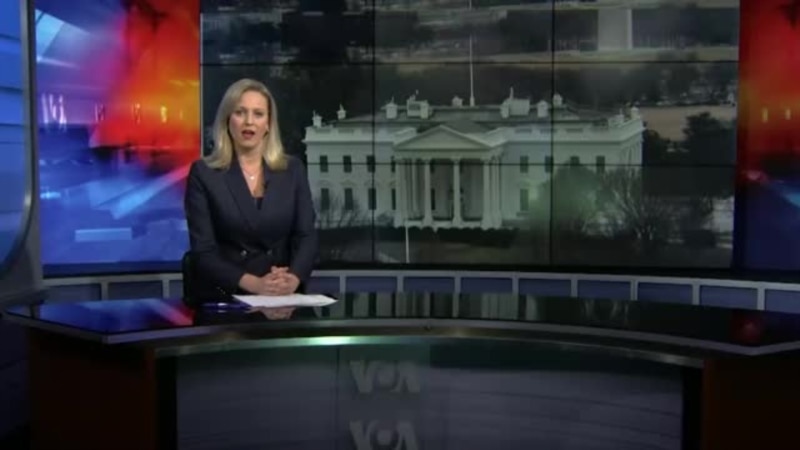
 1d
1dThis week on The Inside Story, a look into the Trump Transition as big changes shake up Washington. A major overhaul at USAID, trade and tariffs testing relationships, and the Trump administration’s foreign policy. Plus, we’ll report on the threat of a bird flu outbreak that has farmers worried. Don’t miss this episode of The Inside Story, The Trump Transition.
Read MoreThe Inside Story: The Trump Transition | 182 TRANSCRIPT
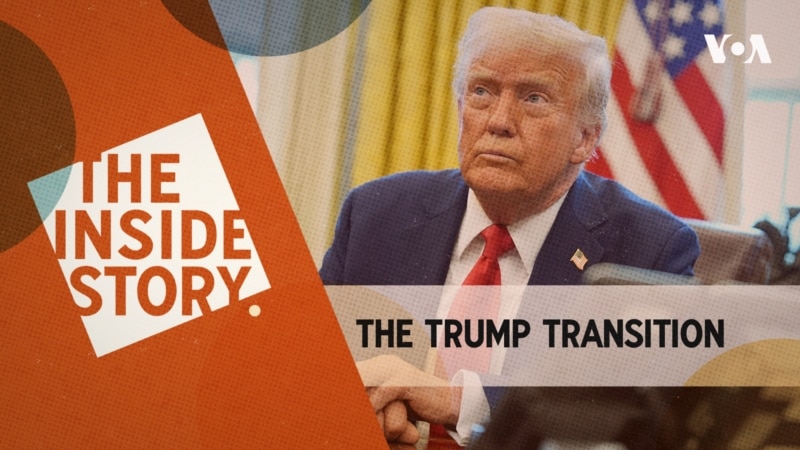
 1d
1dTranscript: The Inside Story: Trump Transition Episode 182 – February 6, 2025 Show Open: Unidentified Narrator: This week on the Inside Story...President Trump unveils his new plan for Palestinians and Gaza....how new tariffs could impact the U.S. and China...plus...Secretary Marco Rubio on his first foreign tour....NOW....on the Inside Story...The Trump Transition. The Inside Story: CARLA BABB, VOA Pentagon Correspondent: Hello and welcome to The Inside Story, I’m Pentagon Correspondent Carla Babb. Israeli Prime Minister Benjamin Netanyahu visited Washington this week, the first foreign head of state to meet with President Trump at the White House in his second term. During a joint press conference, President Trump announced the idea that the US would take over control of the Gaza strip and relocate the over 2 million people that call it home. VOA’s Patsy Widakuswara has more. PATSY WIDAKUSWARA, VOA White House Bureau Chief: As hundreds of thousands of Gazans return to their demolished homes following the January 19 ceasefire deal between Israel and Hamas, on Tuesday U.S. President Donald Trump made a stunning announcement. President Donald Trump: The U.S. will take over the Gaza Strip, and we will do a job with it, too. PATSY WIDAKUSWARA: Trump went beyond the suggestion he made last month to relocate Gazans to other countries, including Jordan and Egypt. He wants to develop the area into what he calls “the Riviera of the Middle East.” President Donald Trump: Everybody I've spoken to loves the idea of the United States owning that piece of land, developing and creating thousands of jobs with something that will be magnificent, in a really magnificent area that nobody would know. Nobody could look because all they see is death and destruction and rubble. PATSY WIDAKUSWARA: Trump made the announcement as he hosted Israeli Prime Minister Benjamin Netanyahu at the White House. Benjamin Netanyahu, Israeli Prime Minister: I've said this before, I'll say it again. You are the greatest friend Israel has ever had in the White House. PATSY WIDAKUSWARA: Trump did not share details on how he plans to exert control over Gaza, an area ravaged by 15 months of war. He did not rule out sending U.S. troops. And it’s unclear how occupying Gaza would fit into Trump’s own stated goal of expanding the Abraham Accords to include Riyadh. He brokered the deal that normalized ties between Israel and Arab countries in 2020. Saudi Arabia has said it would only agree to recognize Israel if the Gaza war ends and Palestinians have a path to statehood. Mirette Mabrouk, Middle East Institute: Shuffling them out of Palestine into neighboring countries is not a particularly auspicious start, so I think it's going to have quite a pronounced effect. Having said that, we don't know, as with so many things about President Trump, we just have to wait and see. PATSY WIDAKUSWARA: Trump’s announcement on Gaza is his latest signaling of expansionist ambitions, following his statements to acquire Greenland from Denmark, take over the Panama Canal and absorb Canada. Ahead of his meeting with Netanyahu, Trump also directed the restoration of his "maximum pressure" campaign on Iran to prevent it from getting a nuclear weapon. He also ended support for the U.N. agency that helps Palestinian refugees and withdrew the U.S. from the U.N. Human Rights Council, which he says is antisemitic. Patsy Widakuswara, VOA News, Washington. CARLA BABB: International reaction to President Trumps idea to take over the Gaza strip and remove the Palestinians has prompted swift and almost universal anger and condemnation around the world. Antonio Guterres, UN Secretary-General: It is vital to stay true to the bedrock of international law. It is essential to avoid any form of ethnic cleansing. Keir Starmer, British Prime Minister: “They must be allowed home. They must be allowed to rebuild, and we should be with them in that rebuild on the way to a two-state solution. Linda Gradstein has more. LINDA GRADSTEIN, VOA Correspondent: President Donald Trump dropped his bombshell about the future of Gaza at a joint news conference with Israeli Prime Minister Benjamin Netanyahu at the White House Tuesday. Trump said the two million Palestinians will be resettled elsewhere. For some, it is a dream come true. Bezalel Smotrich, Israeli Finance Minister: The plan presented yesterday by [U.S.] President [Donald] Trump is the true response to October 7th. Those who carried out the worst massacre on our land will find themselves losing their land forever. LINDA GRADSTEIN: Israeli analysts said Trump’s idea resonates with hardliners in Israel. Amotz Asa-El, Shalom Hartman Institute: It’s only natural for them to be this idea’s cheerleaders because they think in messianic terms, in terms of colossal solutions and transitions and transformations, all of which is not the way the Middle East is structured. LINDA GRADSTEIN: He says Israelis and Palestinians need to be patient. Amotz Asa-El, Shalom Hartman Institute: You want change; you have to work very patiently over many years with many participants or all you’ll have is yet more violence and destruction and despair. LINDA GRADSTEIN: Hamas spokesperson Sami Abu Zuhri called Trump's remarks "ridiculous and absurd," adding that any ideas of this kind are, quote, "a recipe for creating chaos and tension in the region." In Gaza, Palestinians say that despite the large-scale destruction, they have no intention of leaving. Ahmed Halasa, Gaza City Resident: I am Gazan, my father and grandfather were from here. We are true Gazans. So, they can do whatever they want to do, and we shall remain steadfast in our homeland. We will not leave here. We've got one option only: live or die here. LINDA GRADSTEIN Riyad Mansour, the Palestinian envoy to the United Nations, offered his own solution. Riyad Mansour, Palestinian UN Envoy: Our country and our home is the Gaza Strip. It's part of Palestine. We have no home. For those who want to send them to a happy, nice place, let them go back to their original homes inside Israel. There are nice places there, and they will be happy to return to these places. LINDA GRADSTEIN: It is not clear how President Trump’s idea will influence talks on a permanent ceasefire in Gaza set to begin this week in Qatar. Linda Gradstein, VOA News, Jerusalem. CARLA BABB: Congressional Democratic leadership warned President Donald Trump this week they would use upcoming government funding talks as leverage to fight the administration's changes stemming from the Department of Government Efficiency led by billionaire entrepreneur Elon Musk. I’m joined by our Congressional Correspondent Katherine Gypson for details. So, Katherine, we just heard a moment ago Democrat Chris Van Hollen accusing Elon Musk of threatening national security? KATHERINE GYPSON, VOA Congressional Correspondent: From protecting Amazon rainforests … to caring for Myanmar refugees … and housing Ukrainians fleeing the war against Russia … the absence of U.S. assistance is being felt around the world. In Washington this week, Democratic lawmakers protested outside the now-closed headquarters of the lead U.S. aid agency and outside the U.S. Capitol. Sen. Cory Booker, Democrat: We will fight their violations of separation of powers. We will fight their violations of our Constitution of the United States of America. We will not shut up. We will stand up. We will speak up. We will rise up. KATHERINE GYPSON: Earlier this week, the U.S. Agency for International Development, or USAID, was moved under the control of Secretary of State Marco Rubio and almost all its employees put on leave, following an executive order from President Donald Trump freezing U.S. foreign assistance pending review. Rep. Jonathan Jackson, Democrat: We're seeing the most powerful man in the world, Donald J. Trump, and we're seeing the richest man in the world, Elon Musk, now take money and food from the poorest woman and the poorest man on Earth. KATHERINE GYPSON: Congressional Republicans say Trump is exercising broad presidential authority to reevaluate government agencies. Trump is accomplishing this through Elon Musk, a multibillionaire whom he put in charge of the Department of Government Efficiency, or DOGE, whose aim is to reduce federal spending. Sen. John Thune, Majority Leader: I don't think they're closing an agency, but I do think they have the right to review funding and how those decisions are made and what priorities are being funded. I think that's probably true of any administration. When they come in, there are lots of programs authorized and funded through that agency, some which I think are operating the way in which they were intended. Some which aren't. KATHERINE GYPSON: One analyst told VOA the situation is unprecedented in the United States. Claire Finkelstein, University of Pennsylvania: Arguably, it's a real violation of separation of powers for the executive branch to try to shut down agencies completely that Congress has brought into existence and that Congress endows and appropriates funds for, even if the executive branch has quite a lot of discretion with regard to how to operationalize those funds and how the agency is going to function. KATHERINE GYPSON: Senate Minority Leader Chuck Schumer said Tuesday he’s supportive of efforts to eliminate fraud and abuse but criticized the speed and secrecy of the process. Sen. Chuck Schumer, Minority Leader: Whatever DOGE is doing, it's not democracy. We know what democracy is like. It's out in the open. It's not secret. KATHERINE GYPSON: Democrats have pledged to stall votes on Trump’s Cabinet nominees and leverage their votes on a new government spending bill, to protest the changes at USAID. I think we're going to see a lot more discussion of this issue on Capitol Hill. Remember, government funding expires in about six weeks. CARLA BABB: Well, Katherine, excellent reporting. There is so much to unpack here. What do Democrats say that they want to do to try to protect federal employees at this point? KATHERINE GYPSON: Well, we heard from leader Jeffries and Senate Minority Leader Schumer earlier this week saying that they're going to be introducing legislation called stop the steal which is a throwback to some of the things we heard from the Trump camp. They said that that legislation, if passed, would protect the information that's been exposed in that breach, and that's millions of federal employees, Medicare and Medicaid recipients. That's millions of Americans who have had their Social Security and other personal information open and unsecured. So they say that legislation will help kind of seal that gap there. CARLA BABB: And so what are people on Capitol saying about passing a government budget which should have been passed, you know, back in September, and is still ongoing, and still we're operating in a continuing resolution as we speak? KATHERINE GYPSON: That's right, you summed up the situation that we go through constantly on Capitol Hill, which is that we have these continuing resolutions. Are basically like little, little three or four month chunks of funding that keep the government open, but then we have to go through the negotiating process all over again. Now, if you talk to Democrats up on Capitol Hill right now. They see that as an opportunity. They do not have the numbers to block Trump's nominees. They don't have the numbers to block legislation, but they can block that government funding. They can leverage it and say, We won't pass government funding until you reinstate some of this USAID programming, until you provide protections for these federal employees, until you do some of the things we want to, you know, take back from what Doge is doing right now. CARLA BABB: Well, Katherine, before you leave us any interesting developments in the Cabinet picks for President Trump? KATHERINE GYPSON: I mean, it's really striking how quickly the Senate Republicans are moving through this process. I heard somewhere that it was about twice as quick as the first Trump administration. They're really moving through the nominees, getting those business meetings on the calendar so that they can get full senate floor votes, and then immediately getting those nominees sworn in, because the Trump administration knows you need those cabinet appointees at the agencies to carry out the agenda. CARLA BABB: Katherine Gypsum thank you so much. KATHERINE GYPSON: It's good to be here. CARLA BABB: President Trump’s weekend announcement of tariffs on Canada, China and Mexico shook global markets on Monday with the U.S. on path for a trade war with its top three trading partners. But just a few days later, Mr. Trump walked back tariffs on Canada and Mexico for at least the next month. Meanwhile, Beijing struck back with its own tariffs on Washington. VOA’s Anita Powell reports from the White House. ANITA POWELL, VOA White House Correspondent: President Donald Trump’s weekend tariff announcement is being felt in Ottawa, in Mexico City, in Beijing — and here, in New York … Hong Kong … Seoul … and Taipei. Around the world, markets fell Monday after Trump dropped 25 percent tariffs on Mexico and Canada, and 10 percent on China. In Washington, Trump spoke of his agreement Monday with Mexico to pause the tariffs for a month in exchange for concessions from Mexico City meant to stop migration flows and the movement of illegal drugs across the southern border. Markets quickly made up some losses after his announcement. He also announced a similar pause with Canada later on Monday. President Donald Trump: We have to stop people from pouring in, and we have to stop fentanyl, and that includes China. Fentanyl has killed this year at least 200,000 people. It's pouring in from China through Mexico and Canada. And they've got to stop it. And if they don't stop it, the tariffs are going to get worse. A lot worse. ANITA POWELL: Mexican President Claudia Sheinbaum sounded a hopeful note on Monday. Claudia Sheinbaum, President of Mexico: I'm sure that in this month, we'll be able to have results, good results for your people, good results for the people of Mexico, and this was the result of the agreement. It was a good conversation, with respect. ANITA POWELL: Economic scholars say consumers will start to feel the pinch soon and pointed to historical parallels. Steve Kamin, American Enterprise Institute: This brings us back to the 1930s, you know, when, as you may recall, a trade war was one of the factors that deepened the Great Depression, as economies all over the world erected barriers in order to keep imports out. ANITA POWELL: China’s ambassador to the United Nations, Fu Cong, on Monday said Beijing would turn to the World Trade organization for recourse. Fu Cong, China's Ambassador to the United Nations: We do believe that this is in violation of the WTO rules. So, that's why China is filing a complaint at the WTO. And we're also aware we may be forced to take countermeasures. And let me also emphasize that there is no winner in a trade war. ANITA POWELL Trump acknowledged that the move could raise prices but said the higher tariffs would be “worth the price” to bolster U.S. interests. The tariffs take effect on Tuesday. Anita Powell, VOA News, the White House. CARLA BABB: Addressing illegal migration remains a key priority for Secretary of State Marco Rubio and the Trump administration. Rubio continued his first official trip to the Western Hemisphere as the nation’s top diplomat, as a U.S.-funded flight from Panama returned dozens of undocumented Colombians back to their homeland. The military flew the first group of detained migrants to a U.S. naval base in Guantanamo Bay, Cuba, this week. The group included fewer than 20 migrants, which the administration has labeled as “high threat.” The detention facility on base is known mostly for housing military prisoners and terror suspects, including those involved in the 9/11 attacks and members of the Taliban. That detention facility is where these fist migrants are being held. President Trump recently issued a memorandum to prepare the U.S. naval base at Guantanamo Bay to house tens of thousands of illegal migrants. Some 300 Marines deployed on those orders to expand a separate area of the base that has housed migrants in the past. The detentions are overseen by Immigrations and Customs Enforcement. Cuba’s president called it an “act of brutality.” The Guantanamo expansion process is expected to last for weeks. And Mr. Trump says it will house “the worst criminal illegal immigrants.” CARLA BABB: The decision by US President Donald Trump to close USAID and put a 90-day freeze on most foreign aid is also affecting the war in Ukraine. And now, Ukrainian humanitarian aid organizations are scrambling. VOA Eastern Europe Bureau Chief Myroslava Gongadze has the story, with reporting from Anna Chernikova. MYROSLAVA GONGADZE, VOA Eastern Europe Bureau Chief: The Veteran Hub provides psychological and social support to Ukrainian war veterans and their families. The group says the Trump administration’s order to freeze foreign aid forced it to close its office in the town of Vinnytsia. Their main office in Kyiv is still operating, thanks to private donors Ivona Kostyna chairs the Veteran Hub. She says the halt was unexpected and hit the project hard. Ivona Kostyna, Veteran Hub Chairperson: The stop of funding sounds like the stop of operation to us. It means to stop payroll and prevent people from returning to work. MYROSLAVA GONGADZE: Soon after President Trump took office, his administration ordered a 90-day freeze to reevaluate all foreign aid. The White House did not respond to a VOA request for comment on Ukraine aid. A State Department statement on implementing the freeze says, quote, “the United States is no longer going to blindly dole out money with no return for the American people. The abrupt cutoff sent shockwaves through humanitarian organizations in Ukraine. After three years of war, the government, civil society and media rely heavily on foreign assistance. Bohdan Logvynenko founded the independent Ukrainian multimedia project Ukraїner. He told VOA most of their funding was from U.S. aid programs. Bohdan Logvynenko, Ukraїner Founder: We are cutting personnel. We had to reduce the scale of our work because we used to have several programs supporting us at the same time. MYROSLAVA GONGADZE: Logvynenko says the impact of the freeze goes far beyond independent media. Bohdan Logvynenko, Ukraїner Founder: The impact is huge. Media aid is a drop in the ocean. Economic support has a huge impact, and the fact that it is being stopped now strengthens Russia's position. MYROSLAVA GONGADZE: The U.S. aid agency says since Russia’s invasion, it has sent Ukraine more than 7.6 billion dollars in humanitarian and development assistance There’s no doubt the public sector will take a hit without U.S. aid, says Denys Bihus head of the investigative media project Bihus.info. However, what worries Bihus more is the fate of state programs that relied the most on the funding. Denys Bihus, Bihus.info: “Our main grant recipient in a broad sense is the state of Ukraine, represented either by local communities or directly by the state apparatus." MYROSLAVA GONGADZE: U.S. policy analyst Doug Klain explains that much of the foreign aid from the United States was meantto keep Ukraine’s government and society running strong. But it has also supported programs that held the government accountable. Klain believes that lifting the freeze on these programs would strengthen the Trump administration’s policies and make for a more resilient Ukraine. Doug Klain, Razom for Ukraine: Trump wants to force Vladimir Putin to end his invasion of Ukraine, and he wants to achieve what he and his team call ‘peace through strength.’ And a strong Ukraine with leverage is key to that. MYROSLAVA GONGADZE: In the meantime, President Volodymyr Zelenskyy instructed his government to prioritize the most critical programs that relied on U.S. funding and to cover their needs through the national budget or alternative foreign aid sources. Myroslava Gongadze, Anna Chernikova, VOA News, Warsaw, Kyiv. CARLA BABB: Here in the U.S. farmers say they’re worried about potential impacts to their livelihoods due to the H5N1 avian influenza virus. More commonly known as “bird flu,” a recent outbreak with a potential to mutate raised concerns within the scientific community. They say it could result in human-to-human transmission and possibly, a new pandemic. VOA’s Veronica Balderas Iglesias reports. VERONICA BALDERAS IGLESIAS, VOA Correspondent: George Terwilliger runs Pleasant Vale Farm in Delaplane, Virginia, west of Washington. He has modified his small-scale operation due to the H5N1 avian influenza virus. The so-called “bird flu” has resulted in not only a high U.S. bird mortality since 2022 but also a sharp increase in the price of eggs nationwide. George Terwilliger, Pleasant Vale Farm Owner: We here on this farm have not expanded our chickens over the last year or two out of fear that we might inadvertently bring birds in that are infected. VERONICA BALDERAS IGLESIAS: Terwilliger, a member of the Virginia Department of Wildlife Resources Board, is also concerned about the risk bird flu could pose to his hogs. And to about 100 cows and calves that he owns. George Terwilliger, Pleasant Vale Farm Owner: If the disease were to get to the point where it infects cattle and makes them sick or makes their meat — these are beef cattle — makes their meat unacceptable, that would put us out of business. VERONICA BALDERAS IGLESIAS: Bird flu in dairy cows was first reported in late March. The Centers for Disease Control and Prevention says the public health risk remains low, with just 67 confirmed infections from animals to humans and one death. Constant changes in the genome of the virus, however, have some scientists worried. Meghan Davis, Johns Hopkins University: If there are changes that make it more possible for the virus to transmit from person to person, which so far we haven't seen, then that could be a real challenge in terms of our public health response. And it’s the reason that we think of this virus as having pandemic potential. VERONICA BALDERAS IGLESIAS: People can minimize the risk of infection, Davis added. Meghan Davis, Johns Hopkins University: Avoiding contact with sick or dead wild animals is probably the most important thing to do. We know that pasteurization of milk, cooking of meat to the recommended temperatures and cooking of eggs are effective to really inactivate this particular virus. VERONICA BALDERAS IGLESIAS: Pet owners are advised to monitor recalls of contaminated pet food and raw milk, and to keep their pets away from contact with wild birds. As he keeps a watchful eye on the latest developments, Terwilliger is planning ahead. George Terwilliger, Pleasant Vale Farm Owner: Typically, sometime a month or so from now, we would buy turkey poults to raise turkeys for commercial sale at Thanksgiving. I'm not sure we'll do that this year, because I would be concerned about where I get the birds from. Will they come with avian flu?” VERONICA BALDERAS IGLESIAS: In the meantime, he says he'll follow the science and hopes that the disease runs its course... all while keeping a very close eye on his livestock. Veronica Balderas Iglesias, Delaplane, Virginia. CARLA BABB: That’s all for this week’s edition of The Inside Story. I’m Carla Babb. Thanks for watching. Catch up with all the day’s news by visiting VOANews.com and we’ll see you next week for more Inside Story. ####
Read MoreThe Inside Story: Transition and Policy | 181
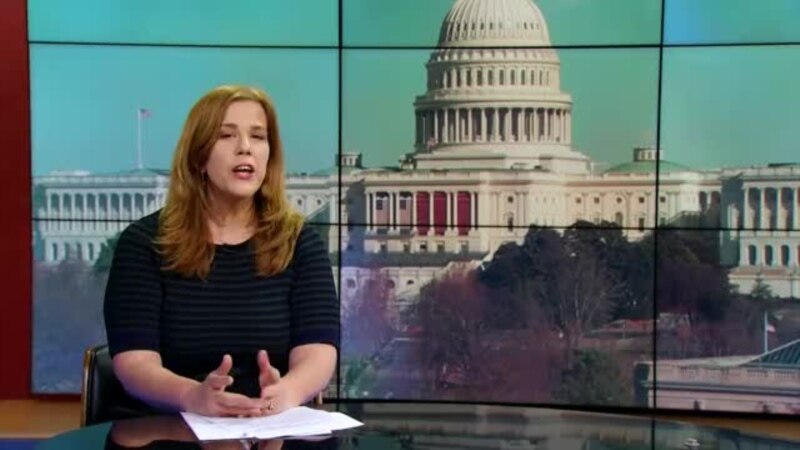
 1d
1dAs the new Trump administration's domestic and foreign agenda comes into focus, significant shifts are occurring in Washington. From immigration to foreign aid, numerous policies are being adjusted to align with the administration's plan for the U.S. government.
Read MoreThe Inside Story: The New Trump Administration | 180

 1d
1dHistory unfolds as Donald Trump is inaugurated as the 47th President of the United States. Join us for coverage of the Washington ceremonies and a closer look at the presidential decrees he signed on his first day in office—what do they mean for America and the world? This week on the Inside Story, The New Trump Administration
Read MoreThe Inside Story: The New Trump Administration | 180 TRANSCRIPT
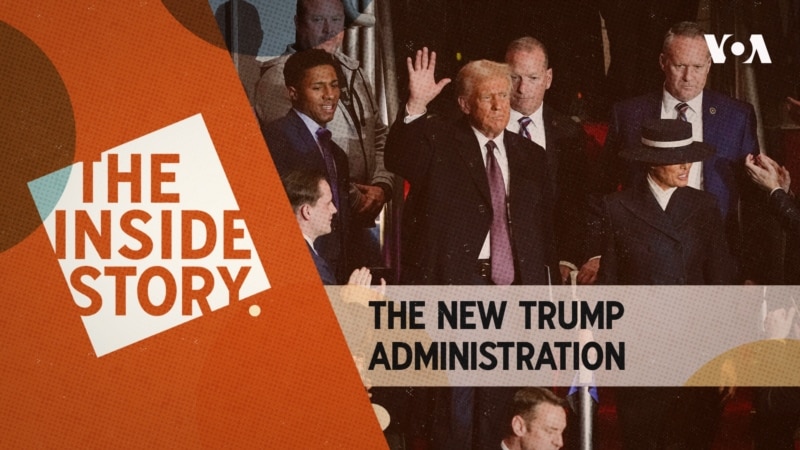
 1d
1dTranscript: The Inside Story: The New Trump Administration Episode 180 – January 23, 2025 Show Open: Unidentrified narrator: This week on The Inside Story America’s 47th president Donald Trump takes the oath of office in Washington See the executive actions Mr. Trump signed in his first few days back in the White House Now on The Inside Story: The New Rrump Administration. The Inside Story: CARLA BABB, VOA Correspondent: Hello and welcome to this week’s edition of The Inside Story. I’m Carla Babb. For the second time ... Donald Trump is President of the United States. A 21-gun salute announced the new President to supporters who withstood the cold to gather on the national mall. Hundreds attended the ceremony to welcome the new President inside the Capitol Rotunda, where the inauguration was moved due to the extreme weather. Before the inauguration President Joe Biden met Trump as he returned to the White House with the words, welcome home. The two traveled together from the White House to the inauguration ceremony at the Capitol. And after taking the oath of office, President Trump laid out his vision for the next four years. President Donald Trump: The golden age of America begins right now. (Applause.) From this day forward, our country will flourish and be respected again all over the world. We will be the envy of every nation, and we will not allow ourselves to be taken advantage of any longer. During every single day of the Trump administration, I will, very simply, put America first. My proudest legacy will be that of a peacemaker and unifier. That’s what I want to be: a peacemaker and a unifier. Many people thought it was impossible for me to stage such a historic political comeback. But as you see today, here I am. The American people have spoken. In recent years, our nation has suffered greatly. But we are going to bring it back and make it great again, greater than ever before. CARLA BABB: After his inauguration President Trump wasted no time going to work. Just hours after the ceremony, the President signed a series of executive actions designed to advance his America First agenda. VOA’s Anita Powell has more. ANITA POWELL, VOA Correspondent: On this historic first day of his second term in office, President Donald Trump laid out his vision for a bolder – and larger – United States. President Donald Trump: The United States will once again consider itself a growing nation, one that increases our wealth, expands our territory, builds our cities, raises our expectations, and carries our flag into new and beautiful horizons. And we will pursue our manifest destiny into the stars, launching American astronauts to plant the Stars and Stripes on the planet Mars. ANITA POWELL: Then he got to work signing a stack of executive orders. He said they include a declaration of a national emergency at the southern border that would allow the deployment of troops and a national energy emergency that will allow more domestic extraction. He also declared that there are only two genders, and said he would order that the Gulf of Mexico be renamed the Gulf of America. Historians say that Trump made history by using what is historically a unifying speech to portray a future that many Americans may disagree with. Jeremi Suri, University of Texas at Austin: It was less an inaugural speech and more a State of the Union. He just listed a series of bullet points of projects he wanted to undertake, from deporting immigrants to seizing back the Panama Canal. ANITA POWELL: Thousands of Trump supporters came to Washington from across the country because they say his policies speak to them. Melanie Voll, Cleveland Resident: Common sense, the bringing back of common sense out loud. So many people in my position feel we are the silent majority, and I think this is going to give us the opportunity to speak out loud, and to be unafraid to speak the truth and to speak common sense. ANITA POWELL: Shortly after his inaugural, Trump spoke to a smaller group of supporters at the Capitol and reiterated claims that the 2020 election was “totally rigged” – a claim without proof. He also alluded to his plans to pardon some of those convicted over the violent events of January 6, 2021, when a mob of Trump supporters attempted to disrupt the certification of the election won by Joe Biden. President Donald Trump: I think this was a better speech than the one I made upstairs, OK? I think this is better, JD. I think this is much better. ANITA POWELL: Some of Trump’s powerful supporters expressed their joy. Elon Musk, Tesla/SpaceX CEO: This, this is what victory feels like. Yeah! ANITA POWELL: CEO Elon Musk was among the billionaires in the Capitol Rotunda for the ceremony. Consumer advocacy groups are sounding alarms about some of the new president’s quieter moves, that seek to loosen regulations and, they say, benefit these elite few. Lisa Gilbert, Public Citizen: When we think about why the incoming Trump administration wants to freeze regulations and halt public protections wholesale, it is at the behest of the wealthiest among us, corporate special interests. They are who benefits when we don't have guardrails on the books. ANITA POWELL: Historians and analysts say it’s not clear how many of Trump’s day one actions — which his officials say number more than 100 — will fly when challenged legally. For that answer, they say, look to tomorrow. Anita Powell, VOA News, the White House. CARLA BABB: I am joined now by VOA China editor Elizabeth Lee and VOA congressional correspondent Katherine Gipson, to discuss what's happened so far in the first busy days of the second Trump presidency. Welcome ladies, so let's put up President Trump's cabinet picks on the screen. let's put up President Trump's cabinet. Secretary of State, Marco Rubio, was the first Cabinet member to be confirmed, on Inauguration Day. Katherine what led to such a quick confirmation? KATHERINE GYPSON, VOA Congressional Correspondent: Yeah, right. I mean, there were a couple of different factors that went into that. Part of it is that Rubio is well respected on both sides of the aisle. He was a member of the Senate Foreign Relations Committee for a decade, well known there, well respected for his ability to work on issues in Latin America. There wasn't a lot of opposition to his nomination. Second Secretary of State is a very important cabinet position, and we know that President Trump is going to hit a lot of foreign policy challenges right out of the gate in a second term, Ukraine, the Gaza cease fire, tariffs, all of those issues. It really helps to have the Secretary of State in place so that he can be in there and really start filling some of those lower positions that are so important in implementing administration policy. So just one of those things that you have to get going right off the bat, not to mention the facing threat for the military, which is China. CARLA BABB: Rubio is considered very hawkish on China. Elizabeth, how is he hoping to shape the policy to counter China? ELIZABETH LEE, VOA Correspondent: To understand what he's going to do, we need to understand how he defines China. And during his confirmation hearings, he defined China as, I quote, the most potent and dangerous adversary the US has ever faced. And he said the US and China have been competing in different realms, and that includes technology, science, geopolitics, just to name a few. And so he says, really, the US needs to look at its domestic policy by rebuilding domestic industry and not rely on any one given country when it comes to our critical minerals. And so these are all important factors. And he says, if these things don't happen, then in less than 10 years, how Americans live and what's important to us could all be controlled by China. And he used some examples, including whether it's the movies that we watched or the medicines that we need could be controlled by China, and how what they decide. CARLA BABB: And before we leave those Cabinet picks, I cover the Pentagon, so I would be remiss if I did not know that Trump's pick for Secretary of Defense, Pete Hegseth, did not sail through with strong bipartisan support, the bipartisan support that you normally see for a Secretary of Defense pick. Katherine, you and I watched that hearing together strong opposing opinions on both sides, tell me more. KATHERINE GYPSON That's right. So obviously, Hegseth is one of the more controversial picks from Trump this time around and that really concerns some Senate Democrats who are worried that he not just apart from that, doesn't have the experience to run a massive department like the Department of Defense, as you well know, that's billions of dollars, 1000s of personnel, a very complicated job for somebody who, Quite frankly, didn't have a lot of experience in terms of running things going into this. So there was a lot of back and forth. CARLA BABB: Absolutely yes. So let's talk about Trump's pardons for the January 6 protesters. It came as no surprise that he pardoned the protesters, but what was so surprising was that he pardoned all of the protesters, including some of those convicted for assaulting police officers and JD Vance, his vice president, had just said, hours before the inauguration, that, obviously, I think that was the word he used. He said, obviously, if you were violent against police officers, you would not be pardoned. So explain this. You know what's happening on Capitol Hill? How are people responding? KATHERINE GYPSON Right? Well, obviously this is something that hits hard up on Capitol Hill for many lawmakers who were there on January 6, 2021 you heard immediate reaction from Democratic leadership, Hakeem, Jeffries, former speaker, Nancy Pelosi, who were in danger on that day, strongly condemning the actions of Trump. And you actually heard from some Senate Republicans as well who are concerned about the precedent that this set. So not a great way to start out with Capitol Hill. CARLA BABB: Well, here are some of Trump's other executive orders. He removed the US from the World Health Organization. He suspends US foreign assistance programs for 90 days pending a review of whether they align with the America first agenda. Now take a look at this. This is the tallest mountain in North America. President Barack Obama, 10 years ago, changed the name from Mount McKinley after US President William McKinley to Denali, which was what Native Alaskans had called it for hundreds of years, but now it's Denali no longer. Trump has renamed it Mount McKinley again. And I must say, I have seen that mountain in person, and it is majestic and incredible. Whatever it is named will not change that. One more name change of note, I should say, President Trump signed an executive order renaming the Gulf of Mexico to the Gulf of America, and speaking of Mexico, Trump has said he wants to hit Mexico hard with tariffs. Also Canada. Explain this? KATHERINE GYPSON Well, I think one of the striking things was that if you listen to Trump's inaugural speech in the US Capitol Rotunda, lot of big applause lines from the Republican lawmakers who are in there listening to him, the tariffs line did not get as big of an applause line, because Republican lawmakers are concerned about the economic impact that these tariffs could have on the US. So he wants to put levy 10% tariffs on Canada and Mexico, China, and that's concerning a lot of Republicans. They're going to actually see, you're going to see some pushback on Capitol Hill, on that, and that differs from a lot of the other issues, where you really have a united Republican leadership. It's going to be interesting to see how they push back against Trump when they know he delivered them into office. He gave them that unified Republican control of Congress. So it might be a little little testy up on Capitol Hill in the coming months. CARLA BABB: You mentioned those tariffs on China that was repeated during the race, the presidential race, up until the election, as much as 60% tariffs at one point. What is he saying about these tariffs now? ELIZABETH LEE: Yes, on the campaign trail, he mentioned he could slap as much as 60% tariff on China, but he did not so far. And the latest is he is, as Catherine said, threatening 10% tariff on China. And the reasoning behind this is, he's saying because China is sending, sending fentanyl to Canada and Mexico, and that's also the reason why he's threatening tariffs on Mexico and Canada, as well as this fentanyl issue. And so it's interesting to see some analysts are saying that this could be just a bargaining chip for some of the other issues that Trump is going to take up, such as Tiktok, and I'm sure we'll talk about that later, and also on the first day in office, on January 20, Trump issued a memo to several agencies, and he wants these agencies to review our trade policies, So once he has more information, according to him, he can make better decisions on what to do with tariffs as it relates to other countries CARLA BABB: So let's talk about Tiktok. A Tiktok ban was supposed to go into effect days ago unless Tiktok, Chinese owner Bytedance, sold it to a US company. So that ban has now been delayed 75 days to give more time for US company to buy it. I'm needing a little more on this, because the app was deemed a security risk by President Trump himself in 2020 I don't even have Tiktok on my phone because officials at the Pentagon have been saying for years that this is a security risk. You do not want the Chinese to have your public information. So what's changed? Why is he now trying to save this media platform. ELIZABETH LEE: So the concern in 2020, it's still the concern now, is a national security risk, and the reason is because the parent company of Tiktok, bytedance, is a Chinese company. It's based in China, and so the concern is that Tiktok is able to capture large amounts of user information. And Bytedance, because it's a Chinese company, can assist the Government the Chinese Communist Party, if asked, and whether it's in intelligence work or information collecting, and that's the reason why this ban was put in place. Now, Trump was asked by a reporter why he's kind of changed his tactics on Tiktok. And he said, Well, he's had a chance to use Tiktok, and that's why he changed his mind. He got to use it, and he also attributed a large part of the youth vote during the whole process, you know, to get him elected on Tiktok. He and so he has a different view on Tiktok, but he did say he's working on a way to save Tiktok and to protect national security at the same time. CARLA BABB: Well, the military has been concerned, saying that Chinese policy, no matter whether or not it's a company or a military aspect, they're all together collectively, part of the military's advance. They've been saying for years that whatever Chinese companies do, the Chinese military can access that, and that has been the concern with young people's data. What are they saying on Capitol Hill about this? KATHERINE GYPSON: Right? I mean, what's striking is, is that you saw a shift from Democratic and Republican lawmakers as well, in addition to President Trump, in the last few hours, when we were thinking that Tiktok would be shut down here in the United States, they were calling for an extension to re evaluate things, to see if Tiktok could be moved to an partial American ownership, or some kind of other ownership. I think there's, it's a really interesting shift among lawmakers, since I covered that classified briefing that they all went into a year or so ago, and they all came back, came out of that classified briefing, really shook up and said, “you know, oh, yeah, now that I've seen the information about what this app is capable of it should absolutely be banned in the United States”, and now there's this gradual understanding that we need to figure out another way. So really interesting to see those changes. CARLA BABB: Very interesting. Thank you so much to both of you for your excellent reporting. CARLA BABB: President Trump campaigned on a promise to urge the United States Congress to pass legislation banning so-called “sanctuary cities.” These jurisdictions limit cooperation with federal immigration authorities. And some local officials vowed to fight the new administration. VOA immigration correspondent Aline Barros has more. ALINE BARROS, VOA Immigration Correspondemt: President-elect Donald Trump made campaign promises to get tough on immigration. He pledged to cut federal funding from so-called “sanctuary cities” — local governments that limit their cooperation with federal immigration authorities. Donald Trump, Republican Presidential Nominee: As soon as I take office, we will immediately surge federal law enforcement to every city that is failing, which is a lot of them, to turn over criminal aliens. And we will hunt down, capture every single gang member, drug dealer, rapist, murderer and migrant criminal that is being illegally harbored. ALINE BARROS Sanctuary cities include New York, San Francisco, Los Angeles ... and Takoma Park, Maryland, on the border with Washington. Talisha Searcy is Mayor. Talisha Searcy, Mayor of Takoma Park, Maryland: Our police department still enforces crime. That's important to note. So, if there are issues of crime in our community, regardless of someone's immigration status, we enforce. ALINE BARROS: Searcy says Takoma Park has been a sanctuary city since 1985. Talisha Searcy, Mayor of Takoma Park, Maryland: Our staff are not allowed to enforce immigration laws in the city of Takoma Park. Our staff are prohibited from inquiring about citizenship or immigration status to participate in city programming or receive city benefits. ALINE BARROS: The mayor says it helps keep communities safe because immigrants are not afraid to report crimes to authorities. Trump issued an executive order during his first administration to end the sanctuary movement. But the order was ruled unconstitutional because the federal government does not control state and local law enforcement. States including Florida have passed laws requiring cooperation with federal immigration authorities. Gov. Ron DeSantis, Florida Republican: We're not a sanctuary state. We banned sanctuary cities, but you've got to have effective accountability to hold those folks accountable if they choose to go in a different direction. ALINE BARROS: DeSantis says he aims to help Trump with his proposed crackdown. Mayor Searcy says Takoma Park is prepared for potential conflicts with the incoming administration. Talisha Searcy, Mayor of Takoma Park, Maryland: We plan to hold our ideals and hold our policies and hold our code as the law of the land for the city of Takoma Park. ALINE BARROS: As President-elect Trump promises tough immigration policies, immigration advocates in sanctuary cities vow to fight the new administration. Aline Barros, VOA News, Washington. CARLA BABB: Joining me now is VOA Immigration Correspondent Aline Barros. Let's talk about those sanctions. Alini, what purpose do they serve? Can they realistically mount a fight against the federal government? ALINE BARROS: Well, one thing that is important to know is that sanctuary is not really part of any law, right? It's just the locality, the city or the town that gets together and say, Hey, we're just not going to help ice picking up people in our city, in our town, in our state. So it's not like ice officials, immigration officials cannot come in and arrest people if they have to. It's just that that locality, that city, is not going to get their police officers and say, Here's ice police officers will help you. So with Trump, what he wants is he wants to penalize he wants to go after these locations and says, Okay, well, if your guys are not going to help us, then there's not going to be federal funding. I spoke with the Takoma Park City mayor, and she said that they will stand and they will fight for what they believe and how their community will come together and keep those sanctuary city laws that they have, but we do expect some fighting at the court level. CARLA BABB: So Alini At least eight of President Trump's executive order so far are related to the border. He mentioned the border over and over on the camping trail. What stands out to you in these executive orders? ALINE BARROS: So we've got this theme ongoing about border security. Border Security, he wants to build border walls, which is we should talk about the fact that we do have fences and barriers along the border, the US Mexico border. It's just that he wants to keep on building. So he's pushing for building, you know, more physical barriers, whether it's a big wall or another fence. He wants more of those. He also wants the military at the border. He wants the National Guard at the border. He wants those agencies, those apartments, to work together with Homeland Security. We don't know exactly what the military will do. We don't know if it's going to be the same thing that they've done in the past. If they're going to help with infrastructure, they're not expected, or we don't know yet, allowed to, you know, arrest. CARLA BABB: And he does also want to send us troops to the border? ALINE BARROS: He has said that the Secretary of Defense, I'm reading the order here, shall order as many units or members of the armed forces, including the Ready Reserve and the National Guard, as the Secretary of Defense determines to be appropriate to support the activities of the Secretary of Homeland Security in controlling the southern border. CARLA BABB: What do you expect? When is this going to roll out? Tell us a little bit more detail on this. ALINE BARROS: So right now we have the executive orders, and we have time for implementation. So we also have to wait for the DHS Secretary to be officially nominated, nominated, but approved by Congress. So he wrote the orders, he announced the orders. But we need to wait for but they're not going to happen for the department exactly for the permanent CARLA BABB: I want to talk about birth right citizenship. That's very important to our audience. Tell us about the changes happening with that. ALINE BARROS: So the implementation is supposed to happen in 30 days. Right now, there's about four cases already filed. So there are four different organizations and groups of people who have already sued the Trump administration. One is actually filed today by Casa de Maryland and a few women who are pregnant and about to give birth in March, which is when this order is supposed to take place. So as of now, if you're not in the country legally, your child does not have a second citizenship as of March. So if you give birth in March, as of March, your child, if you're not lawfully here, if you don't have a permanent status, you may have a visa, you may have a visitor's visa, you may have TPS, you may have a student visa. You have a child in March. That child is not a US citizen. However, we really have to see what's going to happen in the next few weeks, because this order might not even be able to be implemented in March. CARLA BABB: Wow, big changes. Alina Burris, thank you so much for keeping us informed about these ongoing changes. Thank you. CARLA BABB: In a span of roughly six hours, movers emptied the White House of the personal belongings of outgoing-President Joe Biden and his family. At the same time, the private residence was remade into a home for the newly sworn-in President Trump. VOA’s Dora Mekour reports. DORA MEKOUAR, VOA Correspondent: The moment Joe Biden leaves the Oval Office for the last time, the White House staff jumps into action. Rearranging the iconic office to the incoming president's tastes. Angella Reid, Former White House Chief Usher: How they like the Oval Office to be outfitted. What rug? What, you know, what drapes, what desk, etcetera because that's the kind of the Oval Office is the first area to be sort of prepared. DORA MEKOUAR: Photos show that Biden changed the rug and some chairs after taking over from Donald Trump – who preceded him and will also succeed him. But it looks like the couches and curtains remained the same. The president's family lives on the second and third floors of the White House. Before moving day, the incoming president and first lady choose what furniture and art they want from the White House collection. By the time the new president arrives home on Inauguration Day, the furniture is in place and personal family photos are on the walls. Kate Andersen Brower, Author of 'The Residence': When the new president and first lady move in, they have their favorite shampoo in the shower. They have their toothbrush, toothpaste on the counter, they have their clothes hung up in the closet. DORA MEKOUAR: It all happens in under six hours with about one hundred White House staffers pitching in. Kate Andersen Brower, Author of 'The Residence': You don't have professional movers doing this. You have the residence staff doing it, so you have everybody pitching in and these are not people that are trained as movers. They don't hire professionals because of security concerns. DORA MEKOUAR: Many of the White House residence staff worked for Donald Trump during his first term from January 2017 until January 2021. Kate Andersen Brower, Author of 'The Residence': So the staff really did like Donald Trump because he's used to having people around him serving him. And, you know, he would go around tipping staff in cash, you know, handing out 20s and 50s and they appreciate that. They are not political. They just care about how the president treats them. DORA MEKOUAR: President Barack Obama hired Angella Reid to be the White House's Chief Usher in 2011. She oversaw moving day in January 2017 when the Obamas moved out and the Trumps moved in. Angella Reid, Former White House Chief Usher: We have used the term 'organized chaos,' but it really is a very coordinated operation. It's been rehearsed, you know, so many times that on that day, everyone is just chomping at the bits for go time. DORA MEKOUAR But the main challenge is always the time constraint. And having just about six hours to get everything ready to welcome the new presidential family home to the White House for the first time. Dora Mekouar, VOA News, Washington. CARLA BABB: That’s all for this edition of The Inside Story I’m Carla Babb in Washington. Stay with VOAnews.com for the latest on the events impacting your world and join us next week for more Inside Story. Thanks for watching. ###
Read MoreThe Inside Story: Transition in America | 179
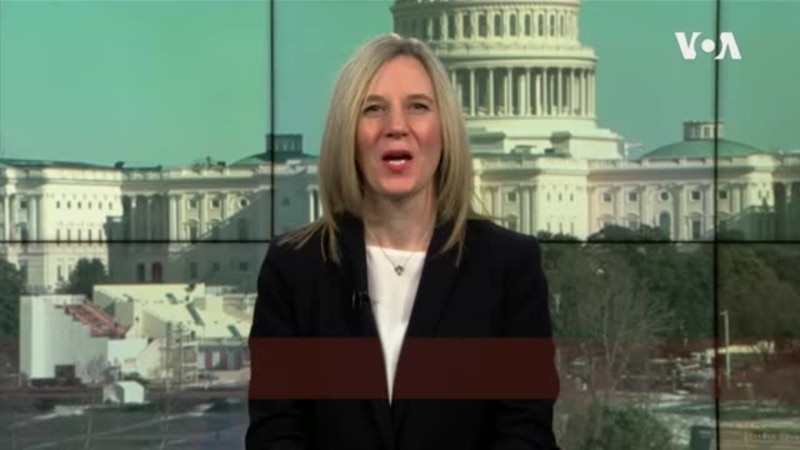
 1d
1dWe bring you details on the devastating wildfires sweeping through Southern California. We'll also cover President Joe Biden's farewell address, highlighting the accomplishments of his administration. Plus, join us for the heated moments on Capitol Hill during the confirmation hearings for Trump administration cabinet nominees. This week on The Inside Story: Transition in America.
Read MoreThe Inside Story: Transition in America | 179 TRANSCRIPT
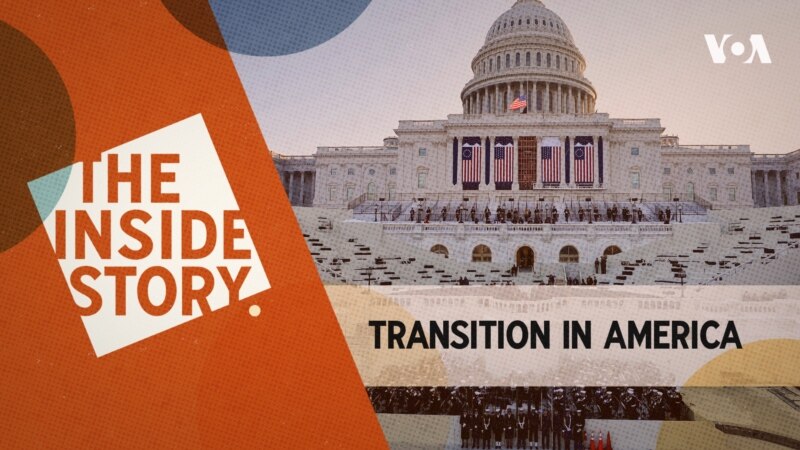
 1d
1dTranscript: The Inside Story: Transition in America Episode 179 – January 16, 2025 Show Open: Unidentified Narrator: This week on The Inside Story: Wildfires rage across Southern California. And President Biden gives his farewell address... days before the Trump administration returns to Washington. Now on The Inside Story: Transition in America. The Inside Story: JESSICA JERREAT, Press Freedom Editor: Welcome to the Inside Story, I’m VOA Press Freedom Editor Jessica Jerreat, here in Washington. On today’s show we look at preparations for a second Donald Trump presidency. But first. A series of fires have been burning in and around Los Angeles County since January 7. More than a dozen people have been killed as the fires, stoked by Santa Ana winds blowing in from the sea, spread. 12-thousand homes, and other structures, have been destroyed... and over 100 thousand are under evacuation orders. For over a week, exhausted firefighters from California and further afield have been fighting the infernos. Officials say more than 7,000 structures have gone up in flames in the Eaton Fire, burning near Pasadena. One of the homes destroyed belonged to firefighter Isaac Baeza. GENIA DULOT, VOA Correspondent: Isaac Baeza and his family survey the ruins of their home, which burned to the ground during the Eaton Fire in the city of Altadena. Baeza, a Cal Fire firefighter with more than 20 years of experience, says this fire has been unprecedented. Isaac Baeza, Altadena Resident: I’ve never seen a force of nature like this, the winds and the dryness. GENIA DULOT: Baeza’s wife, Rosary, recalls how they received an evacuation notice Tuesday evening but didn’t think much of it: the fire was far away and small. Still, they packed just a few items, not expecting they would return to nothing. In the morning, Baeza and his friend came back to try to save the house, but there was no water. Isaac Baeza, Altadena Resident: We were just like, ‘Oh my God! We can actually save this,’ and we went for the hose and there was no water, and so before you knew it, just more things started catching on fire, and I drove away, and I remember looking in my rearview mirror and I could see the backside of the house going up in flames and just thinking - man! Maybe! Maybe if I had water, I would’ve been able to put these little spot fires out and prevented my house from burning up. GENIA DULOT: Fire crews have encountered dry hydrants or low water pressure in efforts to extinguish the Eaton Fire along with another large wildfire known as the Palisades Fire. California Governor Gavin Newsom announced an investigation into the issue. Currently fires in Los Angeles, including the Palisades Fire, cover about 150 square kilometers, with more than 150,000 people under evacuation orders. GENIA DULOT: Baeza’s family is staying with friends, waiting for the payout from insurance companies, and have set up a GoFundMe site to raise money for expenses. The Baezas say they are planning to rebuild. Rosary Villegas, Isaac Baeza’s Wife: We said we’re all going to come back and rebuild and bring back our neighbors. This is the community. Our kids would play at the end of the cul-de-sac with the other kids. We would invite each other to birthday parties. We were very close. GENIA DULOT: The Los Angeles community overall is coming together in a time of disaster to help displaced families, as well as to support firefighters. Emergency shelters and fire stations are overflowing with food and clothes, to the point that authorities have had to issue a notice they now are only accepting monetary donations. Genia Dulot, VOA News, Los Angeles. JESSICA JERREAT: Genia joins us now from Los Angeles, where the wildfires have been called historic. Genia, thank you so much for being with us today. GENIA DULOT: Hi, Jessica, JESSICA JERREAT: Genia,what can you tell us about the extent of the damage and the death toll from these fires? GENIA DULOT: We are looking at 12,000 buildings that have been burned, 7000 here in Pacific Palisades, and you can see one of the buildings behind me. 5000 buildings have been burned in the eaten fire, and we're currently looking at 24 people dead and a dozen missing. A lot of firefighters that we spoke over the course of last days, they're calling these fires unprecedented. Those people who have been fighting fires for 20, 3040, years, they say that, you know, they haven't seen anything like this in their lifetime. And plus amount of damage, amount of destruction. We're looking at 100 square miles that’s been burning. JESSICA JERREAT: That's so much. What can you tell me about the response from local and international responders who are responding to these? GENIA DULOT: The response has been immense. I've never seen that many firefighters in my life here in City of Los Angeles, and especially firefighters coming here from all over the country. Yesterday, I spoke to fire truck that drive drove all the way from Portland, Oregon. Also, we have firefighters from Mexico, from Canada. Everyone is impressed about Water Bomber, bombers from Canada that's been dropping the water on the fires and effectively dealing with them. JESSICA JERREAT: What have you seen like, personally that's really affected you in terms of your coverage out there in LA, GENIA DULOT: I've been covering the fires and talking to a lot of victims, people who lost their houses. all these people love their community, and they all say, we're going to come back, we're going to rebuild. We're not going anywhere. And that's been impressive for me JESSICA JERREAT: Do you know when residents might be able to realistically return to their neighborhoods? When will the rebuilding efforts start? GENIA DULOT: The area is not safe. There's a lot of electrical wires around here. So we're there's no prognosis as of now where people can return to their homes. And we, we do not know when, realistically, this can be rebuilt, but it will take years. JESSICA JERREAT: Thank you so much, Genia. GENIA DULOT: Thank you so much, Jessica. JESSICA JERREAT: President Joe Biden has pledged disaster aid for California. The fires come amid the transition to president-elect Donald Trump’s second term. Biden this week delivered his farewell address to the nation, laying out his accomplishments and the challenges ahead for the U.S. Our White House Bureau Chief, Patsy Widakuswara, brings us this report. PATSY WIDAKUSWARA, VOA White House Bureau Chief: U.S. President Joe Biden will leave the White House when his term ends on January 20th. In his farewell address Wednesday evening, he left a warning. President Joe Biden: The dangerous concentration of power in the hands of a very few ultra wealthy people. The dangerous consequences if their abuse of power is left unchecked. Today, an oligarchy is taking shape in America of extreme wealth, power and influence that literally threatens our entire democracy, our basic rights and freedom. PATSY WIDAKUSWARA: The president did not say who he meant by oligarchy. But some of the nation’s biggest billionaires, including Elon Musk, have forged close ties with President-elect Donald Trump. Without naming anyone, Biden made a jab at the recent decision by Meta CEO Mark Zuckerberg that the social media company, which owns Facebook and Instagram, would stop working with fact checkers. President Joe Biden: The free press is crumbling. Editors are disappearing. Social media is giving up on fact checking. The truth is smothered by lies told for power and for profit. PATSY WIDAKUSWARA: Biden ended his term on a high note on foreign policy. Just hours earlier, he announced that Israel and Hamas had reached a ceasefire-and-hostage agreement in Gaza. The deal will largely be implemented by the incoming administration. President Joe Biden: That's why I told my team to keep the incoming administration fully informed, because that's how it should be, working together as Americans. PATSY WIDAKUSWARA: In a letter released Wednesday, Biden reflected on how his administration began in the shadows of COVID and the January 6 attack on the U.S. Capitol by a mob of Trump supporters intent on overturning the result of the 2020 election that Biden won. Biden is leaving office after one term, with only a 39% approval rating, according to Gallup. How his legacy will be remembered may also depend on his successor. Thomas Schwartz, Vanderbilt University: If Trump really proves to be as dangerous to democratic norms as Biden and other Democrats suggested, then I think he [Biden] may be seen as very prophetic. But otherwise, I think if things are less apocalyptic with Trump, and you see a more or less, a more normal presidency that runs into problems and has some achievements, I think Biden will be more remembered for what he actually accomplished. PATSY WIDAKUSWARA: Biden’s accomplishments, the White House said, include leading a strong economic recovery. And while Biden attempted to wind down foreign entanglements, he is criticized mostly for the chaotic U.S. exit from Afghanistan. Biden ended by thanking the nation for the privilege to serve. President Joe Biden: I still believe in the idea for which this nation stands. Nation where the strength of our institutions and the character of our people matter and must endure. Now it's your turn to stand guard. Patsy Widakuswara, VOA News, at the White House. JESSICA JERREAT: Just a week before Trump is inaugurated as President... parts of a long-awaited report on his efforts to overturn the results of the 2020 election were released to Congress and the public. Special prosecutor Jack Smith stated that his office had sufficient evidence to “obtain and sustain” a trial conviction of Trump for efforts to overturn his loss to President Joe Biden in the 2020 election. In the report, Smith said Trump “resorted to a series of criminal efforts to retain power” after it became clear that he had lost, and that legal challenges to the results had failed. In the words of the report: “This included attempts to induce state officials to ignore true vote counts; to manufacture fraudulent slates of presidential electors in seven states that he had lost; to force Justice Department officials and his own Vice President, Michael R. Pence, to act in contravention of their oaths and to instead advance Mr. Trump's personal interests...” And, on January 6, 2021, the report says, Trump was responsible for directing a mob to the Capitol to obstruct the certification of the presidential election and then, quote “leverage rioters.” Trump responded by calling Smith “a lame-brain prosecutor.” After Trump defeated Harris, the Justice Department dropped the cases against him, citing a longstanding policy against prosecuting a sitting U.S. leader. The Senate has held over a dozen confirmation hearings this week for Trump’s picks to staff key administration posts. The choice for Secretary of State is former Florida Senator and ex-presidential rival Marco Rubio. The 53-year-old is a member of the Senate Foreign Relations Committee. The U.S. role in Ukraine and the Middle East will be a big part of his diplomatic portfolio. KATHERINE GYPSON, VOA Congressional Correspendent: Republican Senator Marco Rubio vowing to put America first as secretary of state for President-elect Donald Trump… Sen. Marco Rubio, Secretary of State Pick: Placing our core national interest above all else is not isolationism. It is the common realization that a foreign policy -- centered in our national interest -- is not some outdated relic. KATHERINE GYPSON: Rubio received a positive reception from both Democrats and Republicans on the Senate Foreign Relations Committee where he has served for the last fourteen years. Sen. Rick Scott, Republican: President-elect Trump and Senator Rubio are clear-eyed and understand that where freedom and democracy exists, America has strong allies and trusted trade partners. Marco has a strong record of holding the regimes in communist China, Cuba, Venezuela, Nicaragua, accountable for their repression and tyranny. He will work with President Trump to punish communist regimes for their crimes. KATHERINE GYPSON: Trump has said he will seek an end to Ukraine’s war against Russian aggression as soon as he takes office. Democratic senators asked Rubio to outline what that deal would look like. Sen. Jeanne Shaheen, Democrat: What do you think is important for us to do in order to ensure that there is the strongest possible negotiating position if Ukraine and Russia do get to the negotiating table? Sen. Marco Rubio, Secretary of State Pick: I think it should be the official position of the United States that this war should be brought to an end. And the question becomes, what role can we play? And I think the first is by making that abundantly clear, and my differences with the Biden administration throughout this process is, they never clearly delineated what the end goal of the conflict was. KATHERINE GYPSON: Rubio also addressed the possibilities opened up by the ceasefire in Gaza. Sen. Marco Rubio, Secretary of State Pick: There are opportunities available now in the Middle East that did not exist 90 days ago - whether it's what's happened in Lebanon, whether it's what's happened in Syria, whether it's what hopefully will happen with the ceasefire and the release of hostages after horrifying detention and unjustifiable actions by Hamas. Whether it’s any of these three things or all in combination, there are now factors at play in the Middle East that I think we can build upon and may open the door to extraordinary and historic opportunities. KATHERINE GYPSON: And looking ahead, Rubio said the greatest threat to the United States was the Communist Party of China. Sen. Marco Rubio, Secretary of State Pick: They have elements that the Soviet Union never possessed. They are a technological competitor, an industrial competitor, an economic competitor, geopolitical competitor, a scientific competitor now and in every realm. It is an extraordinary challenge, its one that Iibelieve will define the 21st century. KATHERINE GYPSON: The son of Cuban immigrants, Rubio would be the first Latino secretary of state if he is confirmed, as expected. That vote could come in the U.S. Senate as early as next week. Katherine Gypson, VOA News, Washington. JESSICA JERREAT: For more on how a Rubio confirmation could affect diplomacy between Ukraine and Russia, I spoke earlier with Eastern Europe Bureau Chief Myroslava Gongadze in Warsaw. Miroslava, thank you for being with us today. MYROSLAVA GONGADZE, VOA Eastern European Bureau Chief: Thank you for inviting me. JESSICA JERREAT: I just wanted to start off by getting a sense of what's the latest in the war in Ukraine. MYROSLAVA GONGADZE: Ukraine continuing defending itself from the Russian aggression, but Russia is taking Ukrainian territory inch by inch. It's dominating in manpower, in technology, and it can sustain a big loss. Russia is losing almost 1000 troops daily at this point. Ukraine is leaving under daily bombardment, daily sirens, nightly sirens. There are not, not, not enough energy resources. People are very, very tired, and in November of last year, public opinion both showed for the first time that 52% of Ukrainians are ready for some kind of negotiation, and Ukrainians are looking for brave and as much as they want to maintain their sovereignty and identity, they do look for some kind of peace solution as well. JESSICA JERREAT: What is Ukraine anticipating with this Donald Trump presidency, which starts on January 20? MYROSLAVA GONGADZE: The statement from the President Elect, President elect Trump, about possibility of ending this war was taken as hope, but as well as they were afraid that it would be a pressure for Ukraine to give up its territory. Now it's clear that, as the Donald Trump said, that he will end the war on the on the first day of his time in the White House, it's not possible, and even his representative to Ukraine this week said that they will try to finish or to end this Congress in the first 100 days of Trump administration. So Ukraine is trying to be hopeful. Ukraine is trying to tell the administration that peace through strength will work, and they hope that that administration would understand the position Ukraine in and would not pressure Ukraine to give up for Russian demand. JESSICA JERREAT: Marislava, thank you so much for your insights today. We really appreciate it. MYROSLAVA GONGADZE: Thank you. JESSICA JERREAT: Another part of Rubio's portfolio will be the Israel Gaza war. We now go to Linda Gradstein in Jerusalem for the latest on that conflict. Linda, thank you for joining us. LINDA GRADSTEIN, VOA Correspondent: Thank you, JESSICA JERREAT: Linda. We've just started to hear details of a possible new ceasefire. What can you tell us about that? LINDA GRADSTEIN: So the cease fire has been reached after 407 days of war, with the mediation of Qatar and Egypt and the United States, and according to the deal in the first stage, which is going to last six weeks, the there will be the release of 33 Israeli hostages, most of them alive. Israel will release hundreds of Palestinian prisoners. There will be a ceasefire. The Israeli army will pull back from some parts of Gaza, but will remain in Gaza, and there will be the beginning of negotiations for a long term, final Cease fire. Now this is basically the same deal that's been on the table since May, but for Israelis, the fact that of these 33 hostages. These include women, children, elderly people, sick people, and it's been extremely emotional for Israelis. In what's called hostage square, as the deal was announced, people started cheering, and so it's only the first stage of a three stage deal that said it does seem that after 15 months of war between Israel and Hamas, they are moving towards a cease fire. About a million Palestinians had to leave their homes in northern Gaza and go to southern Gaza, They will be allowed to come back. However, Gaza is completely destroyed. So it's not clear where all these people will go back to. They've been living in tents in the winter in very, very difficult conditions. The Palestinians in Gaza, and now perhaps there will be a chance for a lot of humanitarian aid to get it, including shelters for the winter, but it's going to take a huge, huge international effort to rebuild Gaza. JESSICA JERREAT: And this all happens against the backdrop of an incoming US administration. What are the hopes for that new White House administration under Trump? LINDA GRADSTEIN: Well, in fact, it president elect Trump was the first person to announce it on social media, saying, we have a deal. Before it was announced in Qatar, where the mediation talks have been going on for months and months and before it was announced in Israel and President elect Trump had warned repeatedly that if the hostages were not released before he took office, he said several times, there will be hell to pay. So I think you know both that Israel is hoping for a cease fire, and kind of a new Middle East. I mean, one of the things that Israel very much wants, and apparently the United States wants as well, is in normalization of relations between Israel and Saudi Arabia. That, from Israel's perspective, would be a game changer in terms of its acceptance in the Middle East. And the Saudis have said that that couldn't happen until there was a cease fire in Gaza and at least movement towards a Palestinian state. JESSICA JERREAT: Foreign Policy will be a key issue in coming months. Among those held unjustly overseas as the former US Marine and free lunch, journalist, Austin Tice has been missing in Syria for 12 years, it will fall to Trump's pick as hostage envoy to secure his release, Cristina Caicedo Smit has more. CRISTINA CAICEDO SMIT, VOA Press Freedom Reporter: He is a Wharton School alumnus, the founder and managing partner of the health care investment firm Rubicon, and a Middle East expert. And if Adam Boehler is confirmed by the U.S. Senate, he will become President-elect Donald Trump’s pick as the special envoy for hostage affairs, with a personal rank of ambassador. The 45-year-old Boehler is a familiar face in the U.S. government. He served in the last Trump administration, including during the coronavirus pandemic, and was the first chief executive officer of the International Development Finance Corporation. In that role, Boehler accompanied former White House senior adviser Jared Kushner on diplomatic travels. Adam Boehler, Trump Pick for Hostage Envoy: And we came because we saw the commitment to change, and because of our belief in the strength of the region. CRISTINA CAICEDO SMIT: Boehler was also part of the Abraham Accords, helping the negotiating team normalize relations between Israel and several Arab states. If approved by Congress, Boehler will lead the Office of the Special Presidential Envoy for Hostage Affairs, which works with the government and the private sector to secure the release of Americans held hostage or wrongfully detained abroad. In interviews, Boehler has talked about the tough approach the new Trump administration will take, saying countries need to free U.S. hostages or, quote, 'We are going to take action.' Securing the release of seven American hostages held in Gaza by Hamas will be a priority. Russia, China, Cuba and Afghanistan are among the countries where many American citizens and residents are held by state or non-state actors, says the Foley Foundation. Nonprofit organizations like Hostage Aid Worldwide welcome Trump’s pick, and say a holistic approach is needed. Ali Arab, Hostage Aid Worldwide: Not addressing the issue effectively can only result in further growth of this business model and potentially turning it into a warfare tool, which we are witnessing right now. CRISTINA CAICEDO SMIT: Hostage Aid Worldwide is currently on the ground in Syria looking for Austin Tice, a former Marine-turned-freelance journalist who has been held for over 12 years. Nizar Zaka, Hostage Aid Worldwide: One of the main challenges in Damascus is that more advanced, [as] more days go [by], more restrictions there is on us going into facilities, into places. We have to use many tricks to go into prisons. CRISTINA CAICEDO SMIT A main ask of nonprofits to the special hostage envoy is better communication with families and civil society partners on the process of bringing Americans safely back home. Cristina Caicedo Smit, VOA News. JESSICA JERREAT: That’s it for this edition of the Inside Story. I’m Press Freedom Editor Jessica Jerreat in Washington. For the latest news stay up to date at V-O-A-News.com Thanks for watching and join us next week for a new episode of The Inside Story. ###
Read MoreThe Inside Story: The Life and Legacy of Jimmy Carter | 178

 1d
1dWe honor the remarkable life and legacy of former President Jimmy Carter, who has passed away at the age of 100. From his humble beginnings to his impactful presidency and tireless humanitarian work, we reflect on the life of a leader dedicated to peace and service. This week on The Inside Story: The Life and Legacy of Jimmy Carter.
Read MoreThe Inside Story: The Life and Legacy of Jimmy Carter | 178
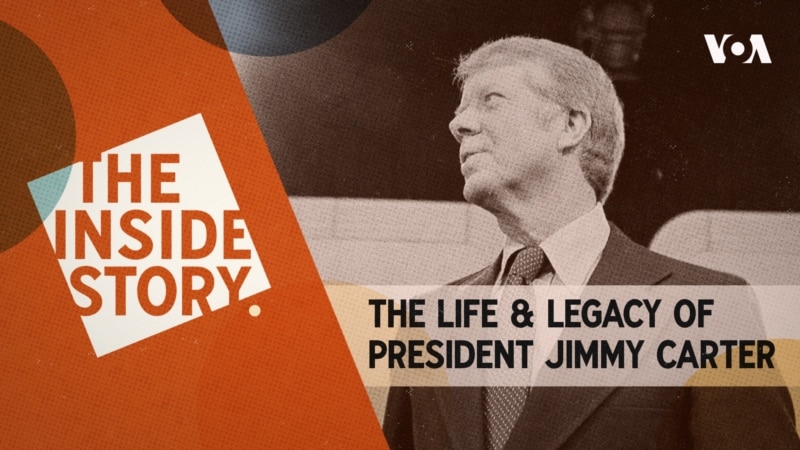
 1d
1dTranscript: The Inside Story: The Life & Legacy of President Jimmy Carter Episode 178 - January 9, 2025 Show Open: President Jimmy Carter: I Jimmy Carter do solemnly swear…. KANE FARABAUGH, VOA Correspondent: As the 39th president of the United States, Jimmy Carter promised a government as good as its people. President Jimmy Carter: There can be no more ambitious tasks for America to undertake on this day of a new beginning and to help shape a just and peaceful world. KANE FARABAUGH: A peaceful world he influenced more as a former president and global humanitarian. President Jimmy Carter: I would be perfectly satisfied to have a legacy based on peace and human rights. I mean, who wouldn’t? KANE FARABAUGH: The life and legacy of Jimmy Carter now on the inside story. The Inside Story: KANE FARABAUGH: Hello and welcome to the Inside Story… I’m VOA Correspondent Kane Farabaugh here in Plains, Georgia the hometown of the 39th President of the United States, Jimmy Carter. Mourners around the world are remembering, and honoring President Carter, who died December 29th at the age of 100. On Tuesday, the President’s horse drawn casket made its way through Washington DC, arriving at the U.S. Capitol where - in the highest tribute possible to an American citizen - the late President lay in state in the Rotunda of the US Capital where thousands paid their respects. From there, the former President’s casket traveled to the National Cathedral on Thursday for a memorial service honoring Carter’s life and legacy. All five living U.S. Presidents attended the ceremonies. Jason Carter, Jimmy Carter’s Grandson: Essentially, he eradicated a disease with love and respect. He waged peace with love and respect. He led this nation with love and respect. To me this life was a love story from the moment that he woke up, until he laid his head. Conclude with this, as Andy Young told me, He may be gone. But he's not gone far. President Joe Biden: Jimmy Carter's friendship taught me, and through his life, taught me, strength of character is more than title or the power we hold. It's the strength to understand that everyone should be treated with dignity, respect. You know, we have an obligation to give hate no safe harbor and to stand up to what my dad used to say is the greatest sin of all, the abuse of power. KANE FARABAUGH: Jimmy Carter lived the longest of any President in U.S. history. He saw seventeen different Presidential administrations through which time the U.S. population tripled. Though he served a single term in the White House from 1977 to 1981, it motivated his life’s work as a global humanitarian as head of his post-presidential non-profit Carter Center. When Jimmy Carter took the oath of office on January 20, 1977, he promised a “government as good as its people. President Jimmy Carter, 1977 Inaugural Address: There can be no nobler nor more ambitious task for America to undertake on this day of a new beginning than to help shape a just and peaceful world. KANE FARABAUGH: A world he continued to shape beyond his single term in the White House, becoming a Nobel Peace Prize laureate heading the global nonprofit, the Carter Center, whose mission is “waging peace, fighting disease, and building hope.” President Jimmy Carter, 2007: I look upon the Carter Center work as an extension of what I tried to do as president. KANE FARABAUGH: Carter was born in Plains, Georgia in 1924. He graduated from the U.S. Naval Academy in 1946, serving as a submarine officer before returning to Plains in 1953 to run the family farm in the wake of his father's death. Carter entered politics during the civil rights movement of the 1960s, serving two terms as a Georgia legislator before becoming the state’s governor in 1971. Jimmy Carter, Inaugural Address as Georgia Governor, 1971: I say to you quite frankly that the time for racial discrimination is over. KANE FARABAUGH: Carter went from being an unknown southern Governor in 1971 to the winning presidential candidate in 1976, narrowly defeating Republican Gerald Ford. Mediating the 1979 Camp David Accords and the eventual peace treaty between Egypt and Israel was the pinnacle of Carter’s presidency. President Jimmy Carter, 2009: When I became president, there had been four wars between Arabs and Israelis in the previous 25 years, with the Egyptians in the leadership supported by the Soviet Union. They were the only country that could really challenge Israel militarily. KANE FARABAUGH: Carter also negotiated a treaty returning control of the Panama Canal to Panama and established full diplomatic ties with the People's Republic of China. But the 1979 Islamic revolution in Iran would change the course of his presidency. Protests led by Shiite clerics toppled the U.S.-backed Shah, who fled the country. Militants later stormed the U.S. Embassy in Tehran, taking 66 Americans hostage. In late November 13 hostages were released. In April 1980, Carter authorized a military operation to free the remaining hostages. It failed, and eight U.S. servicemembers died. Carter also faced challenges at home. Inflation and rising unemployment hobbled the economy, contributing to his 1980 election defeat to Republican Ronald Reagan. On January 20, 1981 – Reagan’s inauguration day - Iran finally freed the American hostages. Carter, defeated and depressed, returned to Plains to plan his presidential library. President Jimmy Carter, 2007: I envisioned it to be a tiny thing, where I would have an office and some nice buildings in Atlanta. KANE FARABAUGH: It became much more. A well-known global nonprofit, the Carter Center has monitored over 100 elections and mediated disputes ranging from a nuclear standoff with North Korea in 1994 to a peace agreement between Uganda and Sudan. The Center also promotes health and fights illness in the poorest parts of the planet. Eradicating Guinea Worm disease has been a primary goal. President Jimmy Carter, 2009: There's only been one disease in the history of humankind ever eradicated, and that was smallpox, more than 30 years ago, so Guinea Worm is going to soon be the second disease in history, to be wiped off the face of the earth. KANE FARABAUGH: Carter’s work helping humanity— led to Oslo, Norway in 2002 —where he accepted the Nobel Peace Prize. President Jimmy Carter, 2007: When I won the Nobel Peace Prize // it was because of the work of the Carter Center. So, I would be perfectly satisfied to have a legacy based on peace and human rights. I mean, who would not? KANE FARABAUGH: Carter led an active life into his 90s, surviving brain cancer in 2015. But declining health kept him mostly confined to his hometown of Plains in his final years. Jimmy Carter last appeared in public during funeral services for his wife, Rosalynn, in November 2023. In one of his last media interviews, Carter shared with VOA his hopes for the future. President Jimmy Carter, 2019: I would like to see the United States in the future strive to be the number one champion in the world of peace and human rights and environmental quality, and I would say treating everyone equal. If we could do that, we would have a real superpower in the country I love very much. KANE FARABAUGH: Carter lived the longest of any occupant of the White House, and his marriage to wife Rosalynn is the longest of any president and first lady. Six days of official funeral ceremonies marking the life and legacy of the 39th President of the United States Jimmy Carter were an opportunity for his friends, family, and the public to say goodbye to the man who was more than just a former President. The sun rises over Plains, Georgia differently these days for shop owner Philip Kurland, as he and others in this rural community of about 700 people mourn the passing of its most famous resident, Jimmy Carter. Phillip Kurland, Plains Trading Post: We were hoping we were going to be planning his 101st birthday, but the realization is that he will be with Rosalynn, he’ll be in a far better place, and he’s really done as much as he can for the community and the world at this point. KANE FARABAUGH: While he was known by the codename “Deacon” to the Secret Service officers who protected him for nearly five decades through more than 140 different countries, Jimmy Carter is more than a former president and humanitarian to those who lived alongside him in the place he called home for a century. As Carter’s hearse and motorcade made its way through the town at the beginning of six days of funeral activities, Kurland reflected on Carter’s personal impact on him. Phillip Kurland, Plains Trading Post: There goes my hero. Jill Stuckey, Jimmy Carter National Historical Park: It’s the beginning and the end. KANE FARABAUGH: Jill Stuckey is a Carter family friend, and superintendent of the Jimmy Carter National Historical Park which includes his Depression-era boyhood farm outside Plains, where the funeral motorcade paused on its journey through Georgia. Jilly Stuckey, Jimmy Carter National Historical Park: A president starts planning their funeral the day after they are elected, so this has been planned for decades. KANE FARABAUGH: A plan Stuckey and others are faithfully fulfilling as Carter’s flag draped coffin made its way through Georgia. Kim Fuller, Jimmy Carter’s Neice: I haven’t grieved yet. I’ll probably grieve when it’s all over. KANE FARABAUGH: Kim Fuller is Jimmy Carter’s niece – the daughter of his well-known brother Billy Carter. She’s also his neighbor in Plains and carries on his legacy at Maranatha Baptist Church where Carter taught Sunday School lessons since leaving the White House in 1981. While she admits the funeral activities are keeping her busy, there are difficult moments of reflection. Kim Fuller, Jimmy Carter’s Neice: Something kind of just flooded over me… we’re doing this because he’s dead… he’s gone… and I had to go outside. So, there are moments when it hits me just overwhelmingly. KANE FARABAUGH: As members of the U.S. military stand at attention at Carter’s flag-draped coffin at the Carter Center in Atlanta, thousands of visitors like Atlanta resident Walter Ramsey have one final opportunity to connect with Georgia’s only president. Walter Ramsey, Atlanta Resident: I wasn’t alive for his presidency, but this really helps you feel like you know Jimmy. KANE FARABAUGH: More than 22,000 people waited in line to pay respects to President Carter over two days at the Carter Center in Atlanta, Georgia, where I also had an opportunity to offer my own goodbye to a man I came to know well. As a correspondent for Voice of America, I was fortunate to get to know “Jimmy” personally, although I never was able to call him by his first name. For me, interviewing President Carter for the first time towards the beginning of my career in journalism was also the start of a long relationship that evolved into more than just one between a reporter and a former President. When we first met in 2006 during one of his book tours, I had not yet interviewed a former president. I was nervous. Jimmy Carter, on the other hand … It’s not your first time, is it? Jimmy Carter, Former President, 2006: No, it’s not the first time. KANE FARABAUGH: Over the course of nearly two decades and dozens of one-on-one interviews, Carter became more than just the subject of my news reports. He became a friend to me and my family, and even spent time with my children, including my eldest son Lucas. Jimmy Carter, Former President, 2015: I want to shake hands with you … your father is one of my best friends. You like him too? Is he a good father or not?” KANE FARABAUGH: My desire to better understand the 39th president's life and legacy brought me to events and symposiums around the country organized by the Carter Center, his global nonprofit organization. I came to know a punctual man more interested in concrete results than the optics — or politics — surrounding them, a supremely humble and patient citizen of the world who made time for everyone who sought him out. I also collected and read books — those he wrote and those written about him — and I often visited Plains, Georgia, to see him teach Sunday school, and participated in events hosted in his hometown. Jimmy Carter, Former President, 2014: When I teach, Plains prospers! KANE FARABAUGH: Initially, I didn’t know anyone in Plains except the former president and his wife, former first lady Rosalynn Carter. But I was welcomed like a neighbor by those close to him, and through the years forged friendships that endure today. Jimmy Carter, Former President, 2018: You see what my family was like. Aren’t you all amazed that I became president! KANE FARABAUGH: My friendship with Carter led to hosting panel discussions and participating in town hall meetings, personal dinners, fishing trips, and book signings across the country. Kane Farabaugh, VOA Correspondent, 2017: I saw the clip about releasing the sea turtles. That must have been exciting, right? Jimmy Carter, Former President, 2017: I was there with my grandchildren and great-grandchildren. KANE FARABAUGH: But it was during our semi-regular exclusive interviews that covered everything from neglected tropical diseases to Mideast peace … Leaving the White House seems to have been the best thing that could have happened to you. Jimmy Carter, Former President, 2007: I didn’t think so at the time! But it's turned out to be. KANE FARABAUGH: That I came to understand what was important to Carter, and why. You bring a voice and awareness to people that wouldn’t otherwise have a voice. Jimmy Carter, Former President, 2007: That is an important part of the Carter Center is to bring publicity the plight of people who would otherwise be ignored. KANE FARABAUGH: Some might think my friendship with Carter would prevent me from reporting on him objectively; however, I did not avoid difficult or controversial topics with him. Kane Farabaugh, VOA Correspondent, 2008: Their contention is that just by the fact that you visit with Hamas provides legitimacy to the way that they behave and they act. Jimmy Carter, Former President, 2008: First of all, my visit didn’t legitimize or delegitimize anybody! KANE FARABAUGH: Our friendship also didn’t prevent me from covering Carter's difficult moments … such as his 2015 announcement he was dealing with life-threatening cancer. What has been the most difficult part about the news for you? Jimmy Carter, Former President, 2015: The liver surgery was fairly extensive. They removed about one-tenth of my liver, I understand. KANE FARABAUGH: President Carter survived his battle with cancer but suffered further health setbacks. Despite falling and fracturing his hip in 2019, Carter did not cancel our interview ahead of his 95th birthday. ((NAT SOUND, President Carter)) ((2019)) Hi, Kane! KANE FARABAUGH: Good morning, President Carter. How are you? Jimmy Carter, Former President, 2019: I'm fine. KANE FARABAUGH: It's so good to see you. Jimmy Carter, Former President, 2019: You look snazzy this morning. KANE FARABAUGH: Well, not as good as you. In 2011, President Carter’s son Jeff wrote a book documenting the ancestry of his parents. While reading it, I discovered I had an even stronger connection to President Carter. We are related through my 11th great-grandparents, some of the early settlers of Rhode Island, and Jimmy Carter was my ninth cousin three times removed. But beyond an ancestral connection, while he is remembered as a peanut farmer, submariner, governor, artist, fisherman, Nobel Peace Prize recipient, carpenter, global humanitarian, and … He’s often referred to as the ‘greatest ex-president?’ Rosalynn Carter, Former First Lady, 2014: Yeah, and I don’t like that. He was a great President. People are finding it out.” KANE FARABAUGH: Jimmy Carter will always be to me, the greatest man I have ever met and will ever have the good fortune to call my friend. Thanks for giving us so much time. Jimmy Carter, Former President: It’s a pleasure. It’s always a pleasure to be with you, Kane. KANE FARABAUGH: We always welcome the chance to talk to you, President Carter. Jimmy Carter, Former President, 2015: I always like to be with you. You ask some very good questions, and I enjoy being with you, thank you very much. Jimmy Carter, Former President: Kane, it’s always good to be with you. KANE FARABAUGH: It’s good to be with you, too, President Carter. Jimmy Carter and his wife Rosalynn had the longest post White House life of any Presidential couple. They spent more than 4 decades working for the Carter Center and other causes like Habitat for Humanity. Volunteers and supporters connected to their many efforts say they leave a lasting legacy. Volunteers and supporters connected to former President Jimmy Carter’s philanthropic efforts in his long post-presidency mourn his passing. VOA’s Kane Farabaugh has more. Suzanne Taylor from Buffalo, New York, admits … she isn’t handy. Suzanne Taylor, Habitat for Humanity Volunteer: I have no building skills. I’m terrified of flying. KANE FARABAUGH: But when she went online to donate money to help Habitat for Humanity’s recovery efforts after the 2005 Kashmir earthquake in Pakistan, something caught her attention. Suzanne Taylor, Habitat for Humanity Volunteer: And the banner ad said now accepting applications for what was then the Jimmy Carter work project in India, and it struck me like a bolt of lightning. That was what I was supposed to do next. KANE FARABAUGH: Taylor volunteered with Habitat for Humanity to build houses alongside Jimmy Carter in India in 2006. She participated in a dozen more building projects hosted by the former president and his wife, Rosalynn, around the globe. Suzanne Taylor, Habitat for Humanity Volunteer: So, if you ask me if it’s because of the Carters, that is the ONLY reason I got involved. KANE FARABAUGH: The Carters spent a week each year building houses for Habitat for Humanity. The other 51 weeks were spent in the service of their nonprofit Carter Center, which “fights disease, builds hope, and wages peace” throughout the world ((end courtesy)) … something Chris Jones of Portland, Oregon, didn’t know when he was looking for an organization to donate money to. Jones and his wife, Barb, were impressed by the center’s financial management. Chris Jones, Carter Center Volunteer: It turns out, I didn’t know this at the time, but Jimmy Carter is quite the penny pincher, and he kept a close eye on how funds were spent. KANE FARABAUGH: Jones not only sent money to the Carter Center over the years but also participated in one of its key democracy programs – election monitoring. Chris Jones, Carter Center Volunteer: There was the Tunisian Arab Spring elections in 2014, and I got the call saying, ‘Hey can you be in Tunisia for the next couple of weeks for this mission,’ and I jumped at the chance. KANE FARABAUGH: Jones later joined the center’s election monitoring mission in Liberia in 2017. He’s grateful that the Carters’ global humanitarian work offered him an opportunity that transcended financial support. He says his election monitoring work was “transformative.” Chris Jones, Carter Center Volunteer: Monitoring polling stations, watching the counting of ballots really gave me an appreciation of how the democratic process works in these countries. KANE FARABAUGH: Jones says Jimmy Carter would welcome being remembered more for what he did beyond his years in the White House. Chris Jones, Carter Center Volunteer: I think his proudest accomplishment was the Carter Center, and I really want the world to remember how transformative he was, and how much good he's accomplished. KANE FARABAUGH: Suzanne Taylor plans to continue volunteering with Habitat for Humanity and the Carter Center. She says among the greatest tributes to the Carters are the many supporters participating today — and in the future — who have never met either Jimmy or Rosalynn Carter in person. Suzanne Taylor, Habitat for Humanity Volunteer: There are new people coming on board as donors and followers and builders. KANE FARABAUGH: The Carter Center has monitored more than 100 elections and continues to fight neglected tropical diseases globally. The parasitic Guinea worm, which once infected more than 3.5 million people, is down to fewer than 20 cases. The complete eradication of the disease was one of Jimmy Carter’s signature efforts with the Carter Center. Former President Jimmy Carter lived long enough to enjoy a reevaluation of his accomplishments… and failures… as a one-term U.S. president, a topic we explored earlier this year when he celebrated his history 100th birthday October 1st. When he returned to Plains, Georgia, in 1981, former Democratic President Jimmy Carter was defeated — rejected by voters in a landslide election to Republican Ronald Reagan. The rain at Carter’s welcome home reception reflected his gloomy mood. Jonathan Alter, Author and Historian: In office, he was a political failure. He lost overwhelmingly to Ronald Reagan. But he was a substantive and visionary success. KANE FARABAUGH: Author and historian Jonathan Alter recognizes what many know Carter for today –humanitarian work with his Carter Center “waging peace, fighting disease, and building hope” around the world that led to the 2002 Nobel Peace Prize. Jonathan Alter, Author and Historian: He’s done terrific work supervising elections in more than 100 countries. But former presidents don’t have as much power as presidents, not nearly as much, and the list of his accomplishments as president that were ignored, minimized, or forgotten entirely was very long. KANE FARABAUGH: The Iran hostage crisis, rising inflation and oil embargoes of the 1970s doomed Carter’s White House tenure, casting a long shadow over his legacy. However, Alter’s Jimmy Carter biography, “His Very Best,” is among several that conclude his four years in the White House were anything but a failure. Jonathan Alter, Author and Historian: Not just famously Camp David accords and opening relations with China, but a long string of legislative accomplishments on the environment and many other issues. KANE FARABAUGH: Carter signed the 1980 Alaska National Interest Lands Conservation Act protecting more than 40.5 million hectares, which Alter says is now considered one of the most important pieces of environmental legislation ever passed. Joseph Crespino, Emory University: I think we’ll remember President Carter as a president who served in very enormously difficult times, who had to deal with circumstances that were far beyond his control. KANE FARABAUGH: Joe Crespino, the Jimmy Carter professor of history at Emory University, says Carter routinely met with his students in Atlanta to discuss the good and bad decisions he made while president. Joseph Crespino, Emory University: Putting human rights front and center in American foreign policy. No president had done that in the way that Jimmy Carter had. And it was important in shifting the balance of power in the Cold War. KANE FARABAUGH: Crespino says some of Carter’s overlooked domestic accomplishments include re-organizing the federal government and de-regulating the airline, trucking and beer industries. Joseph Crespino, Emory University: We oftentimes associate a kind of freeing up of the free enterprise economy with the conservative turn that came in with Ronald Reagan, when in fact Jimmy Carter before Reagan was already doing a lot of deregulatory work. KANE FARABAUGH: Members of Carter’s Cabinet, including former United Nations Ambassador Andrew Young, are grateful Carter lived long enough to witness kinder interpretations of his legacy. Andrew Young, UN Ambassador Under Carter: There’s no place in the world I know where people don’t have some good things to say about him, whether he succeeded or not. KANE FARABAUGH: The world continues to benefit from the Carter Center’s work fighting diseases like Guinea worm, which is down to a few cases in Africa and could become only the second disease ever eradicated. As we near the end of the program, we wanted to invite you to take a journey back with us to 2014, to show you what it was like to visit Plains, Georgia when President Carter was still very much a presence, and a driving force for tourism and the local economy in his hometown. U.S. Army Sergeant Sudhir Shrestha is a long way from his home country. Sudhir Shrestha, Sergeant, Us Army: I came here from Nepal. KANE FARABAUGH: On a steamy Sunday morning some thirteen thousand kilometers from his birthplace, this immigrant from a predominately Hindu nation is among hundreds waiting in line to enter a Protestant church in a remote part of the southern U.S. state of Georgia. This isn’t unusual in the small town of Plains. ((Natural Sound Jan Williams)) Those of us here in this sanctuary are going to put our hands together and thank this soldier for his service. KANE FARABAUGH: Jan Williams is a member of Maranatha Baptist Church, which might not be the largest of the eight churches in this town of 766 people, but it is one of the biggest tourist attractions. Sergeant Shrestha was well aware of this before visiting. Sudhir Shrestha, Sergeant, Us Army: It’s really rewarding. A life-changing experience. A once in a lifetime opportunity. KANE FARABAUGH: Maranatha is more than just a church. It is a forum for live history, and a money-maker for the local economy. The reason: Maranatha’s resident Sunday School teacher also happens to be a former President of the United States. Jimmy Carter, Former President: When I teach, Plains prospers. KANE FARABAUGH: There are about 150 members on the books here at Maranatha Baptist Church, about 25 to 30 of them can be seen here on any given Sunday. But on weeks when President Carter is scheduled to teach Sunday school, it’s hard to find an empty pew here in the church. Jimmy Carter, Former President: A lot of those people tell me they've never been in a church before in their life and they just come to hear a politician teach the Bible. KANE FARABAUGH: Jimmy Carter’s faith is a central part of his life, both before he entered the White House in 1977 and after he left. He has taught some form of Sunday school since the age of 18. Now 90, his classroom is as big as ever, and more diverse. Jan Williams says what they get is more than just a recitation of bible verses. Jan Williams, Maranatha Baptist Church: You get an up-to-date history lesson sometimes. I had never heard of the ISIS until one of his Sunday school lessons and maybe what action the United States should take. KANE FARABAUGH: Though he has traveled to more than 140 countries and continues to lead an active life as head of the Carter Center, Jimmy Carter still lives in the same small town where he was born 90 years ago. Visitors to Plains not only have a chance to see the place that shaped the man, but the man himself. Sudhir Shrestha, Sergeant, US Army: I just wanted to the opportunity to see him in person, not just watch him on TV or read his writings or listen to the news, but actually get a chance to see what he has to say in person. KANE FARABAUGH: When Sergeant Shrestha visits friends and family in Nepal, he’ll have more than just a postcard or souvenir to help illustrate his visit to Plains. He now has a photograph of himself standing next to the former Commander-in-Chief of the United States, in the one place in the world where such a moment is possible. Thanks for joining us for this episode of The Inside Story. For the latest news you can log on to VOA news dot com. Follow us on Instagram and Facebook at VOA News. Also catch up on past episodes at our free streaming service, VOA Plus. I’m Kane Farabaugh. We will see you next week, for The Inside Story. ###
Read MoreThe Inside Story: Syria After Assad | 175

 1d
1dAs the Assad regime swiftly falls, we bring you comprehensive coverage on how the United States and the world are grappling with this seismic shift. Our correspondent on the ground, Heather Murdoch, provides an unparalleled look into the unfolding events within Syria. This week on The Inside Story: Syria After Assad.
Read MoreThe Inside Story: Syria After Assad | 175 TRANSCRIPT

 1d
1dTranscript: The Inside Story: Syria after Assad Episode 175 – December 19, 2024 Show Open: Unidentified Narrator: This week on The Inside Story: The fall of Damascus met with joy and rage. Plus, a look at the regional challenges facing the incoming Trump administration Now… on The Inside Story: Syria after Assad. The Inside Story: CARLA BABB, VOA Pentagon Correspondent: Hello and welcome to the Inside Story I’m Carla Babb. The Assad regime has fallen after 5 decades in power. The people of Syria are reacting to the rapidly changing situation with a mixture of anger, jubilation and confusion. Our Heather Murdock has seen it all unfold in the Syrian capital, Damascus. HEATHER MURDOCK, VOA Correspondent: Rage in Damascus is deep and widespread. At this funeral for a prominent victim of prison torture, people call for the execution of President Bashar al-Assad, less than a week after he fled the country. Everyone we speak to here says they lost someone to the brutal prison system that collapsed with the regime. Mother of Prisoner: My God, where is [my son]? I want to see him, hold him and smell him. I don’t know where he is. They took him from me. I hope God takes them. HEATHER MURDOCK: The young man being buried, Mazen al-Hamada, died in prison after speaking publicly about being tortured. At this hospital families are searching for the bodies of people they believe to have died recently. Pictures of the bodies hang on the walls outside. Many, we are told, have wounds that appear to be from torture. Inside the hospital, dozens of bodies await identification. But most families who have come here don’t find their relatives. Majda Abu al-Omani, Mother of Missing Men: My sons were arrested in 2014; they gave us death certificates, but we don’t know what happened to them. The scene in here is indescribable. It makes your hair grey. HEATHER MURDOCK: At the notorious Sednaya prison, other families search for clues that may help them find their missing loved ones. Many believe there are missing prisoners who are still alive in long-hidden secret facilities. Khamis al-Ibrahim, Searching for Missing Brother: There are living souls under this ground. Not just one or two. It’s been four or five days we’ve been here at Sednaya and so far, nothing. HEATHER MURDOCK: People tell us that their relatives were arrested for unknown reasons, or for saying something negative about the government, or even for living in an area populated by activists or rebels. CARLA BABB: And Heather joins us now from Damascus Heather. What's the latest you're seeing? HEATHER MURDOCK: Well, in the past week and a couple of days since the government fell, there has been a shift in the mood. At first, there was elation. I mean, there were celebrations on the street. There were fireworks and gunfire every day and every night, and then, I mean, there was so much emotion, then there was anger and despair, and there's still a lot of both things, a lot of happiness and a lot of despair, mostly over so many there's so many people who have been lost to Syria's notorious prison system. But there's also beginning to be a sense of normalcy here as well. People are going back to work. People are thinking, you know, what's next? This rebel group is no longer a rebel group. They're forming some kind of government, and there's a lot of hope that what they do form will be inclusive and successful economically, and, you know, certainly a lot less horrible than the fallen regime. But not a lot of not a lot is known right now about how it will turn out. So I'd say hopeful, but definitely skeptical too. CARLA BABB: You said, not a lot is known. How much do people know about HTS? HEATHER MURDOCK: They have a long history, and a lot of their history, it doesn't really tell us what we need to know about what they will do now. So for example, they used to be associated with al Qaeda and Al Nusra and even the Islamic State, but they fought bitterly with the Islamic State, and they have publicly and loudly cut ties with al Qaeda. They are an Islamist group. There's no doubt about that. They're a conservative Islamist group. You can see by the way they dress that this is a fact, and by their own you know, acknowledgement. However, they also say they're going to respect Syria's ethnic and religious minorities, which are many, Syria is a very diverse country. So, you can't imagine that this country could be successful with one religious group taking over it. CARLA BABB: You mentioned people are going back to work now. How is that? How are people figuring these things out now that there is technically not a government head anymore. HEATHER MURDOCK: There is a lot of questions. And I mean, in some places, it actually is hindering businesses, for example, the volatility of the currency. We were in Aleppo the other day, and there, the currency is so volatile. Some shops aren't opening. Money changers simply will not open because they don't know what to do. Because what the known currency exchange rate, it changes hour to hour, sometimes minute to minute. So there's a lot of up and down with not just the currency, but things like utilities and facilities they're operating, and the HTS government is trying to utilize as much of the existing infrastructure as they can to keep things running as they were. But to be honest, things weren't running that well before. So a lot of some of the challenges we're facing now, like internet not working, no one really sure who's going to be in charge of things like the internet and the telecoms companies. Those things were a challenge before, and now they're just a bit more of a challenge now, on the other hand, people think, you know now that this country is more open, open borders and a willingness to try to engage with international community, are all of these things going to get so much better in the next few weeks and months? That's a big question too. CARLA BABB: It's nice to know that they're hopeful about that we'll see how the internal politics and the internal quality of life changes in the coming days. But what about the security? Since you mentioned the open border, how is HTS and the others trying to keep things safe and secure? And what are you seeing is there still a lot of fighting going on? HEATHER MURDOCK: In terms of safety and security on this street, you do see HDS soldiers in a lot of places, securing buildings, and particularly securing high profile places like ministries and but you also see things like borders where people can just cross through freely, and they're starting To tighten it up. For example, the Lebanon border has been open since they took over, and they recently said that border is going to be more or less closed to most people until they establish some kind of customs that and other land borders. So there is, you know, some fear that there hasn't been much security here for the past week, and now it's starting to tighten up, and also a feeling like we're kind of lucky that not more there's not been more violence in the past week and such. In terms of fighting, there's still airstrikes, still attacks from Israel coming. I want to say, every day I think, I think pretty much every day there's been airstrikes from Israel. Most do not end with casualties. Most of them are on weapons depots only. In terms of actual fighting, there's not a lot there's a lot of tension in the northeast of Syria, and we've heard there's been arrests, and there's there's increased fighting between the Kurdish forces and the Turkish forces that have been at odds for years there, but in Damascus and in the cities that were formerly controlled by the government of Bashar Al Assad or HTS and their allies, those cities and towns are mostly quiet at this moment. CARLA BABB: Well Heather, the US is definitely concerned about that area you were talking about in North East Syria. Excellent reporting. Thank you so much for joining us. HEATHER MURDOCK: Thank you, Carla. CARLA BABB: Heather, thanks for joining us. Excellent reporting. US President Joe Biden called the ouster of Assad a “fundamental act of justice” after decades of repression, but he warned it was also a moment of uncertainty. Officials worry remnants of the Islamic State terror group could try to resurge in Syria. And while Syrian celebrations abound, concern about Islamic State is a big reason defense officials say U.S. troops in Syria should stay and continue helping their counter-terror partners based in the east. Syrians in Damascus reacting to a world without the Assad regime in power, a first since 1971. US Secretary of State Antony Blinken: It's impossible not to be moved by the scenes of jubilation, the scenes of relief coming out of Syria. The end of this regime is a defeat for all who enabled its barbarity and its corruption, none more than Iran, Hezbollah and Russia. So this moment presents a historic opportunity, but it also carries considerable risks. CARLA BABB: Risks that U.S. forces aimed to mitigate, striking Islamic State targets in central Syria with fighter jets, B-52 bombers and A-10 combat aircraft. A move meant to ensure the terror group won’t try to take advantage of the situation. Michael Rubin, American Enterprise Institute: The real danger moving forward over the next 48 hours is that if the Islamic State escapes its prison camp at Al Hol, then you could have thousands of militants, thousands of extremists not only spreading across Syria and the Middle East, but also Turkey and Europe as well. CARLA BABB: The U.S. military has about 900 troops in Syria to help Syrian Democratic Forces prevent Islamic State from resurging, with officials stating three primary interests now that the Assad regime has fallen. Robert Wood, US Alternate Representative to the UN: Our soldiers and personnel and all are protected. We want to make sure that our allies are safe and secure. We want to make sure that there isn’t a humanitarian catastrophe. CARLA BABB: The ousted former president has fled to Moscow. Analysts say the fall of Syria has weakened Russia, along with Iran. Michael Rubin, American Enterprise Institute: They’ve lost Hezbollah, or at least the ability to supply them. They’ve lost Syria. The question now is whether they can keep their grip on the Houthis, or whether other states in the region, Saudi Arabia, for example, are going to smell blood in the water. CARLA BABB: The Pentagon says communication with allies is key. U.S. Secretary of Defense Lloyd Austin has spoken with his Turkish counterpart about the ongoing Syrian developments. CENTCOM commander General Erik Kurilla is in the region. He has met with Jordanian allies to discuss Syria and, officials say, he plans to speak with other regional allies in the coming days. Following the overthrow of the Assad regime in Syria, Israel seized control of a demilitarized buffer zone in the Golan Heights. Israel has also launched hundreds of attacks on weapons factories and military infrastructure near Damascus in what it describes as precautionary strikes. Linda Gradstein has this report from Jerusalem. LINDA GRADSTEIN, VOA Correspondent: Israeli Foreign Minister Gideon Saar said Israel is concerned that some of Syria’s weapons could fall into the hands of those who want to harm the Jewish state. Gideon Saar, Israeli Foreign Minister: That's why we attacked strategic weapons systems like, for example, remaining chemical weapons or long-range missiles and rockets in order that they will not fall into the hands of extremists. LINDA GRADSTEIN: He spoke after Israeli troops took over a demilitarized buffer zone between Israel and Syria. Israel’s Prime Minister said Israel will not allow any hostile force to establish itself on Israel’s border. But overall, Israeli analysts say Israel sees the events in Syria as an internal issue for the Syrian people, and it hopes that rebel leader Abu Mohammed al-Golani can establish ties with Israel. Dina Lisnyansky, Tel Aviv University: I do know for a fact that Israel has those connections already with the Kurds in Syria. They approached the Israeli government and said they would like to cooperate. So, the Kurds and also the Druze in the Syrian Golan Heights are also sending all kinds of messages to Israel that are very peaceful. LINDA GRADSTEIN: For decades, the boundary between Israel and Syria had been Israel’s quietest border following an agreement after the 1973 Yom Kippur war. But some analysts say that the new situation could eventually lead to a peace treaty between Israel and Syria. Hazem Alghabra, Analyst: I'm trying to better understand if the people and Syria, [are] maybe, potentially ready to receive aid from Israel, maybe trade with Israel down the line. I think it's way too early for that. But I believe now, and this is this is where I disagree with half the people and agree with the other half, Israel is emerging as a regional superpower. Right now, at least militarily. LINDA GRADSTEIN: Israel is watching to see how Iran will react to the events in Syria. Israeli analysts believe Iran has been weakened by both Israel’s rout of Hezbollah in south Lebanon and by the events in Syria. Some in Israel fear that Iran could try to reestablish deterrence by moving ahead with its nuclear program, which could spark an Israeli attack on Iran. Linda Gradstein, VOA News, Jerusalem. CARLA BABB: In just a few weeks, president-elect Donald Trump will take the oath of office on the steps of the United States Capitol. Trump says he wants to avoid involvement in Syria. But as White House Bureau Chief Patsy Widakuswara reports, what comes next in the war-weary country will be important for the U.S. and its allies. Donald Trump, US President-Elect: It certainly seems like the world is going a little crazy right now and we’ll be talking about that. PATSY WIDAKUSWARA, VOA White House Bureau Chief: Hayat Tahrir al-Sham, the rebels who toppled Assad, is a U.S.-designated foreign terrorist group. Still, Trump wants the U.S. to stay out of the Syrian conflict. “This is not our fight,” he said on social media. Tulsi Gabbard, Trump’s pick for intelligence chief, agreed. Tulsi Gabbard, Intelligence Chief Nominee: He is fully committed, as he has said over and over, to bring about an end to wars, demonstrating peace through strength, and putting the national security interests and the safety, security and freedom of the American people first and foremost. PATSY WIDAKUSWARA: But with Assad gone, Trump may need to balance his noninterventionist stance with U.S. goals of protecting allies, such as Israel and Jordan, and avoiding the resurgence of terrorist groups such as Islamic State. Christopher O’Leary, Counterterrorism Expert: Reducing the access to chemical weapons, reducing the capabilities of known terrorist organizations in ungoverned space or in space where there's failed states, where nobody else can do it, I think is a very smart move. And I do think that is likely what President Trump will continue to do. PATSY WIDAKUSWARA: During his first term, Trump ordered strikes on the Assad regime in response to chemical weapons attacks but focused more on defeating Islamic State. He ordered U.S. troops out of Syria in 2019, leaving a few hundred American soldiers to protect oil fields. He was criticized for abandoning allies. Following the withdrawal, Turkey launched offensives against Kurdish forces who had fought alongside American soldiers to destroy Islamic State in Syria. This time, Trump said quote, “Let it play out. Do not get involved.” But with so many U.S. interests in the region, that may be easier said than done. Patsy Widakuswara, VOA News, Washington. CARLA BABB: An example of the complicated politics of the region now... With the Syrian government’s collapse, local actors are trying to take advantage of that power vacuum. A Turkish-backed Syrian militia in the country’s northeast began moving against a part of the U-S supported Syrian Democratic forces known as the People’s Protection Units, or Y-P-G. But Ankara says the Kurdish Y-P-G is affiliated with militants fighting Turkey and has promised to fight the group. Dorian Jones has more from Istanbul. DORIAN JONES, VOA Correspondent: The Turkish-supported Syrian National Army, backed by Turkish airstrikes, is continuing its assault against the YPG, which Ankara claims is linked to the PKK, a group that has been fighting Turkey for decades. Turkish President Recep Tayyip Erdogan Monday defended the assault, saying Turkey was only protecting its frontier and has no interest in Syrian territory. Ankara sees opportunity in the ouster of the Assad regime and withdrawal of its Iranian and Russian backers. Bilgehan Alagoz, Marmara University: There is no Russia; there is no Iran; Turkey was facing the Russian forces, the Iranian forces, and Assad's regime forces while it was combating PKK and YPG. If you name it as an opportunity, yes, we can name it as an opportunity for its fight against PKK, YPG. DORIAN JONES: But the YPG is supported by a small U.S. military force that was deployed as part of the war against the Islamic State group. With the Turkish-backed Syrian National Army now approaching the Euphrates River, analysts say further advances could put Ankara on a collision course with both Washington and Syria's new rulers, Hayat Tahir Al Sham or HTS. Aydin Selcen, Foreign Policy Analyst: The Euphrates is now like a line perhaps for the U.S. military. If that goes on as such, it can bring Turkey indirectly head-to-head with the U.S., with even perhaps HTS, and it can put Turkeym Ankara in a delicate diplomatic position again. DORIAN JONES: The Israeli military advance into Syria, analysts say, is fueling Ankara's concerns over the threat posed by the YPG and its political wing, the PYD, given the Israeli foreign minister Gideon Saar's speech last month declaring the Kurds a natural ally of Israel amid a growing Turkish-Israeli rivalry. Hasan Unal, Baskent University: Israel is now carving out a corridor between the PKK, PYD-controlled territories, and its own territories. That suggests that this is what they are trying to do, a Kurdish puppet state, east of the Euphrates. And this is something which is likely to create lots of problems with Turkey. DORIAN JONES: Israel's presence in Syria means Ankara is likely to step up its pressure on the YPG and will be looking to the incoming Trump administration to end the U.S. military presence in Syria. Dorian Jones, VOA News, Istanbul. CARLA BABB: Following the collapse of Damascus, many Syrians flocked to Sednaya Prison. Infamously known as “the human slaughterhouse” where tens of thousands of people were shoved together, tortured, and starved. They sought answers about their missing loved ones and saw firsthand the horrors they faced inside. Joan Cabasés Vega brings us this report from Sednaya. Veronica Villafañe narrates. VERONICA VILLAFAÑE, VOA Correspondent: The Sednaya prison was a feared detention center run by the Syrian government. Known for its brutal torture and countless executions, it earned the chilling nickname "the human slaughterhouse." Rebel forces freed the prisoners in the wake of the collapse of Bashar al-Assad's regime. Thousands of people have now gathered here, hoping to find their loved ones, like this man … Ahmed Burkani, Syrian citizen: They took him to Sednaya when he was just a 14-year-old boy. To this day, we have no idea if he’s still in Sednaya, if he’s alive, if he was killed, or if he’s being held in some underground cell. VERONICA VILLAFAÑE: Over the 13 years of civil war, as many as 100,000 people were detained by the Syrian government. Many are still missing, and desperate citizens are hoping they might find them at Sednaya. Raja Abdelrahouf, Syrian citizen: I’m looking for my brother. Someone told me 10 days ago that he was still alive. I need my brother. VERONICA VILLAFAÑE: Rebel forces’ storming of the prison not only freed many prisoners but also revealed the prison’s records. Desperate families now sift through documents scattered on the ground, hoping to find any information about their missing, or executed, relatives. Some of these documents list the names of those who died or were executed while imprisoned. Crowds gather, listening intently as these grim "blacklists" are read aloud. It’s believed thousands of prisoners were held in Sednaya, with each 5-by-5-meter cell, crammed with over 100 people. However, when the Islamist group Hayat Tahrir al-Sham arrived, it found only 300 prisoners inside. This has fueled speculation of mass executions, prisoner transfers, or the existence of underground cells. For most of those who have traveled here, the search has ended with no answers. Now, they say, all that remains is the hope for justice. For Joan Cabasés Vega, in Sednaya, Syria, Veronica Villafañe, VOA News. CARLA BABB: Before we leave you this week, an update on Austin Tice: The freelance American journalist and U.S. Marine Corps veteran kidnapped while reporting in Syria in 2012. Joining us now with the latest is Liam Scott, who’s been covering the story for our Press Freedom Unit. Before we leave you this week, an update on Austin Tice, the freelance American journalist, and US Marine Corps veteran kidnapped while reporting in Syria in 2012 Joining us now with the latest is Liam Scott, who's been covering the story for our press freedom guest, Liam, why does the family still think he's alive at this point. I mean, it's been since 2012? LIAM SCOTT, VOA Press Freedom Reporter: So shortly before the Assad government fell, the Tice family revealed that they had received information vetted by the US government, confidential information that confirmed Austin was not only alive but also believed to be held in the Damascus area. And after the Assad government fell, 1000s of prisoners have been released around the country from prisons run by the now former Assad government, and that has really fostered hope among the Tice family that Austin will soon be among them. CARLA BABB: So what is the United States doing at this point, now that Bashar Al Assad is gone. What are they doing to try to engage with the new government and try to find Austin? LIAM SCOTT: Yeah, so the US government has said that they are committed to locating Austin, but at the same time they, you know, the State Department confirmed earlier this week that they don't have any US personnel on the ground looking for him. So it's really gone to journalists, also to NGOs that are on the ground to look for him. The State Department has also confirmed that they've engaged with HTS on the case of Austin Tice and HTS has said that they are looking for Austin as well. CARLA BABB: You know, we talked about all the bombing, you know, that Israel has done, that the United States has done to kind of knock out some of the Syrian military power, to knock out some of the terrorist power out of an Islamic state. You know, when they research and you just wonder, what if Austin is there? What is happening? I mean, how concerned is the family with everything going on, with all the violence and all the bombing going on right now? LIAM SCOTT: So Deborah, Tice, Austin's mother, a few days ago, actually wrote a letter to Israeli Prime Minister Benjamin Netanyahu, asking, essentially for the Israeli military to pause their strikes on the part of Syria, where Austin is believed to be held in the mountains outside of Damascus, because there is a concern that you know he's there, and it's also makes it a lot harder for rescuers to to go there and hopefully find not only him, but other prisoners while these strikes are ongoing. And then, actually, on on Tuesday, Netanyahu replied to Deborah Tice in a letter, in a letter saying that the IDF wasn't bombing those parts where Austin was believed to be held. CARLA BABB: So, tension, also, a moment of hope for the family. I'm sure you will keep us updated. Liam Scott, thank you so much for updating us on Austin. Thank you, Carla. Well thanks for joining us for this edition of the entire CARLA BABB: Thanks for joining us for this edition of The Inside Story. I’m Carla Babb in Washington. For all the latest news, login to VOANews.com, and join us again next week for The Inside Story. Thanks for watching. ###
Read MoreThe Inside Story: A Free Press Matters | 174

 1d
1dJoin us this week as we report from New York. We examine the impact of the downfall of Syrian leader Bashar al-Assad. Plus, we continue our coverage on missing journalist Austin Tice, who has been held in Syria for more than a decade. Tune in to The Inside Story: A Free Press Matters.
Read MoreThe Inside Story: Elections and Consequences | 171
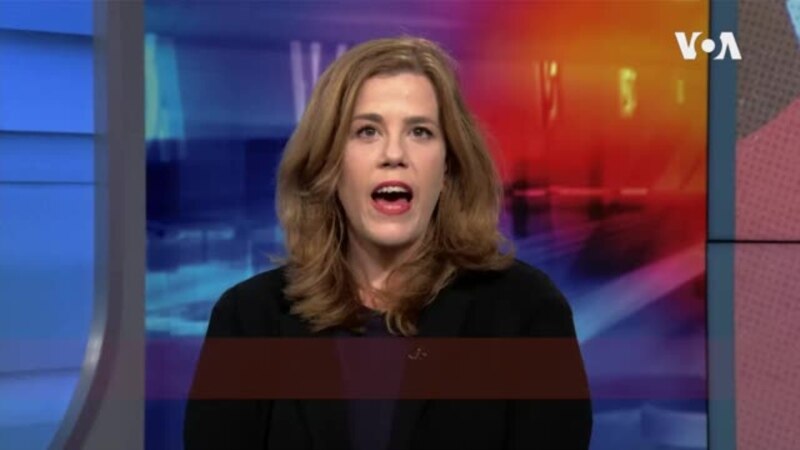
 1d
1dJoin us as we explore "Elections and Consequences." The Trump administration is moving quickly to nominate its top choices for pivotal roles. Find out who made the list and how they will shape the future Trump administration. Tune in to The Inside Story: Elections and Consequences.
Read MoreThe Inside Story: Elections and Consequences | 171 TRANSCRIPT

 1d
1dTranscript: The Inside Story: Elections and Consequences Episode 171 – November 21, 2024 Show Open: This week on The Inside Story… U.S. President-elect Donald Trump begins to announce agency heads for his incoming administration... See what that could mean for the Trump agenda going forward. Now on The Inside Story: Elections and Consequences. The Inside Story: KATHERINE GYPSON, VOA Congressional Correspondent: Hello and welcome to the Inside Story. I’m Katherine Gypson in Washington. The Republican party has won a legislative Trifecta and will control the White House, the House of Representatives and the US Senate come January... And that could help President Trump enact his expansive agenda, but if history is any guide, it’s no guarantee.... KATHERINE GYPSON: The new leader of the incoming Republican-majority U.S. Senate… Senator John Thune, Republican: We have a mandate from the American people, a mandate not only to clean up the mess left by the Biden-Harris-Schumer agenda, but also to deliver on President Trump's priorities. KATHERINE GYPSON: Thune takes the top leadership role in the Senate after Mitch McConnell served in that position for 18 years, and he is already facing his first test. President-elect Donald Trump has proposed bypassing the Senate’s constitutional role of approving Cabinet nominees. Senator John Thune, Republican: The Senate has an advise-and-consent role in the Constitution, so we will do everything we can to process his noms [nominations] quickly and get them installed in their position so they can begin to implement his agenda. KATHERINE GYPSON: Democrats lost their majority and will hold at least 47 seats in the new Senate. Chuck Schumer, Senate Majority Leader: The American people have presented us with a challenge. We must learn from it. KATHERINE GYPSON: Trump had unified control of government during the first two years of his first term. But one analyst says that does not always mean the White House will get what it wants on Capitol Hill. Casey Burgat, George Washington University: Mitch McConnell had said then that he supports the president's agenda, he'll work with them, but then we saw — from nominations to policies — that they will provide no votes if they think the president has gone too far. KATHERINE GYPSON: Republicans also secured a majority in the U.S. House of Representatives, earning praise from Trump… KATHERINE GYPSON: The president-elect endorsed Speaker of the House Mike Johnson to lead again. Mike Johnson, Speaker of the House: I believe it will be the most consequential Congress in the modern era, most consequential administration of the modern era, because, frankly, we have to fix almost every area of public policy. KATHERINE GYPSON: But Republicans hold a much narrower majority in the House with only a handful more seats than Democrats, who vowed to keep fighting. Rep. Pramila Jayapal, Democrat: The Congressional Progressive Caucus will continue to be ferocious defenders of the working class and poor people. KATHERINE GYPSON: President-elect Trump also has the task of naming new directors for the CIA and the Director of National Intelligence who oversees it. He’s turning to an old ally for the CIA and has nominated someone seen as an outsider and possible disrupter to oversee the agency when his second term begins in January. VOA National Security Correspondent Jeff Seldin has this story. JEFF SELDIN, National Security Correspondent: The one-time Democrat became a strong voice for Trump’s campaign, rallying crowds behind his agenda. Tulsi Gabbard, Trump National Intelligence Director Pick: It’s why I’m proud to stand with President Trump and why we the people must vote to send him back to the White House and make America great again. JEFF SELDIN: In announcing Gabbard’s nomination, Trump praised her “fearless spirit,” saying she’ll bring that to the job. She also brings more than 20 years of experience serving with the U.S. Army National Guard. And she brings a degree of controversy irking Republican and Democratic lawmakers with this social media video, in which critics say she mirrored Russian propaganda about U.S.-funded bioweapons labs in Ukraine — something U.S. intelligence officials say is not true. Gabbard has also been criticized for meeting with Syrian President Bashar al-Assad – accused of war crimes. But she defended the trip by saying you can’t be serious about peace unless you are willing to talk to your adversaries. Trump’s choice of John Ratcliffe to lead the CIA is more conventional – Ratcliffe having served as Trump’s director of national intelligence at the end of Trump’s first term. At times, Ratcliffe clashed with lawmakers over moves to declassify intelligence about alleged Russian election interference. He also pushed back against meddling by Iran, Russia and China. John Ratcliffe, Trump Pick to Lead CIA: There is nothing more sacred in our republic than the fundamental democratic principle of one person, one vote. JEFF SELDIN: Trump entrusting a familiar face… And a rising star... to lead U.S. intelligence efforts for the next four years. KATHERINE GYPSON: For more on this story, I'm joined now by VOA NATIONAL SECURITY CORRESPONDENT Jeff Selden, Jeff, what insights can you share about the future of the CIA under this new administration? Well, JEFF SELDIN: Donald Trump, as President Elect and as his previous president, has put a lot of emphasis on his global outlook, but he's also gone with unconventional choices at times for the intelligence agencies, especially this time around with the CIA, he's chosen John Ratcliffe, who served him, but in his previous administration as the Director of National Intelligence, the choice that is causing more controversy and more discussion and his choice is his choice for the Director of National Intelligence, the person who oversees 17 other of the US intelligence agencies, by choosing Tulsi Gabbard, a former Democratic Congresswoman who has experience as a National Guardsman serving overseas, but to the minds of many critics, does not have intelligence experience, right? KATHERINE GYPSON: So what exactly does the legislation creating that position say? JEFF SELDIN: What that position needs the legislation that created the Office of the Director of National Intelligence, which was put into place after the 911 terror attacks in 2001 to make sure that the US intelligence agencies were all working on the same page and that information wasn't falling through the cracks that would allow a massive attack like the US saw 911 to occur. And it says that the Director of National Intelligence is somebody who needs to be very experienced. The legislation calls for extensive intelligence experience, not just in terms of understanding intelligence and practicing intelligence, but also in terms of managing intelligence agencies. Right? KATHERINE GYPSON: So how has that been interpreted in the past? Has that ever been a problem in the confirmation process? JEFF SELDIN: Well, in the past, many of the directors of National Intelligence have been old veterans of the US intelligence community, serving in intelligence agencies like the NSA, the National Security Agency, the CIA, the nation's premier intelligence spy agency. But at times, though, the definition of what extensive means has been pushed specifically in his last administration, President Trump nominated John Radcliffe, now nominated to head the CIA to be the Director of National Intelligence. When he first nominated him, there was controversy. He had some experience as a prosecutor working on terrorism related cases. Some lawmakers thought that that experience was overstated, and he also served on the House Intelligence Committee. But it wasn't enough. The first time he was nominated, he had to withdraw. He was nominated again later in the administration, and he survived confirmation by a narrow party line vote. But that establishes a precedent. KATHERINE GYPSON: The question now is, how will lawmakers who have to receive these confirmation hearings and who have an interest in seeing a strong US intelligence community. How are they going to look at Tulsi Gabbard nomination? How are they going to look at her experience and her views on various issues? Right? I remember she had a trip to Syria back when she was a member of Congress that was very, very controversial. Among other things she said about the Russian invasion of Ukraine, floated some conspiracy theories that the invasion was justified because of Bio Labs. Can you. Hack some of that for us and how that might get her into trouble now, right? JEFF SELDIN: Tulsi Gabbard has not been somebody who's been eyed favorably by people within the national security community. Traditionally, they look at her trip to Syria and her meeting with the Syrian President Bashar Al Assad, and that is something that they think was a mistake and upset them. They look at this take that she had on some of the fighting between Russia and Ukraine, and the statement that you alluded to, and it was mentioned in the piece about how she, according to many, mirrored Russian propaganda about US involvement in bio weapons labs, to the point where a Republican senator, Mitt Romney essentially accused her of being a puppet for the Russian regime, and she said that, and she's also upset people in the intelligence community, because years ago, she co sponsored legislation that would have issued that called for a pardon to Edward Snowden, a former National Security Agency contractor who leaked hundreds of 1000s of documents, which, according to intelligence officials in the US, put lives at risk, risk, the lives of assets, put other programs at risk, and then took refuge in Russia. So that's going to cause some consternation. But for the Trump team, in the people in Trump's camp, they see or as somebody who's a disrupter, somebody who's willing to tell truth to power and shake up what they see as an intelligence infrastructure that really needs some change, KATHERINE GYPSON: Right. So, you've talked about the way Gabbard is perceived by the incoming Trump administration. How is she going to be perceived worldwide? What are our allies going to think about someone who's facing these accusations? JEFF SELDIN: it's a good question. Look, there some allies will be concerned, because they know they look at the track record that Trump had from his first term in office, and some of the information that some allies felt that he leaked out, or the way he handled intelligence, which, again, from a traditional intelligence point of view, some former officials thought it was it was careless at times, or he played fast and loose with how intelligence was used. So they may not be very favorable in terms of looking at what's going to happen this time around, right? But they can look at his nomination for CIA Director John Ratcliffe. They have experience dealing with him from what his time at as Director of National Intelligence at the end of Trump's first term that may give them some comfort. Look. It's also important to remember that a lot of the interaction, the cooperation between the US and its allies when it comes to intelligence is not at the top most level. It's at levels lower down, where people have been working on these programs, working on getting intelligence, gathering information, where they work together. Some of it, at this point, is even automated. KATHERINE GYPSON: So how are those relationships going to be changing under a Trump term this time around? JEFF SELDIN: That remains to be seen. But some of this stuff, some of this cooperation, is not going to be able to be walked back, right? KATHERINE GYPSON: So that said, you did talk about the lower level cooperation, if she does go through, or if she does continue with this nomination, it could be a little bit dicey to get that through the US Senate. I know that from covering some of the more domestic nominees, what exactly, how could that shake out? What answers will she have to, you know, Faith give the US Congress when she's confirmed? JEFF SELDIN: Well, if she faces a confirmation hearing, there's a good chance at least Democratic lawmakers, and there's a good chance to lawmakers will question her on some of the stances that she's taking, some of her actions, about Bashar Al Assad, her trip to Syria, her stance on Edward Snowden and his leak of information, and why should she feels he should be pardoned, when within the intelligence community he's viewed as A traitor. They're going to ask her about why she's been willing to go public and echo sentiments expressed by Russia against against Ukraine and US involvement that lends to conspiracy theories. And she'll have to provide some answers. The thing that it's hard to say is, how will the law make How will she provide those answers? What exactly will she say? And then how will lawmakers react? Remember, part of the confirmation process is there is some deference to the president elect or the president by the time these hearings happen, as to who the President wants in office, who he feels he needs in his ear to give him the best advice and the best information. How are lawmakers going to parse this out? And that remains to be seen. KATHERINE GYPSON: We'll see how much the US Congress pushes back on all of that. It is a separate branch of the US government. View is NATIONAL SECURITY CORRESPONDENT Jeff Selden, thank you so much for joining us today. JEFF SELDIN: My pleasure. KATHERINE GYPSON: As the Biden administration enters its final two months, President Biden is far from winding down. His administration has recently authorized Ukraine to utilize long-range weapons, allowing them to strike deeper into Russia, targeting the Kremlin's military infrastructure. This decision follows Russia's largest aerial assault on Ukraine in recent months. VOA's Arash Arabasadi reports on the developing situation. ARASH ARABASADI, VOA Correspondent: Missiles fly overhead as Russia launches its largest air assault against Ukraine in months. Ukraine’s air defenses intercepted some incoming fire over capital city Kyiv as air raid sirens bellowed below. And people huddled for safety in underground metro stations. Ukrainian President Volodymyr Zelenskyy said Russia launched 120 missiles and 90 drones, including Iranian-made Shaheds. Kyiv’s air force says the military destroyed 104 missiles and 42 of the drones. Russia says it was targeting energy facilities that power Ukraine’s military-industrial complex. U.S. President-elect Donald Trump has vowed to bring a speedy end to the conflict between the two nations. German Chancellor Olaf Scholz recently spoke with Russian President Vladimir Putin and reiterated Europe’s support for Ukraine no matter what happens in Washington. Olaf Scholz, German Chancellor: Russia and the Russian president started this war and are prepared to risk a great deal of material and, above all, their own lives for the plan to conquer and deny Ukraine its sovereignty and democracy… It would be an illusion on Russia’s part to believe that Ukraine cannot continue to count on our firm support in the future. ARASH ARABASADI: Zelenskyy, however, said he welcomes the prospect of this war coming to an end. Volodymyr Zelenskyy, Ukrainian President: I don’t think Putin wants peace at all. But that does not mean he doesn’t want to sit down with world leaders. ... I think the war will end, and not in the abstract. There is no exact date, but with the policy of the incoming White House, the war will end faster. This is their promise to their country. And for them, it is also very important. ARASH ARABASADI: But for now, Ukrainian first responders have their hands full removing missile debris from blown out buildings. Ukrainian officials say at least seven people died in the attacks, which they say caused “severe damage” to the power system. The strikes prompted emergency power cuts through several regions with area residents waiting in line at water supply stations and so-called “invincibility points.” Marina Martynenko, Odesa Region State Emergency Service: We opened 45 invincibility points at fire stations in the Odesa region. People can charge electronic devices, drink hot tea, and receive basic food. There are also kids’ corners where children can draw and read. ARASH ARABASADI: Russia’s war on Ukraine will reach the one-thousand day mark this week. Arash Arabasadi, VOA News. KATHERINE GYPSON: The incoming Trump administration also appears to be taking a different approach to Israel and the Palestinians living in the West Bank. Trump named former Arkansas Governor Mike Huckabee as U.S. Ambassador to Israel. And as VOA’s Linda Gradstein reports from the West Bank, that could mark a major shift in U.S. policy for the region. LINDA GRADSTEIN, VOA Correspondent: Kedumim is a comfortable bedroom community in the northern West Bank built in the mid-1970s. Daniella Weiss, a fiery settler leader, and her children were one of the first Jewish families to settle here, living in tents with no running water. Today, she hopes President-elect Donald Trump will accept total sovereignty and annexation of the West Bank settlements, without provisions for a Palestinian state. Daniella Weiss, Jewish Settler Leader: The president of the United States who says ‘I’m going to give you a present. I will give you sovereignty, but you’ll have to leave something aside.’ No, it’s all ours. The ability to say it is all ours, why? Because it is the promise of God to Abraham. LINDA GRADSTEIN: Israel’s Finance Minister Bezalel Smotrich also lives here. He predicted that in 2025, Israel will annex what’s known as Area C, the 60 percent of the West Bank that contains the Jewish settlements and is home to more than 500,000 settlers. The 2.5 million Palestinians live mostly in what’s designated Areas A and B of the West Bank that are under the partial or full control of the Palestinian Authority. Israeli annexation of disputed territory was a feature of the first Trump administration's Middle East policy, which recognized Israeli control over the Golan Heights. Trump-appointed Ambassador to Israel, Mike Huckabee, has long been a staunch proponent of Jewish settlements in the West Bank. Like the Israeli settlers, he refers to the territories by their Biblical name Judea and Samaria. Mike Huckabee, US Ambassador to Israel Nominee: I recognize Judea and Samaria as part of Israel. And I believe that it’s most important that we realize that there are more Jews living in Judea and Samaria than most people ever realize, and that those numbers are significant. It’s an important part of the security of Israel. LINDA GRADSTEIN: Some analysts, including those who live in the West Bank, say that Israel should be careful about annexing the lands unilaterally. Hodaya Karish-Hazony, Makor Rishon: If you really think that, and I think that, sovereignty is one of the things that can make Israel really safe and ensure her future, you have to do it wisely and you have to do it hand-in-hand with the American administration. LINDA GRADSTEIN: Other settlers worry that a decision to annex part of the West Bank could cause further unrest. Hanan Moses, Herzog College: I personally support annexation, but I just don’t want it to tear the society apart again. There already is a strong settlement movement here. But the left is against it. The division among us weakens us. LINDA GRADSTEIN: Some settler leaders, including Daniella Weiss, want to go even further than annexing the West Bank. They say they are already preparing to re-build Jewish settlements in the Gaza Strip which were evacuated in 2005. Linda Gradstein, VOA News, Kedumim in the West Bank. KATHERINE GYPSON: President Donald Trump carries with him the dubious distinction of being the only convicted felon ever to assume the Presidency. In fact, Trump has spent a good deal of time in courtrooms in the four years since his previous term. VOA’s Tina Trinh examines how the status of those cases changed now that he’s president elect. TINA TRINH, VOA Correspondent: Will President-elect Donald Trump be sentenced for his crimes? It’s a question that remains to be answered, as New York state judge Juan Merchan considers the extraordinary circumstances of a former U.S. president and convicted felon who also happens to be the incoming president. In May, Trump was found guilty of 34 felony counts of falsifying business records to conceal payments to adult film star Stormy Daniels to suppress a sex scandal ahead of his 2016 election. Trump’s sentencing in the so-called “hush money” case has been delayed multiple times, and his election victory earlier this month casts further doubt on legal proceedings. Anna Cominsky, New York Law School: Really, the core of this is to find out whether or not Trump's sentencing is going to move forward at all. And that includes whether it will happen before he takes office, whether it will happen after he takes office, or whether his case will just be dismissed. TINA TRINH: Trump’s defense team is arguing that a landmark Supreme Court ruling in July grants him presidential immunity and that the case should be dismissed entirely. But Manhattan District Attorney Alvin Bragg is arguing that the jury arrived at a guilty verdict prior to the Supreme Court ruling, and that Trump was not president at the time. In a letter to the judge, he indicated that prosecutors would oppose attempts to dismiss the case but were open to delaying sentencing until after Trump’s term in office. Claire Finkelstein, University of Pennsylvania: If Juan Marshan decides that he agrees with the prosecutors’ suggestion as a possibility, then he would engage in what might be termed an equitable stay of proceedings in light of the extraordinary circumstances of the defendant becoming president of the United States, and he would effectively stay the case until 2029, after Donald Trump steps down from the presidency. TINA TRINH: The hush money case isn’t the only one the president-elect must contend with. Two federal cases brought forth by special counsel Jack Smith, one alleging mishandling of classified documents and another election interference, are reportedly being brought to a close, as a long-standing Department of Justice policy cites that sitting presidents cannot be charged with a crime. However, an election interference case in Georgia does not fall under federal jurisdiction. Claire Finkelstein, University of Pennsylvania: Technically, the state of Georgia is free to proceed unencumbered by the DOJ policy. But can they? Is there, is it even possible to expect that they would be able to proceed and expect the cooperation of Donald Trump, which would really require the cooperation of the White House to proceed with a trial while the defendant is serving as president of the United States? TINA TRINH: Unprecedented circumstances have made for uncharted legal territory. Tina Trinh, VOA News, New York. KATHERINE GYPSON: Some State governors in the U.S. are already preparing for potential Trump administration policies that they anticipate may conflict with their state laws. Democratic governors, in particular, assert their readiness to defend their states' progressive policies. Matt Dibble reports from California, where the governor has called an emergency session of the state assembly. MATT DIBBLE, VOA Correspondent: As President-Elect Donald Trump prepares to take power with Republican majorities in both houses of Congress, some Democratic governors want to limit his impact on their states. Kathy Hochul, Governor of New York: If you try to harm New Yorkers, or roll back their rights, I will fight you every step of the way. MATT DIBBLE: New York Governor Kathy Hochul and the governor of Illinois, J.B. Pritzker, were quick to react. JB Pritzker, Governor of Illinois: You come for my people, you come through me. Gavin Newsom, Governor of California: We are calling, and have called, for an emergency special session of our state legislature firmly focused on the values we hold dear that I think are universal values, that are American values. MATT DIBBLE: That’s California Governor Gavin Newsom calling a special session of the state assembly to prepare for what his office says is, quote, “an incoming federal administration that has threatened the state on multiple fronts.” Following his win, Trump posted on his Truth Social that Newsom is, quote, "trying to KILL our Nation's beautiful California. Donald Trump, President-Elect: The state of California is a mess. MATT DIBBLE: Trump frequently says the state's progressive policies contribute to crime, homelessness and unauthorized immigration. Unidentified: The great state of California will be filing a lawsuit... MATT DIBBLE: During the first Trump presidency, California sued the administration over 100 times, successfully defending state immigration policies, vehicle emission standards, and access to health care. Speaking last week near San Francisco's Golden Gate Bridge, California Attorney General Rob Bonta said his team plans to begin filing litigation as soon as Trump takes office. Rob Bonta, California Attorney General: Mr. Trump repeatedly overstepped his authority between 2016 and 2020. There's no reason to think he won't do it again. We checked him, and we stopped him, and we pushed him back into his box when he tried to step out of it. MATT DIBBLE: On a Los Angeles campaign stop in September, Trump bashed California's leaders and their management of state resources. Donald Trump, President-Elect: I'm going to give you safety. I'm going to give you a great border, and I'm going to give you more water than almost anybody has. MATT DIBBLE: California spent over $41 million defending laws and policies during the first Trump presidency, according to the nonprofit CalMatters. When state legislators convene in December, Democratic leaders say they will be voting on emergency funding to block the incoming Trump administration from deporting immigrants, limiting reproductive and civil rights, and rolling back environmental regulations in America’s most-populous state. Matt Dibble, VOA News, Oakland, California KATHERINE GYPSON: I’m Katherine Gypson. We will see you next week, for The Inside Story. ###
Read MoreThe Inside Story: The Trump Transition | 170
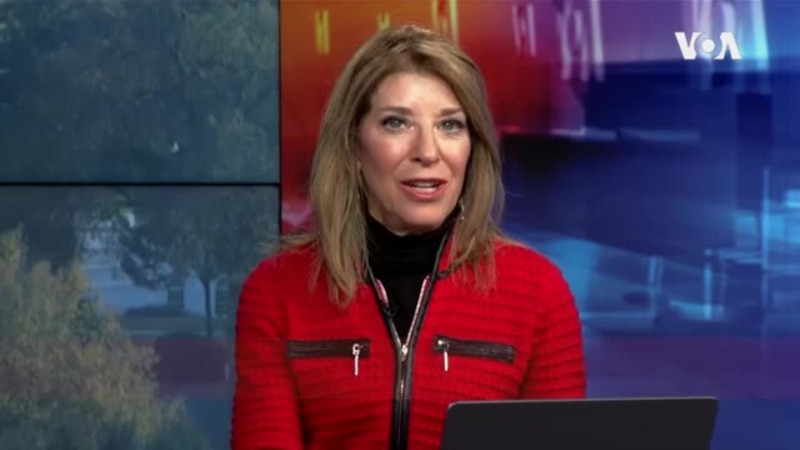
 1d
1dWe explore the upcoming Trump administration. Join our panel of Washington correspondents for an insightful roundtable discussion on navigating the transition process and understanding its implications for you. This week on The Inside Story: The Trump Transition
Read MoreRussian foreign minister exaggerates Russia-China relations, ignores nuances
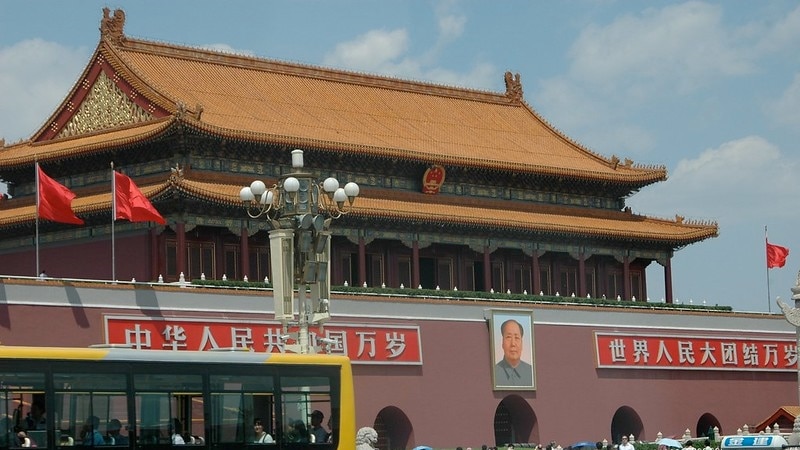
 1d
1dRelations between Russia and China are indeed closer than at any point since the 1950s, but they are shaped more by pragmatism, economic necessity and shared opposition to Western influence than by deep trust or historical affinity.
Read MoreChinese officials look to limit social media and screen time in China

 1d
1dWashington — While some youth in China admit to spending an excessive amount of time on the internet, many are skeptical about new government proposals aimed at regulating the time young Chinese spend online and on social media sites. In conversations at China’s annual political meetings that wrapped up in Beijing this week, retired international basketball star Yao Ming, called for some limits on internet access for young people in China. Yao was advocating for a plan that would mandate children turn off all electronics for one full day every academic semester and get outside and exercise. Officials also called for tighter controls of online gaming and cited concerns about harmful online content, warning that excessive internet use is hurting the physical health and academic performance of Chinese minors under the age of 18. China already has some of the world’s tightest internet controls, with tens of thousands of websites, foreign social media sites and content blocked. It also has a massive online population. On social media in China some commenters praised the efforts, but many expressed frustrations with what they viewed to be an inherent contradiction within the policies. Some noted that children are already in school most of the day and rely on internet resources to complete assignments. “Schools should assign less homework that requires phone check-ins and online research,” wrote one user from northern Hebei Province. “Minors get home around 9 p.m. or 10 p.m. at night, so when do they even have time to use social media?” wrote another user from Beijing. A college student in Beijing, who spoke with VOA on condition of anonymity because of the sensitivity of the topic, said she agreed with officials’ concerns, but added that policies like the one suggested by Yao are likely to have a limited impact. “Chinese teenagers and young people are absolutely addicted to the internet. You can find people walking on the streets looking at their phones everywhere and all the time. We use the internet to do almost everything,” the student told VOA. “I don’t really think proposals to limit internet accessibility for young people would be effective. The addiction is always hard to get rid of, so how can a ‘limit day’ alleviate the excessive internet use?” the student said, using the word “addiction” to describe the excessive use of the internet. According to the "2024 China Game Industry Minor Protection Report" released by the Game Working Committee of the China Audio-Video and Digital Publishing Association, as of December 2023, the number of internet users in China under the age of 18 reached 196 million, with the percentage of minors who are on the internet and can access it reaching 97.3%. Will Wang, a Chinese student attending college in the United States, said when he returns home in Beijing during school break his impression is that the internet is used heavily in everyday life, and that teenagers are very active on social media platforms. “There’s definitely a significant increase in screen and internet usage across all ages in China…many Chinese teenagers are deeply engaged with TikTok, RedNote, Bilibili, and many internet platforms,” Wang said in a written response to VOA. Amid the busy academic and personal lives of young Chinese, the internet provides them with a rare space for privacy, which Wang said is fueling high levels of internet use. “Most Chinese teenagers don’t have a lot of private space for themselves at home or at school so [the] internet is the only option, especially with their busy schedules––nearly every kid has to attend some sort of classes or studying-related activities outside of school,” Wang said. “For teenagers, if anything, [the] internet makes them more connected with their friends and the world.” Xu Quan, a media commentator based in Hong Kong, said online spaces can have a positive effect on children, who are often overwhelmed with parental and educational expectations. "Contrary to what some might think, the internet helps them deal with stress to a certain extent. If you were to remove the internet from their lives, that would actually be harmful to their physical and mental well-being," Xu told VOA. The recent proposals to limit internet use build on previous regulations regarding youth internet use. In October 2020, China revised the “Law on the Protection of Minors,” adding an “internet protection” chapter requiring that social media, gaming and live streaming platforms implement tools to limit their excessive use. The law targeted gaming addictions in particular. A 2021 notice required strict limits on gaming time allotments for children under 18. The regulation banned gaming between the hours of 10 p.m. and 8 a.m., and limited minors to no more than one hour of gaming per day on weekdays or two hours per day on weekends. During Chinese New Year this year, Tencent Games issued a "limited play order" for minors. During the 32-day break from academics, teenagers were only permitted to play the company’s games for a total of 15 hours. However, all of these regulations can be circumvented through using or creating accounts belonging to adults, who are not subject to the restrictions. Despite previous momentum, A Qiang, who used to work in the Chinese media industry, thinks proposals from the recently concluded political meetings in Beijing are just talk and won’t lead to any concrete policy change. The real way forward, he argues, is by lessening burdens impacting the quality of minors’ lives offline such as intense academic pressure. The problem is not that they have too much freedom online but have too little freedom offline, he said.
Read MoreExclusive: Second Iranian ship suspected of carrying missile ingredient leaves China

 1d
1dWASHINGTON — A second Iranian ship that Western news reports have named as part of a scheme to import a missile propellant ingredient from China is heading to Iran with a major cargo load, an exclusive VOA analysis has found. Ship-tracking websites show the Iranian-flagged cargo ship Jairan departed China on Monday, a month later than the expected departure cited by one of the news reports. The Jairan was named in January and February articles by The Financial Times, The Wall Street Journal and CNN as one of two Iranian cargo ships Tehran is using to import 1,000 metric tons of sodium perchlorate from China. The three news outlets cited unnamed Western intelligence sources as saying the purported shipment could be transformed into enough ammonium perchlorate — a key solid fuel propellant component — to produce 260 midrange Iranian missiles. The other Iranian cargo ship named in the news reports, the Golbon, completed a 19-day journey from eastern China to the Iranian port of Bandar Abbas on Feb. 13. During the trip, it made a two-day stop at southern China's Zhuhai Gaolan port and delivered an unknown cargo to Iran, according to ship-tracking website MarineTraffic. Both the Golbon and the Jairan are sanctioned by the U.S. Treasury Department as vessels operated by the state-run Islamic Republic of Iran Shipping Lines, which itself is sanctioned for being what the State Department has called "the preferred shipping line for Iranian proliferators and procurement agents." As the Golbon sailed from China to Iran in late January and early February, the Jairan’s automatic identification system transponder — a device that transmits positional and other data as part of an internationally mandated tracking system — reported the vessel as being docked at eastern China's Liuheng Island. In a joint review of the Jairan's AIS data on MarineTraffic and fellow ship-tracking website Seasearcher, VOA and Dubai-based intelligence analyst Martin Kelly of EOS Risk Group determined that the Jairan reported no significant draught change while docked at Liuheng Island through February and into early March. That meant the Iranian vessel was sitting at the almost same depth in the water as when it arrived in eastern China late last year, indicating it had not been loaded with any major cargo since then. The Jairan remained at Liuheng Island until March 3, when it headed south toward Zhuhai Gaolan and docked at the port on March 8. Two days later, the Jairan departed, reporting its destination as Bandar Abbas with an expected arrival of March 26. The Iranian ship also reported a significant draught change upon leaving Zhuhai Gaolan, transmitting data showing it was sitting more than 2 meters deeper in the water and indicating it had taken on a major cargo at the port, Kelly told VOA. As of Friday, local time, the Jairan was in the waters of Indonesia's Riau Archipelago, heading southwest toward the Singapore Strait. The U.S. State Department had no comment on the Jairan's departure from China when contacted by VOA. Iran's U.N. mission in New York did not respond to a similar VOA request for comment, emailed on Tuesday. Last month, the State Department told VOA it was aware of the January news reports by The Financial Times and Wall Street Journal regarding Iran's purported use of the Golbon and Jairan to import sodium perchlorate from China. A spokesperson said the State Department does not comment on intelligence matters but "remains focused on preventing the proliferation of items, equipment, and technology that could benefit Iran's missile or other weapons programs and continues to hold Iran accountable through sanctions." Chinese Foreign Ministry spokesperson Mao Ning responded to the news reports in a Jan. 23 press briefing, asserting that China abides by its own export controls and international obligations and rejects other countries' imposition of what Beijing considers illegal unilateral sanctions. In the past month, Chinese state media have made no reference to the Jairan, while China’s social media platforms also have had no observable discussion about the Iranian ship, according to a review by VOA’s Mandarin Service. In its Jan. 22 report, The Financial Times cited "security officials in two Western countries" as saying the Jairan would depart China in early February, but it did not leave until March 10. Gregory Brew, a senior Iran analyst at the Eurasia Group, a New York-based political risk consultancy, said Iran may have wanted to see if the Golbon could complete its voyage from China without being interdicted before sending the Jairan to follow it. "Ships carrying highly sensitive materials related to Iran's missile industry, which is under U.S. sanctions, are at risk of interception, and the Iranians likely are conscious of that," Brew said. Eight Republican U.S. senators led by Jim Risch and Pete Ricketts sent a letter to Secretary of State Marco Rubio about the purported Iran-China chemical scheme dated Feb. 4, urging him to work with global partners of the U.S. "to intercept and stop the shipments currently underway" if the press reports proved accurate. There was no sign of the Golbon being intercepted on its recent China to Iran voyage. Responding to VOA's query about the letter, a U.S. State Department press officer said: "We do not comment on Congressional correspondence." Ricketts' office also did not respond to a VOA inquiry about whether Rubio has responded to the senators' letter. VOA's Mandarin Service contributed to this report.
Read MoreVOA Mandarin: China revises PLA regulations prioritizing war readiness

 1d
1dThree revised regulations that dictate everything from the Chinese military’s broad mandate to soldiers’ day-to-day life are slated to take effect on April 1. The revisions have placed an emphasis on the PLA’s combat readiness and wartime conduct, the latter of which appears 49 times. Analysts say the revised regulations show the priority of the PLA’s future reform and its challenges. Click here for the full story in Mandarin.
Read MoreChina misleads on involvement in Panama Canal

 1d
1dChina’s Foreign Ministry says China is committed to Panama Canal neutrality and has never interfered in its operation. VOA’s Leonid Martynyuk explains why this is misleading.
Read MoreForeign bloggers help China spread propaganda, analysis finds

 1d
1dForeign bloggers who praise China rapidly gain popularity and millions of followers on Chinese social media platforms. VOA examined the facts and spoke with experts to shed light on the government’s efforts behind the phenomenon. "It is a long-standing tradition of the Chinese Communist Party to use foreigners to voice its propaganda for added credibility," said Mareike Ohlberg, a senior fellow at the German Marshall Fund. Foreign influencers cooperate with the Chinese government, the media and third parties to create and boost content that supports government narratives, Ohlberg said. One of the most common topics that foreign influencers focus on is whitewashing human rights abuses in Xinjiang. The U.N. Human Rights Office and groups like Amnesty International estimate that more than 1 million people – mostly Uyghurs – have been confined in internment camps in Xinjiang. One of the most recent and maybe most popular foreign characters in China is a French national, Marcus Detrez, who became a media sensation in 2024. Japanese occupation photos Last year, Detrez posted a series of historic photographs on the Chinese social media platform Douyin that depicted life under the Japanese occupation in the early 20th century. He claimed the images were taken by his grandfather and said he wanted to donate them to China. Detrez enjoyed a few months of celebrity treatment from Chinese authorities, including touring across China, while state media outlets profiled him as a hero. In February, however, historians exposed Detrez as a fraud. The photographs he claimed were unique family heirlooms turned out to be publicly available online in various museums around the world. But the thread of glorified foreign bloggers started much earlier. One of the pioneers on Chinese social media is a Russian internet celebrity, Vladislav Kokolevskiy, known in China as Fulafu. He amassed 12.89 million followers on Douyin, where he posts short video clips praising life in China. In November 2023, the Australian Strategic Policy Institute wrote that in China, Fulafu has “become a household name through his ostentatious displays of affection for China,” identifying him as a Chinese government propagandist. Kokolevskiy does not make commercial ad disclaimers. However, CMGM, an outlet covering China news, reported in January 2021 that he received advertisement contracts within 15 days for NetEase's "Heavenly Oracle" mobile game and online retailers Pinduoduo and Tmall. The companies paid about $11,000 for each ad, bringing Fulafu's advertising revenue up to about $33,000 for January 2021 alone, according to the report. Like Fulafu, dozens of foreigners grew to stardom on the Chinese internet during the last decade, Ohlberg said. Among them is Gerald Kowal, known also as Jerry Guo, an American who has risen to popularity in China after an interview with state-owned CCTV in 2020. At the time, Kowal had been posting series of short videos critical of New York City authorities’ handling of the COVID-19 pandemic. He also repeated debunked conspiracy theories, claiming, for example, that the U.S. military brought the coronavirus to China. CCTV broadcasted his interview from New York live. The China Newsweek magazine profiled Kowal in May 2020 as “one of the most influential internet celebrities,” calling him a “war correspondent” for his videos from pandemic-stricken New York. Third-party promoters The success of a large number of foreign influencers is closely tied to multichannel networks or MCNs, which are third-party organizations that promote the growth of certain content creators, operating behind the scenes. One of the MCN industry leaders is YChina, founded in 2016 by Israeli businessman Amir Gal-Or and his Chinese partner and former classmate, Fang Yedun, as part of Gal-Or's “Crooked Nuts Research Institute,” which focuses on documenting the lives of foreigners in China. YChina started with the cross-platform sharing of short video interviews with Western expats living in China. It initially focused on cultural topics and soon accumulated more than 100 million followers among its internet influencers from over 30 countries, including Israel, the United States, Australia, Spain, Argentina, Japan and Thailand. Chinese democracy activists in exile have accused YChina of supporting Chinese government propaganda about Xinjiang and Hong Kong. In July 2024, the China Public Diplomacy Association, which is under the supervision of China's Ministry of Foreign Affairs, gathered more than 30 foreign influencers from 25 countries to participate in a training camp and visit various cities in China. The bloggers were asked to record their experiences on video and share them online. China’s state-controlled media outlets boost such bloggers, presenting them to domestic audiences within the narrative of a prosperous nation under the Communist Party. For example, the Xinhua News Agency's series in 2024 on foreign internet celebrities in China showed videos of influencers from all over the world walking the streets of China's major cities praising their “cleanest streets in the world" and "efficient garbage disposal system." In using these foreign bloggers, the Chinese Communist Party wants to show that life in China is not what rights groups and China’s critics abroad say it is. The government exploits the idea that unless “you come and see, you have no right to judge,” the German Marshall Fund’s Ohlberg said. The core of this idea is “very hypocritical,” Ohlberg added, because “the Communist Party allows these people to go only where it wants them to go and see only what it wants them to see. And if you're critical, you certainly won't get the opportunity to go on a field trip.”
Read MoreCan the US pry Russia away from China?

 1d
1dWestern politicians have repeatedly called on China to limit or cease tacit support for Russia’s bloody war against Ukraine. In response, China’s leadership insists it is committed to peace and respect for the territorial integrity of other nations. But unlike most United Nations member states, China has never condemned Russia's full-scale invasion of Ukraine, and their military-diplomatic partnership — from joint bomber flights near the U.S. state of Alaska to votes in the U.N. Security Council — has only helped the Kremlin overcome its international isolation. While President Donald Trump has said he has good personal relations with both Russian President Vladimir Putin and Chinese President Xi Jinping, there is a consensus among experts in Washington that the China-Russia partnership poses a threat to U.S. interests, and that while Trump’s predecessor, Joe Biden, tried to establish a strategic dialogue with China, the Trump team appears to be prioritizing normalized ties with Russia while punishing China over trade. As the White House talks about the possibility of restoring economic cooperation with Russia, some of its officials are hinting at lifting or reducing the sanctions Washington has imposed on Moscow in recent years. Charles Hecker, an expert on Western-Russian economic ties and risks, and author of the book Zero Sum: The Arc of International Business in Russia, says some Western companies will quickly return to Russia if sanctions are lifted, particularly those involved in energy, metals and minerals. “There’s only so much oil in Norway, and there’s only so much oil in Canada; the rest of it is in some countries that have a very high-risk environment,” Hecker told VOA’s Russian Service. “And so, these kinds of companies are accustomed to business in these sorts of places, and they have the internal structures to help protect them. You know, there are energy companies doing business in Iraq right now. And I don’t want to compare Russia and Iraq, but they are high-risk environments.” Still, Hecker cautions, their return to doing business in Russia wouldn’t signal an overall U.S.-Russian rapprochement — let alone a fracturing of Sino-Russian relations. “I think it will be very difficult for the West to pull Russia away from China,” he said. “Allowing Western companies back into Russia doesn’t necessarily change President Putin’s hostility towards the West. President Putin remains antagonistic towards a Western-dominated political and economic system, and he has said over and over again that he wants to create an alternative political and economic environment – an alternative to the West. “Part of that alternative includes China,” he added. “You have never heard President Putin say anything ideologically against China. And the two are now important energy partners.” Limited popular domestic appeal U.S.-based FilterLabs analyzes public sentiment in regions where polling is problematic. According to a recently published assessment of popular attitudes expressed on Russian and Chinese social media networks, Sino-Russian relations are “full of underlying tensions, mistrust, and diverging interests.” One of the report’s authors, Vasily Gatov, told VOA its research found that “the Chinese and Russian populations are far from happy with this alliance of their authorities.” "China does not perceive Russia as a reliable, safe and equal partner,” he said. “Russia annexed the Amur Region from China; Russia adopted a completely colonial policy towards China during the 19th and early 20th centuries. Therefore, in my opinion, it is entirely possible to consider historical frictions as a vulnerability.” A media analyst at the University of Southern California’s Annenberg School for Communication and Journalism, Gatov also noted that, despite the Kremlin’s expectations, China’s economic presence inside Russia today remains “several times smaller” than that of either Europe or the U.S. before Russia invaded Ukraine. Thus, while Russian and China have overlapping interests, they are not “marching in lockstep.” "They are very different, they have very different geopolitical focuses, very different political philosophies,” he said. Other experts, however, question the Filterlabs findings, warning that random Russian and Chinese opinions online are of limited value, especially as those casting the insights aren’t likely to influence policy. "People who have the time and desire to comment on things on social media do not have much influence on how state policy is conducted,” Alexander Gabuev, director of the Berlin-based Carnegie Russia Eurasia Center, told VOA. “And these people certainly do not have much influence on whether China transfers components for Russia's weapons or takes certain military technologies from it, since the people who comment on this simply do not have real knowledge of what is actually happening.” Gabuev added that “the Chinese leadership has reasons to think that they have something to take from Russia in terms of military technology,” suggesting that China is extremely interested in gaining Russian experience in countering Western weapons during Russia's war in Ukraine. Does Trump see China as a threat? One critical question about whether Washington’s improved ties with Russia will loosen the Sino-Russian pact, say some analysts, is how Trump perceives China. Ali Wyne, senior research and advocacy advisor on the U.S. and China at the International Crisis Group, describes Trump as an anomaly for U.S. policy. “Widespread bipartisan agreement in Congress and from one administration to the next [is] that China is American’s foremost strategic competitor,” he said. But “President Trump, in many ways, is the most prominent dissenter from this alleged China consensus.” “He doesn’t view President Xi [Jinping] in adversarial terms,” Wyne said. “He actually calls President Xi a ‘dear friend’ of his. And he believes that his personal rapport with President Xi will be the decisive dynamic in setting — or resetting — the U.S.-China relationship over the next four years.”
Read MoreThe story of Chinese Americans who call Texas home

 1d
1dThe state of Texas has the third-largest Asian American population in the United States, according to the U.S. census, and Chinese people, some whose families arrived more than 150 years ago, make up the largest group. Chinese Americans trace back for generations in the Lone Star State. Their story may not be as well known as that of their counterparts in California or New York City, but it is just as intertwined with America's history. At Rice University, the Houston Asian American Archive, or HAAA, is keeping their stories alive and sharing them with new generations. Launched in 2009, the archive now contains the oral histories of some 500 people in its database, providing a crucial window to the past. "Oral history gives you a sense of immediacy and maybe more informality. And it's also unfiltered," said Anne Chao, HAAA co-founder and program manager. The archive also preserves memorabilia and artifacts from Asian Americans in Houston — a city known for its oil and gas industry. It is also known for space exploration and is home to NASA's Johnson Space Center. Albert Gee One Chinese American who found success in 1960s and '70s Houston was Albert Gee, who at the time was considered the unofficial mayor of the Chinese community. Gee appeared with Hollywood celebrities in the society pages of local newspapers and was once invited to the White House of President Richard Nixon. Born in Detroit, Michigan, in 1920, Gee and his family moved to New Orleans, where they operated a laundry business. When his father died in 1927, Gee's mother, who did not speak English, decided to take her children back to their home in China, hoping that her three sons would return one by one to the U.S., which they did. "Albert found himself only around 11 years old, coming back to the United States," said his daughter Linda Wu. "He was just working — working and trying to send money back to his mother." Gee returned to the U.S. with his godfather, whom he lived with for a few years in San Francisco, California. Eventually, with the help of friends and relatives, Gee ended up in Houston. He eventually opened grocery stores and restaurants, which became a draw for Hollywood celebrities, who would stay at a nearby hotel when in town. Wu has photos of celebrities such as singer Elvis Presley and comedian Bob Hope posing at the restaurants, some next to her father. Helping newcomers Wu said her parents saw themselves as Americans but never forget their roots. Her mother, Jane Eng, the child of Chinese immigrants, was born and raised in Texas. "I always remember different people coming to live with us at the grocery store, family members who would start their roots here," she said. By assisting newcomers, the established Chinese Americans helped fuel the growth of the Gee family surname in Houston. Not all the Gees in Houston were related, however. Stories about some of the city's Gees can be found in the HAAA database and in the 1998 anthology "The Gees in Houston, Texas." "For the Gee family, it's been discerned that we've come from about three to four villages in China," said Rogene Gee Calvert, who contributed stories about her father, David Gee — no relation to Albert Gee — to the anthology. David Gee David Gee migrated from China to the U.S. in the late 1920s, during the Chinese Exclusion Act, which allowed Chinese merchants, diplomats and students into the country but banned laborers. Gee was 17 when he arrived, but his passport indicated he was four years younger. He was a so-called paper son. "'Paper sons' and 'paper daughters' are the names given to people who buy false papers," said Casey Dexter-Lee, an educator at Angel Island State Park in San Francisco Bay. Part of the island served as a major immigration station from 1910 to 1940. "It's about $100 for each year of life that the person claims," she said. "So a 10-year-old would cost about $1,000 to buy false papers." After arriving in the U.S., David Gee was detained at the Angel Island Immigration Station for almost a year. Eventually, he received permission to stay. David Gee worked in San Francisco with a relative. In 1938, he moved to Houston to join a family friend. He returned to San Francisco to get married, then brought his wife to Houston, where he worked in the grocery business. "There was discrimination and, of course, there were natural barriers of language and just knowing how to navigate … how to get around and what to do," Calvert said. "So, there were some elders who were well-spoken that were respected in the mainstream community that really helped our family." Houston and Jim Crow Chao said the first large group of Chinese immigrants arrived in Houston in the 1940s and '50s. At that time, racial segregation was legal in Texas and Southern states through a series of codes known as Jim Crow laws. "Even though Houston also was subject to Jim Crow law, the law wasn't applied the same way as [in] the other Southern states. And so, there's a sense of more equitable equity in Houston." Chao said, adding that people, including Chinese Americans, settled in Houston because there was a "sense of business opportunity." Being neither Black nor white, the Chinese Texans occupied a gray area under Jim Crow law. "They were just in between and just dependent upon how well the neighborhood or people accepted them," said Ted Gong, senior adviser to the Chinese American Museum in Washington. Albert Gee, as president of the Houston Restaurant Association, took part in the desegregation of the city's restaurants in the early 1960s. Decades later, his work in the community was immortalized in a web comic for Texas students in 2023. The comic is part of a free website called Adventures of Asia, developed by Asia Society Texas, which also collaborated with HAAA to create lesson guides for teachers called Asia in the Classroom. "Our Asian American students in particular said they want to see themselves represented in the curriculum," said Jennifer Kapral, director of education and outreach at Asia Society Texas Center. The Asian population in the U.S. nearly doubled from 2000 to 2019 and is expected to continue to grow, according to the Pew Research Center. But the history of the Asians who settled in the U.S. is missing from many textbooks, Kapral said. "There was a study that looked at 30 U.S. history textbooks from across the U.S., and they found that Asian American history was only mentioned in half of them. And of that half, it was an average of about one to two pages in the entire textbook. So, it's been a big gap." Asian American Houstonians are filling this void by sharing their stories, preserving artifacts from their past, and educating the next generation about how their forebears carved a place for themselves in Texas' largest city.
Read MoreTaiwan president warns of China's 'infiltration' effort
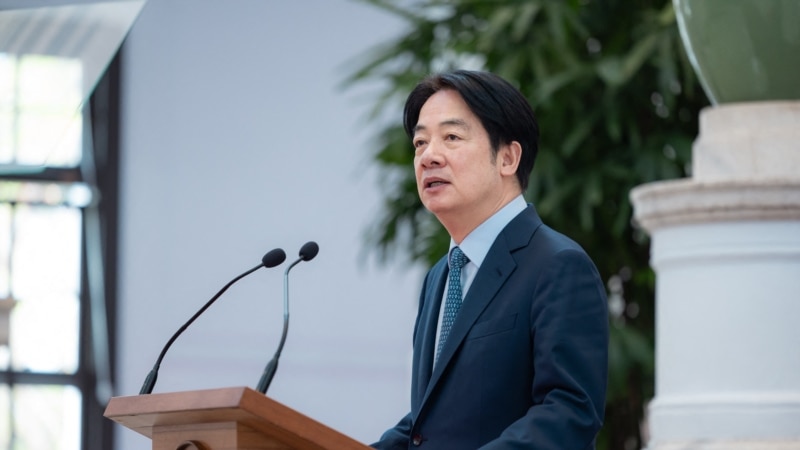
 1d
1dTAIPEI, TAIWAN — Taiwan President Lai Ching-te said on Thursday that China has deepened its influence campaigns and infiltration against the democratic island, pledging measures to tackle Beijing's efforts to "absorb" Taiwan. Taiwan has accused China of stepping up military drills, trade sanctions and influence campaigns against the island in recent years to force the island to accept Chinese sovereignty claims. Speaking to reporters after holding a meeting with senior security officials, Lai said Beijing had used Taiwan's democracy to "absorb" various members of society, including organized crime groups, media personalities, and current and former military and police officers. "They (China) are carrying out activities such as division, destruction, and subversion from within us," Lai told a news briefing broadcast live from the presidential office. China's Taiwan Affairs Office did not immediately respond to a request for comment. Citing government data, Lai said 64 people were charged for Chinese espionage last year, three times more than in 2021. He said the majority of them were current or former military officials. "Many are worried that our country, hard-earned freedom and democracy and prosperity will be lost, bit by bit, due to these influence campaigns and manipulation," Lai said. By making these efforts, Lai said China constituted what Taiwan's Anti-Infiltration Act defined as "foreign hostile forces." The president proposed 17 legal and economic countermeasures, including the strict review of Taiwan visits or residency applications by Chinese citizens, and proposals to resume the work of the military court. Lai also said his government would make "necessary adjustments" to the flows of money, people and technology across the strait. He did not elaborate. In addition, he said the government would issue "reminders" to Taiwanese actors and singers performing in China on their "statements and actions," a response to what Taipei sees as an ongoing Chinese campaign to pressure pop stars to make pro-Beijing comments. "We have no choice but to take more active actions." China claims Taiwan as its own territory and has never renounced the use of force to bring the island under its control. Taiwan's government rejects Beijing's sovereignty claims and says only the island's people can decide their future.
Read MoreChina accuses New Zealand's top spy of spreading 'false information'
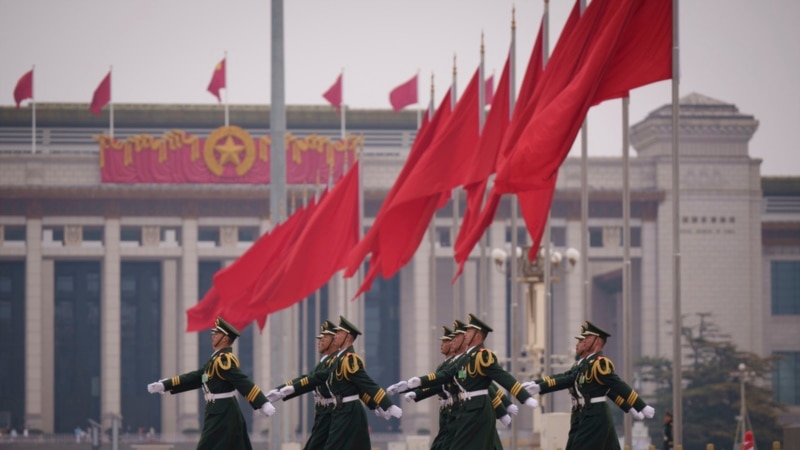
 1d
1dBEIJING — China's embassy in New Zealand on Thursday accused Wellington's top spy of lying after the intelligence chief warned of security risks posed by Beijing's growing influence in the Pacific. In a speech in Wellington last week, New Zealand's Security Intelligence Service Director-General Andrew Hampton said the focus of Pacific nations on economic and transnational crime issues had opened the door for China to sign strategic deals with them that linked economic and security cooperation. "The relevant remarks are totally baseless, all fabrication, and amount to spreading false information," the Chinese Embassy in Wellington said. "For someone holding a hammer, everything looks like a nail." In recent years, Beijing has struck deals with a number of Pacific nations, worrying New Zealand, a member of the Five Eye intelligence alliance along with Britain, the U.S., Canada, and Australia. Hampton said last week that China wanted to “create competing regional architectures, and expand its influence with Pacific Island countries,” which posed foreign interference and espionage risks. The Cook Islands, a self-governing Pacific nation in free-association with New Zealand, is at the heart of recent tensions between China and New Zealand. Cook Islands Prime Minister Mark Brown travelled to China in February, signing a comprehensive strategic partnership deal with Chinese Premier Li Qiang. That angered Wellington, which complained about the lack of consultation and transparency around Brown's visit. Relevant cooperation documents have been made public, the Chinese statement said, adding that there is no "secret agenda" in China's relations with the Cook Islands. China's embassy in Wellington also handles the country's diplomatic relations with the island nations of Niue and the Cook Islands.
Read MoreAdvocates for jailed publisher Lai turn to Trump administration
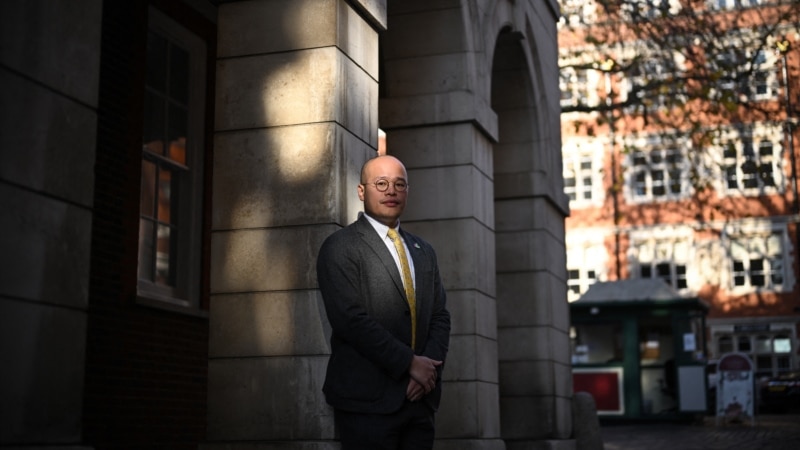
 1d
1dWASHINGTON — The son of imprisoned pro-democracy publisher Jimmy Lai this week brought the campaign to secure his father’s release to the Trump administration in Washington. Nearly two months into President Donald Trump’s second term, Lai’s son Sebastien and their international legal team were in Washington this week to meet with Trump administration officials and lawmakers in hopes that the United States can help push for Lai’s release. Lai, a businessman and founder of the now-shuttered Apple Daily newspaper in Hong Kong, stands accused of collusion with foreign forces and sedition under a Beijing-imposed national security law. He rejects the charges, but if convicted in an ongoing trial, he could face life in prison. "We were incredibly grateful that President Trump said that he will help release my father. It’s given us as a family a lot of hope," the younger Lai said at a Wednesday event at the Cato Institute think tank in Washington. In October 2024, Trump said he would "100%" be able to secure Lai’s release if he were reelected. "I’ll get him out. He’ll be easy to get out. But we don’t have people that even talk about it," Trump said in an interview with conservative podcast host Hugh Hewitt. The White House did not reply to VOA’s email requesting comment on whether the Trump administration had any specific plans to help secure Lai’s release. But a State Department spokesperson reaffirmed that the United States calls for Lai’s immediate release. "Lai’s lengthy trial and unjust detention are an example of how China uses vague national security laws to suppress fundamental freedoms and political discourse," the spokesperson added in a statement emailed to VOA on Wednesday. Lai, a 77-year-old British national, has been held in solitary confinement in Hong Kong since late 2020. His trial, which was originally estimated to last about 80 days, has been ongoing since December 2023 and is widely viewed as politically motivated. Hong Kong authorities have rejected accusations that Lai’s trial is unfair and maintain that press freedom and the rule of law are intact. Speaking at the Cato Institute event, Mark Clifford, president of the Committee for Freedom in Hong Kong, suggested that the U.S. government should use sanctions against Hong Kong officials as a way to push for Lai’s release. Clifford, who previously served on the board of Apple Daily’s parent company, also suggested the United States could shutter the Hong Kong Economic and Trade Offices in Washington, New York and San Francisco. "There’s a pretty good tool kit that the administration has," Clifford said. Even though the government-appointed judges are likely to find Lai guilty, Mark Simon, who worked with Lai for decades in Hong Kong, argued that releasing Lai may be in Beijing’s interest. "Your influence as a dissident is at the height when you’re in prison. The world is campaigning for you. If you’re China and you release him, his influence goes down," Simon said at the Cato Institute. "If he dies in prison, then you don’t control anything." Jimmy Lai’s international legal team has expressed concern about the conditions in which the publisher is being held, including prolonged solitary confinement and no access to specialized medical care for diabetes. Hong Kong authorities have rejected those claims. "Everybody realizes that the clock is ticking, and time is running out for my father," Sebastien Lai said. But even though his father’s physical health has become fragile, Sebastien Lai said his mind has stayed strong. "He’s still strong mentally, and he’s still fighting," the younger Lai said. "That’s something that should inspire all of us." Before concluding his cross-examination in Lai’s national security trial last week, Hong Kong prosecutor Anthony Chau read out the charges, alleged conspiracies and co-conspirators, and asked the elder Lai if he agreed with them. "Of course I disagree. Totally rubbish," Lai said. After 52 days in the witness box, Lai completed his testimony in the trial last week. Lawyers from both sides aren’t expected to return to court to deliver their closing statements until August, marking the trial’s latest months-long delay. Lai’s plight has received bipartisan support in Washington, according to Caoilfhionn Gallagher, the attorney leading Lai’s international legal team. She told VOA she hopes the United States and the United Kingdom can coordinate their efforts and work together to secure Lai’s release. "We’re extremely worried for his health and well-being, and indeed, his life," Gallagher said. "It’s in no one’s interest for this brilliant man to die in prison."
Read MoreVOA Mandarin: China, Walmart discuss response to US tariffs

 1d
1dChina’s Commerce Ministry reportedly held talks with Walmart on Tuesday after the U.S. retail giant had requested a 10% price cut from its Chinese suppliers to offset U.S. tariff costs, state media CCTV said. The report added that the ministry is believed to have expressed concern over Walmart’s “unfair” practice, which it believes may create the risk of supply chain disruption and harm the interests of Chinese and American companies and American consumers.” Click here for the full story in Mandarin.
Read MoreVOA Mandarin: About 12 million graduates to join China's shrinking job market
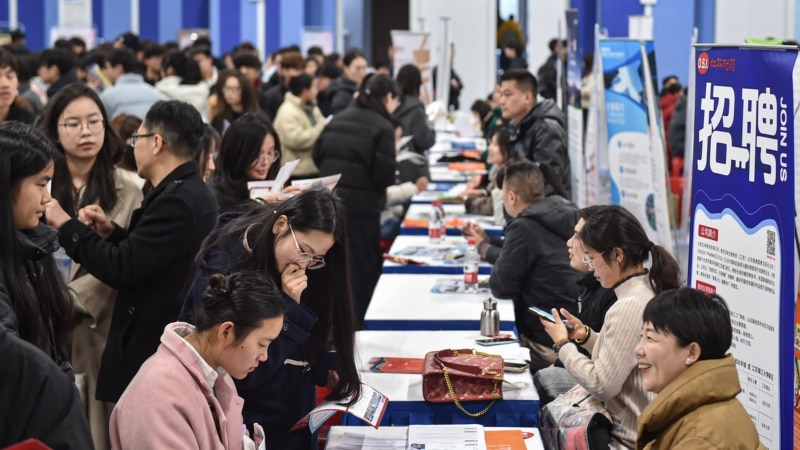
 1d
1dTAIPEI, TAIWAN — About 12.2 million college graduates are expected to enter China’s shrinking labor market this summer, Wang Xiaoping, minister of the Human Resources and Social Security Ministry told the country's National People's Congress Sunday. It is believed that the Chinese government will encourage young people to accept gig work or vocational trainings so as not to hike up the youth unemployment rate. Click here for the full story in Mandarin.
Read MoreChina, Iran, Russia hold joint naval drills in Middle East

 1d
1dTEHRAN, IRAN — China, Iran and Russia conducted joint naval drills Tuesday in the Middle East, offering a show of force in a region still uneasy over Tehran's rapidly expanding nuclear program and as Yemen's Houthi rebels threaten new attacks on ships. The joint drills, called the Maritime Security Belt 2025, took place in the Gulf of Oman near the strategic Strait of Hormuz, the narrow mouth of the Persian Gulf through which a fifth of the world’s crude oil passes. The area around the strait has in the past seen Iran seize commercial ships and launch suspected attacks in the time since President Donald Trump first unilaterally withdrew America from Tehran's nuclear deal with world powers. The drill marked the fifth year the three countries took part in the drills. This year's drill likely sparked a warning late Monday from the British military's United Kingdom Maritime Trade Operations center, which said there was GPS interference in the strait, with disruptions lasting for several hours and forcing crews to rely on backup navigation methods. "This was likely GPS jamming to reduce the targeting capability of drones and missiles," wrote Shaun Robertson, an intelligence analyst at the EOS Risk Group. "However, electronic navigation system interference has been reported in this region previously during periods of increased tension and military exercises." US-patrolled waters Russia's Defense Ministry identified the vessels it sent to the drill as the corvettes Rezky and the Hero of the Russian Federation Aldar Tsydenzhapov, as well as the tanker Pechenega. China's Defense Ministry said it sent the guided-missile destroyer Baotou and the comprehensive supply ship Gaoyouhu. Neither offered a count of the personnel involved. Neither China nor Russia actively patrol the wider Middle East, whose waterways remain crucial for global energy supplies. Instead, they broadly cede that to Western nations largely led by the U.S. Navy's Bahrain-based 5th Fleet. Observers for the drill included Azerbaijan, Iraq, Kazakhstan, Oman, Pakistan, Qatar, South Africa, Sri Lanka and the United Arab Emirates — with the Americans likely keeping watch as well. However, China and Russia have deep interests in Iran. For China, it has continued to purchase Iranian crude oil despite facing Western sanctions, likely at a discount compared with global prices. Beijing also remains one of the top markets for Iranian imports. Russia, meanwhile, has relied on Iran for the supply of bomb-carrying drones it uses in its war on Ukraine. Iran highlights drills The drills marked a major moment for Iran's state-run television network. It has aired segments showing live fire during a night drill and sailors manning deck guns on a vessel. The exercises come after an Iranian monthslong drill that followed a direct Israeli attack on the country, targeting its air defenses and sites associated with its ballistic missile program. While Tehran sought to downplay the assault, it shook the wider populace and came as a campaign of Israeli assassinations and attacks have decimated Iran's self-described "Axis of Resistance" — a series of militant groups allied with the Islamic Republic. Syrian President Bashar al-Assad was also overthrown in December, further weakening Iran's grip on the wider region. All the while, Iran has increasingly stockpiled more uranium enriched at near-weapons-grade levels, something done only by atomic-armed nations. Tehran has long maintained its program is for peaceful purposes, even as its officials increasingly threaten to pursue the bomb. Iran's nuclear program has drawn warnings from Israel and the U.S., signaling that military action against the program could happen. But just last week, Trump sent a letter to Iranian Supreme Leader Ali Khamenei seeking a new nuclear deal. Iran says it hasn't received any letter but still issued a flurry of pronouncements over it. Houthis renew threats As a shaky ceasefire holds in Israel's war against Hamas in the Gaza Strip, Yemen's Houthi rebels said they were resuming attacks on shipping in the Red Sea and the Gulf of Aden, as well as the Bab el-Mandeb Strait that connects the two waterways. The rebels' secretive leader, Abdul-Malik al-Houthi, warned Friday that attacks against Israel-linked vessels would resume within four days if Israel didn't let aid into Gaza. As the deadline passed Tuesday, the Houthis said they were again banning Israeli vessels from the waters off Yemen. Although no attacks were reported, it has put shippers on edge. The rebels targeted over 100 merchant vessels with missiles and drones, sinking two vessels and killing four sailors, since November 2023.
Read MoreIndia, Mauritius upgrade strategic ties with eye on China

 1d
1dNEW DELHI — India and Mauritius have upgraded their ties, say leaders of both countries — a move analysts say is aimed at increasing New Delhi’s influence in the Indian Ocean as it seeks to counter China’s expanding footprint in the region. The announcement of upgraded ties came during a two-day visit by Indian Prime Minister Narendra Modi to Mauritius, an island nation that sits along vital seaways in the western Indian Ocean. Modi, who was chief guest at Mauritius’s National Day celebrations on Wednesday, said that the countries had elevated ties to the status of “enhanced strategic partnership.” Following talks with Mauritius Prime Minister Navinchandra Ramgoolam, both leaders also reaffirmed their commitment to a "free, safe, secure and open Indian Ocean.” Mauritius conferred the country’s highest civilian honor on Modi, and the prime ministers signed eight pacts to boost cooperation in several sectors including maritime security. Modi announced that New Delhi would invest about $11 million in several community development projects and that India will cooperate in building a new parliament for Mauritius, calling it a gift “from the mother of democracy.” China trade with Mauritius on rise While India has long enjoyed good relations with Mauritius, where 70% of the population is of Indian origin, analysts said Modi’s visit came amid a recognition that India needs to step up its engagement with a country that is called the gateway to the Western Indian Ocean and Africa, and where Beijing’s presence has grown. “China’s rise in the island has been quite phenomenal and it is now one of the most important economic players in Mauritius,” according to Harsh Pant, the vice president of studies at the Observer Research Foundation in New Delhi. “So, to offset that, it is necessary for India to have constant engagement with Mauritius and help them build capacities in areas such as health, education, and maritime capabilities to demonstrate that it can assist in meeting such challenges." In 2019, China signed a free trade agreement with Mauritius that went into effect in 2021. A page for Mauritius on China’s Foreign Ministry website that outlines relations states that the two have a strategic partnership. Bilateral trade between the two countries hit $1.1 billion, a 10.1% increase from the previous year, according to the website. As the region becomes a hotspot for geopolitical competition, India and China have stepped up efforts to build ties with Indian Ocean countries. Underlining India’s naval cooperation with Mauritius, an Indian navy contingent participated in the National Day parade and an Indian warship — the INS Imphal, a stealth guided-missile destroyer — paid a visit to the capital, Port Louis. Last year, India helped Mauritius build an airstrip and a jetty in Agalega — two tiny islands covering 25 square kilometers that are located north of the main island. Although Mauritius has said that the facilities are not for military use, they give India a foothold to monitor traffic in the western Indian Ocean, say analysts. “India’s construction of logistics infrastructure on Agalega Island underlines both Mauritius’s enduring geopolitical significance in the Indian Ocean and Delhi’s growing maritime stakes in regional security,” political analyst C. Raja Mohan wrote in the Indian Express newspaper. India backs Chagos handover Indian officials have also said that New Delhi would support a planned deal between Britain and Mauritius to hand over control of the Chagos Islands to Mauritius that is being finalized. One of the islands on the archipelago, Diego Garcia, has been home to a joint U.K.-U.S. military base since the 1970s. British media have reported that Britain will cede sovereignty of the Chagos Islands and lease back Diego Garcia from Mauritius to allow the military base to remain. “We support Mauritius in its stance on its sovereignty over Chagos, and this is obviously in keeping with our long-standing position with regard to decolonization and support for sovereignty and territorial integrity of other countries,” Indian foreign secretary Vikram Misri said Saturday while announcing plans that Modi will soon also visit the Maldives. Although officials have made no comment, analysts point out that India backs the continuation of the military base in Diego Garcia. Last month, U.S. President Donald Trump said he was “inclined” to go along with the deal between Mauritius and Britain over the future of the base. “From New Delhi’s standpoint, it helps if there is some American presence there because it balances out the strategic realities of the region,” said Pant.
Read MoreChina boosting development of AI for use in trade war with US

 1d
1dNEW DELHI — Encouraged by the enthusiastic reception to its DeepSeek artificial intelligence platform in January, China's leaders are going all out to encourage AI companies to harness the power of this technology to compete with the United States and other countries in business and military spheres. China considers AI an important tool to handle U.S. restrictions on Chinese business, particularly after DeepSeek shook up Wall Street, resulting in a loss of $589 billion for Nvidia stockholders in late January. "The government in China works directly with the private sector and universities in the advancement and deployment of AI technology and are reducing their dependence on imports of high-technology products," said Lourdes Casanova, director of Cornell University's Emerging Markets Institute. The past few weeks have seen China rolling out several new AI models, including Manus, which experts say can rival the latest model of ChatGPT. Industry experts were more than surprised to find that DeepSeek was equally efficient as ChatGPT, though it used older generation Nvidia chips. The U.S. has banned the supply of advanced chips. "China and the U.S. have pulled way out front in the AI race. China used to be one to two years behind the U.S. Now, it is likely two to three months," Jeffrey Towson, owner of Beijing-based TechMoat Consulting, told VOA. "Alibaba's Qwen is now a clear leader internationally in LLMs [large language models]. Chinese Kling AI and Minimax are arguably the global leaders in video generation," Towson said. Government involvement In 2017, China released an AI development program to make the country a world leader by 2030. The government's Next Generation Artificial Intelligence Development Plan said that AI would be adopted across different sectors and drive economic transformation. "China has the most elaborate AI strategy compared to any other country," Rogier Creemers, assistant professor in Modern Chinese Studies at Leiden University in the Netherlands, told VOA. China has established a National Computing Power Grid — somewhat like electricity grids — making it possible for Chinese AI companies to invest less in their own computing power. In the U.S., each company must fend for itself, Creemers said. Competition ChatGPT's updated GPT4 large language model has gotten the attention of several top-ranking CEOs of Chinese tech companies. Baidu chief Robin Li recently said his firm was under "huge pressure and a sense of crisis" after seeing the updated ChatGPT. Baidu, which has launched Ernie Bot, said "the gap [between China] and leading international levels [in the field] has widened." "AI plus robotics is likely where China will take a commanding lead over the U.S., just like in EVs,” Towson said. “Chinese companies like Unitree are already pulling ahead. Watch for China to surprise everyone in personalized robots, industrial robots and speciality robots,” he said. Communist Party control Chinese President Xi Jinping recently convened a meeting with heads of private companies, including tech firms, calling on them to "show your talent" in overcoming challenges such as an economic slowdown and U.S. restrictions on Chinese business. "There are discussions that the growth of large language models — the technology behind chatbots like DeepSeek and ChatGPT — may be hindered by media censorship, because the models will have less diverse data to work with," said Creemers. On the other hand, the government's control ensures industrial policy coordination, which is helpful in the growth of AI in China. China is focusing more on specialized software for health and other industries, which can largely tolerate political censorship. Chinese AI models are improving diagnostic accuracy in diverse areas from detecting rib fractures to cancer. US ban on advanced chips "It will take some time, but it would not be a surprise if China is also soon capable of building advanced chips for AI," Cornell’s Casanova said. Companies such as Huawei have shown that they can design and manufacture advanced chips successfully, thereby overcoming restrictions imposed by the U.S., she said. Towson said China is 100% dedicated to building an independent semiconductor supply chain. "It is advancing faster than anyone thought possible. But the frontier is always advancing, and it's unclear how this will play out over time," he said. "But you can do a lot with software,” Creemers said. “China can work with more chips with less computing power or with fewer sophisticated chips." The risk for China is not limited to chips, because the Trump administration could impose restrictions on the Chinese AI model. It could also react to China’s restriction on the use of ChatGPT, because it can violate its censorship rules. AI and the military China's air force is using AI-powered biometric tests to screen potential pilots as part of a rigorous hiring process, according to state broadcaster CCTV. "AI now plays a crucial role in interpreting candidates' biological signals, revealing underlying health risks that might not be immediately apparent to human evaluators," CCTV said. "This data-driven approach allows the air force to predict long-term risks, ultimately ensuring that only the most suitable candidates are chosen." Chinese researchers have also revealed that the Chinese army has been using Meta's publicly available Llama model to develop an AI tool for potential military applications.
Read MoreVOA Mandarin: US House passes bill to restrict use of Chinese-made batteries

 1d
1dThe U.S. House of Representatives unanimously passed two bills involving China. One will restrict the Department of Homeland Security from purchasing batteries made by Chinese companies. The other will set up a working group in the Department of Homeland Security to monitor and respond to threats from China. The bills will now await consideration by the Senate. Click here for the full story in Mandarin.
Read MoreVOA Mandarin: As China NPC closes, dissidents on 'forced holidays' to be sent home
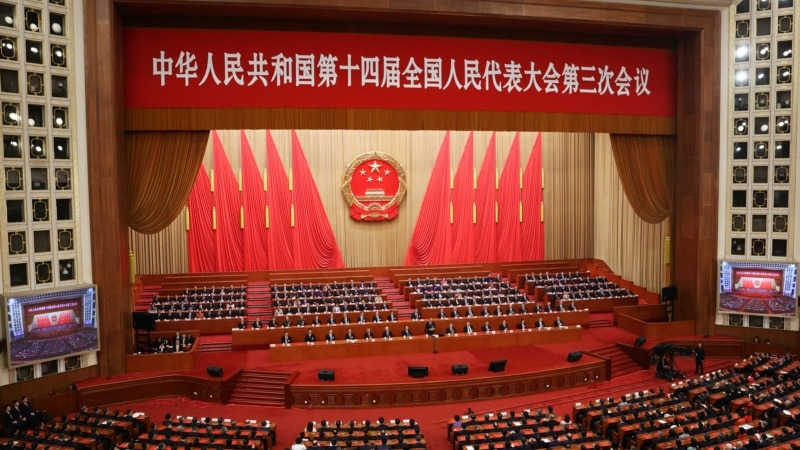
 1d
1dChina wrapped up its week-long National Party Congress meetings on Tuesday, where its nearly 3,000 representatives cast votes to pass a total of seven bills in half an hour. Analysts called China’s two sessions a rubber-stamp political gathering, where many dissidents have been placed on “forced holidays” outside of Beijing so that their voice would not be heard. One dissident told VOA he will be sent home one day after the NPC’s closure on Tuesday. Click here for the full story in Mandarin.
Read MoreFate of 8 Uyghurs in Thailand in limbo after 40 deported to China
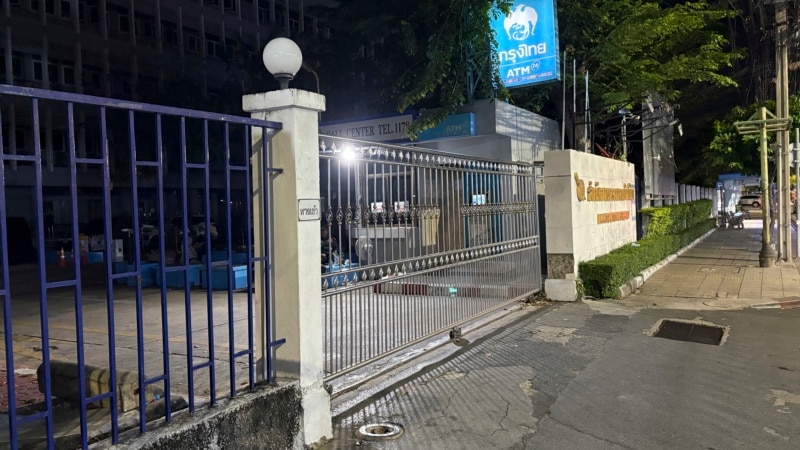
 1d
1dBANGKOK — Human rights advocates say at least some of the eight ethnic minority Uyghurs who remain in Thailand’s custody since authorities deported 40 others to China last month are at risk of the same fate. After weeks of denying it was planning to repatriate any of the 48 Chinese Uyghurs it had held since arresting them for illegal entry in 2014, Thailand abruptly turned 40 of them over to China on Feb. 27. The United States, United Nations and international rights groups strongly condemned Thailand for sending Uyghurs back to China. They say it violates Thailand’s international treaty obligations and, as of 2023, its own domestic law against deporting people to countries where they face a good chance of being abused or tortured. The United States and others have accused Beijing of genocide over its treatment of the Turkic-speaking Muslim minority Uyghurs in China’s western Xinjiang province. The United Nations says their treatment may amount to crimes against humanity. Beijing denies the allegations. The Thai and Chinese governments have said nothing about the eight Uyghurs who were not sent back to China last month. The two governments have ignored VOA requests for comment. But rights groups tell VOA they have confirmed that all eight remain in Thai custody — three in immigration detention without charge, with the other five serving prison sentences since 2020 for robbery and attempted escape from a detention center. They say the five in prison face the greatest risk of being deported once their prison terms end. “After they complete their sentence, they have to come back to the immigration detention centers. That is … worrisome, because if there [is] the push from the Chinese again, these five people might be the most vulnerable group of people that will be deported again,” Kannavee Suebsang, an opposition lawmaker and deputy chair of the House of Representatives Committee on Legal Affairs, Justice and Human Rights, told VOA. He said their sentences are due to end in 2029. Rights groups, though, say the five could face a forced return to China much earlier than that if they are added to the lists of prisoners pardoned by Thailand’s king on royal holidays each year. ‘We are very concerned’ In a statement addressing the Feb. 27 deportations posted online the day after, the Thai government said China had in fact asked for the return of 45 “Chinese nationals,” referring to the Uyghurs. Krittaporn Semsantad, program director for the Peace Rights Foundation, a Thai rights group, says that number appears to include the five Uyghurs still in prison in Thailand — a sign, she believes, that China wants them returned as well. “So, yes, we are very … concerned,” she told VOA. “It could be very high risk and very high chance that these five will be sent back after they finish their sentence.” For the eight Uyghurs still in Thai custody, “the danger is not passed yet,” agreed Polat Sayim, an ethnic Uyghur living in Australia and the executive committee vice chair of the World Uyghur Congress. Chalida Tajaroensuk, who heads Thailand’s People’s Empowerment Foundation, another local rights group, echoed their concerns. She told VOA she visited the five Uyghurs in prison the day after the 40 were deported and said they were terrified of being forced back to China as well. “They are afraid, and they also cried. They don’t want to go back,” she said. ‘We need to closely monitor’ The rights groups told VOA that their sources in the Thai government and inside its detained centers have told them the other three Uyghurs also remain in Thailand, in the custody of the Bureau of Immigration. Neither China nor Thailand has explained why they were not deported along with the 40 last month. Unlike the five Uyghurs in prison, Kannavee and the rights groups say these three, who also hail from China, claimed to have come from other countries when they were first caught in Thailand, which may have helped to spare them from being sent back. “But still we need to also closely monitor about the situation of the three, because they [have] already been disclosed, I mean their information has been disclosed that they are [from] the same group of the Uyghurs,” said Kannavee, who previously worked for the U.N.’s refugee agency in Bangladesh, Myanmar and Thailand. He was referring to the more than 300 Uyghurs Thailand caught entering the country illegally in 2014 as they sought to make their way to Turkey, where some had relatives, and other countries. Of that group, Thailand deported 173 mostly women and children to Turkey in 2015 but sent 109, most of them men, back to China days later. Those sent back to China have not been heard from since. Following the rebukes over last month’s deportations, the Thai government said Beijing had assured it that the Uyghurs would be treated well and that Bangkok could send envoys to check up on them regularly. Rights groups and opposition lawmakers such as Kannavee, though, say they take little comfort in Beijing’s promises and still hope to persuade the Thai government to let the eight Uyghurs who remain in its custody settle elsewhere. ‘We don’t have a country’ Thai officials initially claimed that no other country had offered to take in the Uyghurs but later acknowledged that some had, without naming them, and that Thailand turned them down for fear that China might retaliate. The Reuters news agency has reported that Australia, Canada and the United States all offered to resettle the Uyghurs. A spokesperson for the U.S. State Department told VOA on Sunday it had been working with Thailand for years to avoid their return to China, “including by consistently and repeatedly offering to resettle the Uyghurs in other countries, including, at times, the United States.” Sayim, of the World Uyghur Congress, said those countries should keep their offers open for the eight Uyghurs Thailand still holds, and continue putting pressure on the Thai government to accept. “We don’t have [a] country. That’s why we have to ask European countries if they can help. … Always we asking [the] U.S., Canada, U.K., Germany, Australia if they could make a decision and take them,” he said. “The Thai government shouldn’t give these people back to China. They know it’s not good when they go back.”
Read MoreDalai Lama says his successor to be born outside China
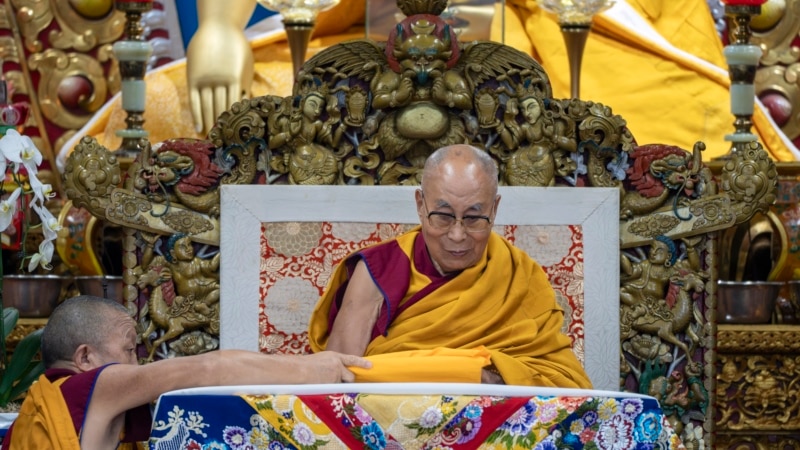
 1d
1dNEW DELHI — The Dalai Lama's successor will be born outside China, the spiritual leader of Tibetan Buddhism says in a new book, raising the stakes in a dispute with Beijing over control of the Himalayan region he fled more than six decades ago. Tibetans worldwide want the institution of the Dalai Lama to continue after the 89-year-old's death, he writes in "Voice for the Voiceless," which was reviewed by Reuters and is being released on Tuesday. He had previously said the line of spiritual leaders might end with him. His book marks the first time the Dalai Lama has specified that his successor would be born in the "free world," which he describes as outside China. He has previously said only that he could reincarnate outside Tibet, possibly in India where he lives in exile. "Since the purpose of a reincarnation is to carry on the work of the predecessor, the new Dalai Lama will be born in the free world so that the traditional mission of the Dalai Lama - that is, to be the voice for universal compassion, the spiritual leader of Tibetan Buddhism, and the symbol of Tibet embodying the aspirations of the Tibetan people - will continue," the Dalai Lama writes. Tenzin Gyatso, the 14th Dalai Lama, fled at the age of 23 to India with thousands of other Tibetans in 1959 after a failed uprising against the rule of Mao Zedong's Communists. Beijing insists it will choose his successor, but the Dalai Lama has said any successor named by China would not be respected. China brands the Dalai Lama, who won the Nobel Peace Prize in 1989 for keeping alive the Tibetan cause, as a "separatist." When asked about the book at a press briefing on Monday, a spokesperson for China's foreign ministry said the Dalai Lama "is a political exile who is engaged in anti-China separatist activities under the cloak of religion. "On the Tibet issue, China's position is consistent and clear. What the Dalai Lama says and does, cannot change the objective fact of Tibet's prosperity and development." Beijing said last month it hoped the Dalai Lama would "return to the right path" and that it was open to discussing his future if he met such conditions as recognizing that Tibet and Taiwan are inalienable parts of China, whose sole legal government is that of the People's Republic of China. That proposal has been rejected by the Tibetan parliament-in-exile in India. Supporters of the Dalai Lama and the Tibetan cause include Richard Gere, a follower of Tibetan Buddhism, and Nancy Pelosi, the former speaker of the U.S. House of Representatives. His followers have been worried about his health, especially after knee surgery last year. He told Reuters in December that he might live to be 110. In his book, the Dalai Lama says he has received numerous petitions for more than a decade from a wide spectrum of Tibetan people, including senior monks and Tibetans living in Tibet and outside, "uniformly asking me to ensure that the Dalai Lama lineage be continued." Tibetan tradition holds that the soul of a senior Buddhist monk is reincarnated in the body of a child on his death. The current Dalai Lama was identified as the reincarnation of his predecessor when he was two. The book, which the Dalai Lama calls an account of his dealings with Chinese leaders over seven decades, is being published on Tuesday in the U.S. by William Morrow and in Britain by HarperNonFiction, with HarperCollins publications to follow in India and other countries. The Dalai Lama, who has said he will release details about his succession around his 90th birthday in July, writes that his homeland remains "in the grip of repressive Communist Chinese rule" and that the campaign for the freedom of the Tibetan people will continue "no matter what," even after his death. He expressed faith in the Tibetan government and parliament-in-exile, based with him in India's Himalayan city of Dharamshala, to carry on the political work for the Tibetan cause. "The right of the Tibetan people to be the custodians of their own homeland cannot be indefinitely denied, nor can their aspiration for freedom be crushed forever through oppression," he writes. "One clear lesson we know from history is this: if you keep people permanently unhappy, you cannot have a stable society." Given his advanced age, he writes, his hopes of going back to Tibet look "increasingly unlikely."
Read MoreRobots cut strawberries at exact ripeness

 1d
1dNearly all the strawberries grown in the United States come from California, where agro robots are helping harvest berries at just the right time. VOA’s Genia Dulot reports from Southern California in this week’s episode of LogOn. (Camera: Genia Dulot )
Read MoreLogOn: Innovative material cools with no energy

 1d
1dA California company is developing a material that can cool things by sending heat into deep space. Matt Dibble has our story in this week’s edition of LogOn.
Read MoreLogOn: AI helps spot audio deepfakes amid election disinformation threat

 1d
1dAudio deepfakes have been used to try and sway voters in elections this year. VOA’s Matt Dibble looks at how artificial intelligence can help detect synthetic voices in this week’s episode of LogOn.
Read MoreLogOn: Unfired earth blocks surpass modern building codes
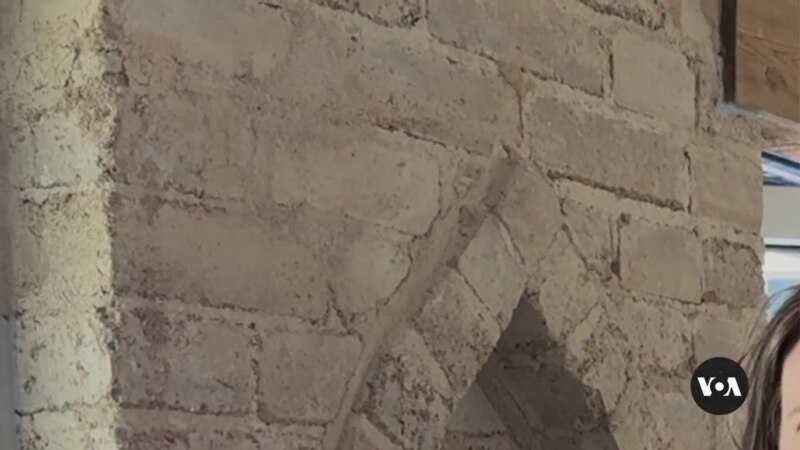
 1d
1dA new homebuilding method with ancient roots in adobe offers protection from wildfires, earthquakes, high winds and floods, while being climate friendly and sustainable. The secret ingredient: compressed earth blocks made from mud. Shelley Schlender has the story in this week’s episode of LogOn from Superior, Colorado.
Read MoreLogOn: Underwater drone helps study coral reefs

 1d
1dAn underwater drone is using artificial intelligence to help survey the Great Barrier Reef as a widespread mass coral bleaching unfolds across the world's most extensive reef ecosystem. Deana Mitchell has our story in this week’s episode of LogOn.
Read MoreLogOn: A camera that ‘sees’ around corners

 1d
1dCalifornia researchers are working to make self-driving cars safer by letting them see around corners. Matt Dibble has our story in this week’s episode of LogOn.
Read MoreLogOn: Washington state tests drones to remove hard-to-reach graffiti

 1d
1dA drone equipped with a painting hose is being deployed against stubborn graffiti in hard-to-reach areas. Natasha Mozgovaya has more in this week’s episode of LogOn.
Read MoreLogOn: Swarms of drones can be managed by one person

 1d
1dThe U.S. military says large groups of drones and ground robots can be managed by a single person without added stress to the operator. In this week’s episode of LogOn, VOA’s Julie Taboh reports the technologies may be beneficial for civilian uses, too. Videographer and video editor: Adam Greenbaum
Read MoreLogOn: Artists fight AI theft by 'poisoning' their digital images

 1d
1dArtificial intelligence image generators can mimic artists' styles, threatening their livelihood. In this edition of LogOn, Matt Dibble looks at how artists are fighting back, using tools designed to disrupt AI systems.
Read MoreLogOn: Latest battery innovation? Bricks made of clay

 1d
1dA California startup says it can help de-carbonize industrial manufacturing by using batteries made of clay. Instead of storing electricity, these clay batteries store heat. Matt Dibble has more in this week’s episode of LogOn
Read MoreLogOn: Methane-measuring satellite could help slow global warming

 1d
1dMethane leaking from fossil fuel production is among the top contributors to climate change. Now a leading environmental scientist is hoping to provide more accurate and consistent findings of methane emissions with the launch of a technologically advanced satellite. VOA’s Julie Taboh has more, in this week’s episode of LogOn. (Produced by: Adam Greenbaum)
Read MoreLogOn: Hologram-like experience allows people to connect

 1d
1dThe Dutch company Holoconnects are experts in the field of holographic illusions and are now delivering life-size personal connections with a 2-meter-tall box that make it feel like the person you are talking to is physically present. Deana Mitchell has more from Austin, Texas in this week’s episode of LogOn.
Read MoreLogOn: Next-gen sensors taking previously impossible measurements

 1d
1dResearchers in California are developing highly sensitive sensors to more quickly detect environmental changes. Genia Dulot has the story in this week’s episode of LogOn. (Camera: Genia Dulot)
Read MoreLogOn: Cloud-based data watching volcanoes

 1d
1dScientists in Alaska are developing a cloud-based approach to storing and analyzing data about volcanoes to increase the speed with which they can predict eruptions. Phil Dierking has our story in this week’s episode of LogOn.
Read MoreLogOn: Robots Hand Write Letters for Humans

 1d
1dNot long ago, people wrote letters by hand. But like many things eclipsed by modern technology, handwritten letters are less common than they used to be. Now, that technology has started writing those letters. VOA’s Julie Taboh introduces us to handwriting robots in this week’s episode of LogOn.
Read MoreLogOn: 3D Printing Cars Revolutionizes Automobile Design

 1d
1dArtificial intelligence and 3D printing could revolutionize automobile design and manufacturing. Genia Dulot takes us out to a next-generation garage in Los Angeles in this week’s episode of LogOn.
Read MoreLogOn: Miniature Body Cameras Designed to Combat Crime

 1d
1dOnce used mainly by law enforcement, ordinary citizens now have access to smaller, cheaper versions of body cameras to help them feel safe in dangerous situations. Julie Taboh shows us how in this week’s episode of LogOn.
Read MoreLogOn: Seattle Startup Builds Drones for First Responders

 1d
1dA Seattle startup’s drones are helping first responders by providing them with “eyes and ears” in hazardous environments. Natasha Mozgovaya in Seattle has the story.
Read MoreLogOn: AI’s Newest Advance: Realistic High-Definition Video From a Few Words

 1d
1dThe latest innovation in artificial intelligence is photorealistic video created from just a few words. Deana Mitchell has the story in this week’s episode of LogOn.
Read MoreLogOn: AI Helps People with Voice Disorders Speak More Clearly

 1d
1dGroundbreaking AI-assisted technology can help people with voice disorders speak in their natural voice, giving millions of people a chance to have clearer conversations. VOA’s Julie Taboh has more in this week’s episode of LogOn. Tina Trinh contributed.
Read MoreNASA, SpaceX launch crew to space station to retrieve stuck astronauts

 1d
1dThe replacement crew for the International Space Station was launched late Friday, paving the way for the return home of Butch Wilmore and Suni Williams, two NASA astronauts stuck on the space station for nine months. The SpaceX Falcon 9 rocket lifted off at 7:03 p.m. from NASA’s Kennedy Space Center in Florida carrying Crew-10 members: NASA’s Anne McClain and Nichole Ayers, Japan’s Takuya Onishi and Russia’s Kirill Peskov. The crew is part of a routine six-month rotation. Crew-10 and the Dragon spacecraft are expected to reach the space station around 11:30 p.m. Saturday. Returning to Earth alongside Wilmore and Williams will be NASA astronaut Nick Hague and Russian cosmonaut Aleksandr Gorbunov. Their return is scheduled for Wednesday, to allow for an overlap of the two crews to brief the new team. Wilmore and Williams arrived aboard the International Space Station in June 2024 and expected to stay in space for about 10 days. But their return was delayed after mechanical issues with their spacecraft, which, after weeks of troubleshooting was subsequently sent back to Earth without them. Their return was continually pushed back due to other technical delays.
Read MorePi Day counts on never-ending numerical sequence for March 14 celebrations

 1d
1dMarch 14 is Pi Day, an annual celebration of the mathematical constant of pi, representing the ratio of a circle's circumference to its diameter. The holiday is observed on March 14 or 3/14 because 3.14 are the first three digits of the infinite number pi — 3.14159 ... and on and on. The celebration of Pi Day was the brainchild of physicist Larry Shaw and was first observed in 1988 at San Francisco’s Exploratorium, a science museum, and has since grown into an international event. At that first simple salute to pi in 1988, Shaw and his wife, Catherine, took — guess what? — pies — and tea to the museum for the celebration of the infinite number. Shaw became known as the Prince of Pi and reigned over the museum’s annual honoring of the never-ending number for years, until his death in 2017. Pi Day festivities grew to include the honoring of mathematical genius Albert Einstein because he was born on March 14. The U.S. House of Representatives officially designated March 14 as National Pi Day in 2009. The Exploratorium posted on its website that this year’s observance of pi would include the annual Pi Procession, which the museum described as being executed by “a high spirited crowd” through the museum and would circle the museum’s Pi Shrine 3.14 times, while “waving the digits of pi and dancing along” to a brass band. And, of course, all participants in the revelry would be rewarded with a free slice of pie. Pi Day is now celebrated around the world by pi lovers and is viewed as a way to arouse interest in the sciences among young people. Pi lovers had a special treat in 2015, History.com reports. That year Pi Day was celebrated on 3/14/15 at 9:26:53 a.m. The combined numbers of the date and time represent the first 10 digits of pi — 3.141592653.
Read MoreAfrica faces diabetes crisis, study finds

 1d
1dJOHANNESBURG, SOUTH AFRICA — Researchers warn that type 2 diabetes could affect millions more people in the coming decades after a study published this month revealed the disease is rising far faster among people in sub-Saharan Africa than previously thought. Take 51-year-old security guard Sibusiso Sithole, for example. Being diagnosed with type 2 diabetes came as a shock, he said, because he walked six miles to and from work every day and never thought his weight was a problem. Then his wife noticed changes in his health. Since his diagnosis 13 years ago, Sithole has been on a rigorous treatment for diabetes and high blood pressure. “I have to take six ... medications every day,” he said. Diabetes is a condition in which the body struggles to turn food into energy due to insufficient insulin. Without insulin, sugar stays in the blood instead of entering cells, leading to high blood-sugar levels. Long-term complications include heart disease, kidney failure, blindness and amputations. The International Diabetes Federation estimated in 2021 that 24 million adults in sub-Saharan Africa were living with the condition. Researchers had projected that by 2045, about 6% of sub-Saharan Africans — over 50 million — would have diabetes. The new study, published this month in the medical journal The Lancet, suggested the actual percentage could be nearly double that. By tracking more than 10,000 participants in South Africa, Kenya, Ghana and Burkina Faso over seven years, researchers found that poor eating habits, lack of health care access, obesity and physical inactivity are key drivers of diabetes in Africa. Dr. Raylton Chikwati, a study co-author from the University of Witwatersrand in South Africa, said another risk factor is living in or moving to the outskirts of cities, or “peri-urban areas.” “Access to health care, you know, in the rural areas is a bit less than in the urban areas,” Chikwati said, adding that increased use of processed foods in the peri-urban areas was a problem. Palwende Boua, a research associate at the Clinical Research Unit of Nanoro in Burkina Faso, said long-term studies are rare in Africa but essential to understanding diseases. “Being able to have a repeated measure and following up [with] the same people ... is providing much more information and much valuable information,” Boua said, “rather than having to see people once and trying to understand a phenomenon.” Boua is preparing a policy brief for Burkina Faso’s government to assist in the fight against diabetes. For Sithole, managing his diabetes has been a long journey. But with treatment and lifestyle changes, he has regained control over his health. “What I can tell people is that they must go and check — check the way they eat — because that time I was having too much weight in my body,” he said. “I was wearing size 40 that time. Now I'm wearing size 34.” Experts stressed that Africans should get their blood-sugar level tested and seek treatment when diabetes is diagnosed.
Read MoreReport: US bird population is declining

 1d
1dThe U.S. bird population is declining at an alarming rate, according to a report published Thursday by an alliance of science and conservation groups. Habitat loss and climate change are among the key contributing factors to the bird population losses, according to the 2025 U.S. State of the Birds report. More than 100 of the species studied, have reached a "tipping point," losing more than half their populations in the last 50 years. The report revealed that the avian population in all habitats is declining, including the duck population, previously considered a triumph of conservation. "The only bright spot is water birds such as herons and egrets that show some increases," Michael Parr, president of the American Bird Conservancy, told Reuters. The decline in the duck population fell by approximately 30% from 2017, but duck population numbers still remain higher, however, than their 1970 numbers, according to an Associated Press account on the report. "Roughly one in three bird species (229 species) in the U.S. requires urgent conservation attention, and these species represent the major habitats and systems in the U.S. and include species that we've long considered to be common and abundant," Amanda Rodewald, faculty director of the Cornell Lab of Ornithology's Center for Avian Population Studies told Reuters. Included among the birds with highest losses, Reuters reported, are the mottled duck, Allen's hummingbird, yellow-billed loon, red-faced cormorant, greater sage-grouse, Florida scrub jay, Baird's sparrow, saltmarsh sparrow, mountain plover, Hawaiian petrel, Bicknell's thrush, Cassia crossbill, pink-footed shearwater, tricolored blackbird and golden-cheeked warbler. Some of the birds in this "red alert" group are already protected under the U.S. Endangered Species Act, the news agency said. "For each species that we're in danger of losing, it's like pulling an individual thread out of the complex tapestry of life," Georgetown University biologist Peter Marra. who was not involved in the new report, told AP. While the outlook may seem dire, it is not without hope, said Marra, who noted the resurgence of the majestic bald eagle.
Read MoreAsteroid probe snaps rare images of Martian moon

 1d
1dPARIS — On the way to investigate the scene of a historic asteroid collision, a European spacecraft swung by Mars and captured rare images of the red planet's mysterious small moon Deimos, the European Space Agency said Thursday. Europe's HERA mission is aiming to find out how much of an impact a NASA spacecraft made when it deliberately smashed into an asteroid in 2022 in the first test of our planetary defenses. But HERA will not reach the asteroid — which is 11 million kilometers from Earth in the asteroid belt between Mars and Jupiter — until late 2026. On the long voyage there, the spacecraft swung around Mars on Wednesday. The spacecraft used the planet's gravity to get a "kick" that also changed its direction and saved fuel, mission analyst Pablo Munoz told a press conference. For an hour, HERA flew as close as 5,600 kilometers from the Martian surface, at a speed of 33,480 kilometers an hour. It used the opportunity to test some of its scientific instruments, snapping around 600 pictures, including rare ones of Deimos. The lumpy, 12.5-kilometer-wide moon is the smaller and less well-known of the two moons of Mars. Exactly how Deimos and the bigger Phobos were formed remains a matter of debate. Some scientists believe they were once asteroids that were captured in the gravity of Mars, while others think they could have been shot from a massive impact on the surface. The new images add "another piece of the puzzle" to efforts to determine their origin, Marcel Popescu of the Astronomical Institute of the Romanian Academy said. There are hopes that data from HERA's "HyperScout" and thermal infrared imagers — which observe colors beyond the limits of the human eye — will shed light on this mystery by discovering more about the moon's composition. Those infrared imagers are why the red planet appears blue in some of the photos. Next, HERA will turn its focus back to the asteroid Dimorphos. When NASA's DART mission smashed into Dimorphos in 2022, it shortened the 160-meter-wide asteroid's orbit around its big brother Didymos by 33 minutes. Although Dimorphos itself posed no threat to Earth, HERA intends to discover whether this technique could be an effective way for Earth to defend itself against possibly existence-threatening asteroids in the future. Space agencies have working to ramp up Earth's planetary defenses, monitoring for potential threats so they can be dealt with as soon as possible. Earlier this year, a newly discovered asteroid capable of destroying a city was briefly given a more than 3% chance of hitting Earth in 2032. However further observations sent the chances of a direct hit back down to nearly zero. Richard Moissl, head of the ESA's planetary defense office, said that asteroid, 2024 YR, followed a pattern that will become more common. As we get better at scanning the skies, "we will discover asteroids at a higher rate," he said. The ESA is developing a second planetary defense mission to observe the 350-metre-wide asteroid Apophis, which will fly just 32,000 kilometers from Earth on April 13, 2029. If approved by the ESA's ministerial council, the Ramses mission will launch in 2028, reaching the asteroid two months before it approaches Earth.
Read MoreWhite House withdraws nomination for CDC director
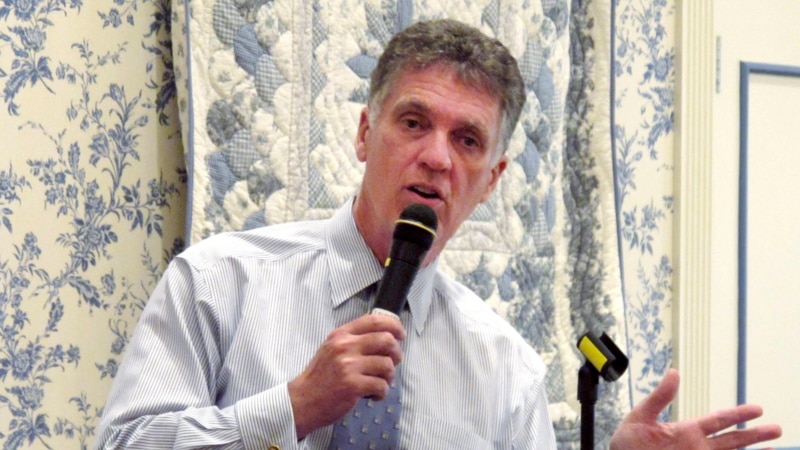
 1d
1dWASHINGTON — The White House has withdrawn the nomination of Dr. David Weldon, a former Florida congressman, to lead the Centers for Disease Control and Prevention. The Senate health committee announced Thursday morning that it was canceling a planned hearing on Weldon's nomination because of the withdrawal. A person familiar with the matter, who spoke on the condition of anonymity to discuss internal deliberations, said the White House pulled the nomination because it became clear Weldon did not have the votes for confirmation. Weldon was considered to be closely aligned with Robert F. Kennedy Jr., the U.S. health secretary who for years has been one of the nation's leading anti-vaccine activists. A former Florida congressman, Weldon also has been a prominent critic of vaccines and the CDC, which promotes vaccines and monitors their safety. Weldon becomes the third Trump administration nominee who didn't make it to a confirmation hearing. Previously, former congressman Matt Gaetz withdrew from consideration for attorney general and Chad Chronister for the Drug Enforcement Administration.
Read MoreArchaeologists find million-year-old fossil of a human ancestor
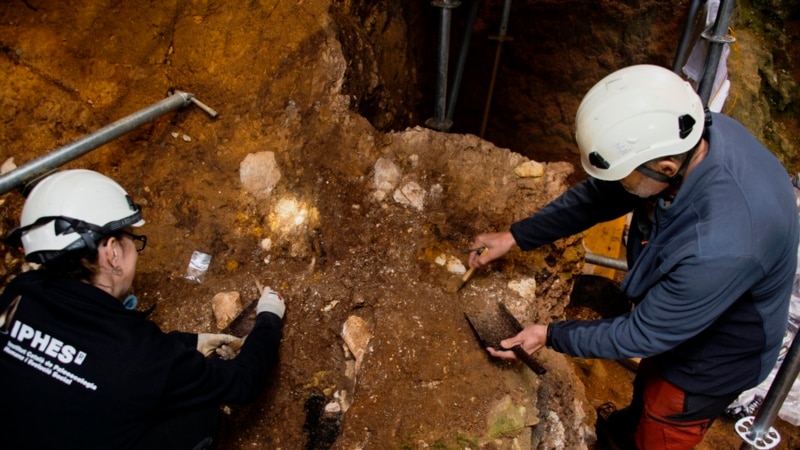
 1d
1dWASHINGTON — A fossil of a partial face from a human ancestor is the oldest in western Europe, archaeologists reported Wednesday. The incomplete skull — a section of the left cheek bone and upper jaw – was found in northern Spain in 2022. The fossil is between 1.1 million and 1.4 million years old, according to research published in the journal Nature. "The fossil is exciting," said Eric Delson, a paleontologist at the American Museum of Natural History, who was not involved in the study. "It's the first time we have significant remains older than 1 million years old in western Europe." A collection of older fossils from early human ancestors was previously found in Georgia, near the crossroads of eastern Europe and Asia. Those are estimated to be 1.8 million years old. The Spanish fossil is the first evidence that clearly shows human ancestors "were taking excursions into Europe" at that time, said Rick Potts, director of the Smithsonian’s Human Origins Program. But there is not yet evidence that the earliest arrivals persisted there long, he said. "They may get to a new location and then die out," said Potts, who had no role in the study. The partial skull bears many similarities to Homo erectus, but there are also some anatomical differences, said study co-author Rosa Huguet, an archaeologist at the Catalan Institute of Human Paleoecology and Social Evolution in Tarragona, Spain. Homo erectus arose around 2 million years ago and moved from Africa to regions of Asia and Europe, with the last individuals dying out around 100,000 years ago, said Potts. It can be challenging to identify which group of early humans a fossil find belongs to if there's only a single fragment versus many bones that show a range of features, said University of Zurich paleoanthropologist Christoph Zollikofer, who was not involved in the study. The same cave complex in Spain's Atapuerca Mountains where the new fossil was found also previously yielded other significant clues to the ancient human past. Researchers working in the region have also found more recent fossils from Neanderthals and early Homo sapiens.
Read MoreNASA's newest space telescope blasts off to map the entire sky and millions of galaxies

 1d
1dNASA’s newest space telescope rocketed into orbit Tuesday to map the entire sky like never before — a sweeping look at hundreds of millions of galaxies and their shared cosmic glow since the beginning of time. SpaceX launched the Spherex observatory from California, putting it on course to fly over Earth’s poles. Tagging along were four suitcase-size satellites to study the sun. Spherex popped off the rocket's upper stage first, drifting into the blackness of space with a blue Earth in the background. The $488 million Spherex mission aims to explain how galaxies formed and evolved over billions of years, and how the universe expanded so fast in its first moments. Closer to home in our own Milky Way galaxy, Spherex will hunt for water and other ingredients of life in the icy clouds between stars where new solar systems emerge. The cone-shaped Spherex — at 500 kilograms, or the heft of a grand piano — will take six months to map the entire sky with its infrared eyes and wide field of view. Four full-sky surveys are planned over two years, as the telescope circles the globe from pole to pole, 650 kilometers up. Spherex won’t see galaxies in exquisite detail like NASA’s larger and more elaborate Hubble and Webb space telescopes, with their narrow fields of view. Instead of counting galaxies or focusing on them, Spherex will observe the total glow produced by the whole lot, including the earliest ones formed in the wake of the universe-creating Big Bang. “This cosmological glow captures all light emitted over cosmic history,” said the mission’s chief scientist Jamie Bock of the California Institute of Technology. “It’s a very different way of looking at the universe,” enabling scientists to see what sources of light may have been missed in the past. By observing the collective glow, scientists hope to tease out the light from the earliest galaxies and learn how they came to be, Bock said. “We won’t see the Big Bang. But we’ll see the aftermath from it and learn about the beginning of the universe that way,” he said. The telescope’s infrared detectors will be able to distinguish 102 colors invisible to the human eye, yielding the most colorful, inclusive map ever made of the cosmos. It's like "looking at the universe through a set of rainbow-colored glasses,” said deputy project manager Beth Fabinsky of NASA’s Jet Propulsion Laboratory. To keep the infrared detectors super cold — minus minus 210 degrees Celsius — Spherex has a unique look. It sports three aluminum-honeycomb cones, one inside the other, to protect from the sun and Earth's heat, resembling a 3-meter shield collar for an ailing dog. Besides the telescope, SpaceX’s Falcon rocket provided a lift from Vandenberg Space Force Base for a quartet of NASA satellites called Punch. From their own separate polar orbit, the satellites will observe the sun’s corona, or outer atmosphere, and the resulting solar wind. The evening launch was delayed two weeks because of rocket and other issues.
Read MoreVOA Creole: MSF reports 150 new cholera cases in Haiti
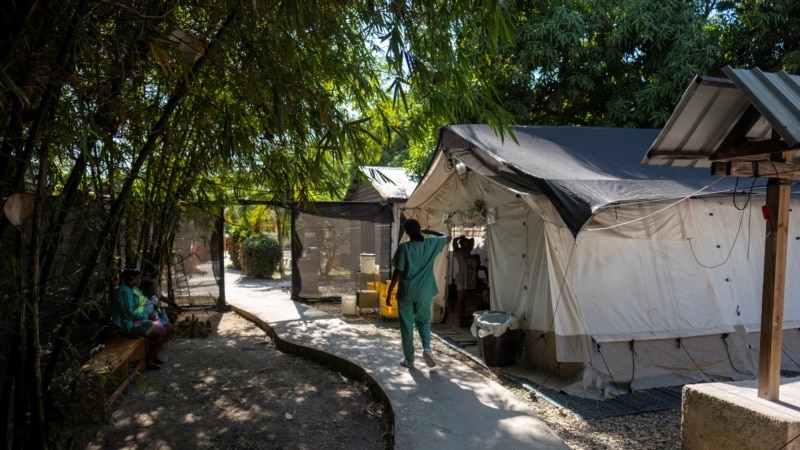
 1d
1dMedecins Sans Frontiere says cholera is on the rise in Haiti. The nongovernmental health organization, also known as Doctors Without Borders, says 150 Haitians were treated for cholera between Feb. 15 and March 6. The Cite Soleil neighborhood reported 19 infections. MSF expressed concern about the trend as Haitians have less access to clean water at a time when gang violence victims are living on the streets in unsanitary conditions. Click here for the full story in Creole.
Read MoreMeasles cases rising in southwestern US as more states report infections

 1d
1dMeasles outbreaks in West Texas and New Mexico are now up to more than 250 cases, and two unvaccinated people have died from measles-related causes. Measles is caused by a highly contagious virus that is airborne and spreads easily when an infected person breathes, sneezes or coughs. It is preventable through vaccines and has been considered eliminated from the U.S. since 2000. Texas state health officials said Tuesday there were 25 new cases of measles since the end of last week, bringing Texas' total to 223. Twenty-nine people in Texas are hospitalized. New Mexico health officials announced three new cases Tuesday, bringing the state's total to 33. The outbreak has spread from Lea County, which neighbors the West Texas communities at the epicenter of the outbreak, to include one case in Eddy County. Oklahoma's state health department reported two probable cases of measles Tuesday, saying they are associated with the West Texas and New Mexico outbreaks. A school-age child died of measles in Texas last month, and New Mexico reported its first measles-related death in an adult last week. Measles cases have been reported in Alaska, California, Georgia, Kentucky, Maryland, New Jersey, New York, Pennsylvania and Rhode Island. The U.S. Centers for Disease Control and Prevention defines an outbreak as three or more related cases — and there have been three clusters that qualified as outbreaks in 2025. In the U.S., cases and outbreaks are generally traced to someone who caught the disease abroad. It can then spread, especially in communities with low vaccination rates. The best way to avoid measles is to get the measles, mumps and rubella (MMR) vaccine. The first shot is recommended for children between 12 and 15 months old and the second between 4 and 6 years old. People at high risk for infection who got the shots many years ago may want to consider getting a booster if they live in an area with an outbreak, said Scott Weaver with the Global Virus Network, an international coalition. Those may include family members living with someone who has measles or those especially vulnerable to respiratory diseases because of underlying medical conditions. Adults with "presumptive evidence of immunity" generally don't need measles shots now, the CDC said. Criteria include written documentation of adequate vaccination earlier in life, lab confirmation of past infection or being born before 1957, when most people were likely to be infected naturally. A doctor can order a lab test called an MMR titer to check your levels of measles antibodies, but health experts don't always recommend this route and insurance coverage can vary. Getting another MMR shot is harmless if there are concerns about waning immunity, the CDC says. People who have documentation of receiving a live measles vaccine in the 1960s don't need to be revaccinated, but people who were immunized before 1968 with an ineffective measles vaccine made from killed virus should be revaccinated with at least one dose, the agency said. That also includes people who don't know which type they got. There's no specific treatment for measles, so doctors generally try to alleviate symptoms, prevent complications and keep patients comfortable.
Read MoreMonarch butterflies wintering in Mexico rebound this year

 1d
1dMEXICO CITY — The number of monarch butterflies wintering in the mountains west of Mexico City rebounded this year, doubling the area they covered in 2024 despite the stresses of climate change and habitat loss, experts said Thursday. The annual butterfly count doesn't calculate the individual number of butterflies, but rather the number of acres they cover as they gather on tree branches in the mountain pine and fir forests. Monarchs from east of the Rocky Mountains in the United States and Canada overwinter there. Mexico's Commission for National Protected Areas (CONANP) said that this year, butterflies covered 1.79 hectares) compared to only 0.9 hectares the year before. Last year's figure represented a 59% drop from 2023, the second lowest level since record keeping began. After wintering in Mexico, the iconic butterflies with black and orange wings fly north, breeding multiple generations along the way for thousands of miles. The offspring that reach southern Canada begin the trip back to Mexico at the end of summer. Gloria Tavera Alonso, the Mexican agency's director general of conservation, said the improved numbers owed to better climatic factors and humidity. Drought along the butterflies' migratory route had been listed as a factor in last year's decline. The impact of changes in weather year after year mean fluctuations are expected. For that, Jorge Rickards, Mexico director general for the World Wildlife Fund, said "you can't let down your guard" and must continue to expand conservation efforts. Tavera Alonso credited ongoing efforts to increase the number of plants the butterflies rely on for sustenance and reproduction along their flyway. Butterflies have not been faring well north of the border. The Xerces Society for Invertebrate Conservation has been counting western overwinter populations of monarch butterflies — a separate population from those that winter in central Mexico — along the California coast, northern Baja California and inland sites in California and Arizona for the last 28 years. The highest number recorded was 1.2 million in 1997. The organization announced in February that it counted just 9,119 monarchs in 2024, a decrease of 96% from 233,394 in 2023. The total was the second-lowest since the survey began in 1997. And the first countrywide systematic analysis of butterfly abundance in the United States found that the number of butterflies in the Lower 48 states has been falling on average 1.3% a year since the turn of the century, with 114 species showing significant declines and only nine increasing, according to a study in Thursday's journal Science. Experts say that monarchs face risks across North America in large part due to the reduction in milkweed where the monarchs lay their eggs. The plant has been disappearing due to drought, wildfires, herbicides and urbanization. In December, the U.S. Fish and Wildlife Service proposed that monarch butterflies receive protection as a threatened species under the Endangered Species Act.
Read MoreUS researchers and doctors rally for science against Trump cuts

 1d
1dWASHINGTON — Giving a new meaning to the phrase mad scientists, angry researchers, doctors, their patients and supporters ventured out of labs, hospitals and offices Friday to fight against what they call a blitz on life-saving science by the Trump administration. In the nation's capital, a couple thousand gathered at the Stand Up for Science rally. Organizers said similar rallies were planned in more than 30 U.S. cities. Politicians, scientists, musicians, doctors and their patients made the case that firings, budget and grant cuts in health, climate, science and other research government agencies in the Trump administration's first 47 days in office are endangering not just the future but the present. "This is the most challenging moment I can recall," University of Pennsylvania climate scientist Michael Mann told the crowd full of signs belittling the intelligence of President Donald Trump, his cost-cutting aide Elon Musk and Health and Human Services Secretary Robert F. Kennedy Jr. "Science is under siege." Astronomer Phil Plait told a booing crowd, "We're looking at the most aggressively anti-science government the United States has ever had." Rally co-organizer Colette Delawalla, a doctoral student in clinical psychology, said, "We're not just going to stand here and take it." Science communicator, entertainer and one-time engineer Bill Nye the Science Guy challenged the forces in government that want to cut and censor science. "What are you afraid of?" he said. U.S. Senator Chris Van Hollen challenged the crowd, some in white lab coats if only for show, to live up to the mad scientist moniker: "Everybody in America should be mad about what we are witnessing." The crowd was. Signs read "Edit Elon out of USA's DNA," "Delete DOGE not data," "the only good evidence against evolution is the existence of Trump" and "ticked off epidemiologist." Health and science advances are happening faster than ever, making this a key moment in making people's lives better, said former National Institutes of Health Director Francis Collins, who helped map the human genome. The funding cuts put at risk progress on Alzheimer's disease, diabetes and cancer, he said. "It's a very bad time with all the promise and momentum," said Collins. "I'm very worried about my country right now," Collins said before breaking out into an original song on his guitar. Emily Whitehead, the first patient to get a certain new type of treatment for a rare cancer, told the crowd that at age 5 she was sent hospice to die, but CAR T-cell therapy "taught my immune system to beat cancer" and she's been disease free for nearly 13 years. "I stand up for science because science saved my life," Whitehead said. Friday's rally in Washington was at the Lincoln Memorial, in the shadow of a statue of the president who created the nearby National Academy of Sciences in 1863. From 11 million kilometers away from Earth, NASA proved science could divert potentially planet-killing asteroids, former NASA Administrator Bill Nelson said. On his space shuttle flight nearly 40 years ago, he looked down to Earth and had a "sense of awe that you want to be a better steward of what we've been given," he said. The rallies were organized mostly by graduate students and early career scientists. Dozens of other protests were also planned around the world, including more than 30 in France, Delawalla said. Protesters gathered around City Hall in Philadelphia, home to prestigious, internationally recognized health care institutions and where 1 in 6 doctors in the U.S. has received medical training. "As a doctor, I'm standing up for all of my transgender, nonbinary patients who are also being targeted," said Cedric Bien-Gund, an infectious disease doctor at the University of Pennsylvania. "There's been a lot of fear and silencing, both among our patients and among all our staff. And it's really disheartening to see."
Read MoreCholera killed nearly 100 in Sudan over 2 weeks, aid group says
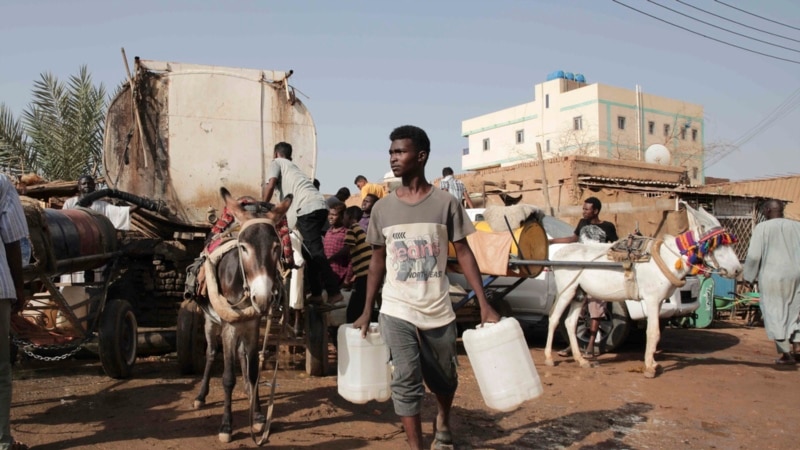
 1d
1dCAIRO — Nearly 100 people died of cholera in two weeks since the waterborne disease outbreak began in Sudan's White Nile State, an international aid group said. Doctors Without Borders — also known as Medecins Sans Frontieres, or MSF — said Thursday that 2,700 people have contracted the disease since Feb. 20, including 92 people who died. Of the cholera patients who died, 18 were children, including five no older than 5 and five others no older than 9, Marta Cazorla, MSF emergency coordinator for Sudan, told The Associated Press. Sudan plunged into war nearly two years ago when tensions simmered between the Sudanese army and its rival paramilitary Rapid Support Forces group, or RSF, with battles in Khartoum and elsewhere across the country. RSF launched intense attacks last month in the White Nile State, killing hundreds of civilians, including infants. The Sudanese military announced at the time that it made advances there, cutting crucial supply routes to RSF. During the RSF attacks in the state on Feb. 16, the group fired a projectile that hit the Rabak power plant, causing a mass power outage and triggering the latest wave of cholera, according to MSF. Subsequently, people in the area had to rely mainly on water obtained from donkey carts because water pumps were no longer operational. "Attacks on critical infrastructure have long-term detrimental effects on the health of vulnerable communities," Cazorla said. The cholera outbreak in the state peaked between Feb. 20 and 24, when patients and their families rushed to Kosti Teaching Hospital, overwhelming the facility beyond its capacity, according to MSF. Most patients were severely dehydrated. MSF provided 25 tons of logistical items such as beds and tents to Kosti to help absorb more cholera patients. Cazorla said that numbers in the cholera treatment center had been declining and were at low levels until this latest outbreak. The White Nile State Health Ministry responded to the outbreak by providing the community access to clean water and banning the use of donkey carts to transport water. Health officials also administered a vaccination campaign when the outbreak began. Sudan's health ministry said Tuesday that there were 57,135 cholera cases, including 1,506 deaths, across 12 of the 18 states in Sudan. The cholera outbreak was officially declared on Aug. 12 by the health ministry after a new wave of cases was reported starting July 22. The war in Sudan has killed at least 20,000 people, though the number is likely far higher. The war has driven more than 14 million people from their homes, pushed parts of the country into famine and caused disease outbreaks.
Read MoreMore than 200 measles cases reported in Texas, New Mexico

 1d
1dA historic measles outbreak in West Texas is just short of 200 cases, Texas state health officials said Friday, while the number of cases in the neighboring state of New Mexico tripled to 30. Most of the cases across both states are in people younger than 18 and those who are unvaccinated or have an unknown vaccination status. Texas health officials identified 39 new infections of the highly contagious disease, bringing the total count in the West Texas outbreak to 198 people since it began in late January. Twenty-three people have been hospitalized so far. Last week, a school-age child died of measles in Texas, the nation's first measles death in a decade. The U.S. Centers for Disease Control and Prevention announced this week that it was sending a team to Texas to help local public health officials respond to the outbreak. New Mexico health officials had been reporting for weeks a steady number of cases in Lea County — which borders the epicenter of Texas' outbreak. But on Friday, state health officials provided The Associated Press a week-by-week count that showed cases had steadily increased from 14 in the week of Feb. 9 to 30 this week. A spokesperson for the health department said more cases were expected and that many of the cases reported Friday weren't identified until after people's illnesses had run their course. The department has said it hasn't been able to prove a clear connection to the Texas outbreak, though on Feb. 14 it said a link was "suspected." On Thursday, New Mexico health officials confirmed an unvaccinated adult who died without seeking medical care had tested positive for measles. The state medical investigator has not announced the official cause of death, but the state health department said Friday it was "measles-related." The CDC said Friday that it had also confirmed measles cases in Alaska, California, Florida, Georgia, Kentucky, New Jersey, New York City, Pennsylvania, Rhode Island and Washington. But the Texas and New Mexico outbreaks make up for most of the nation's case count. The rise in measles cases has been a major test for U.S. Health and Human Services Secretary Robert F. Kennedy Jr., an anti-vaccine activist who has questioned the safety of childhood vaccines. Recently, he has stopped short of recommending people get the vaccine, and has promoted unproven treatments for the virus, such as cod liver oil. Kennedy dismissed the Texas outbreak as "not unusual," though most local doctors in the West Texas region told The Associated Press that they had never seen a case of measles in their careers until this outbreak. The measles, mumps and rubella vaccine is safe and highly effective at preventing infection and severe cases. The first shot is recommended for children ages 12 to 15 months, and the second for ages 4 to 6 years. Childhood vaccination rates across the country have declined as an increasing number of parents seek exemptions from public school requirements for personal or religious reasons. In Gaines County, Texas, which has most of the cases, the kindergarten measles vaccination rate is 82% — far below the 95% needed to prevent outbreaks. Many of Gaines County's cases are in the county's "close-knit, undervaccinated" Mennonite community, a diverse group that has historically had lower vaccination rates and whose members can be distrusting of government mandates and intervention. Measles is a respiratory virus that can survive in the air for up to two hours. Up to nine out of 10 people who are susceptible will get the virus if exposed, according to the CDC. Owing to the success of the vaccine, the U.S. considered measles eliminated in 2000.
Read MoreSpaceX's latest Starship test flight again ends in explosion

 1d
1dNearly two months after an explosion sent flaming debris raining down on the Turks and Caicos, SpaceX launched another mammoth Starship rocket on Thursday, but lost contact minutes into the test flight as the spacecraft came tumbling down and broke apart. This time, wreckage from the explosion was seen streaming from the skies over Florida. It was not immediately known whether the spacecraft's self-destruct system had kicked in to blow it up. The 123-meter rocket blasted off from Texas. SpaceX caught the first-stage booster back at the pad with giant mechanical arms, but engines on the spacecraft on top started shutting down as it streaked eastward for what was supposed to be a controlled entry over the Indian Ocean, half a world away. Contact was lost as the spacecraft went into an out-of-control spin. Starship reached nearly 150 kilometers in altitude before trouble struck and before four mock satellites could be deployed. It was not immediately clear where it came down, but images of flaming debris were captured from Florida, including near Cape Canaveral, and posted online. "Unfortunately, this happened last time too, so we have some practice at this now," SpaceX flight commentator Dan Huot said from the launch site. SpaceX later confirmed that the spacecraft experienced "a rapid unscheduled disassembly" during the ascent engine firing. "Our team immediately began coordination with safety officials to implement pre-planned contingency responses," the company said in a statement posted online. Starship didn't make it quite as high or as far as last time. NASA has booked Starship to land its astronauts on the moon later this decade. SpaceX's Elon Musk is aiming for Mars with Starship, the world's biggest and most powerful rocket. Like last time, Starship had mock satellites to release once the craft reached space on this eighth test flight as a practice for future missions. They resembled SpaceX's Starlink internet satellites, thousands of which orbit Earth, and were meant to fall back down following their brief taste of space. During the last demo, SpaceX captured the booster at the launch pad, but the spacecraft blew up several minutes later over the Atlantic. No injuries or major damage were reported. According to an investigation that remains ongoing, leaking fuel triggered a series of fires that shut down the spacecraft's engines. The on-board self-destruct system kicked in as planned. SpaceX said it made several improvements to the spacecraft following the accident, and the Federal Aviation Administration recently cleared Starship once more for launch.
Read MoreUnvaccinated New Mexico adult tests positive for measles after death

 1d
1dA New Mexico resident who has died, tested positive for measles, the state health department said on Thursday, marking the second measles-related death in the United States in more than a decade. The unvaccinated adult patient did not seek medical care before death and was the first measles-related death in the state in more than 40 years, according to David Morgan, Public Information Officer for the New Mexico Department of Health. The cause of death is still under investigation by the state medical examiner, Morgan said. The death brings to 10 the number of measles cases that occurred in Lea County, located adjacent to Gaines County, Texas, where more than 100 cases and one death in an unvaccinated child have been reported. The outbreak, one of the largest the United States has seen in the past decade, has put U.S. Health Secretary Robert F. Kennedy Jr, a longtime vaccine skeptic, to the test. In a Cabinet meeting last week, Kennedy initially downplayed news that a school-aged child had died of measles, calling such outbreaks ordinary and failing to mention the role of vaccination to prevent measles. Over the weekend, Kennedy published an opinion piece on Fox News that promoted the role of vaccination, but downplayed the role of vaccines by telling parents vaccination was a personal choice and urging them to consult with their physician. He also stressed the role of vitamin A, overstating evidence for its use, which has only been shown to decrease measles severity in developing countries among individuals who are malnourished and vitamin A deficient, said Dr. Paul Offit, an infectious diseases expert at Children’s Hospital of Philadelphia. "It's not clear to me that's true in the developed world, where vitamin A malnutrition is uncommon," he said. As of Feb. 27, 164 measles cases have been reported to the U.S. Centers for Disease Control and Prevention in nine jurisdictions: Alaska, California, Georgia, Kentucky, New Jersey, New Mexico, New York City, Rhode Island, and Texas. Measles typically kills one to three people per 1,000 cases, said Dr. Tina Tan, an infectious disease expert at Northwestern University in Chicago. She said two deaths out of a total of 164 cases suggest "a much higher mortality rate than we would normally see," adding that there are probably many undetected cases. The cases in New Mexico included six adults and four children under the age of 17. Seven of these cases were unvaccinated, while the vaccination history of the remaining three was not yet known. The Department of Health and Human Services spokesperson Andrew Nixon said the Centers for Disease Control and Prevention is closely monitoring the situation and in communication with state health authorities. "CDC recommends vaccination as the best protection against measles infections," he said. New Mexico's health department said it will host two community vaccination clinics on March 11.
Read MoreSome US cuts to global health programs reversed, groups say
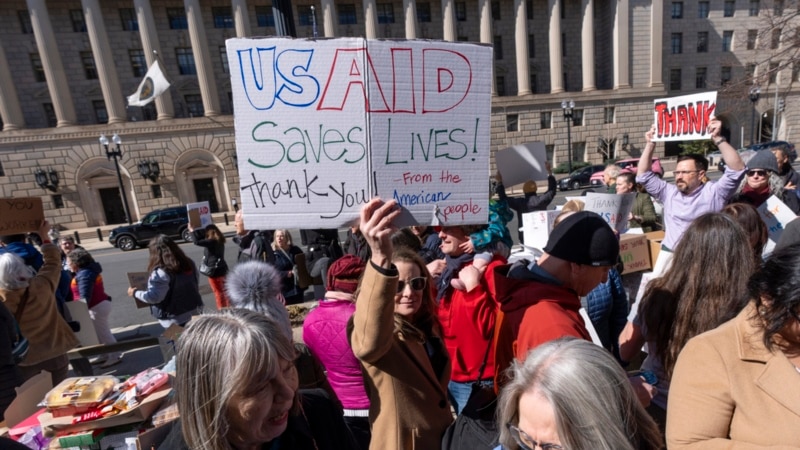
 1d
1dSome global health projects whose U.S.-funded contracts were suddenly canceled last week have received letters reversing those decisions, according to media reports. The reversal came after the Trump administration ended about 90% of contracts funded by the U.S. Agency for International Development and the U.S. State Department. Democratic lawmakers, along with some Republicans and rights groups, have sharply criticized administration efforts to shut down federally funded humanitarian efforts around the world. Michael Adekunle Charles, chief executive of the RBM Partnership to End Malaria, said his organization’s letter reversing the cutoff of its funds arrived late Wednesday. “I think it’s good news. We need to wait in the coming days to get additional guidance,” he told Reuters. “Our priority is saving lives, so the earlier we can get started to continue saving lives, the better.” Other programs that receive some U.S. funding to respond to tuberculosis and HIV/AIDS also had their cuts reversed. Still, uncertainty remains. "It sounds good, but we cannot draw down money,” Dr. Lucica Ditiu, executive director of Stop TB Partnership, told Reuters. “We have no clarity.” A U.S. State Department spokesperson said the Trump administration had been working to review every dollar spent “to ensure taxpayer resources are being used to make America safer, stronger and more prosperous.” Trump ordered a 90-day pause on all U.S. foreign aid on his first day back in the White House. Subsequent stop-work orders have drawn USAID operations around the world to a standstill. Most USAID staff have also been placed on leave or fired. On Wednesday, the U.S. Supreme Court upheld a lower court’s emergency order for the administration to quickly release funding to contractors and recipients of grants from USAID and the State Department. The funding would cover nearly $2 billion for work already performed by the organizations. Meanwhile, contractors and grant recipients suing the government are asking U.S. District Judge Amir Ali to set a new Monday deadline to release much of the funding for their completed work. The deadline would not apply to the entire $2 billion. The contractors and grant recipients are also asking for the restoration of most of the foreign aid contracts and grants, which the Trump administration ended last month, while the lawsuit continues. The administration said that “all legitimate payments” owed to the plaintiffs would be made “within days,” and not more than 10 days, but that foreign payments to other parties not in the lawsuit could take much longer. Some plaintiffs say that if they are not paid immediately, they are in danger of shuttering. Some information for this report came from Reuters and The Associated Press.
Read MoreAriane 6 rocket roars skyward carrying French military satellite

 1d
1dPARIS — An Ariane 6 rocket roared skyward with a French military reconnaissance satellite aboard Thursday in the first commercial flight for the European heavy-lift launcher. The rocket took off smoothly from the European spaceport in Kourou, French Guiana, quickly disappearing into thick clouds. Video images beamed back from the rocket showed the Earth's beautiful colors and curvature. The rocket's mission was to deliver the CSO-3 military observation satellite into orbit at an altitude of around 800 kilometers. It was the first commercial mission for Ariane 6 after its maiden flight in July 2024.
Read MoreCanada reports increase in measles cases, urges vaccination

 1d
1dCanada is seeing a noticeable increase in measles cases this year, with more reported in the first two months of 2025 than all of last year, the country's health agency said on Thursday and urged citizens to get vaccinated. The Public Health Agency of Canada said it has recorded 227 measles cases as of March 6, with many patients requiring hospitalization. "I strongly urge all Canadians to ensure they are vaccinated against measles," said Theresa Tam, Canada's Chief Public Health Officer. The agency said most of the patients are unvaccinated or under-vaccinated children exposed in community settings such as social events, day cares, schools and health care facilities. Cases can also arise when unvaccinated individuals travel to or from regions where measles is prevalent. "As we move through spring break travel season, I am concerned that the global rise in measles cases, combined with declining vaccination rates among school-aged children in Canada, could lead to more illness and more community transmission," Tam said. Canada reported a total of 146 measles cases last year, according to government data. In the week ending Feb. 15, there were 96 confirmed cases of measles, a serious airborne disease caused by a virus that can lead to severe complications and even death. The surge is linked to outbreaks of the disease in New Brunswick, Ontario, Quebec and Manitoba, the agency said. The agency noted that recent cases in Ontario, Quebec and British Columbia occurred after travelers were exposed to measles in other countries, and urged individuals to get vaccinated before traveling. If needed, the vaccine should be administered at least two weeks before departure, but even last-minute vaccinations offer protection, the agency said. Last week, an unvaccinated child died of measles in Texas, the center of one of the largest outbreaks of the disease that the United States has seen in the past decade.
Read MoreFlorida's gentle giants: Manatees fight for survival

 1d
1dCollisions with boats are the cause of at least 20% of manatee deaths in Florida every year. But as Valdya Baraputri reports, that’s not the only threat faced by these gentle giants of the sea. Camera: Laurentius Wahyudi and Nabila Ganinda
Read MoreRussian foreign minister exaggerates Russia-China relations, ignores nuances

 1d
1dRelations between Russia and China are indeed closer than at any point since the 1950s, but they are shaped more by pragmatism, economic necessity and shared opposition to Western influence than by deep trust or historical affinity.
Read MoreChina misleads on involvement in Panama Canal

 1d
1dChina’s Foreign Ministry says China is committed to Panama Canal neutrality and has never interfered in its operation. VOA’s Leonid Martynyuk explains why this is misleading.
Read MoreForeign bloggers help China spread propaganda, analysis finds

 1d
1dForeign bloggers who praise China rapidly gain popularity and millions of followers on Chinese social media platforms. VOA examined the facts and spoke with experts to shed light on the government’s efforts behind the phenomenon. "It is a long-standing tradition of the Chinese Communist Party to use foreigners to voice its propaganda for added credibility," said Mareike Ohlberg, a senior fellow at the German Marshall Fund. Foreign influencers cooperate with the Chinese government, the media and third parties to create and boost content that supports government narratives, Ohlberg said. One of the most common topics that foreign influencers focus on is whitewashing human rights abuses in Xinjiang. The U.N. Human Rights Office and groups like Amnesty International estimate that more than 1 million people – mostly Uyghurs – have been confined in internment camps in Xinjiang. One of the most recent and maybe most popular foreign characters in China is a French national, Marcus Detrez, who became a media sensation in 2024. Japanese occupation photos Last year, Detrez posted a series of historic photographs on the Chinese social media platform Douyin that depicted life under the Japanese occupation in the early 20th century. He claimed the images were taken by his grandfather and said he wanted to donate them to China. Detrez enjoyed a few months of celebrity treatment from Chinese authorities, including touring across China, while state media outlets profiled him as a hero. In February, however, historians exposed Detrez as a fraud. The photographs he claimed were unique family heirlooms turned out to be publicly available online in various museums around the world. But the thread of glorified foreign bloggers started much earlier. One of the pioneers on Chinese social media is a Russian internet celebrity, Vladislav Kokolevskiy, known in China as Fulafu. He amassed 12.89 million followers on Douyin, where he posts short video clips praising life in China. In November 2023, the Australian Strategic Policy Institute wrote that in China, Fulafu has “become a household name through his ostentatious displays of affection for China,” identifying him as a Chinese government propagandist. Kokolevskiy does not make commercial ad disclaimers. However, CMGM, an outlet covering China news, reported in January 2021 that he received advertisement contracts within 15 days for NetEase's "Heavenly Oracle" mobile game and online retailers Pinduoduo and Tmall. The companies paid about $11,000 for each ad, bringing Fulafu's advertising revenue up to about $33,000 for January 2021 alone, according to the report. Like Fulafu, dozens of foreigners grew to stardom on the Chinese internet during the last decade, Ohlberg said. Among them is Gerald Kowal, known also as Jerry Guo, an American who has risen to popularity in China after an interview with state-owned CCTV in 2020. At the time, Kowal had been posting series of short videos critical of New York City authorities’ handling of the COVID-19 pandemic. He also repeated debunked conspiracy theories, claiming, for example, that the U.S. military brought the coronavirus to China. CCTV broadcasted his interview from New York live. The China Newsweek magazine profiled Kowal in May 2020 as “one of the most influential internet celebrities,” calling him a “war correspondent” for his videos from pandemic-stricken New York. Third-party promoters The success of a large number of foreign influencers is closely tied to multichannel networks or MCNs, which are third-party organizations that promote the growth of certain content creators, operating behind the scenes. One of the MCN industry leaders is YChina, founded in 2016 by Israeli businessman Amir Gal-Or and his Chinese partner and former classmate, Fang Yedun, as part of Gal-Or's “Crooked Nuts Research Institute,” which focuses on documenting the lives of foreigners in China. YChina started with the cross-platform sharing of short video interviews with Western expats living in China. It initially focused on cultural topics and soon accumulated more than 100 million followers among its internet influencers from over 30 countries, including Israel, the United States, Australia, Spain, Argentina, Japan and Thailand. Chinese democracy activists in exile have accused YChina of supporting Chinese government propaganda about Xinjiang and Hong Kong. In July 2024, the China Public Diplomacy Association, which is under the supervision of China's Ministry of Foreign Affairs, gathered more than 30 foreign influencers from 25 countries to participate in a training camp and visit various cities in China. The bloggers were asked to record their experiences on video and share them online. China’s state-controlled media outlets boost such bloggers, presenting them to domestic audiences within the narrative of a prosperous nation under the Communist Party. For example, the Xinhua News Agency's series in 2024 on foreign internet celebrities in China showed videos of influencers from all over the world walking the streets of China's major cities praising their “cleanest streets in the world" and "efficient garbage disposal system." In using these foreign bloggers, the Chinese Communist Party wants to show that life in China is not what rights groups and China’s critics abroad say it is. The government exploits the idea that unless “you come and see, you have no right to judge,” the German Marshall Fund’s Ohlberg said. The core of this idea is “very hypocritical,” Ohlberg added, because “the Communist Party allows these people to go only where it wants them to go and see only what it wants them to see. And if you're critical, you certainly won't get the opportunity to go on a field trip.”
Read MoreRussia’s Kiselyov misleads on European military capacities

 1d
1dDmitry Kiselyov, CEO of the Russia state-owned media group MIA Rossiya Segodnya, mocked Europe's military capacity and questioned its ability to increase aid to Ukraine. VOA’s Leonid Martynyuk explains why that is false and misleading.
Read MoreAttacks, Ugandan troops undermine South Sudan minister’s assurance of calm
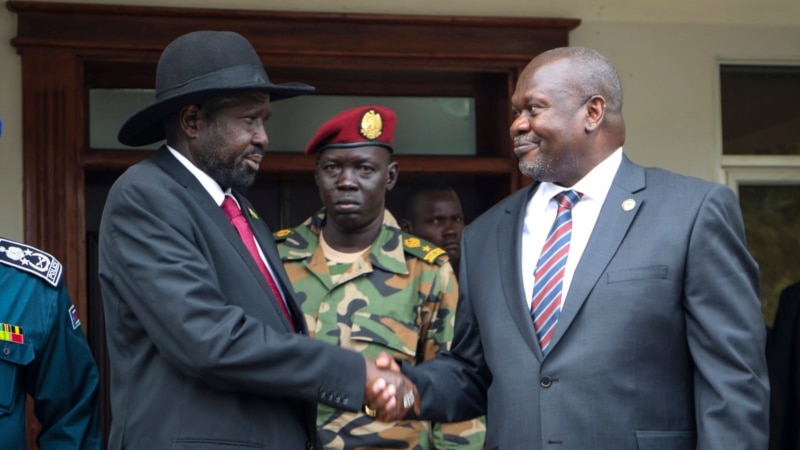
 1d
1dThe situation in South Sudan is fragile and getting worse, with growing political and military instability. The claims made by the information minister do not reflect the reality on the ground.
Read MoreChina misleads on involvement in Panama Canal
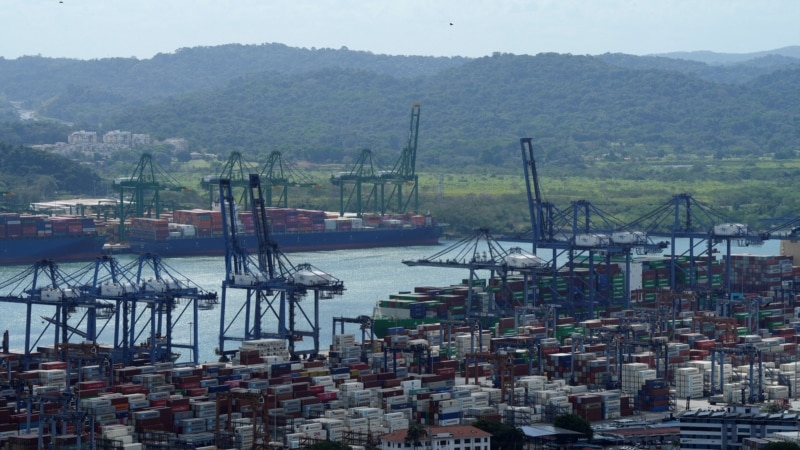
 1d
1dThrough the Chinese government's Belt and Road Initiative, Chinese companies acquired or built major port facilities in 129 strategic locations, including the Panama Canal. While Beijing claims neutrality, critics argue that China may have geopolitical motives, such as increasing influence over global chokepoints.
Read MoreSudan’s accusations of Kenya siding with RSF are likely true

 1d
1dAnalysts argue that Kenya’s hosting of the Sudanese Rapid Support Forces and the M23 militias in the Democratic Republic of Congo undermine its regional and international standing.
Read MoreChina falsely frames elections in Tajikistan as democratic, inclusive
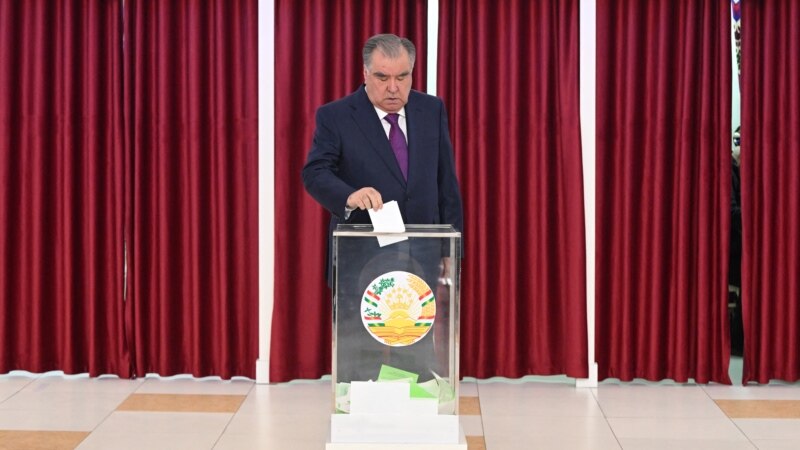
 1d
1dNeither Western monitors, nor media, were allowed to observe a poll characterized by the lack of genuine opposition in a deeply authoritarian state.
Read MoreFalse: With Russian support, CAR made strides in combating militants

 1d
1dA Russian diplomat claims the Central African Republic significantly succeeded in combating militants with Moscow's support. VOA’s Purity Mwambia explains why that is false.
Read MoreRussia’s Kiselyov misleads on European military capacities

 1d
1dEuropean nations’ militaries are superior to Russia in key areas, including capability of rapid production increases and technological advancement.
Read MoreFalse: With Russia's support, CAR significantly succeeded in combating militants

 1d
1dFourteen militia groups control two-thirds of the Central African Republic (C.A.R.) and parts of the capital city, Bangui. Russian military involvement has been stained with gross human rights violations, corruption and appropriation of natural resources.
Read MorePutin baselessly offers Ukraine’s rare earth minerals as Russian commodity
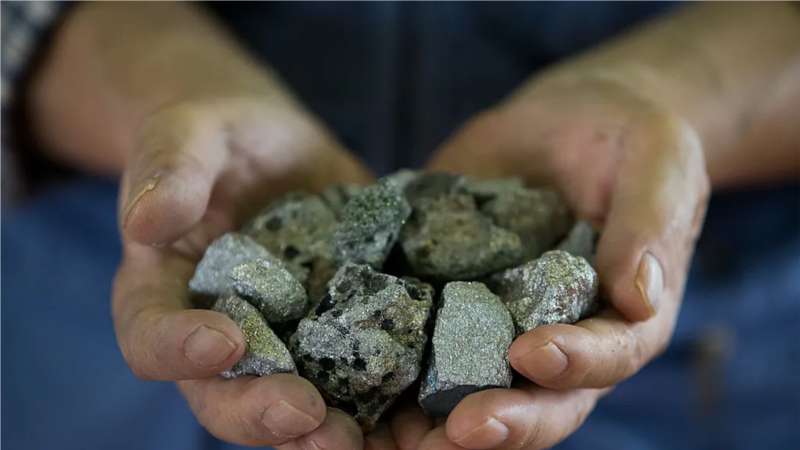
 1d
1dRussian President Vladimir Putin claims the territories of eastern Ukraine occupied by his forces were previously part of the Russian Federation. VOA’s Leonid Martynyuk explains why that is false.
Read MoreChina uses DeepSeek, other AI models, for surveillance and information attacks on US

 1d
1dThe United States may become the second country after Australia to ban China’s DeepSeek artificial intelligence on government devices. U.S. Representatives Josh Gottheimer and Darin LaHood introduced a bipartisan bill proposing the ban. In their letter to 47 U.S. governors and the mayor of Washington, the congressmen warned that DeepSeek could pose security risks to sensitive government data and cybersecurity and Americans’ privacy, NBC News reported on March 3. China denies the allegations. However, concerns highlighted by the U.S. lawmakers and state officials are not without merit, experts say. The Chinese government has reportedly also used AI models for mass surveillance, including the collection of biometric data and social media listening operations that report to China's security services and the military, as well as for information attacks on U.S. and Chinese dissidents abroad. At least three leading Chinese surveillance and security companies — TopSec, QAX and NetEase — announced the integration of DeepSeek to enhance their services. TopSec and QAX provide services directly to the Chinese government, and NetEase made it clear that DeepSeek will improve their cyber censorship and surveillance capabilities. Over the past decade, the Chinese government has been investing heavily in AI-driven biometric data capturing, face recognition and surveillance technologies such as "smart cities," the Skynet project, and the Sharpe Eyes program, which can monitor all aspects of an individual's public life, Wenhao Ma of VOA’s China Division reported. In January, Canadian cybersecurity firm Feroot Security uncovered a code imbedded in DeepSeek’s login processes that shares user information with Chinese state-owned communication company China Mobile, AP reported. The Associated Press described the code as a “heavily obfuscated computer script that when deciphered shows connections to computer infrastructure owned by China Mobile.” The U.S. banned China Mobile in 2019 following intelligence reports that it serves as the Chinese military’s spy arm. China-based actors have been using ChatGPT along with DeepSeek models to generate phishing email and disinformation attacks on the U.S. “on behalf of unspecified clients in China,” OpenAI said in its February report. OpenAI identified and blocked a cluster of China-originated accounts involved in malicious activities, such as Qianyue Overseas Public Opinion AI Assistant, reportedly designed to ingest and analyze posts and comments related to Chinese politics and human rights from platforms such as X, Facebook, YouTube, Instagram, Telegram and Reddit. The purpose of the operation was reportedly "to feed the resulting insights to the Chinese authorities" such as "Chinese embassies abroad, and to intelligence agents monitoring protests in countries including the United States, Germany and the United Kingdom,” OpenAI said. A set of ChatGPT accounts that OpenAI banned in February had been involved in Chinese influence operations focused on generating short comments in English and long-form Spanish-language articles critical of the United States published in local and national media outlets across Latin America and Spain. One of the Chinese companies planting the articles in the Spanish-language outlets was Jilin Yousen Culture Communication Co., a subsidiary of the government-tied Beijing United Publishing House. VOA reviewed nine of the Chinese AI-generated articles published in Spanish-language media between October and November 2024 as identified by OpenAI. Two — in Mexico’s El Universal and Peru’s El Popular — criticized the United States' use of sanctions targeting foreign governments and individuals. The El Universal op-ed described the U.S. sanctions on Iran’s oil industry for Tehran’s backing of terrorist groups Hamas and Hezbollah as exposing the U.S.' “impotence” in dealing with global politics and the “rapid decline” of its “moral standing.” Similarly, El Popular painted U.S. sanctions on a Hamas affiliate as “insane” and an “attack on the rights of Palestinian people.” An article in Peru’s La Republica presented the U.S. as the biggest beneficiary of the Russian war in Ukraine, replicating the Kremlin’s key narrative. It criticized the U.S. for providing military aid to Kyiv, framing the American support as an escalation of the war. China, however, has been a key provider of military technologies and weapons to Russia, which Moscow uses in daily attacks on Ukrainian civilians. Another China-planted piece in La Republica described U.S. President Donald Trump’s tariff policy as “undermining U.S. global leadership position.” Three pieces in Peru’s Wapa, El Popular and El Plural exploited the issues of homelessness, child nutrition and crime in the U.S. — all presented as extremely acute and dangerous. For example, the child nutrition piece claimed that most children in the U.S. “go hungry on weekends and holidays” due to the government’s neglect of children’s food security. While the topics of these articles vary from human rights and social issues in the U.S. to foreign and domestic politics, they all paint a picture of a dysfunctional state with failing moral values and declining international influence, matching Beijing’s standard narrative.
Read MoreAustralian senator misleads over women's rights in Iran
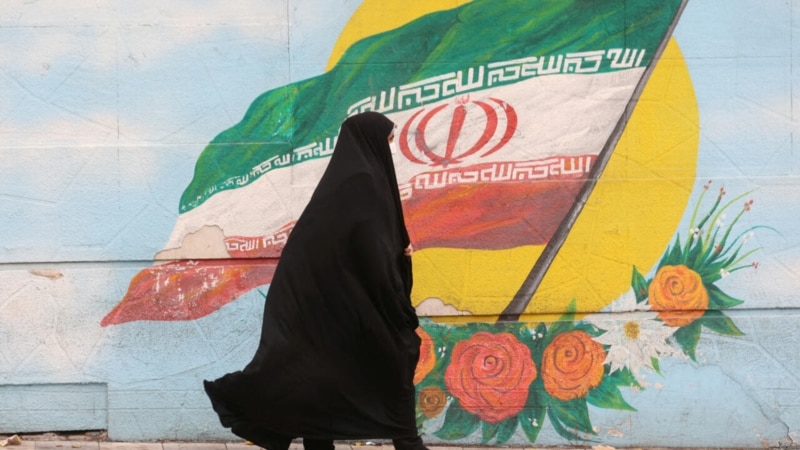
 1d
1dAustralian Senator Fatima Payman told Iran's state-run Press TV that women’s democratic participation and right to work are protected in Iran. VOA’s William Echols explains how that is misleading.
Read MoreX influencer misleads on DRC offer of rare minerals to US, EU
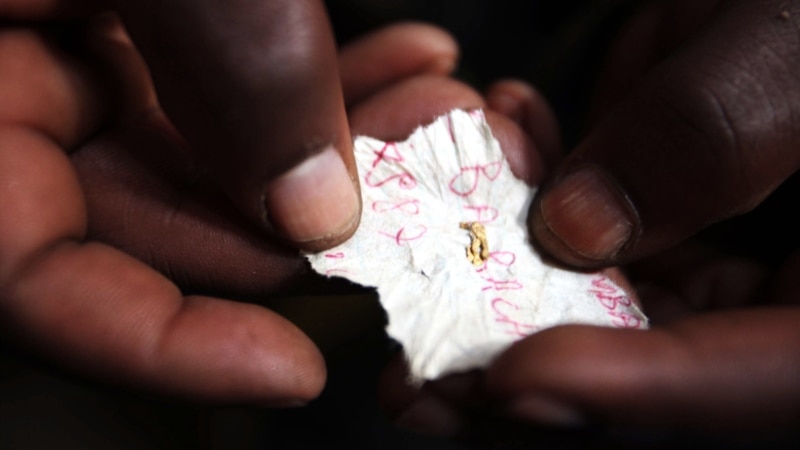
 1d
1dTshisekedi's government invited the U.S. and EU to purchase minerals directly from the DRC, bypassing Rwanda-backed M23 fighters. There was no request for U.S. troops to intervene in the conflict.
Read MorePutin baselessly offers Ukraine’s rare earth minerals as Russian commodity
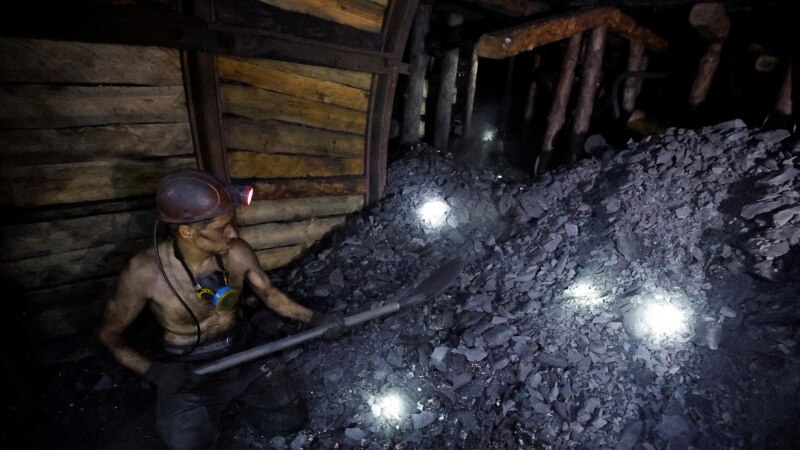
 1d
1dRussia signed at least five treaties guaranteeing Ukraine’s sovereignty and territorial integrity. Russian annexation of Ukrainian regions violates these agreements. It is also illegal under international law, which recognizes these territories as belonging to Ukraine.
Read MoreFalse: Rwanda denies involvement in DRC war

 1d
1dRwanda denies involvement in attacking the Democratic Republic of Congo. VOA’s Purity Mwambia explains why this is false.
Read MoreAustralian senator misleads over women's rights in Iran
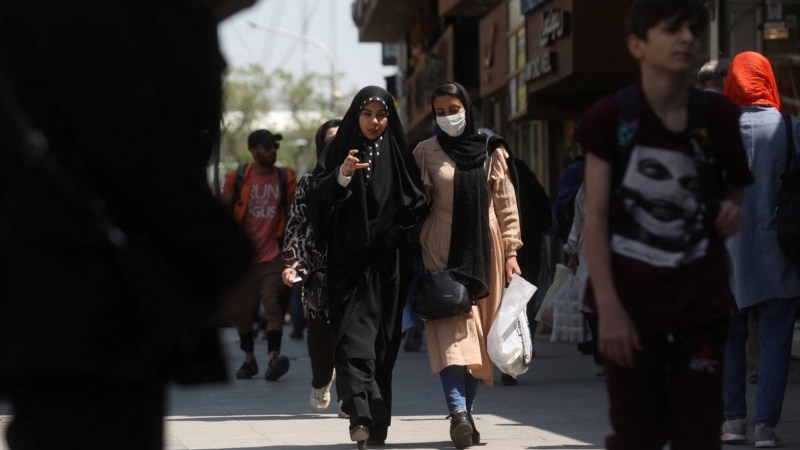
 1d
1dIran imposes severe restrictions on women's ability to speak and assemble freely, alongside broader limitations on civic and political rights.
Read MoreKremlin disinformation campaigns aim to discredit French military in Sahel, analysts say

 1d
1dOn Feb. 20, Ivory Coast became the latest African nation to expel French troops, taking control of the last remaining French military base in the country. This followed the departure of French forces from Chad, which had hosted them for nearly 70 years. These moves marked the end of France's military presence in the Sahel region, after the expulsions from Mali, Burkina Faso and Niger, all ruled by military juntas. Chadian President Mahamat Idriss Deby called the French withdrawal a "new dawn for a fully sovereign Chad." Nigerian Senator Shehu Sani, with 3.3 million followers on X, claimed, "The French forces are of no use," contradicting the statistical data. Since France began withdrawing in 2022, conflict-related fatalities in the Sahel have risen by 65%, according to the Armed Conflict Location and Event Data Project (ACLED). Analysts point to Russian propaganda and disinformation campaigns as key drivers of the shift away from France in the Sahel. Bakary Sambe of the Timbuktu Institute told VOA that Russia has exploited anti-imperialist sentiment and historical colonial grievances to turn public opinion in Africa against France. The military leaders of Niger, Mali and Burkina Faso, after expelling French forces, have increasingly aligned with Russia, which has deployed Wagner mercenaries across the region. Human rights groups have accused Russian troops in Africa of committing abuses against civilians. As French forces departed Chad, identical pro-Russian messages circulated on social media, often from influencers known for pushing anti-Western narratives. X content creators including African Hub, Typical African and RT News India echoed the sentiment, framing the French withdrawal as the end of colonial exploitation, dating back to the French invasion in 1900. All three accounts posted a video of French troops' departure from Chad with identical wording that described it as France's "final humiliation." The Africa Center for Strategic Studies, affiliated with the U.S. Defense Department, notes that Russia is the primary source of disinformation in Africa, with over 80 documented campaigns targeting more than 20 countries. These campaigns leverage paid African influencers, digital avatars and manipulated media to fuel anti-Western sentiment. The ''Russian embassies appear to have helped set up a network of ostensibly African grassroots front organizations,'' the Africa Center said. These disinformation campaigns "employ paid African influencers, digital avatars, and the circulation of fake and out-of-context videos and photographs. These messages copy-and-paste from and are amplified through multiple channels of Russian state-controlled media, radio, and official communications, creating the repetitive echo chambers in which disinformation narratives become rote,'' the Africa Center reported. The Africa Digital Democracy Observatory (ADDO) tracks how digital tools shape public opinion in Africa, noting the influence of prominent pan-Africanist figures such as Kemi Seba and Nathalie Yamb. The U.S. State Department said Seba was closely working with Russian political operatives linked to the now deceased oligarch and Wagner Group leader Yevgeny Prigozhin, seeking to influence elections in Madagascar. Yamb has been involved in Russian-backed activities, including attending the 2019 Russia-Africa summit. During the 2023 Niger coup, Russian content creators falsely claimed that ECOWAS (Economic Community of West African States) was planning an invasion of Niger, a narrative debunked by ECOWAS leaders. Russia has also expanded its cultural influence in the Sahel, establishing "Russian Houses" across the region. In N'djamena, Chad's capital, VOA's Henry Wilkins visited one such "Russian House" last month. Unlike Western cultural institutes, these Russian centers are involved in propaganda efforts, with some training journalists to spread anti-Western disinformation, Wilkins reported. The Russian Embassy in Chad and the Russian Ministry of Foreign Affairs did not respond to VOA requests for comment. Russia's goal, according to Constantin Gouvy of the Clingendael Institute, is to replace Western powers such as France as the primary partner for the Sahel states using disinformation to destabilize the region. Sambe of the Timbuktu Institute suggests that Russia's actions in Africa are a form of retaliation against NATO, particularly France, for its role in European geopolitics.
Read MoreRussia’s UK ambassador falsely claims Zelenskyy started Russia-Ukraine war
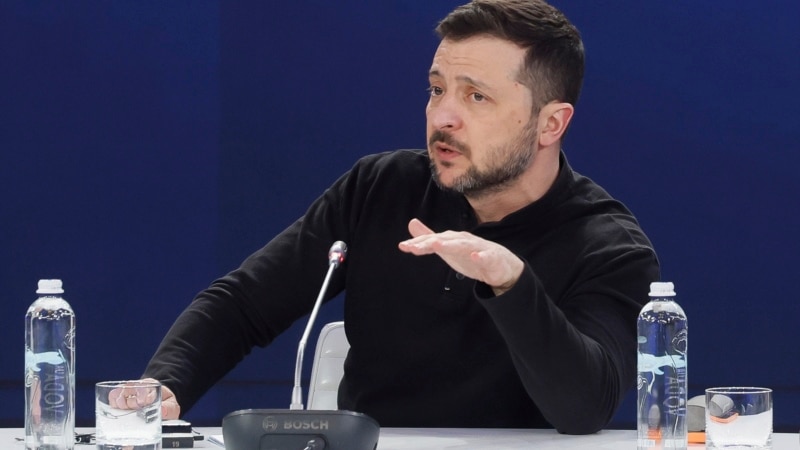
 1d
1dRussia's war on Ukraine began in 2014 with the annexation of Crimea and covert operations in the Donbas region. By the time Zelenskyy became president in 2019, the conflict already had lasted five years. On Feb. 24, 2022, Putin initiated a full-scale invasion after months of disinformation.
Read More